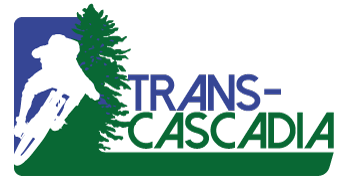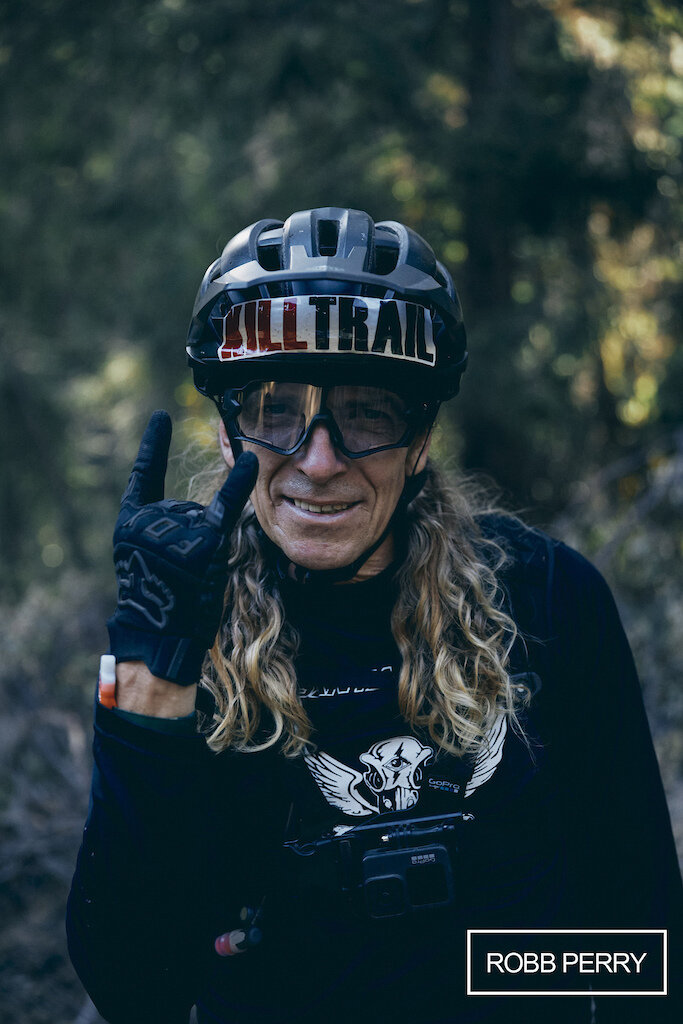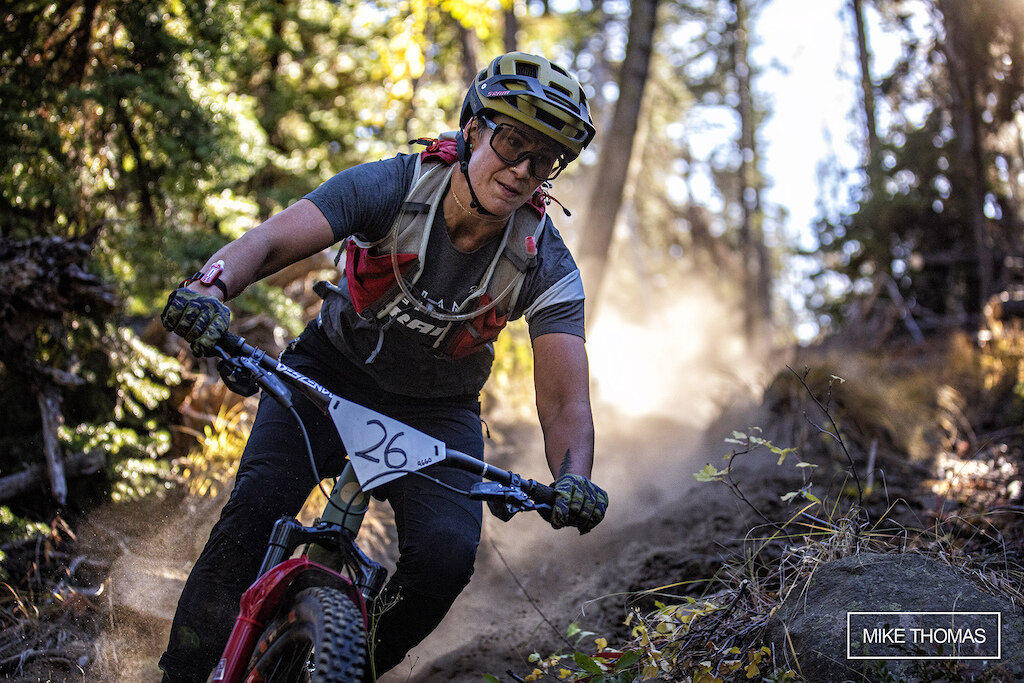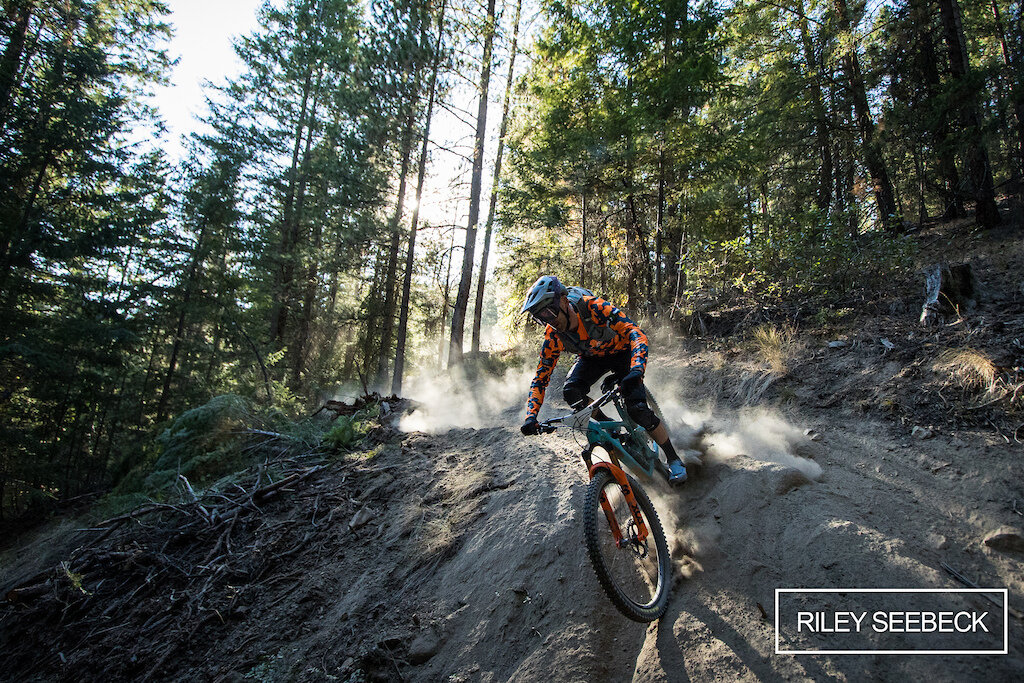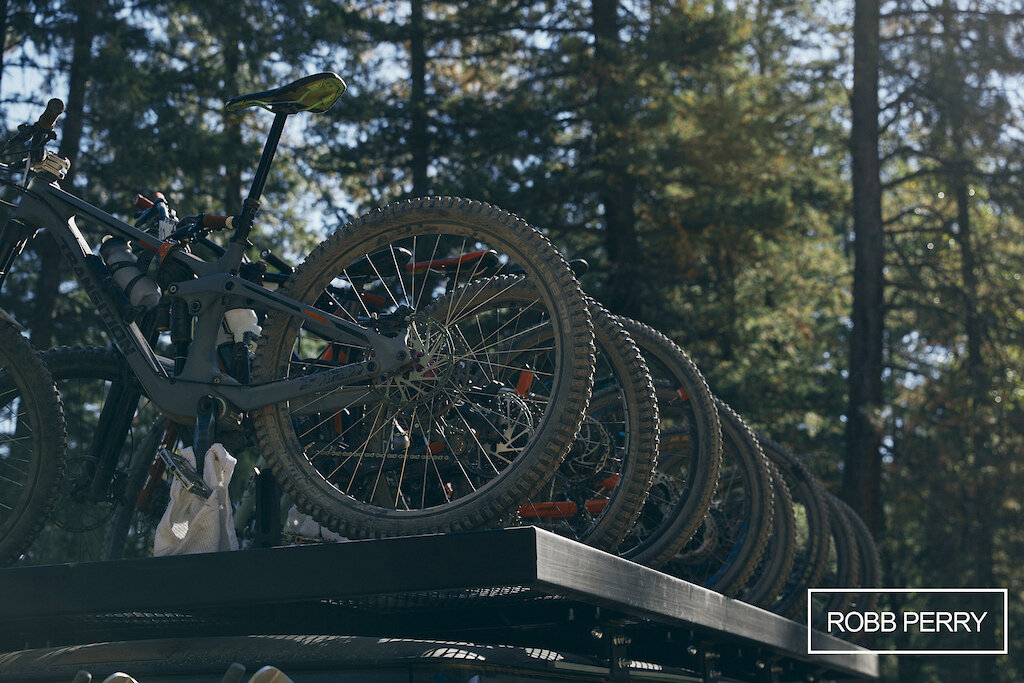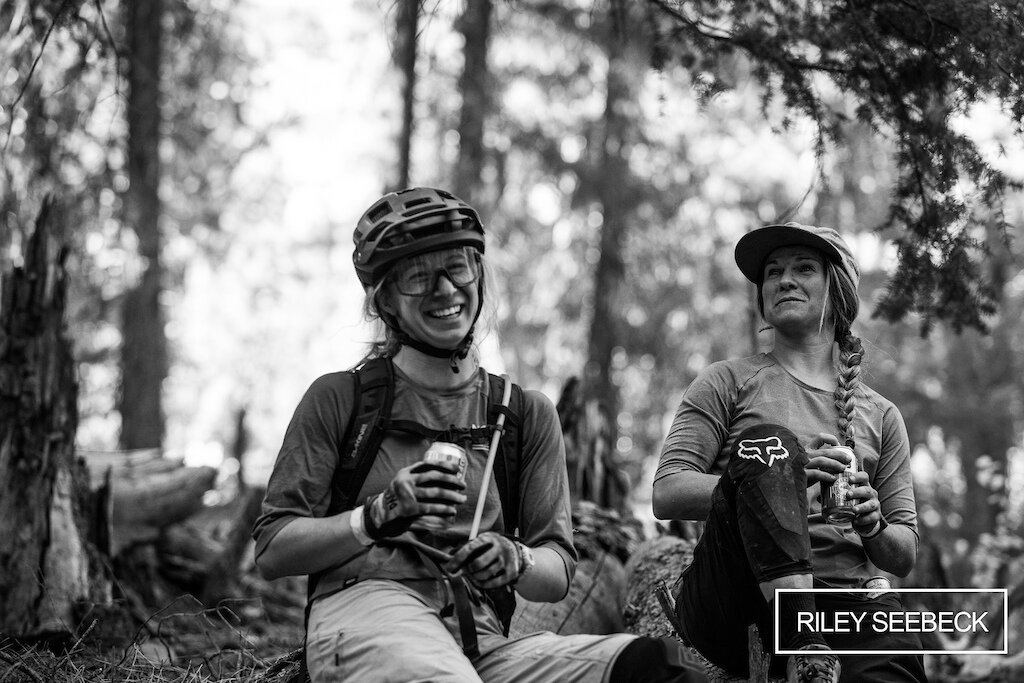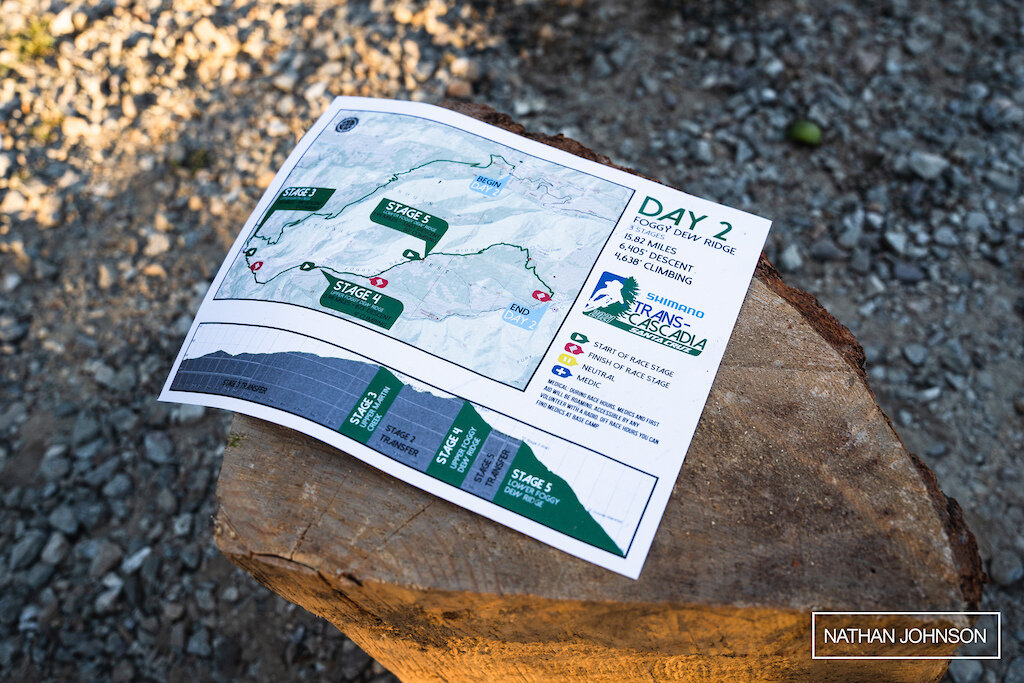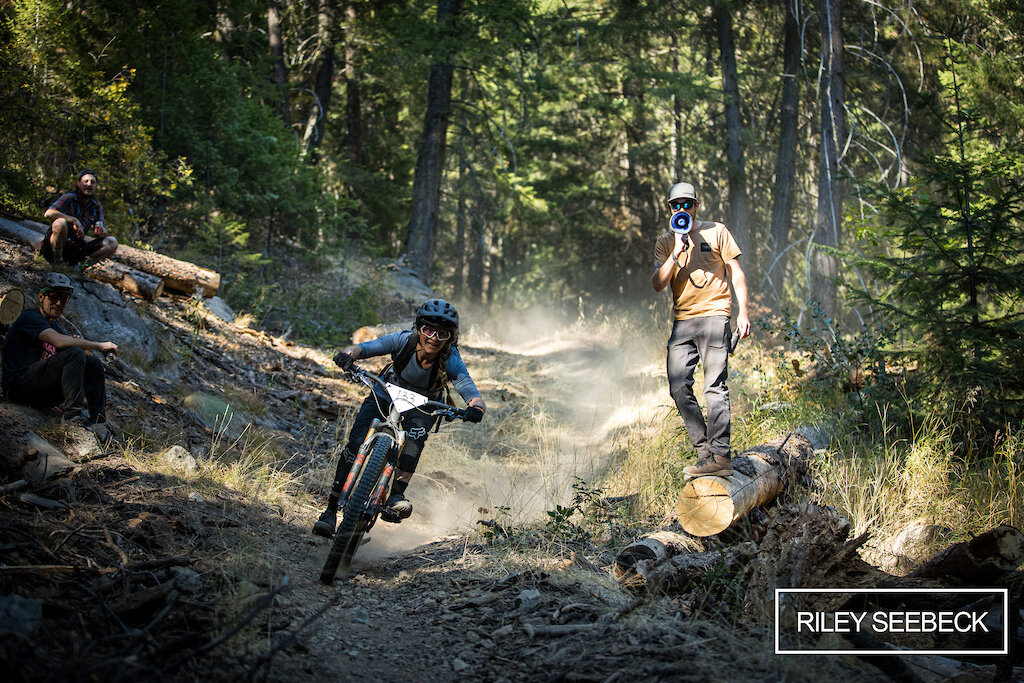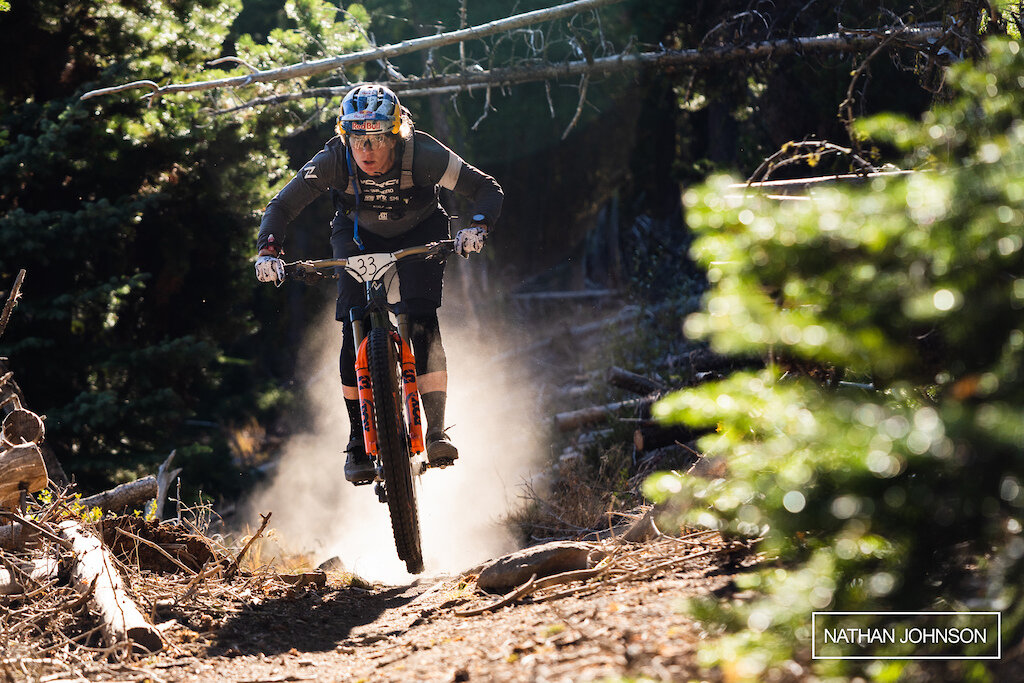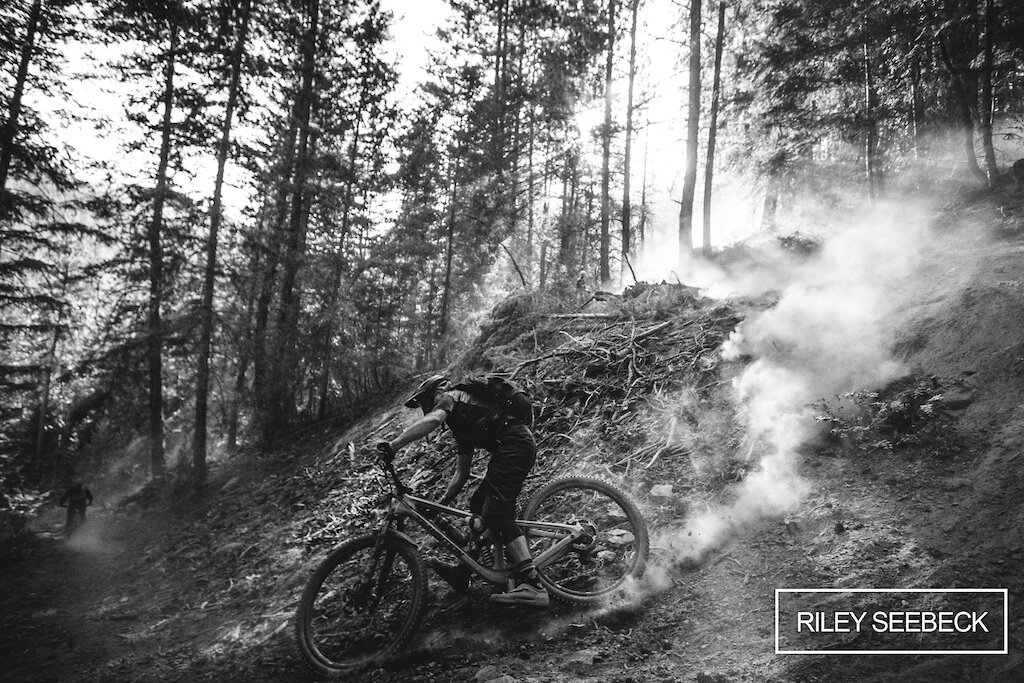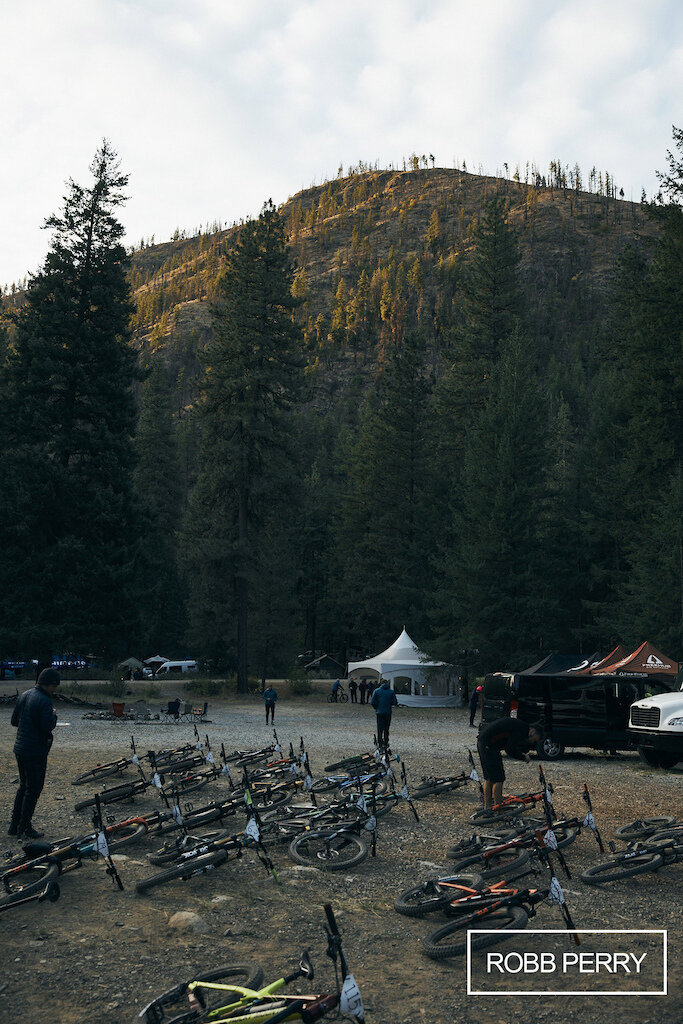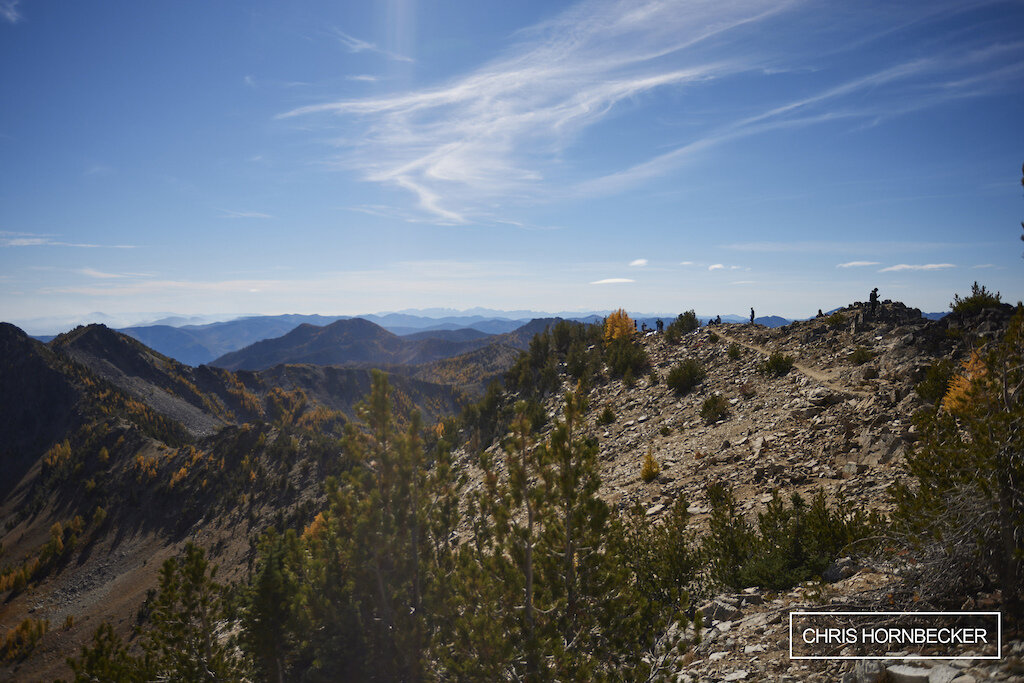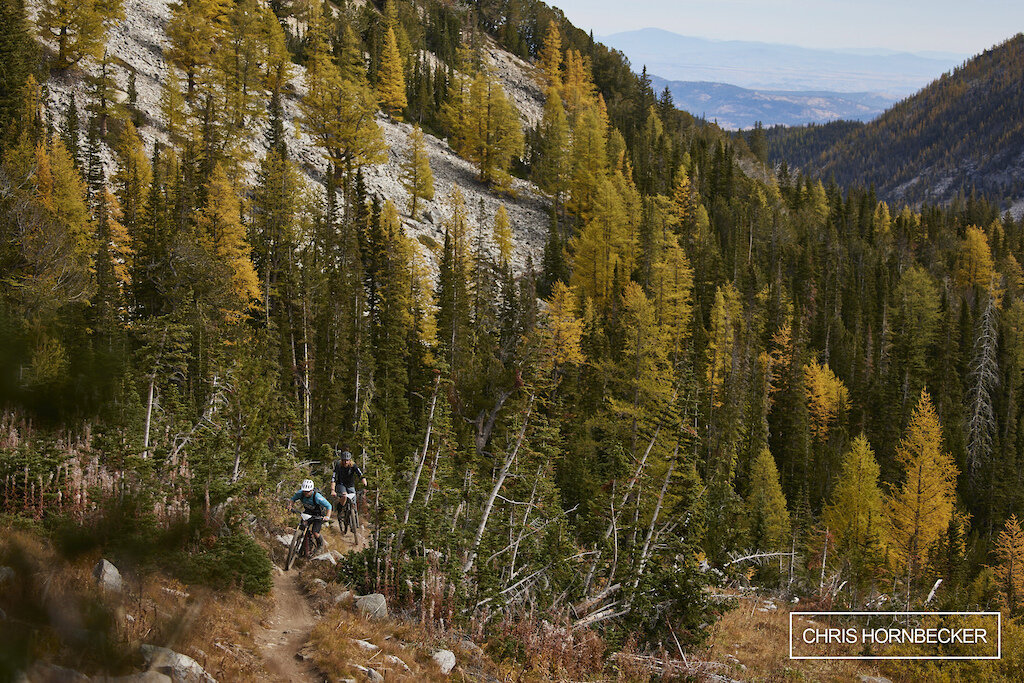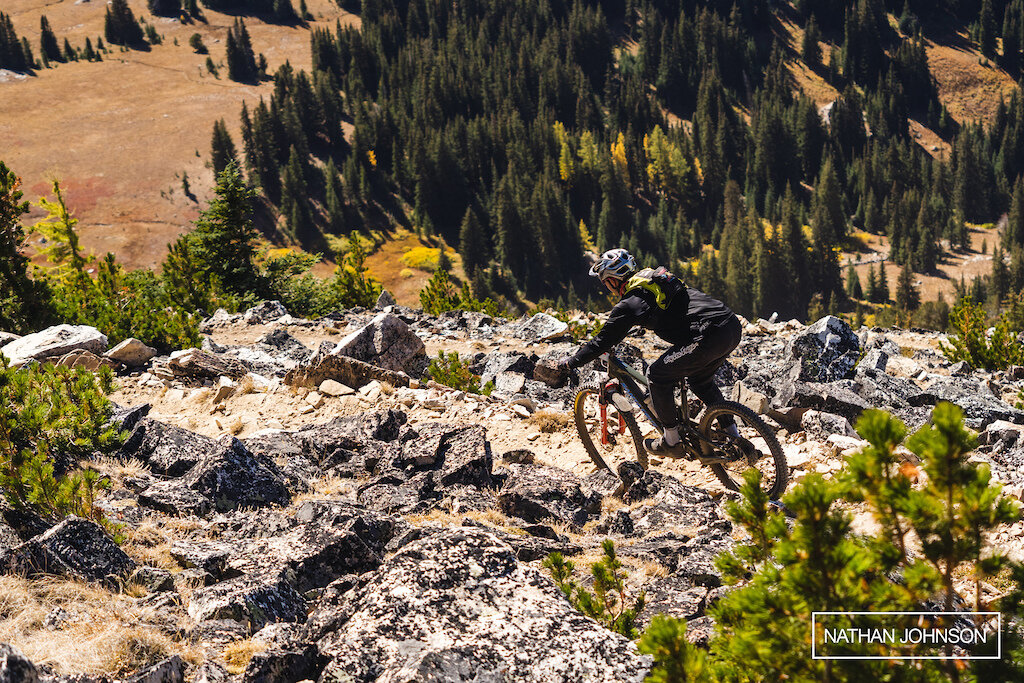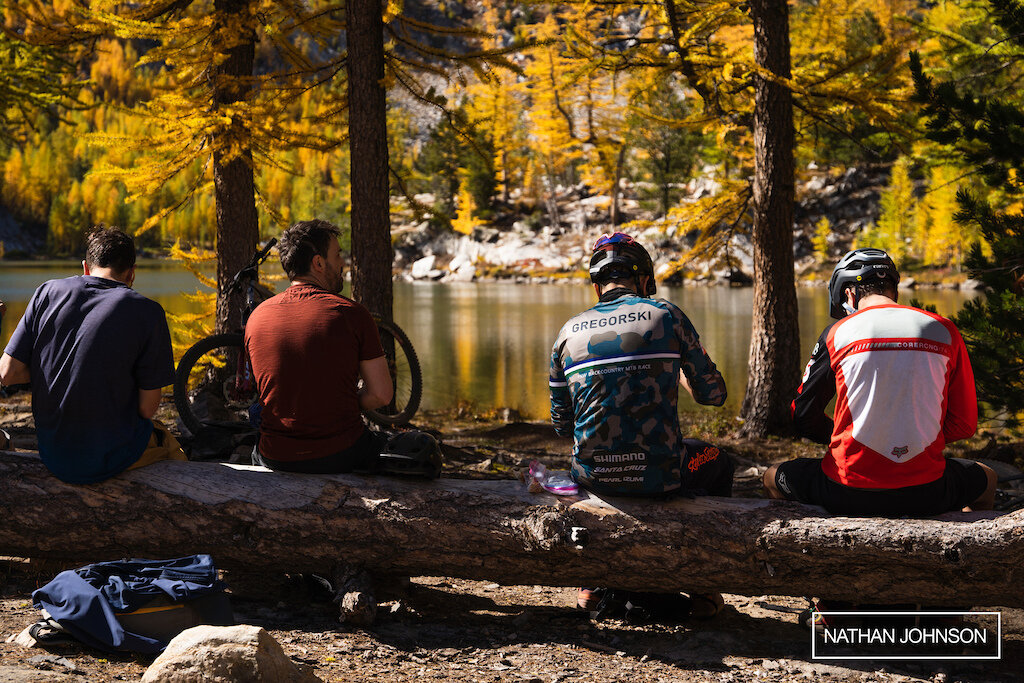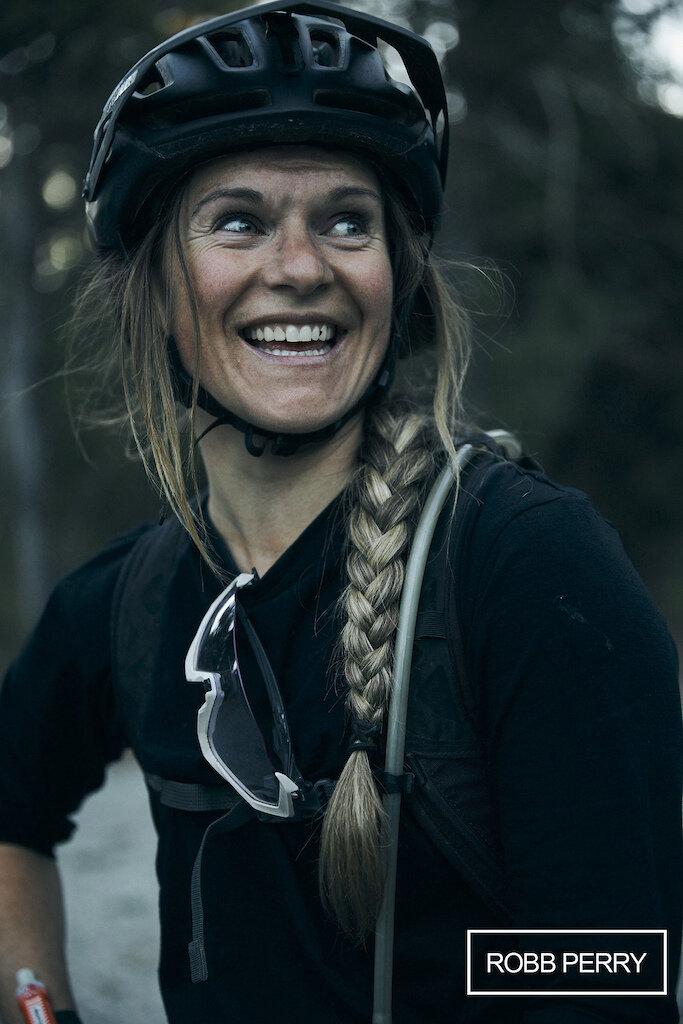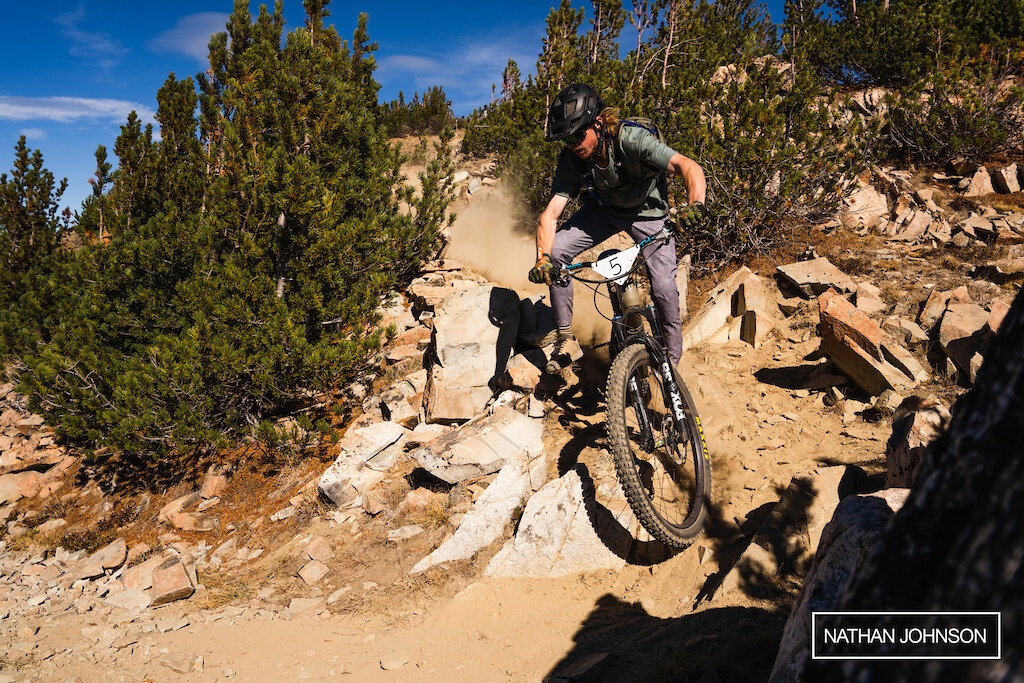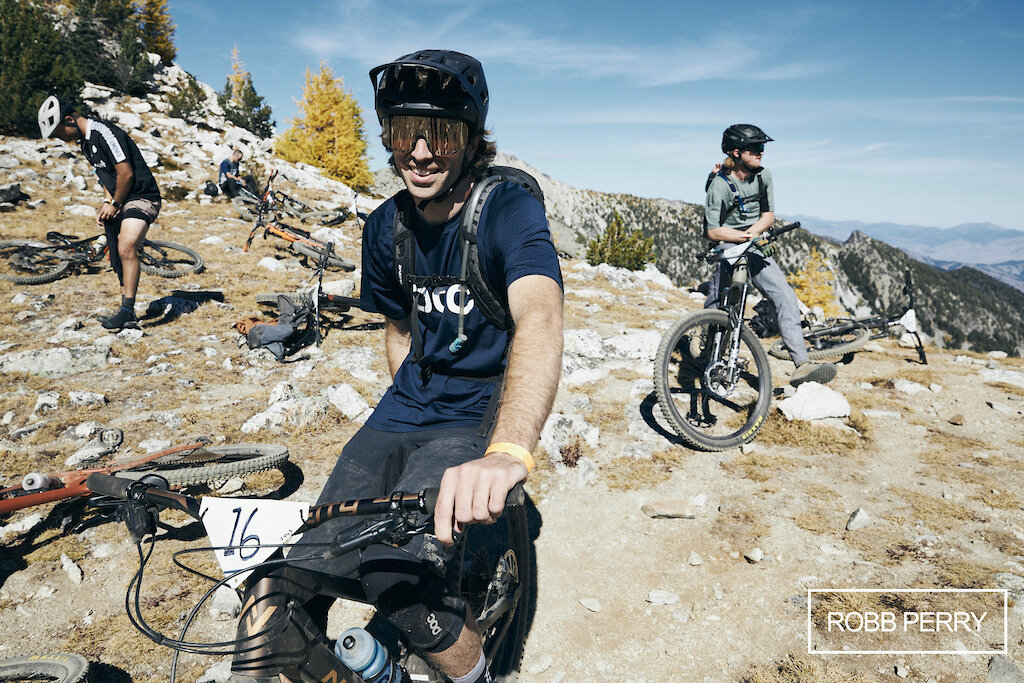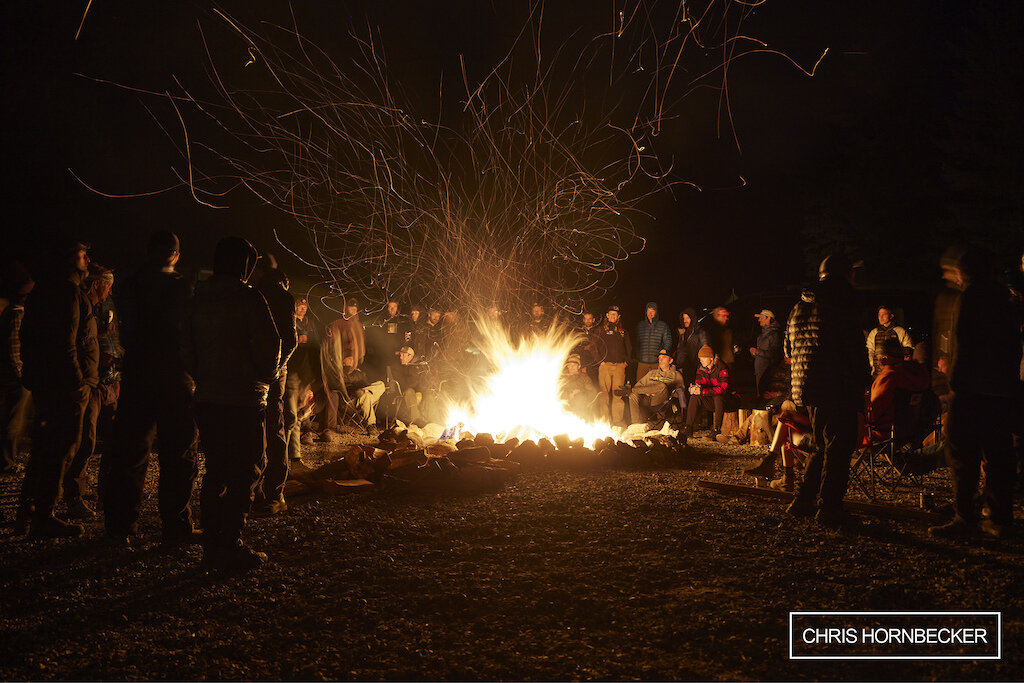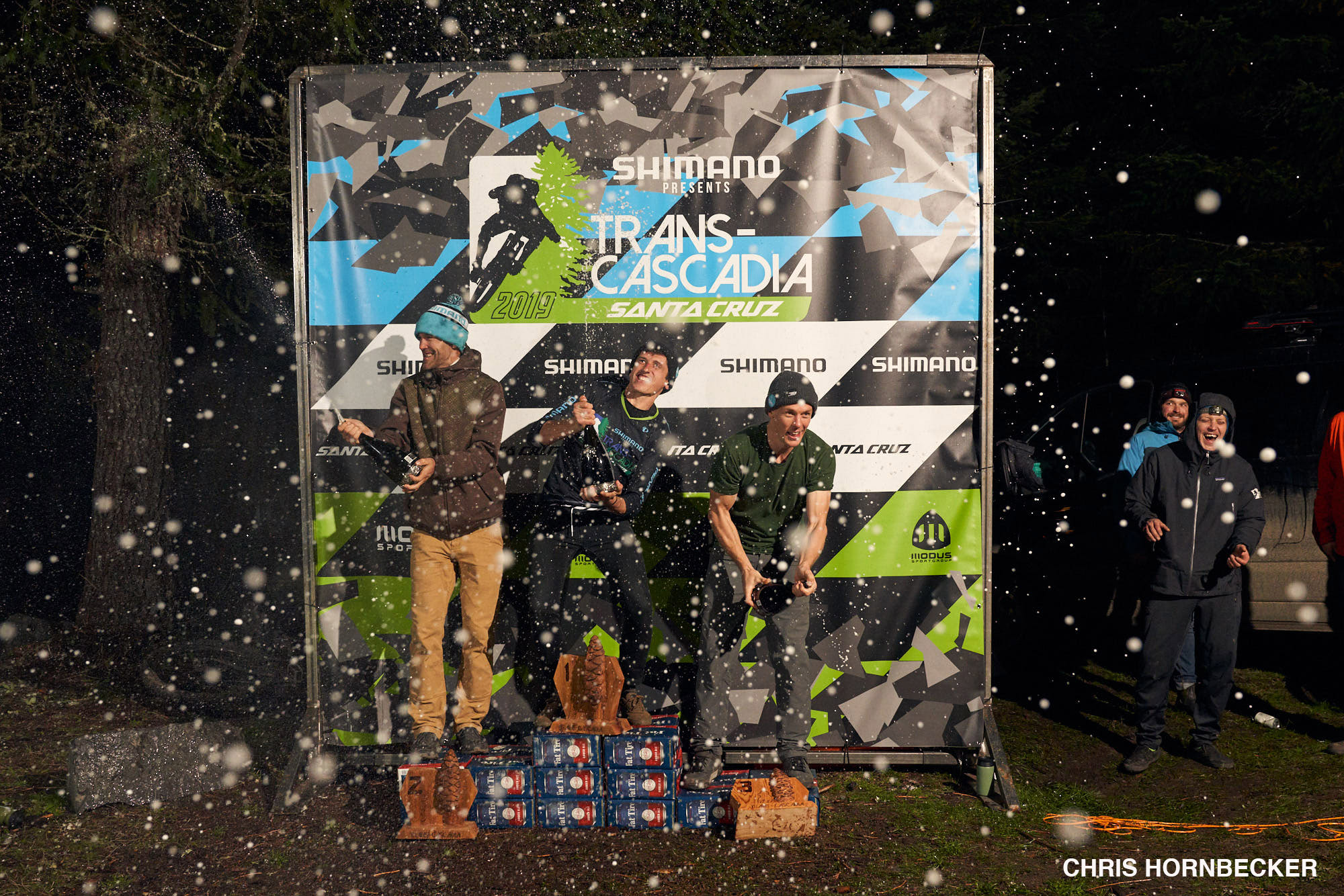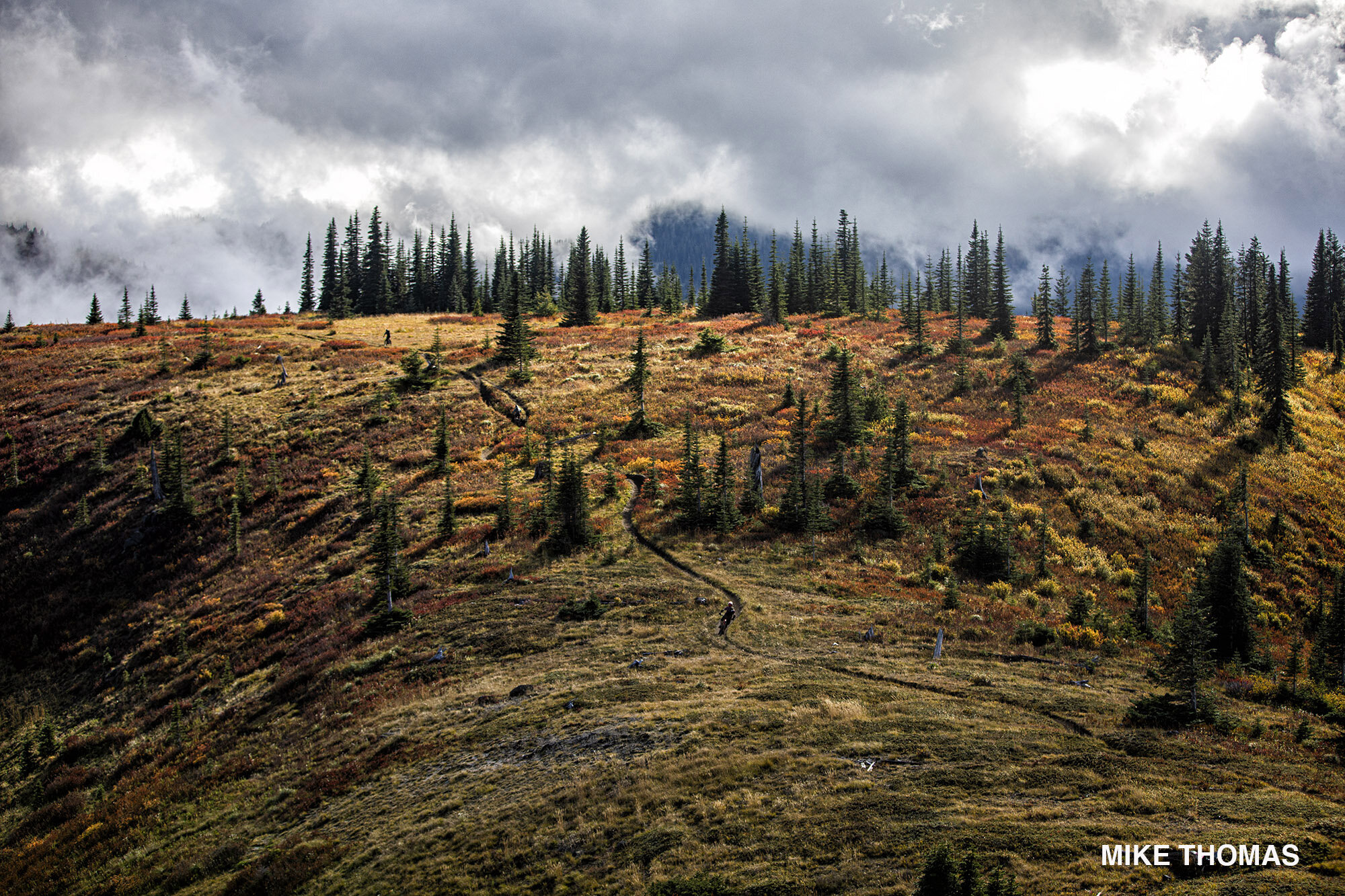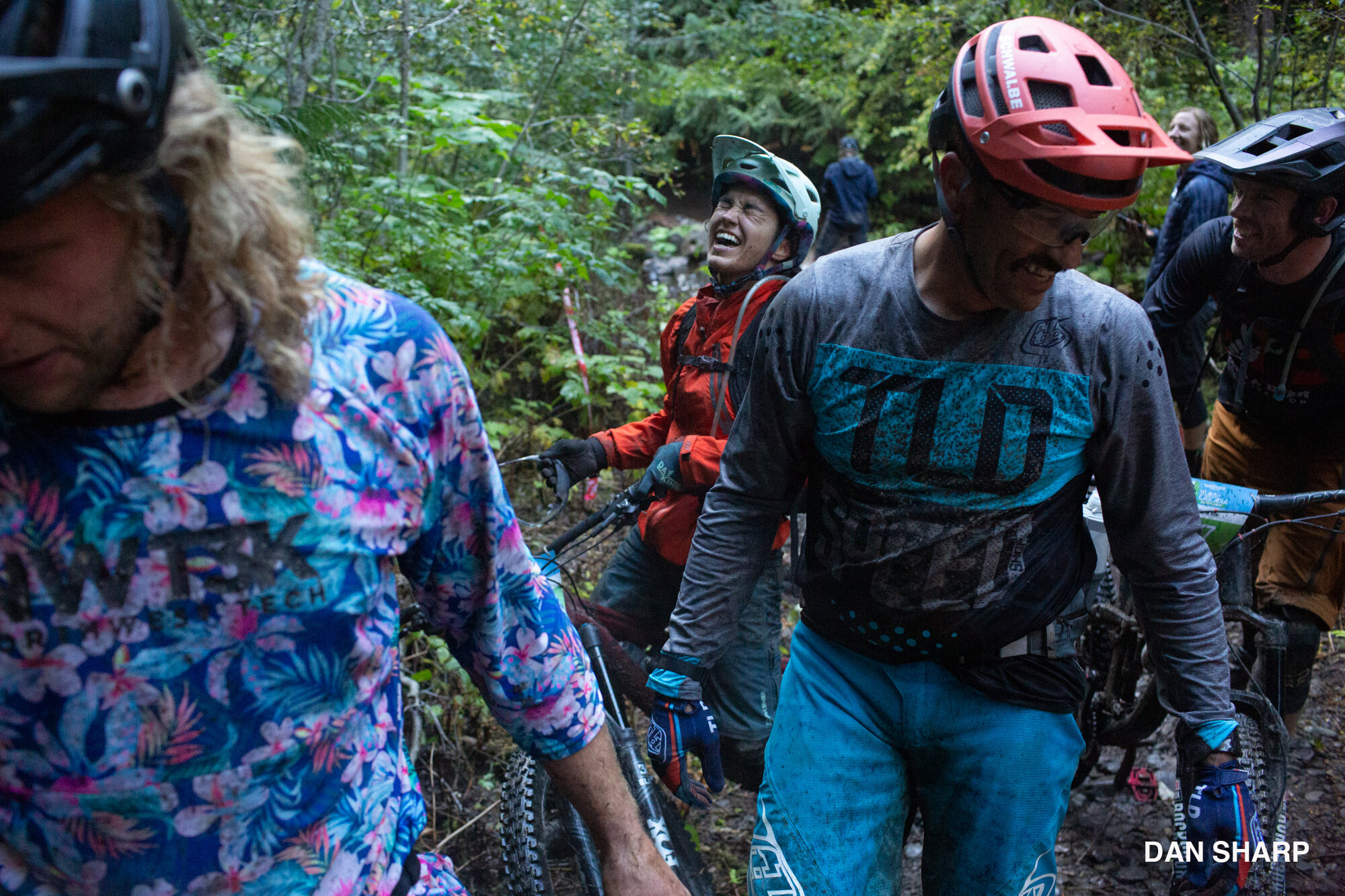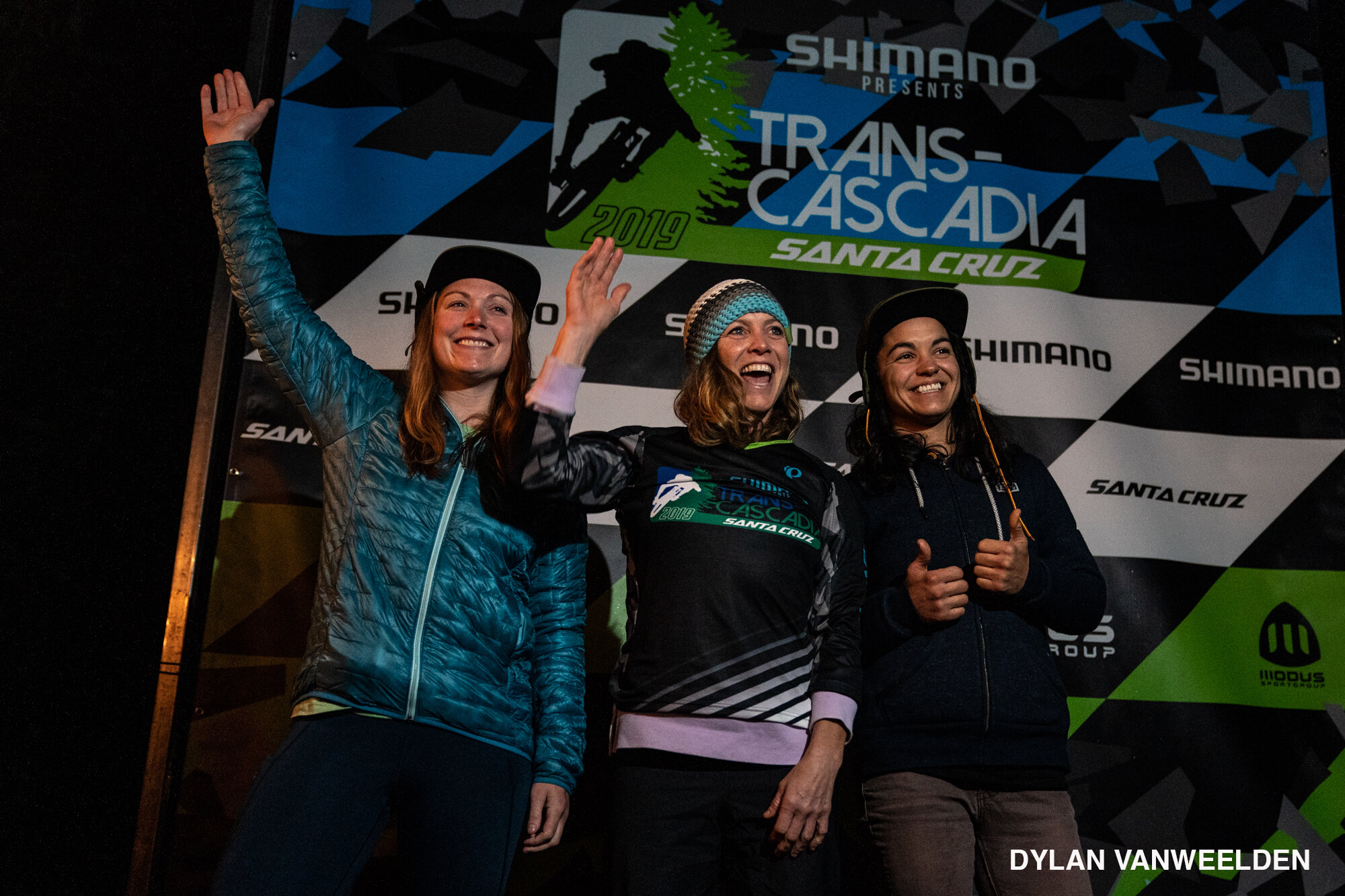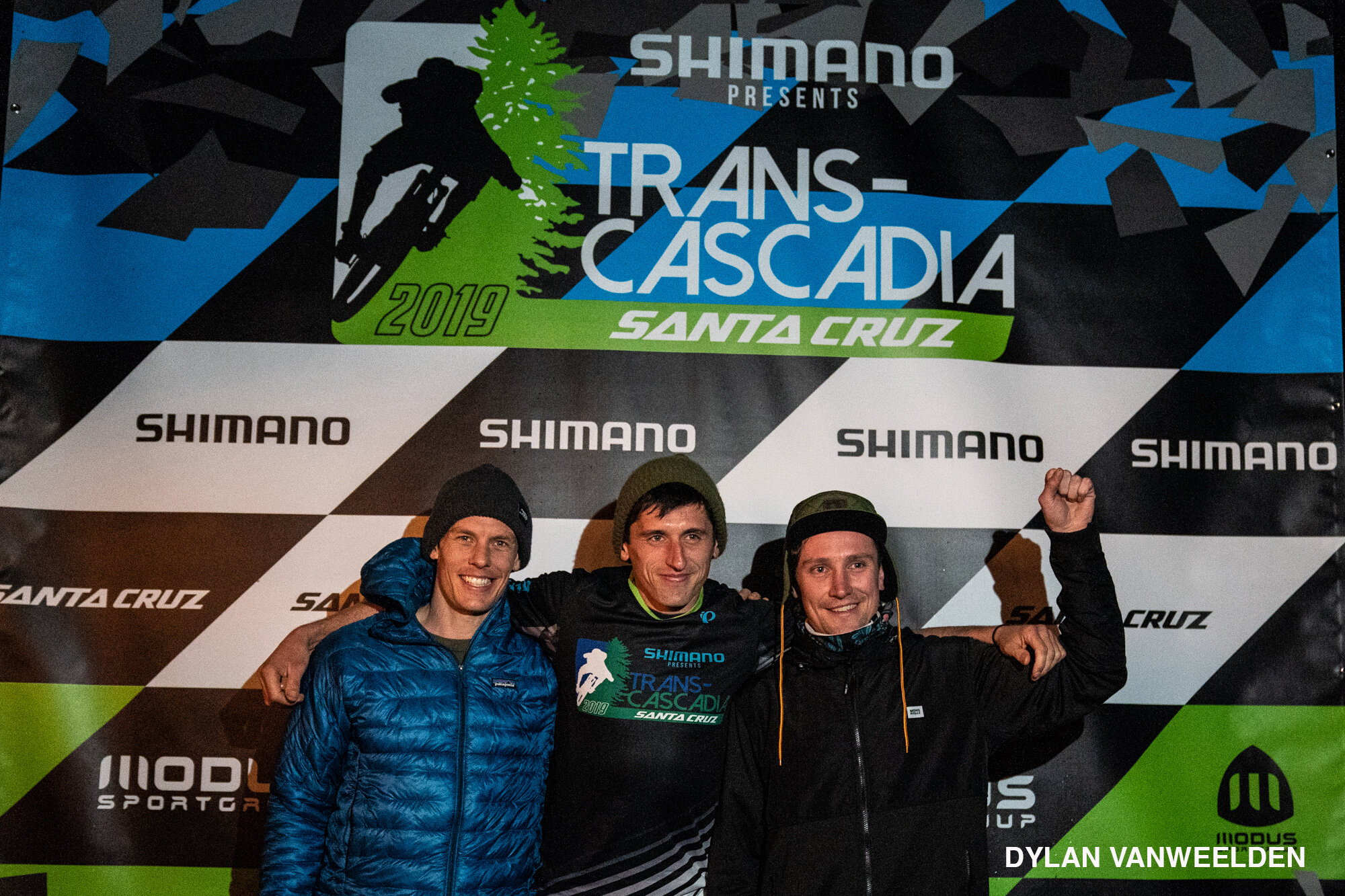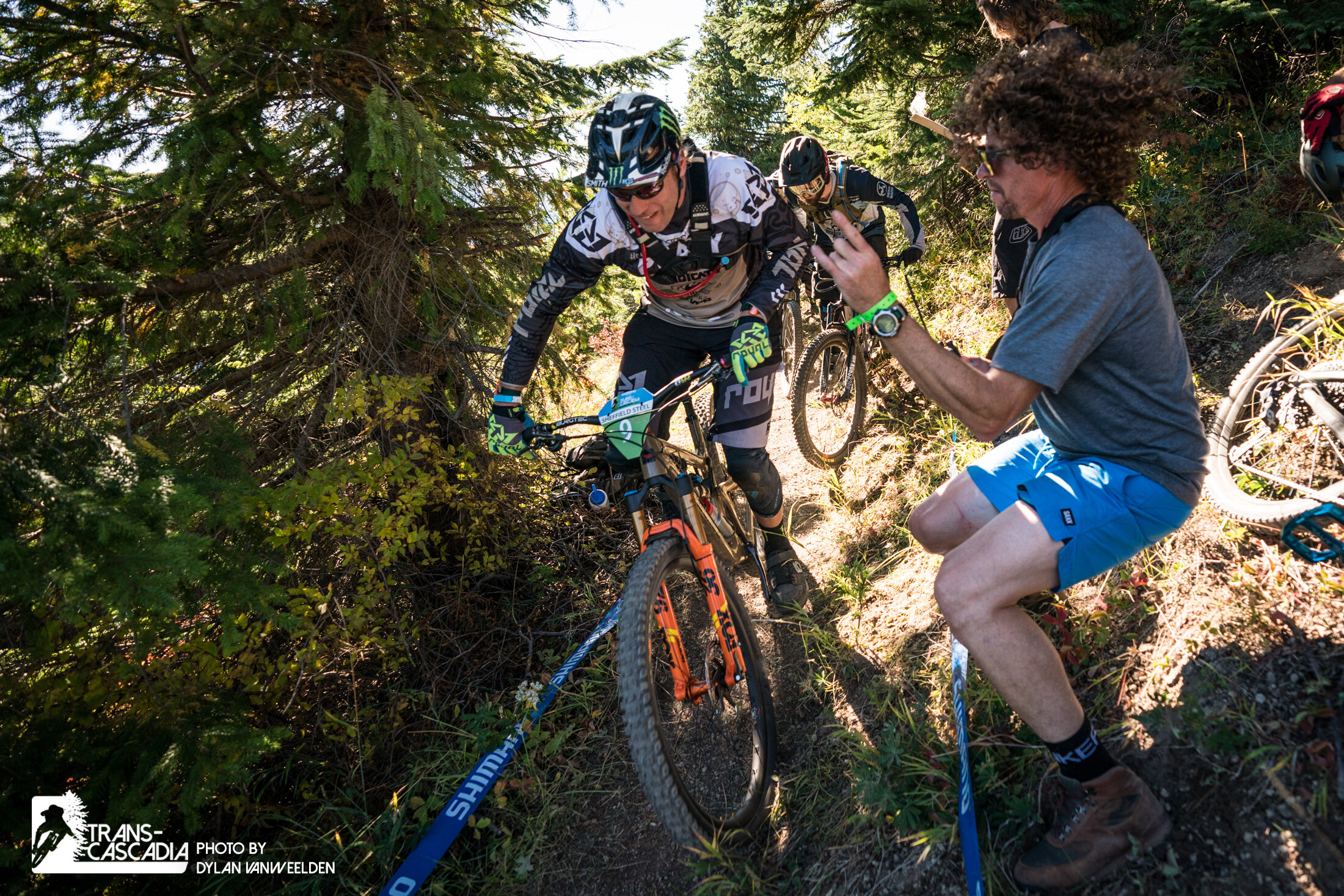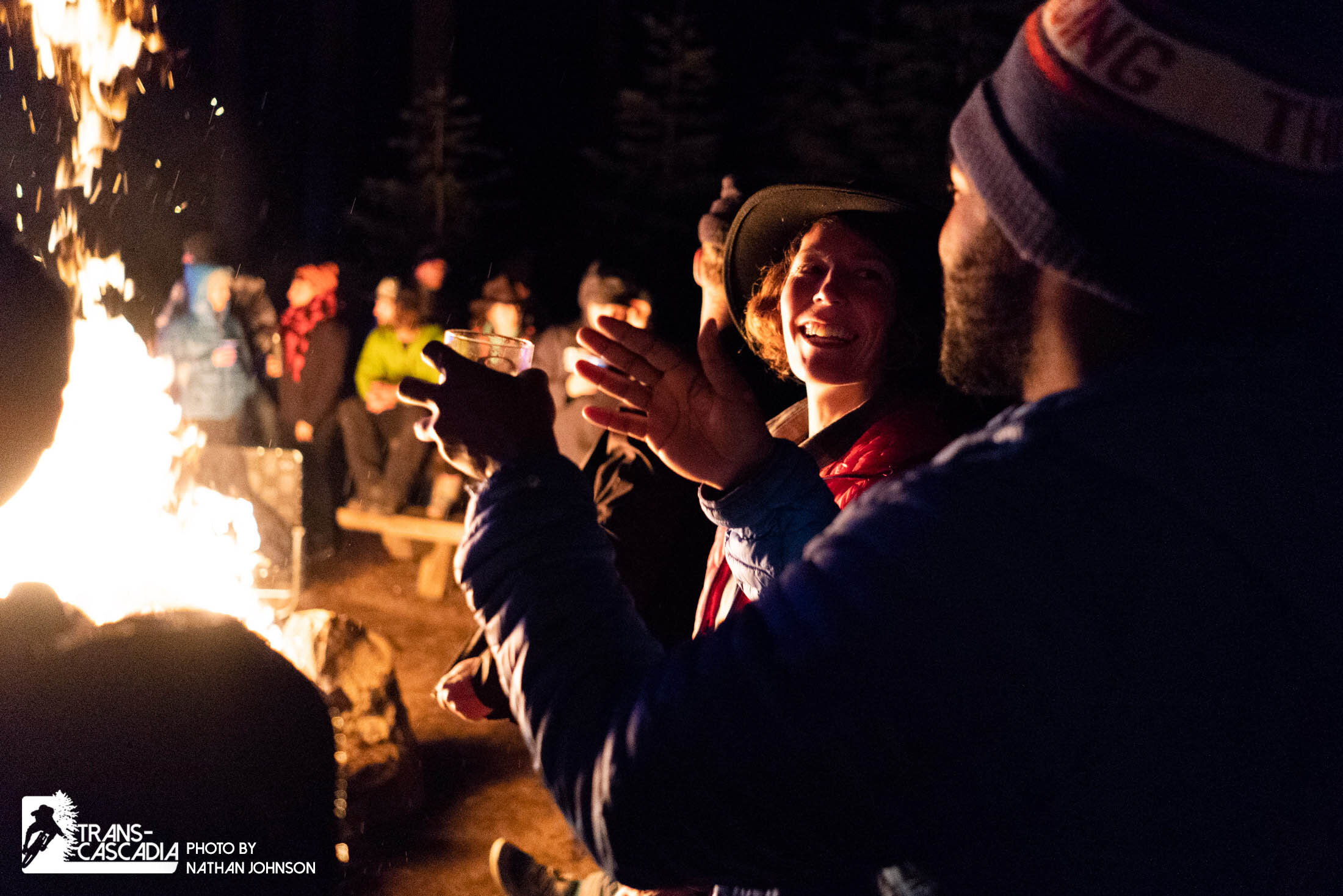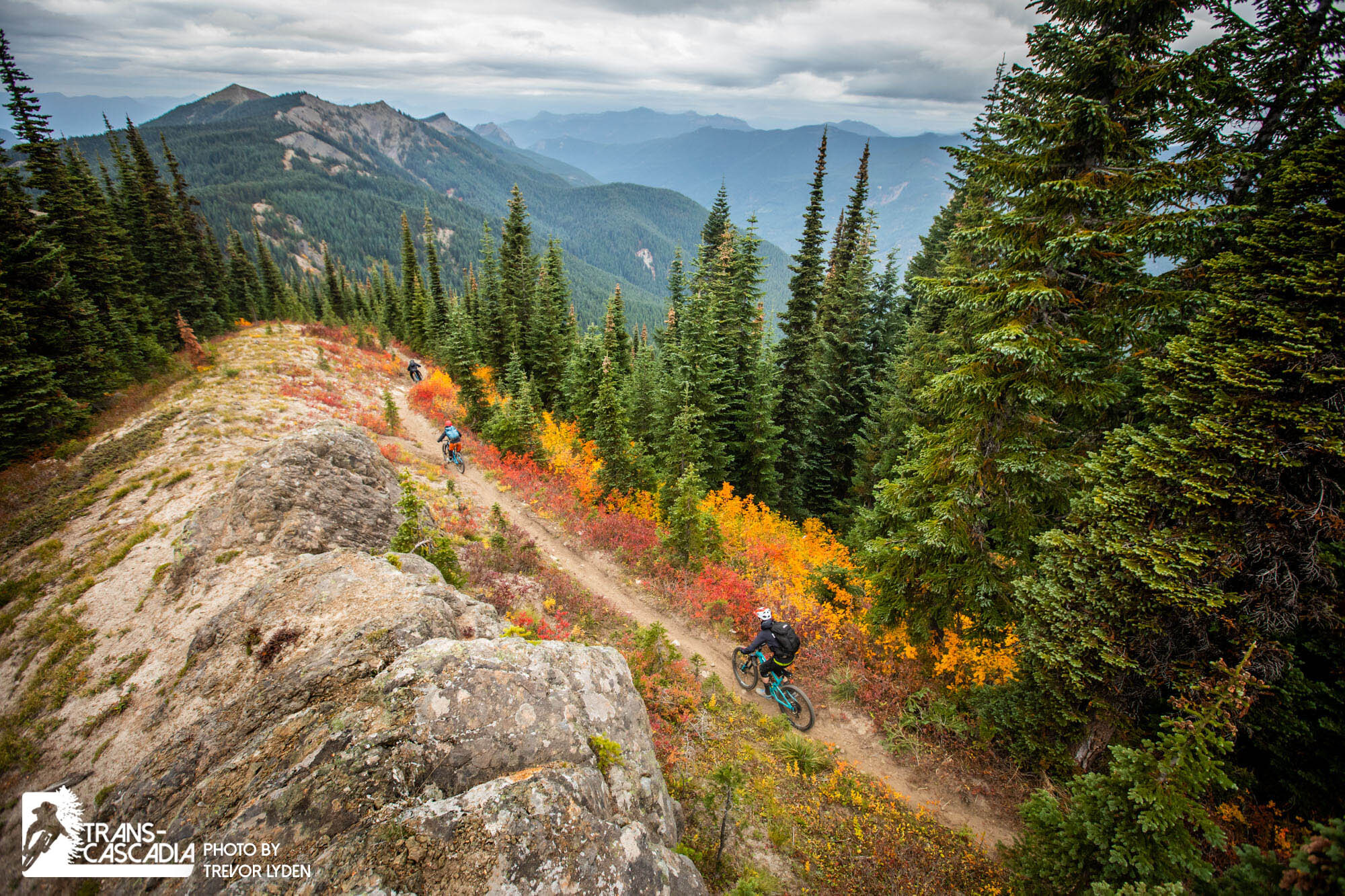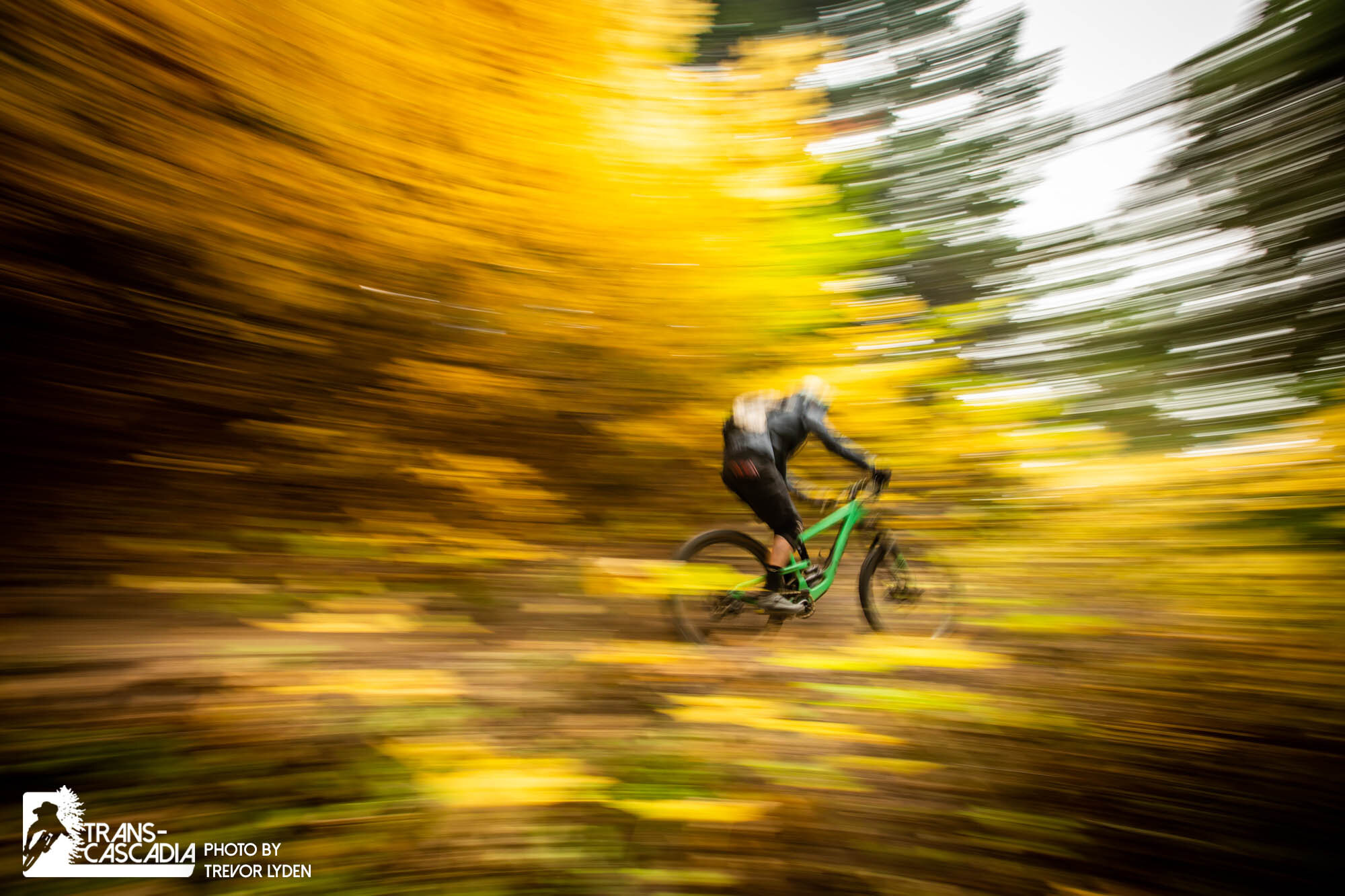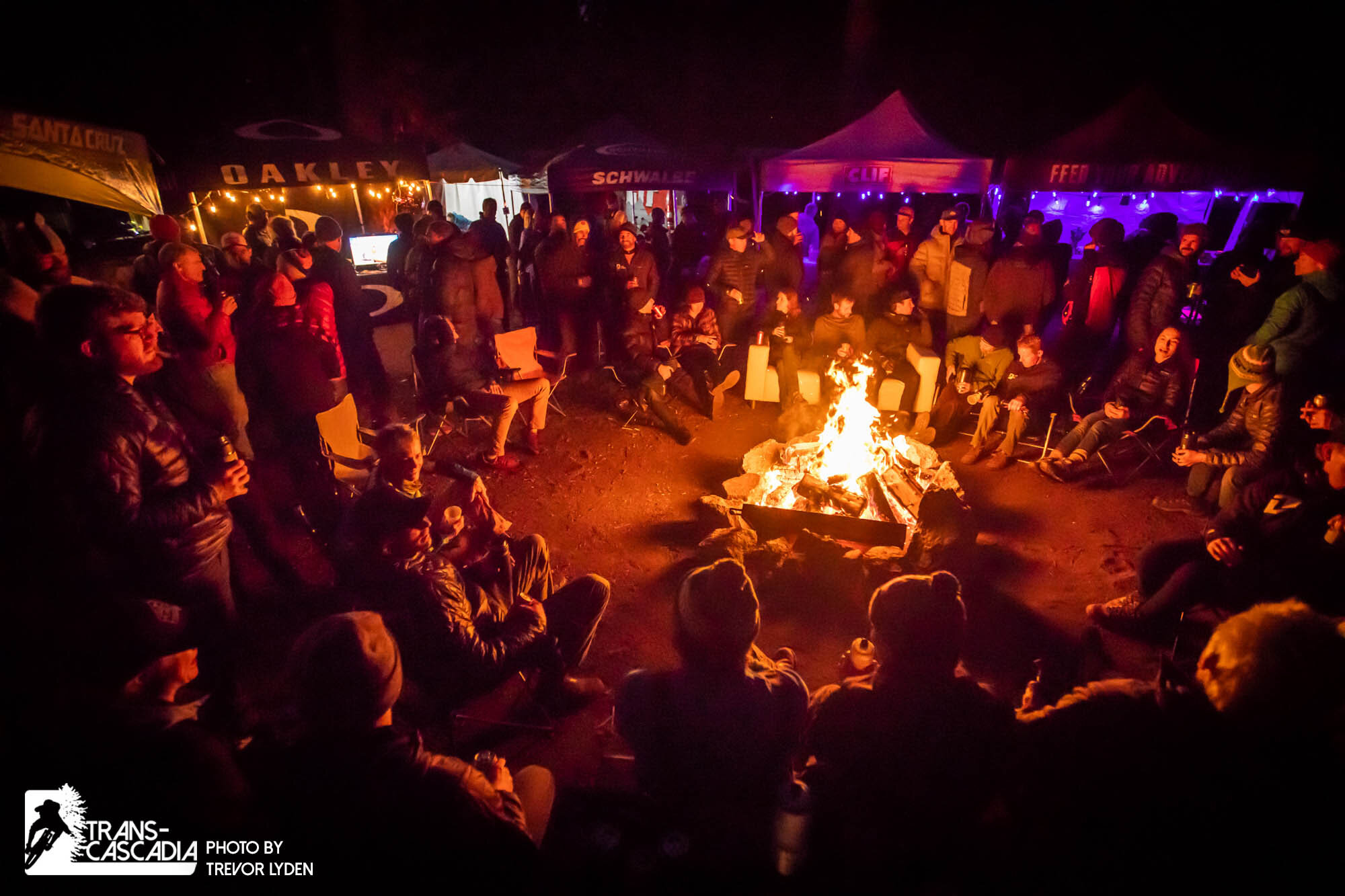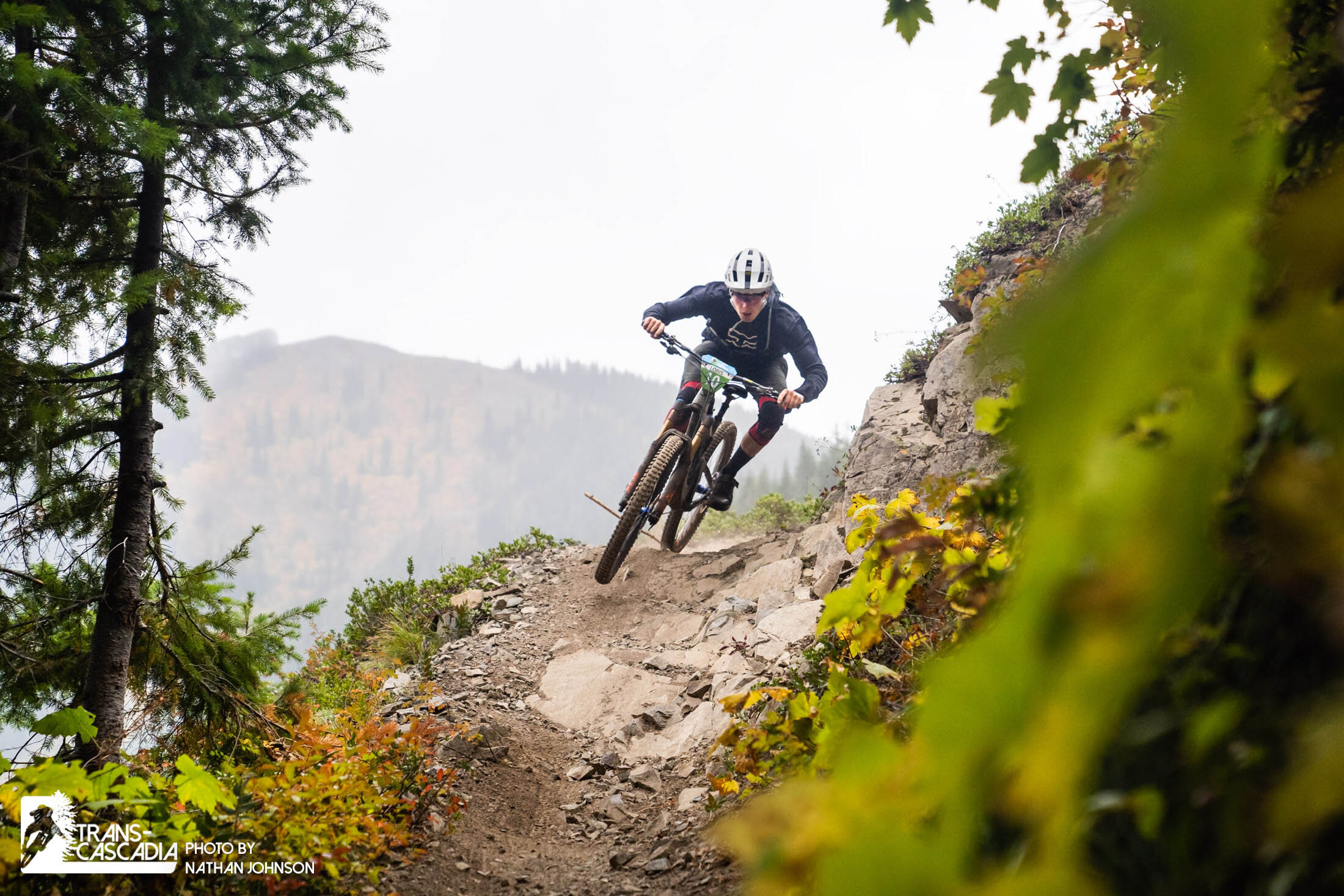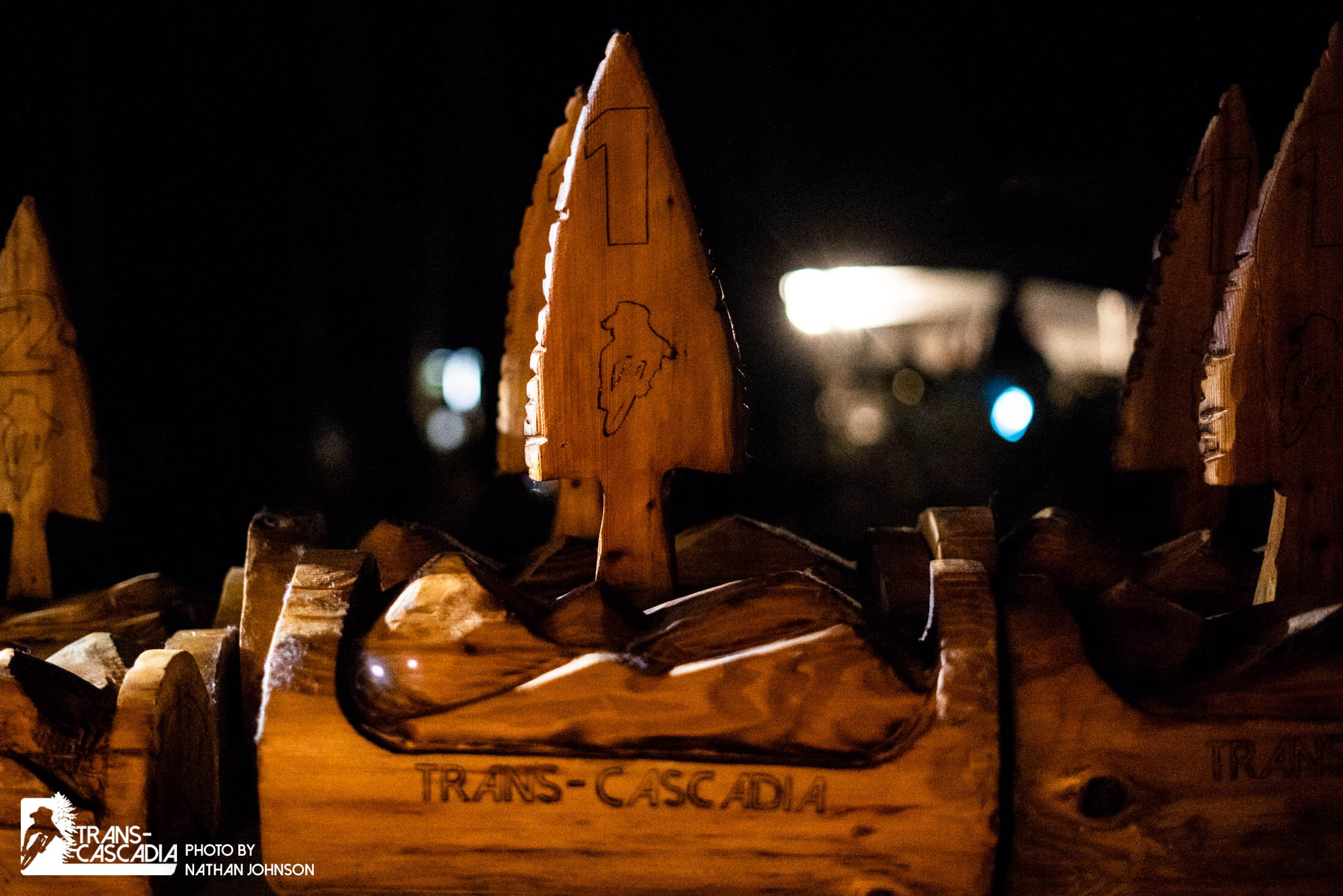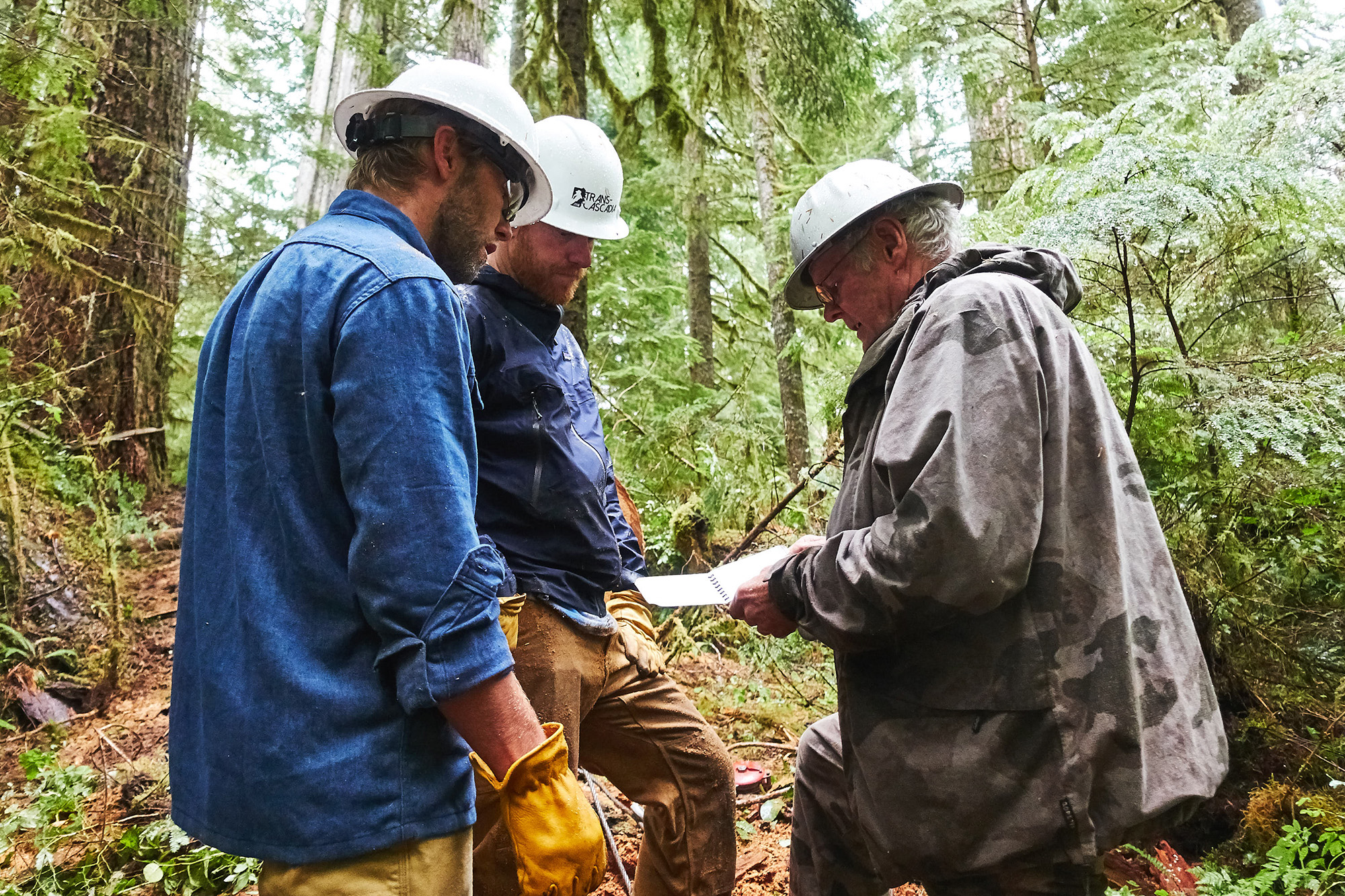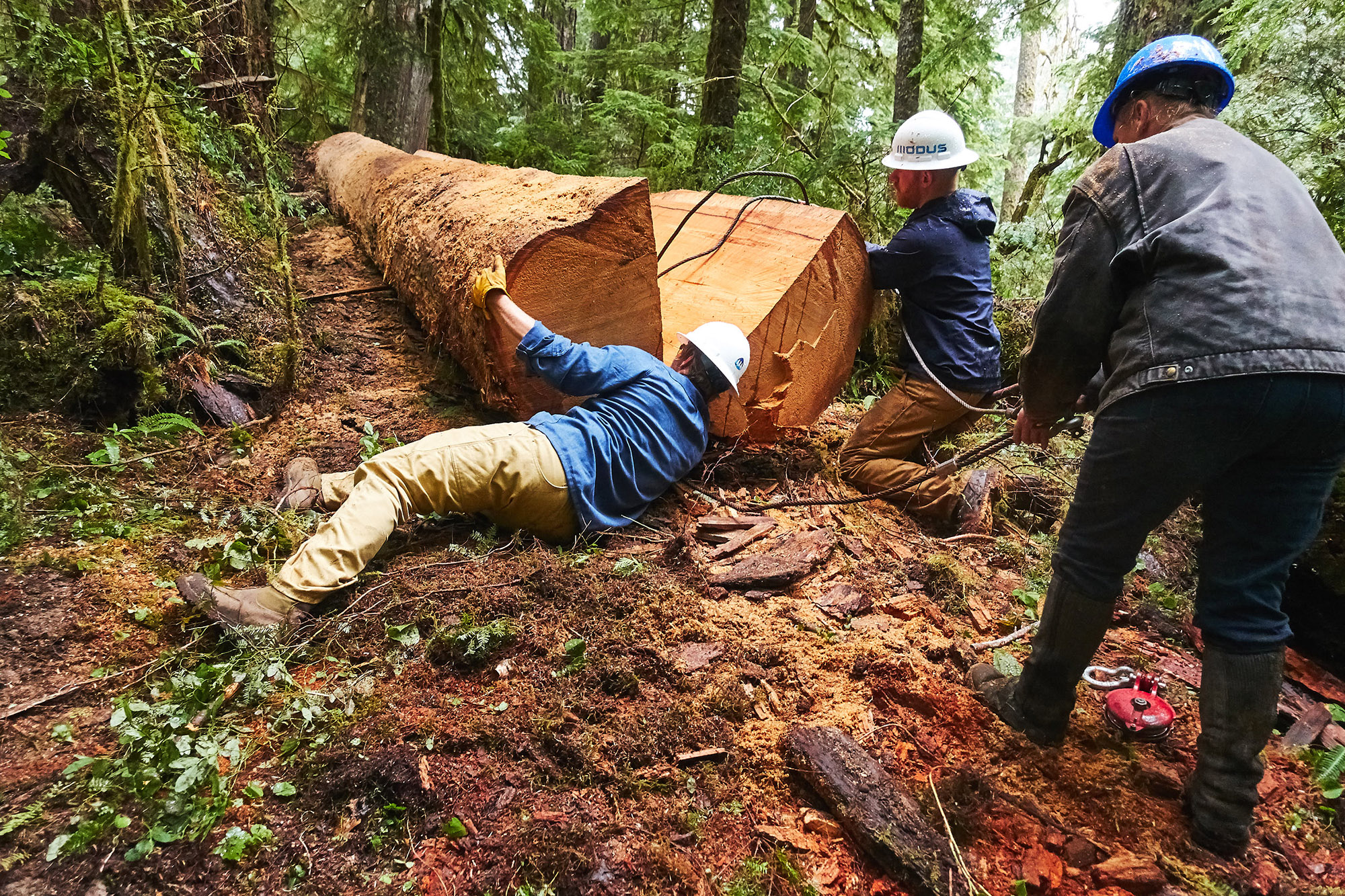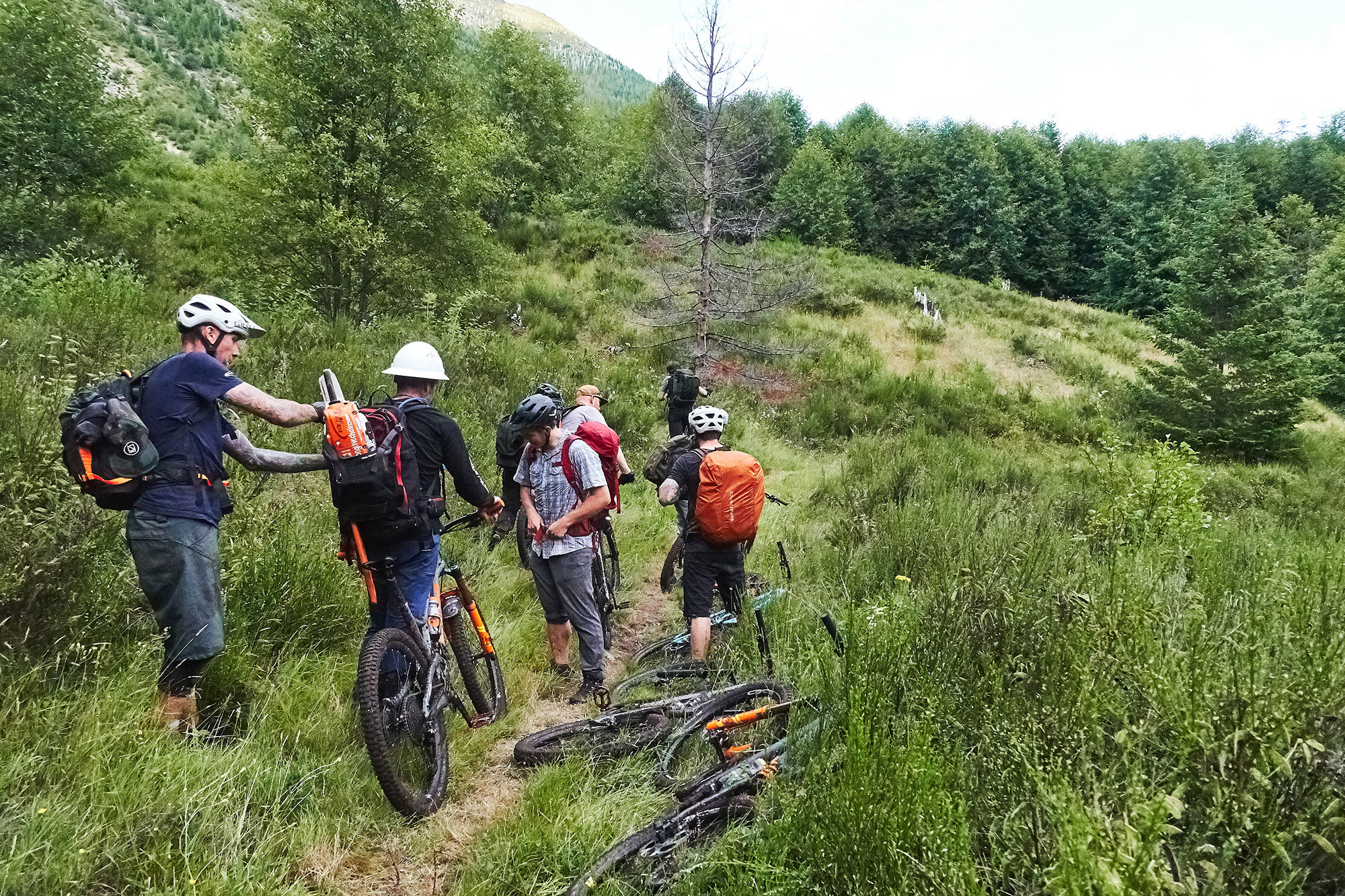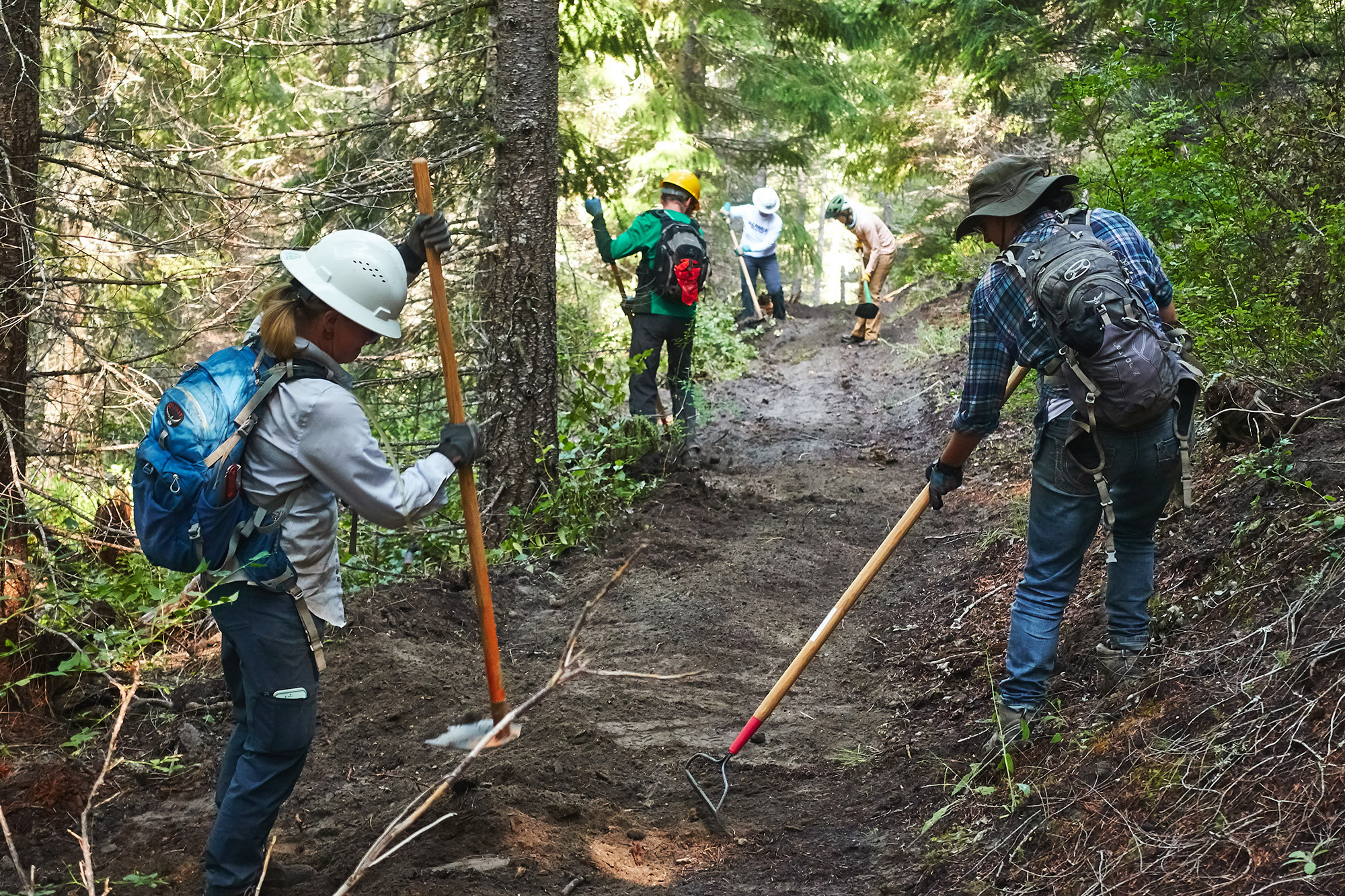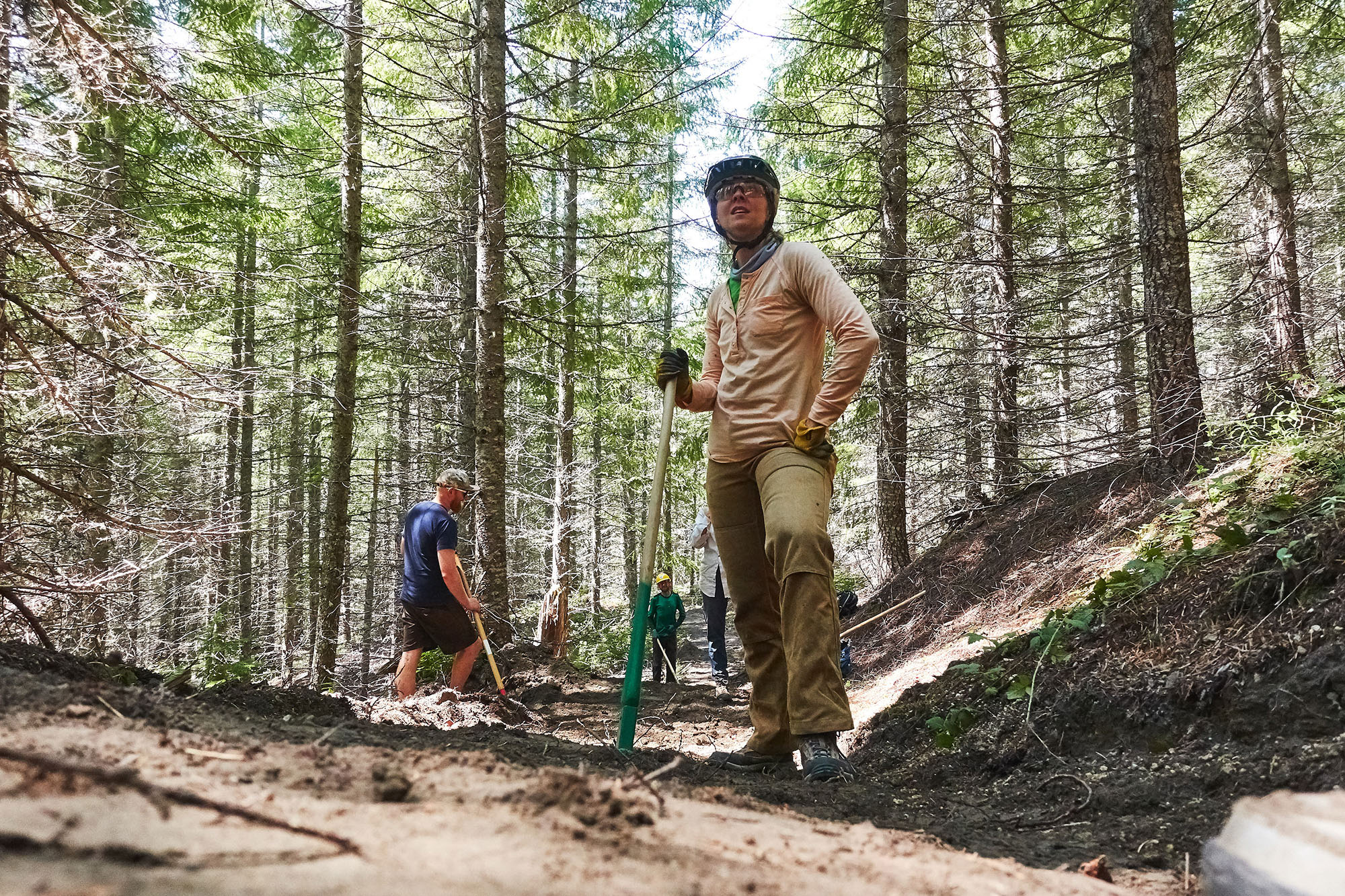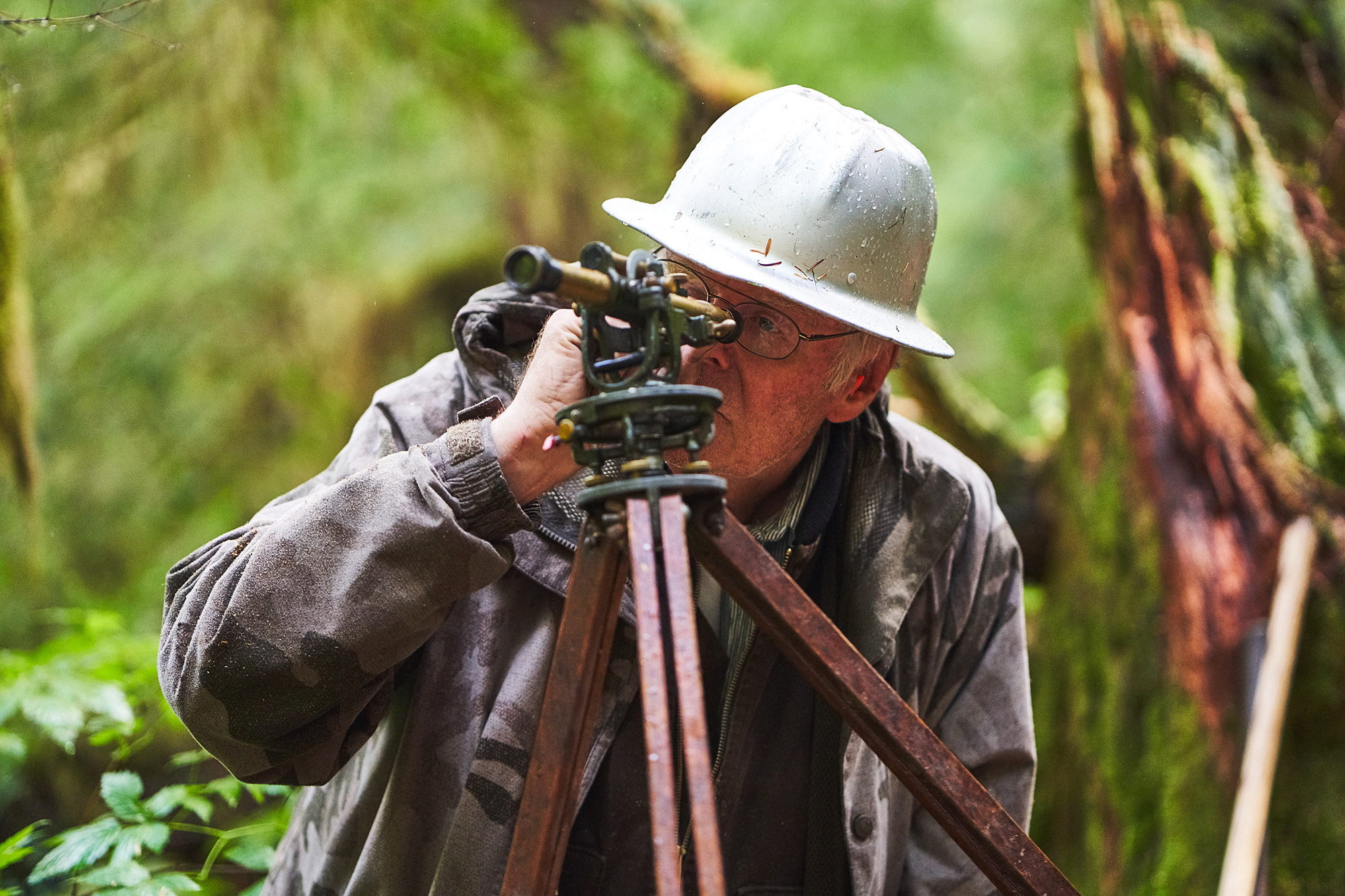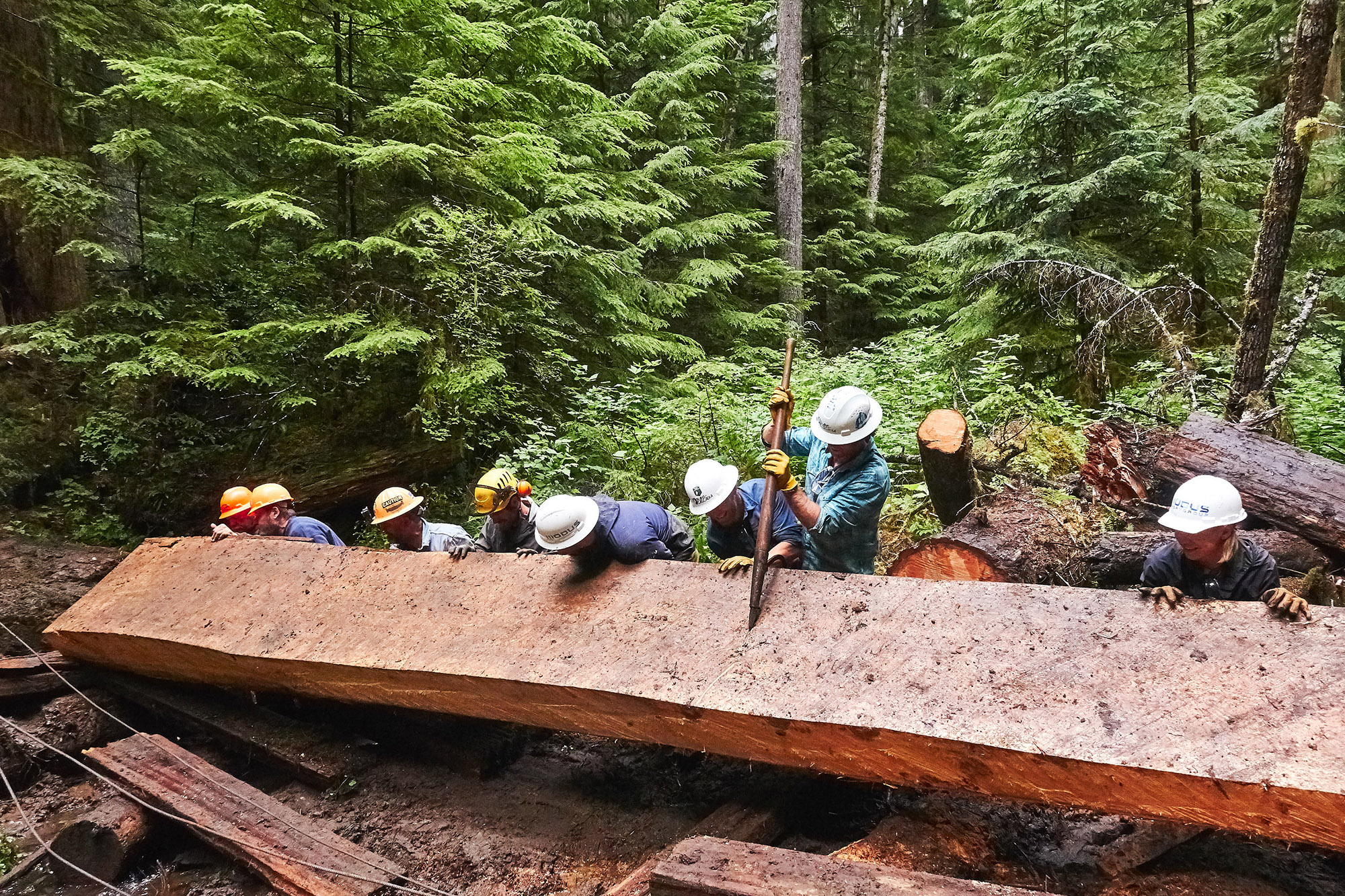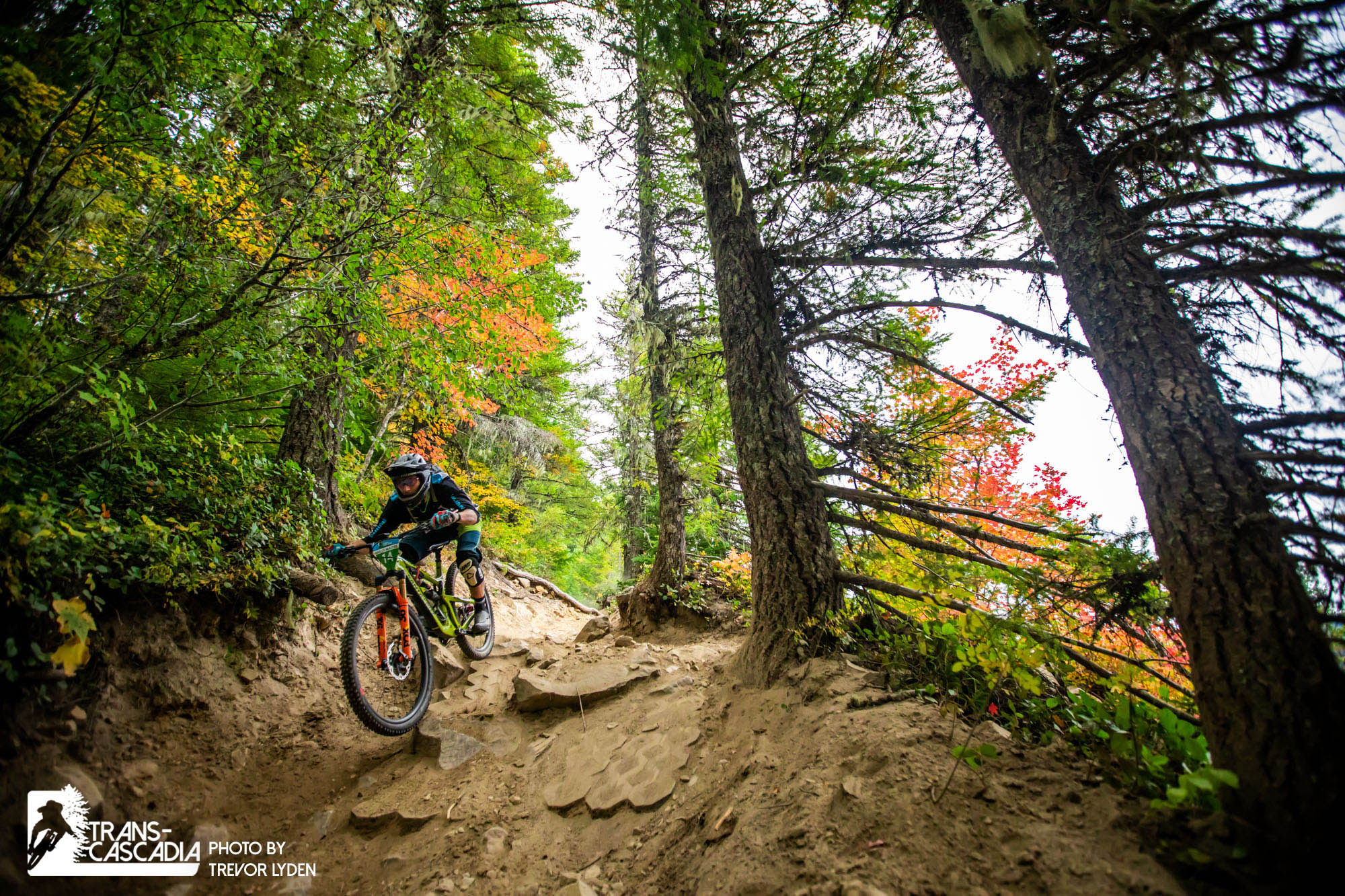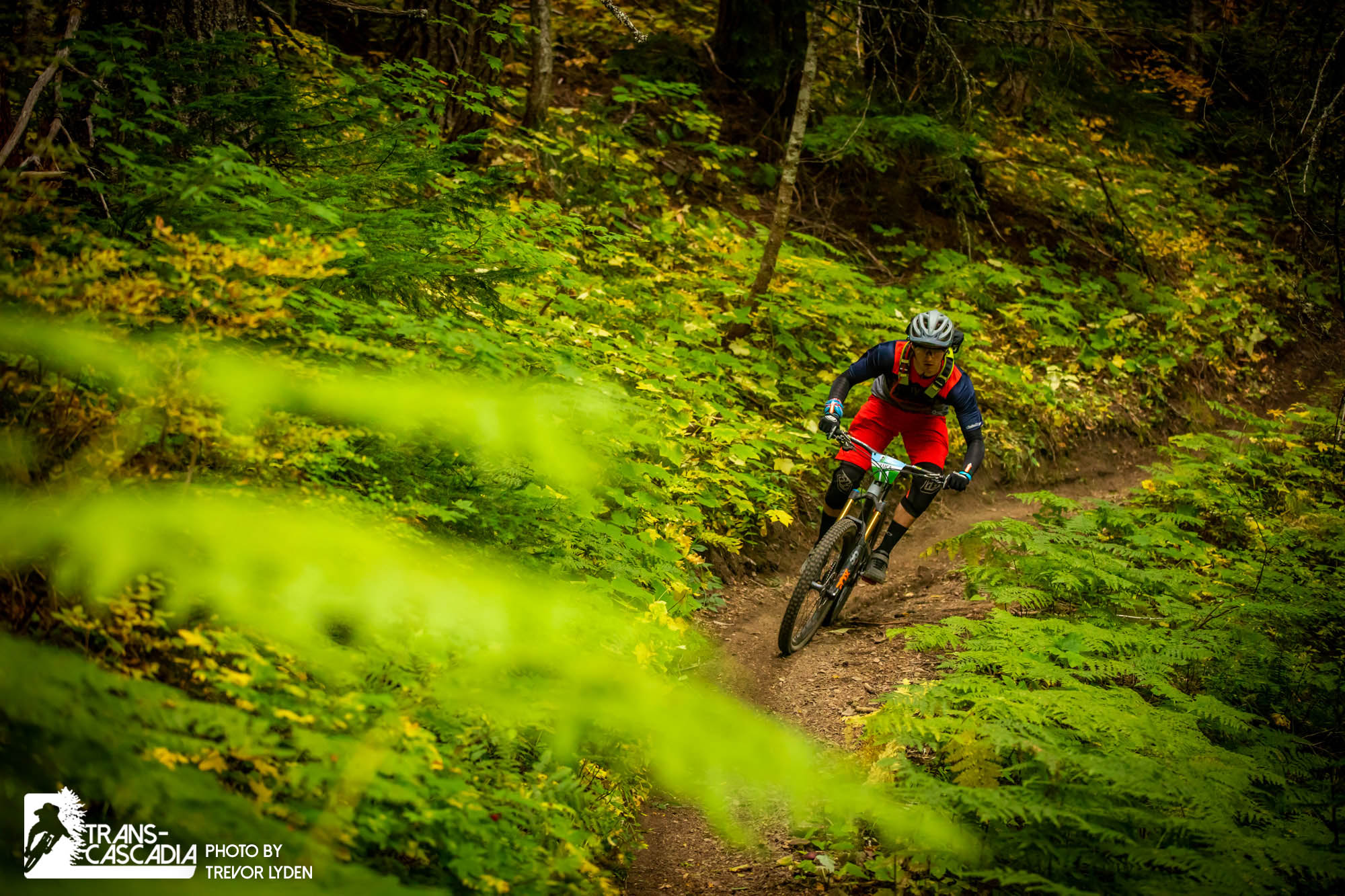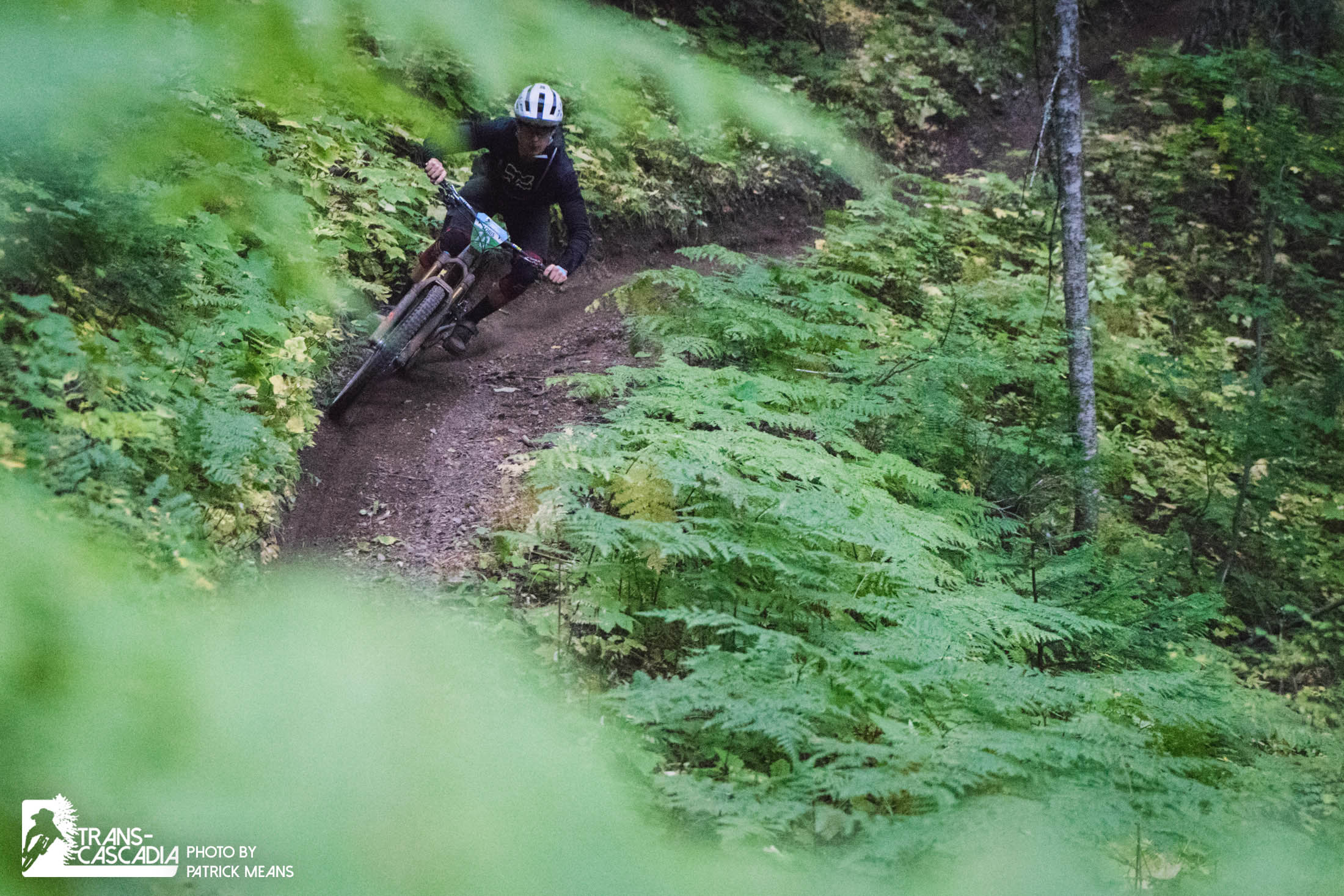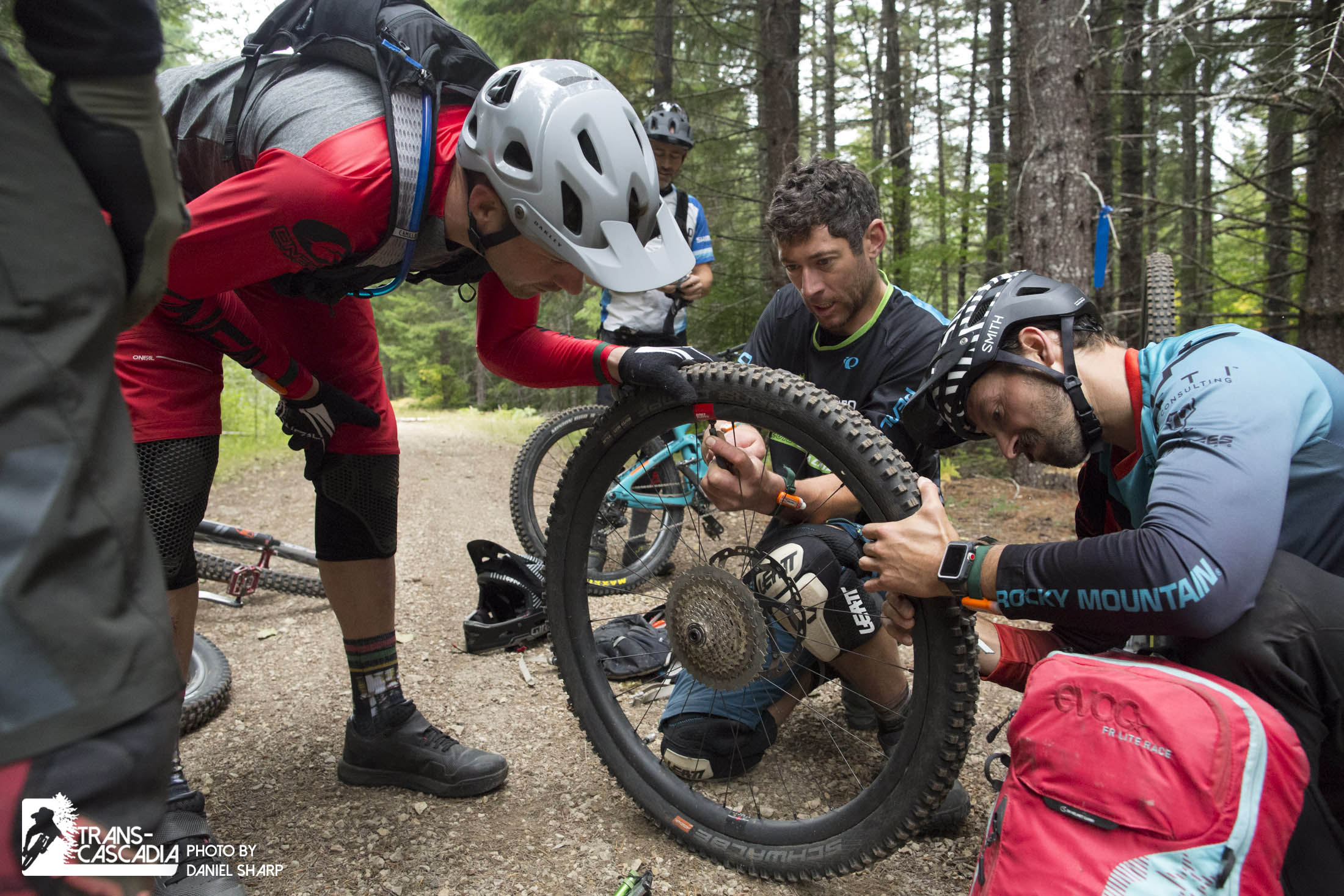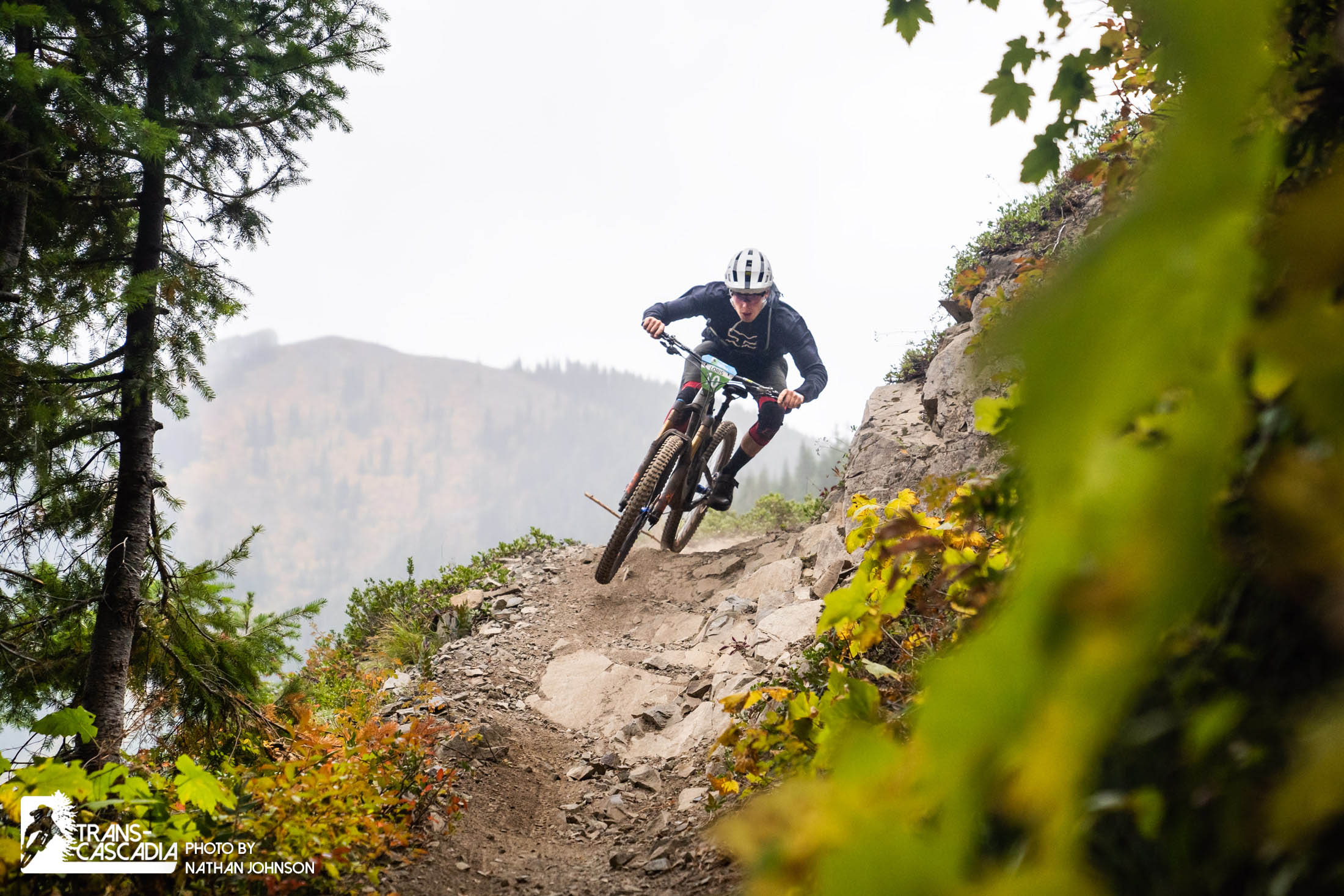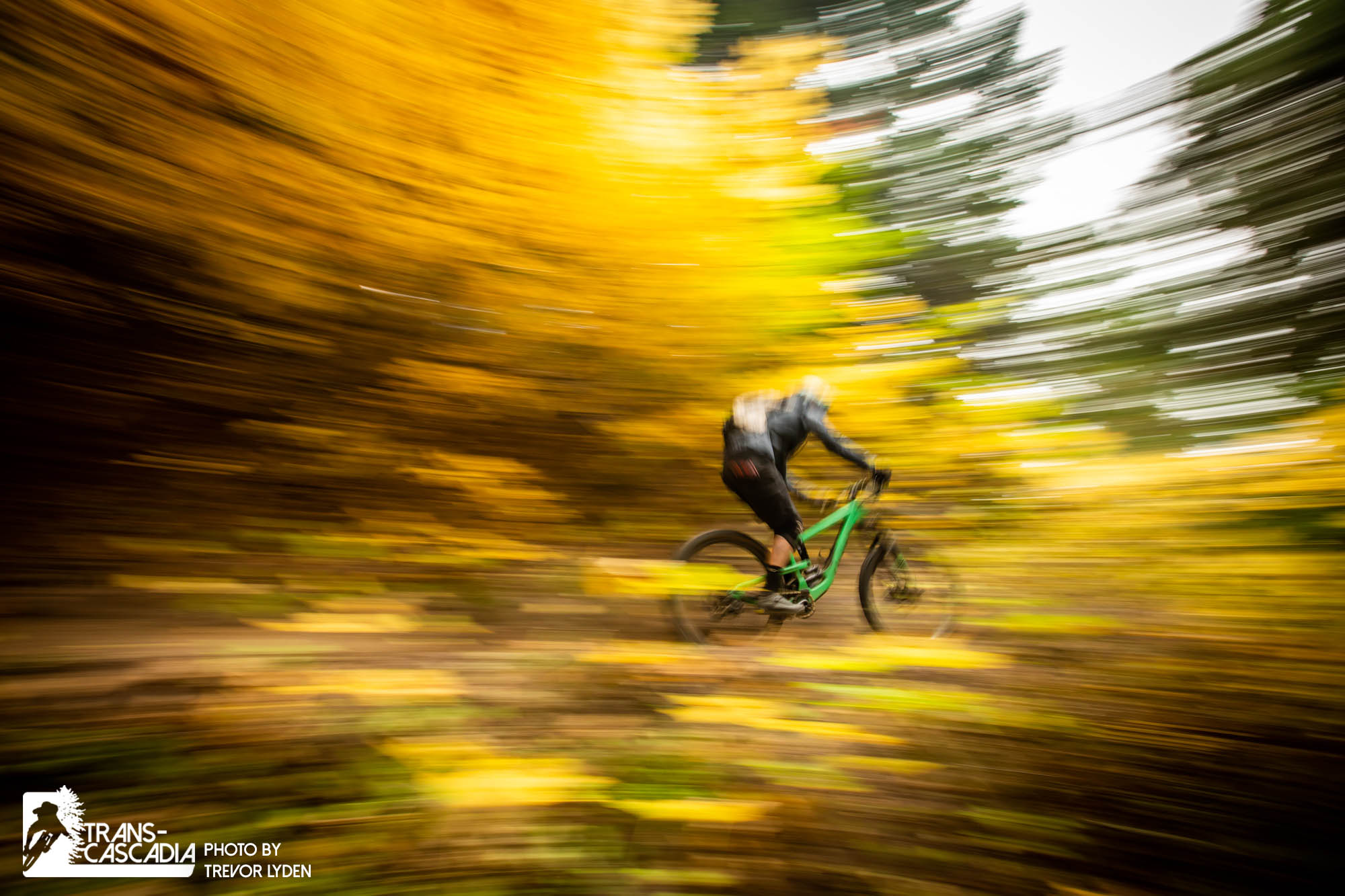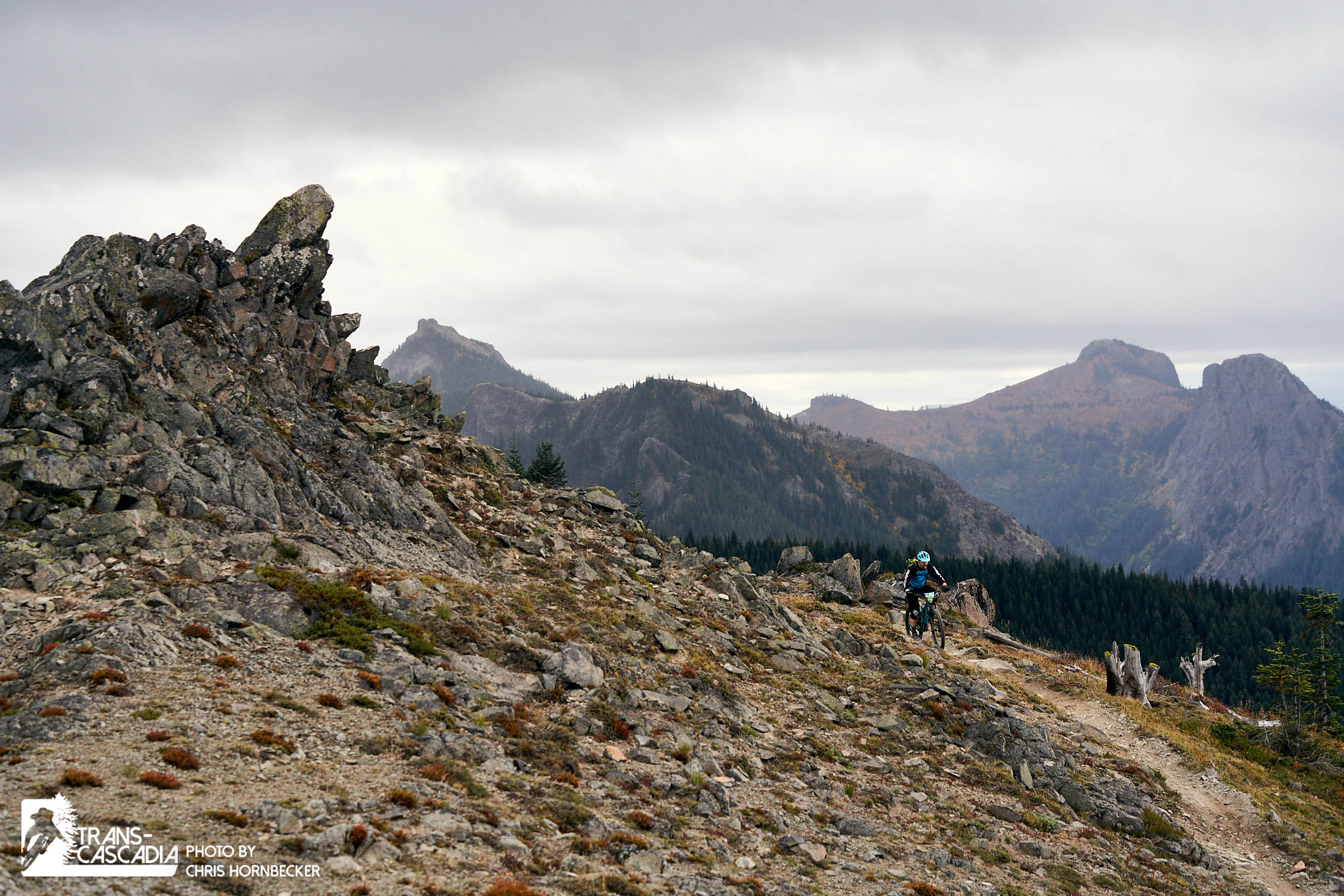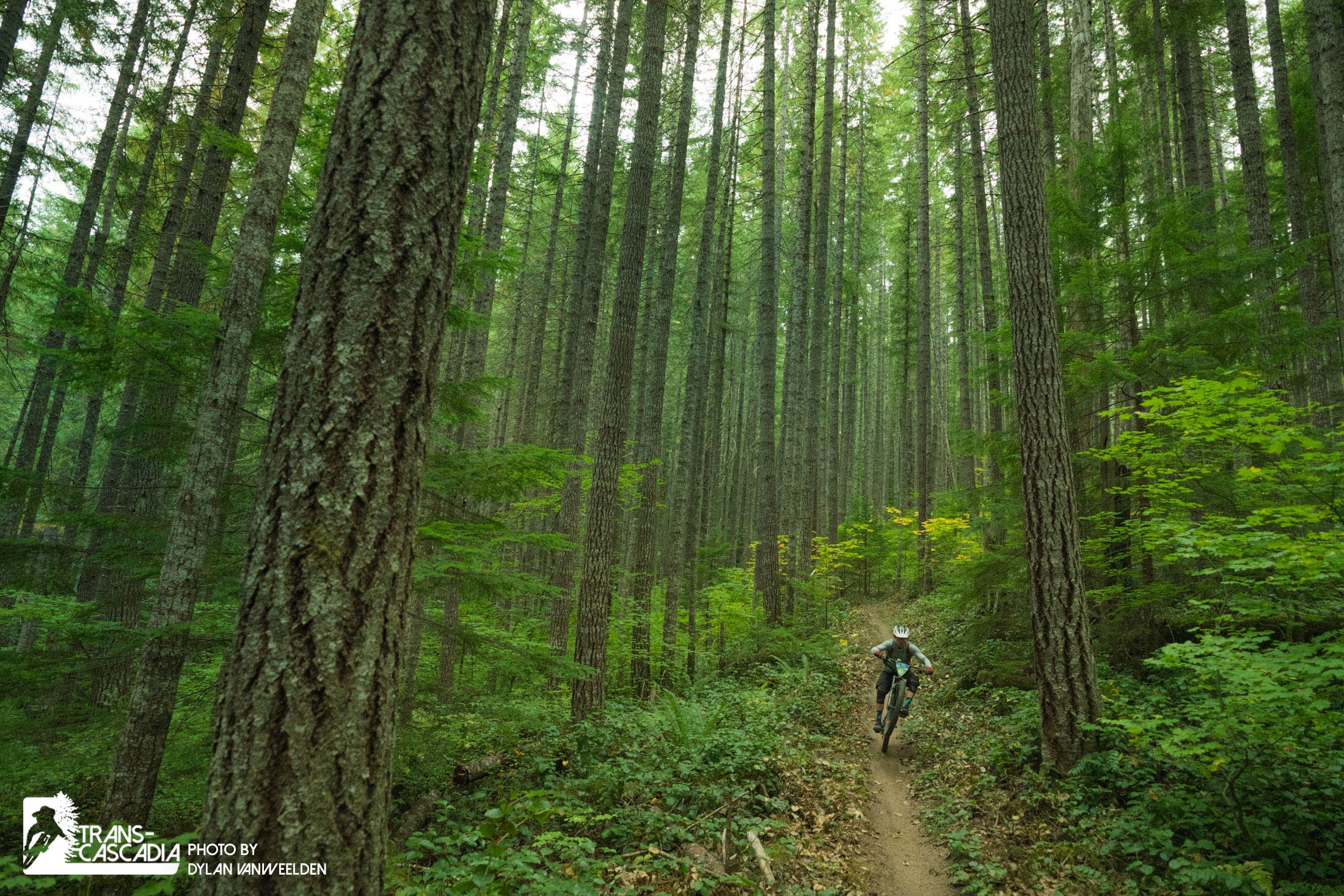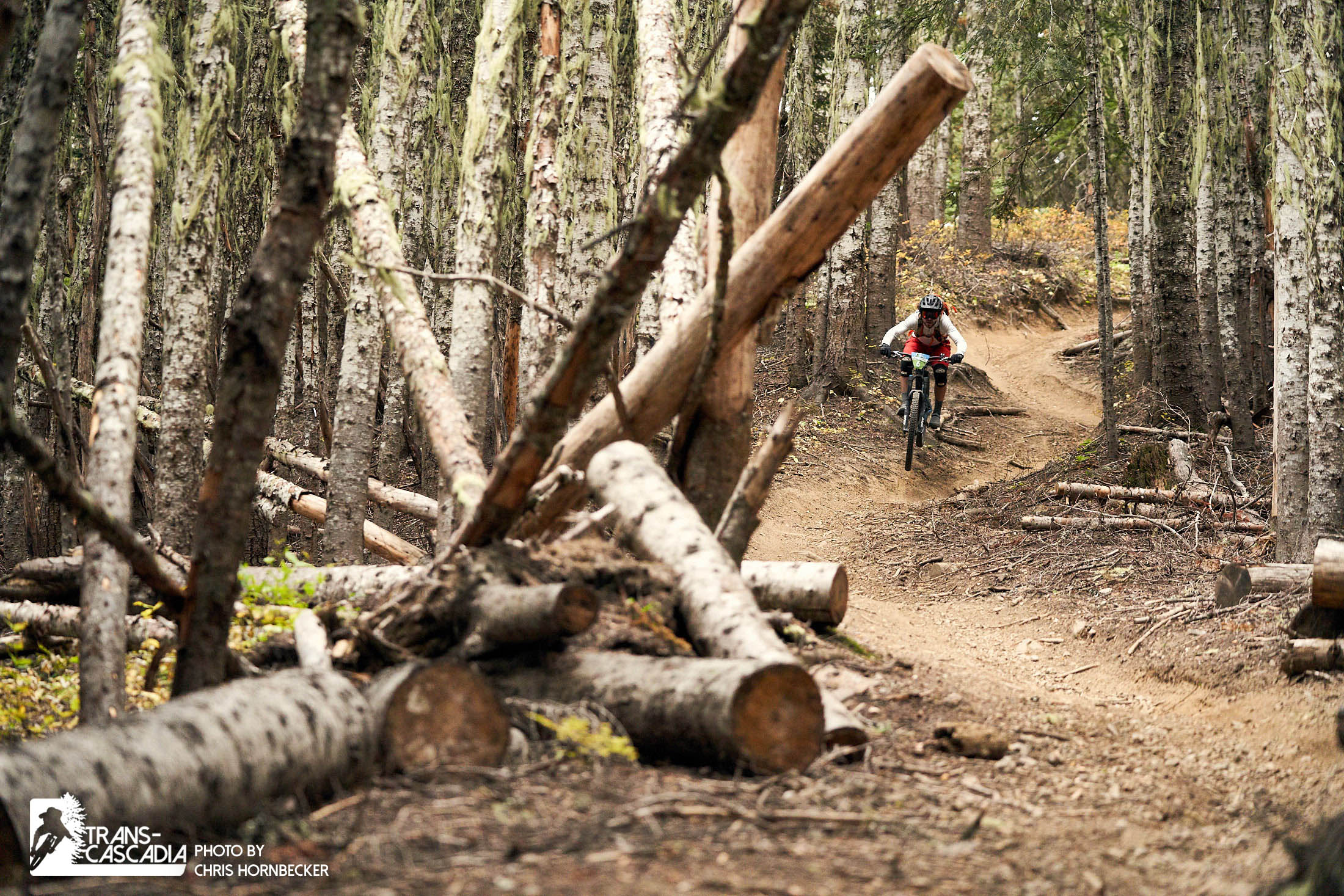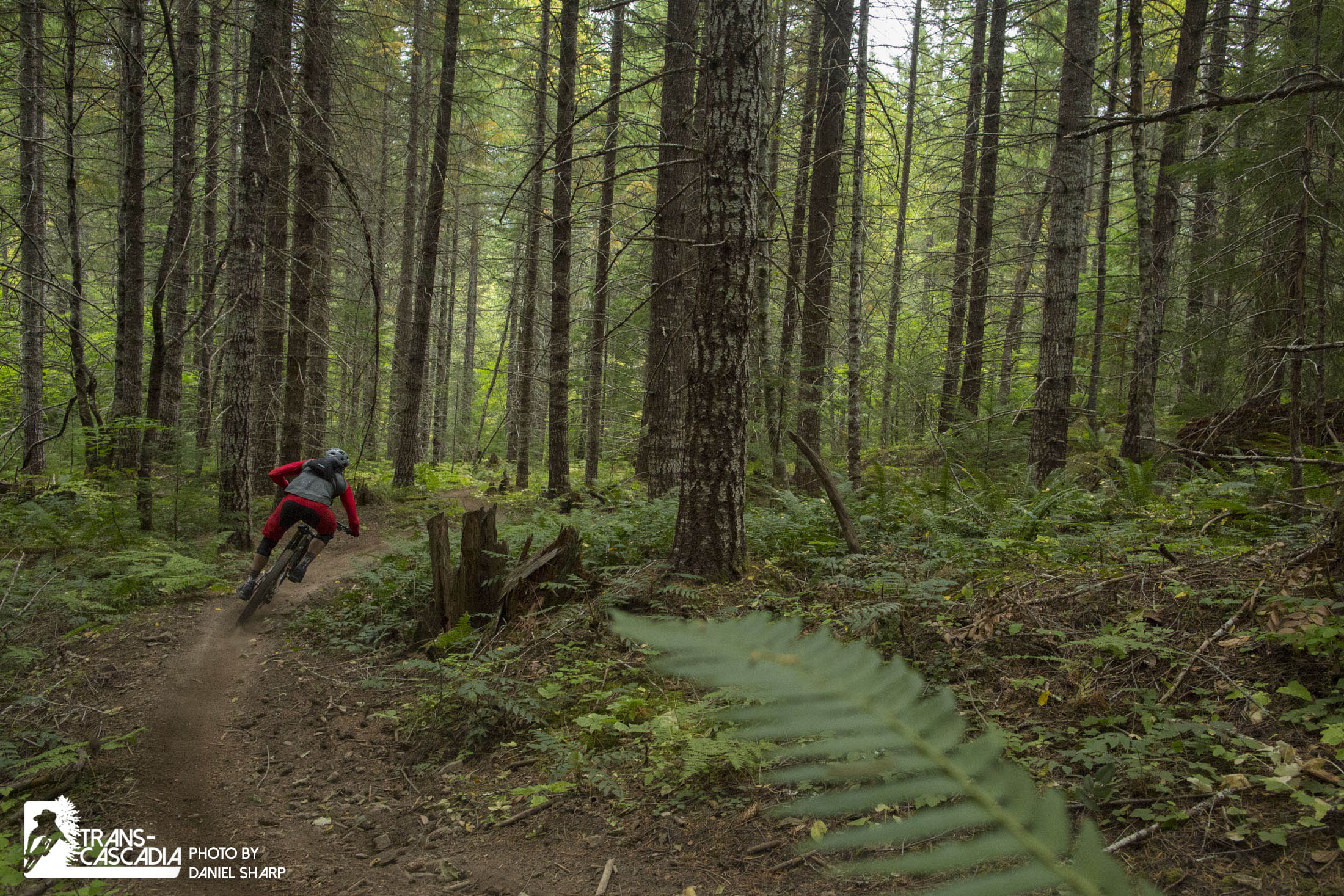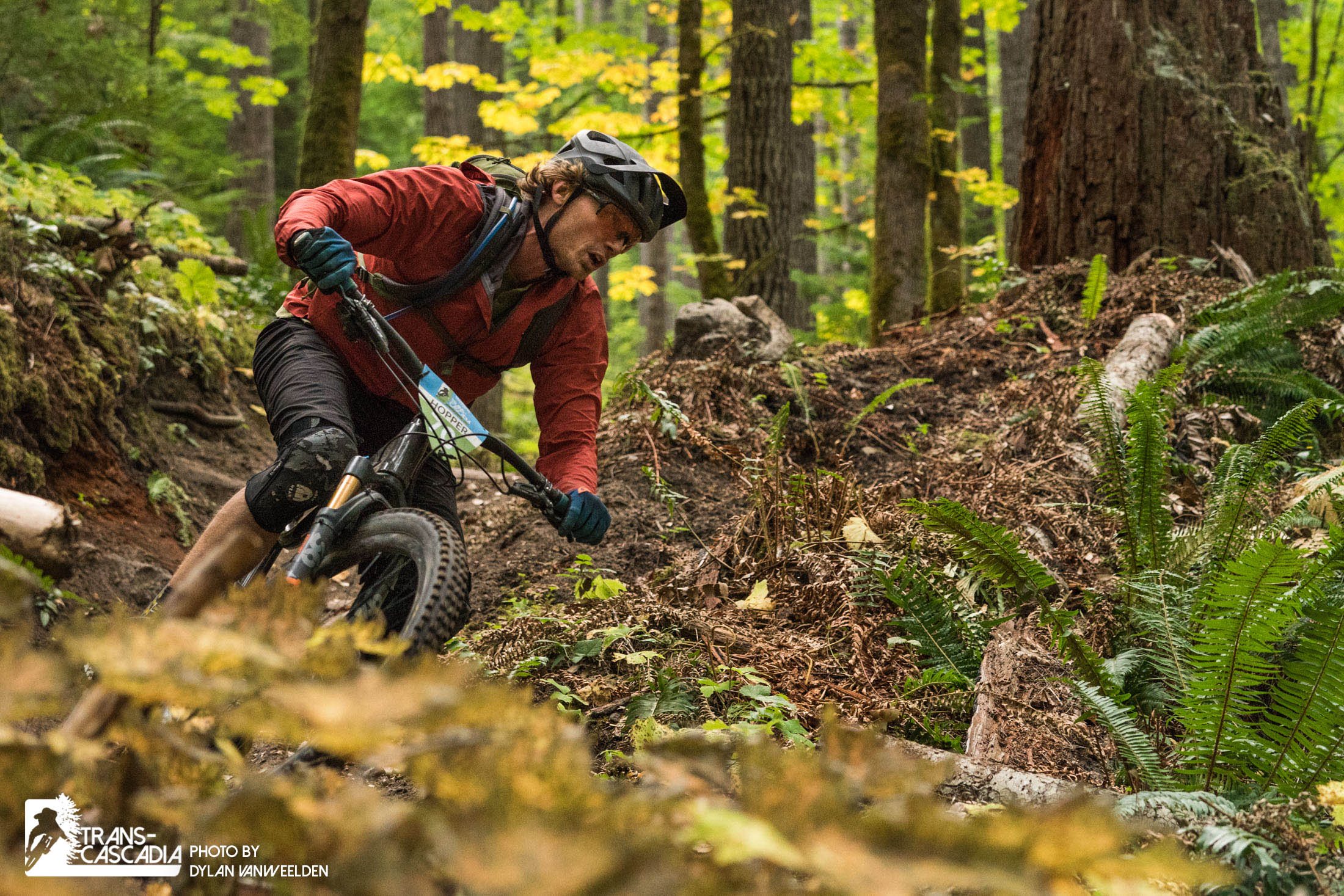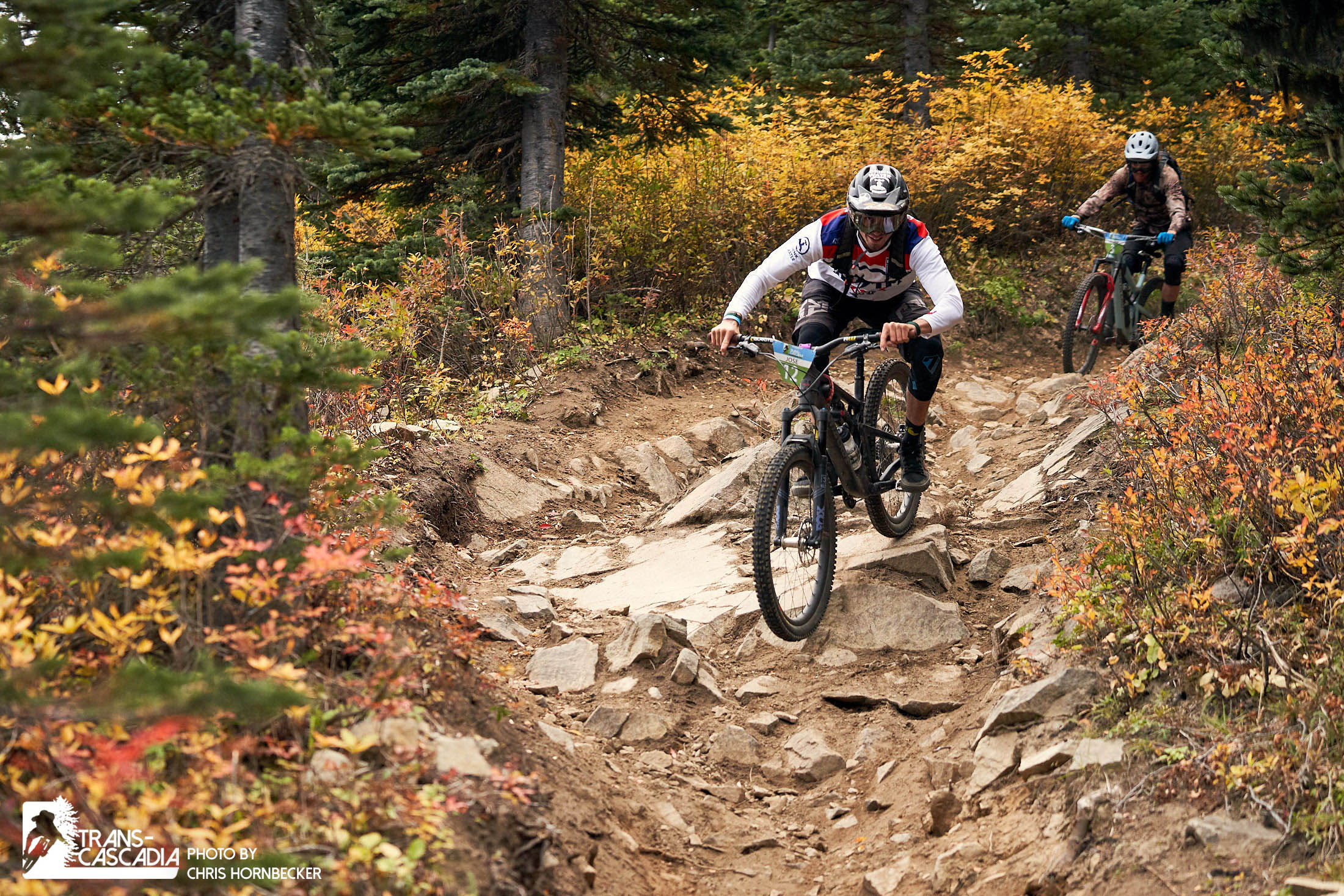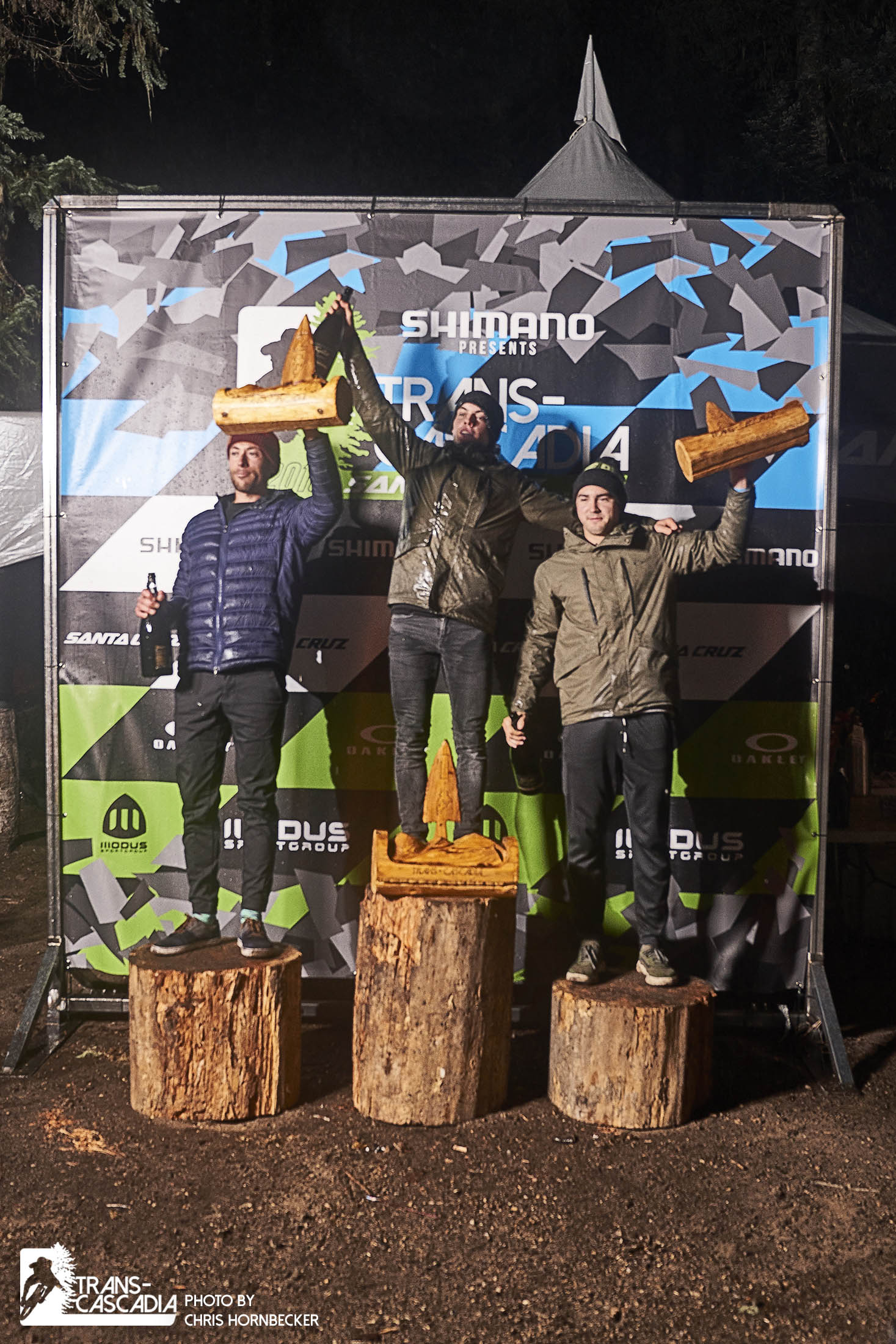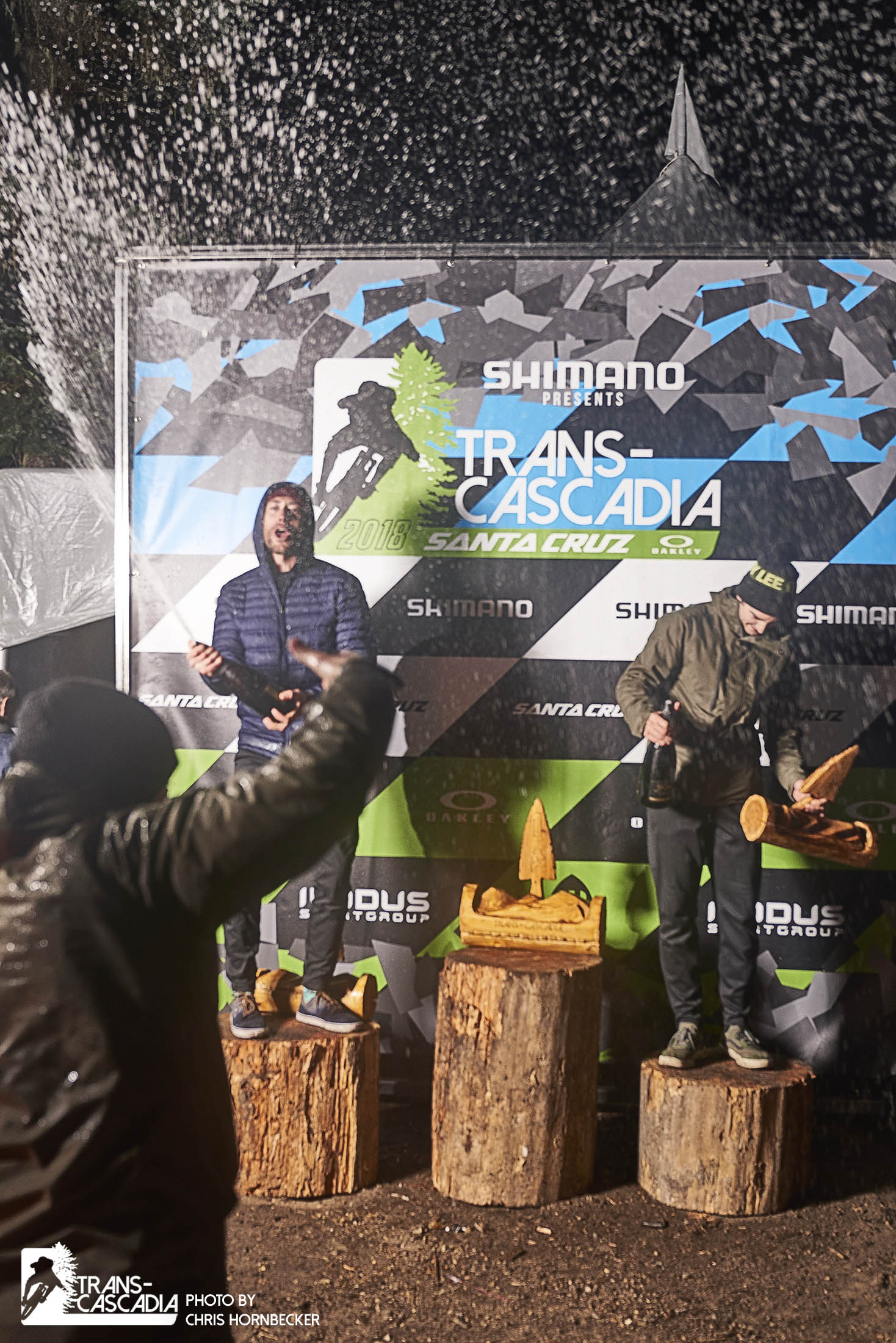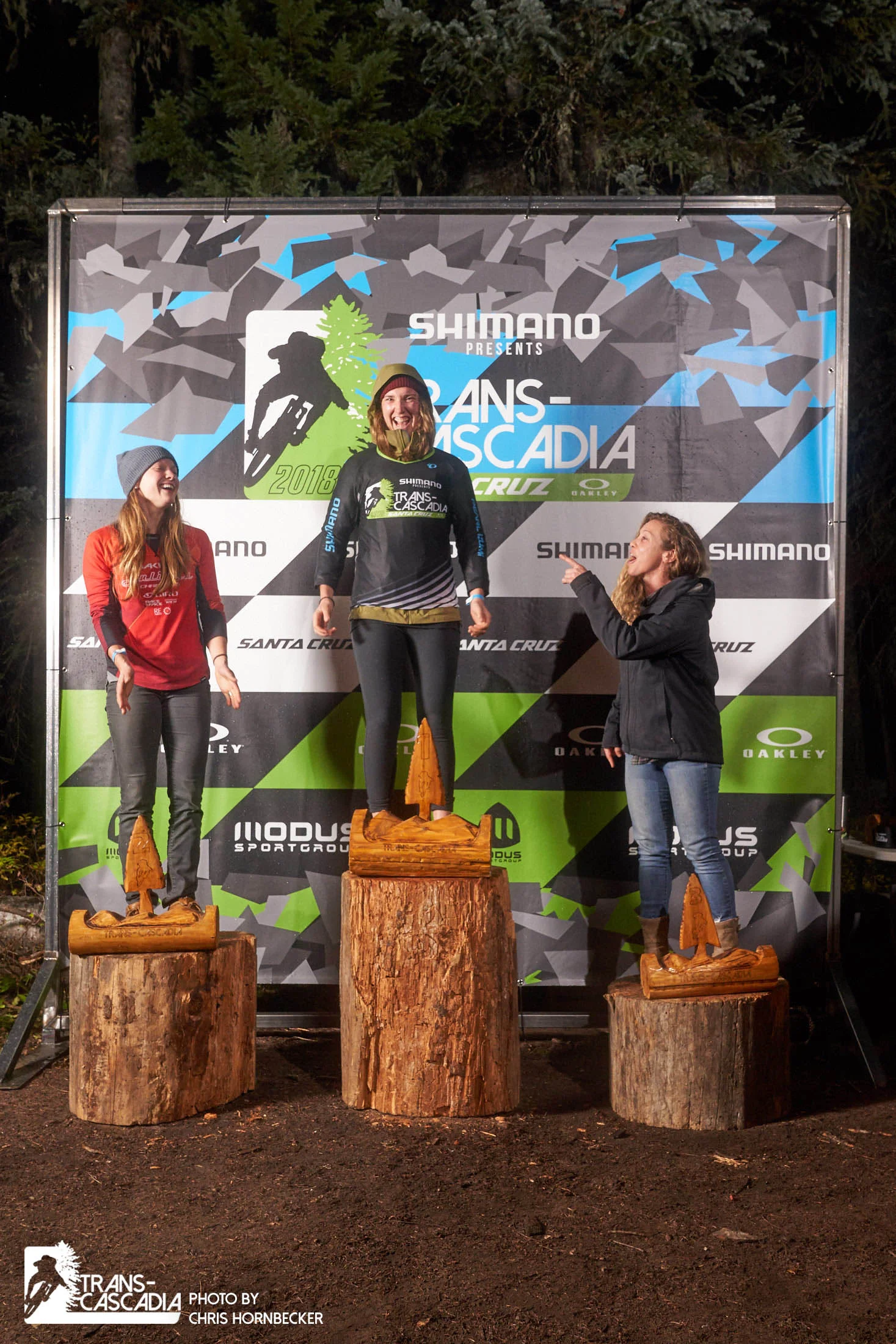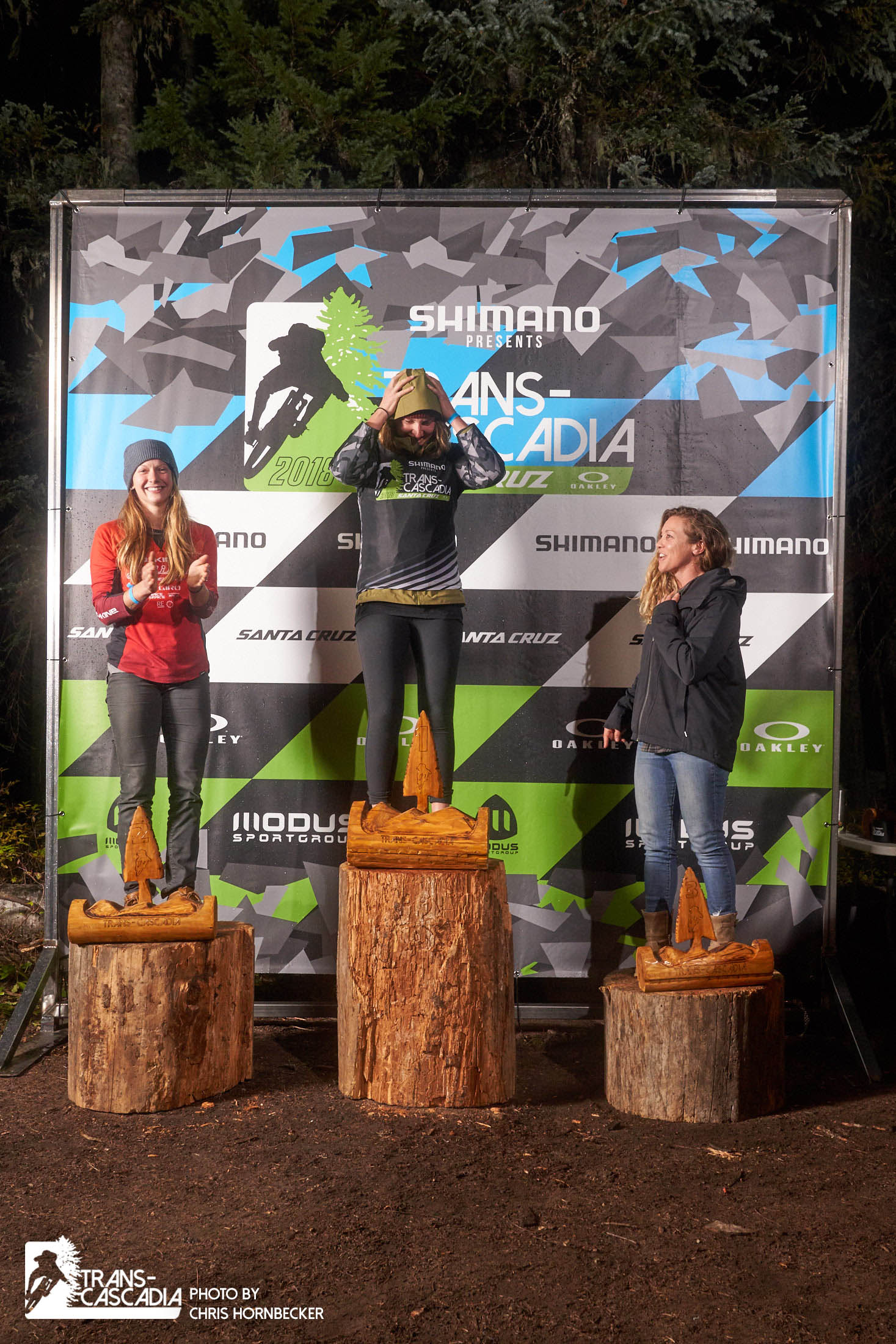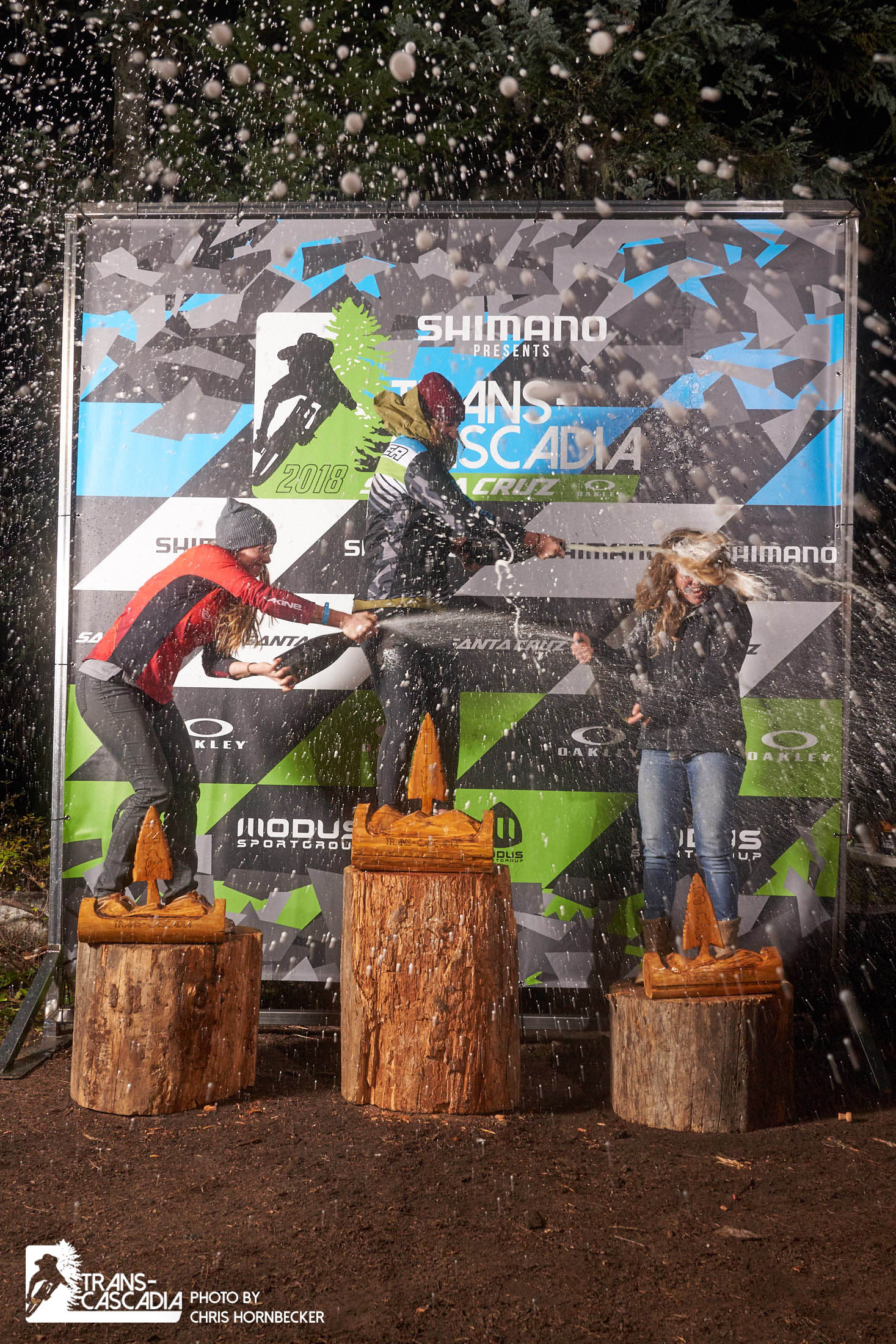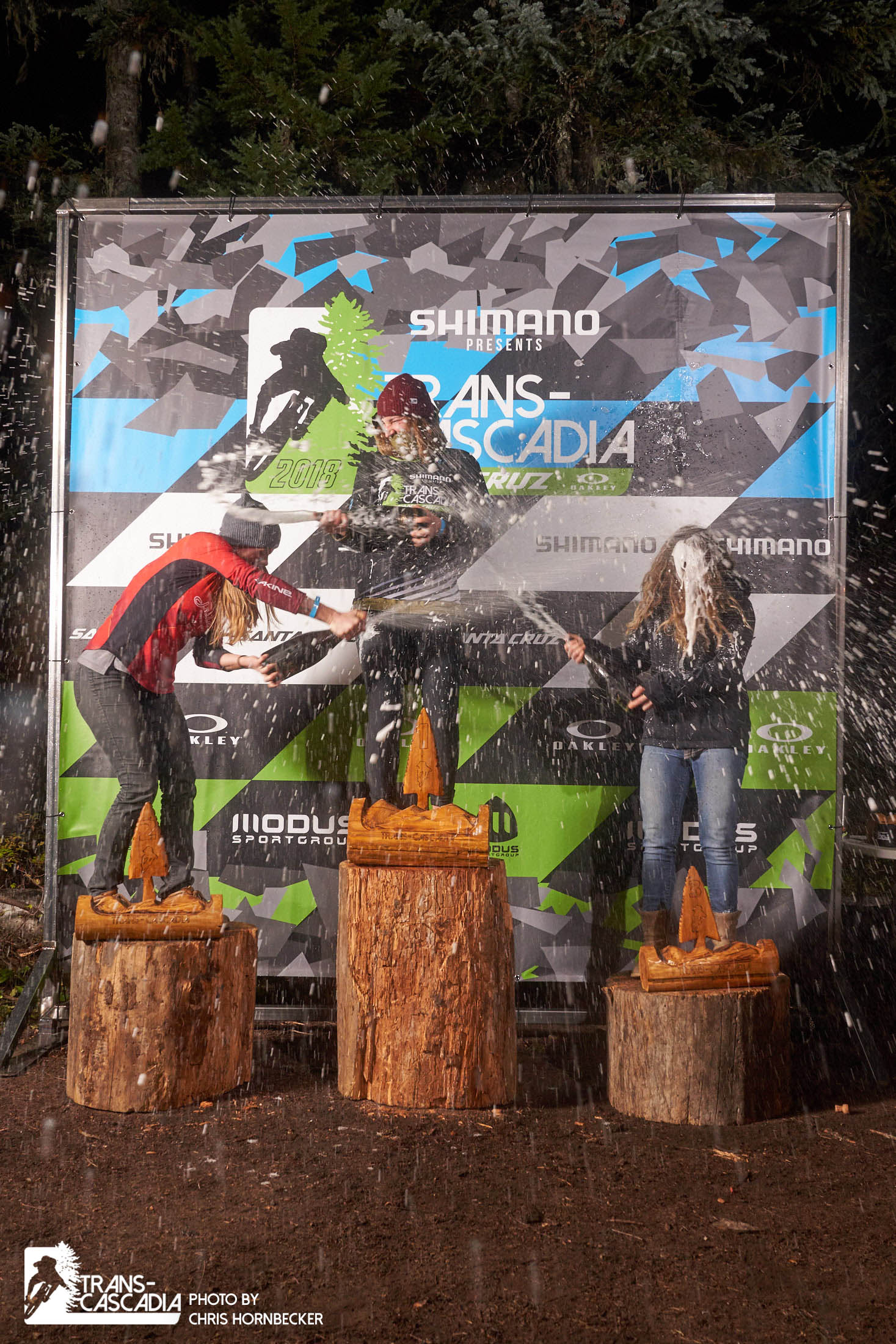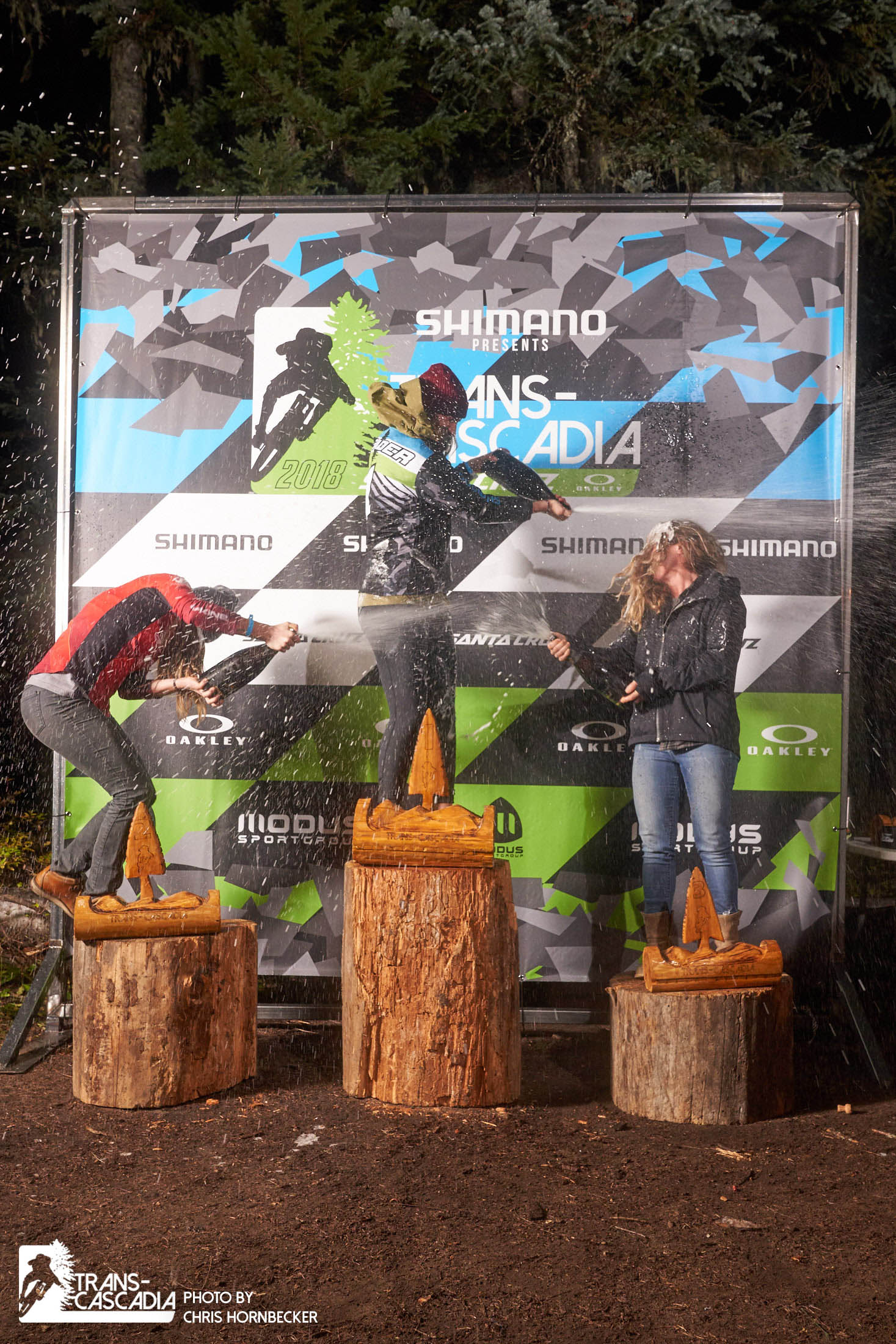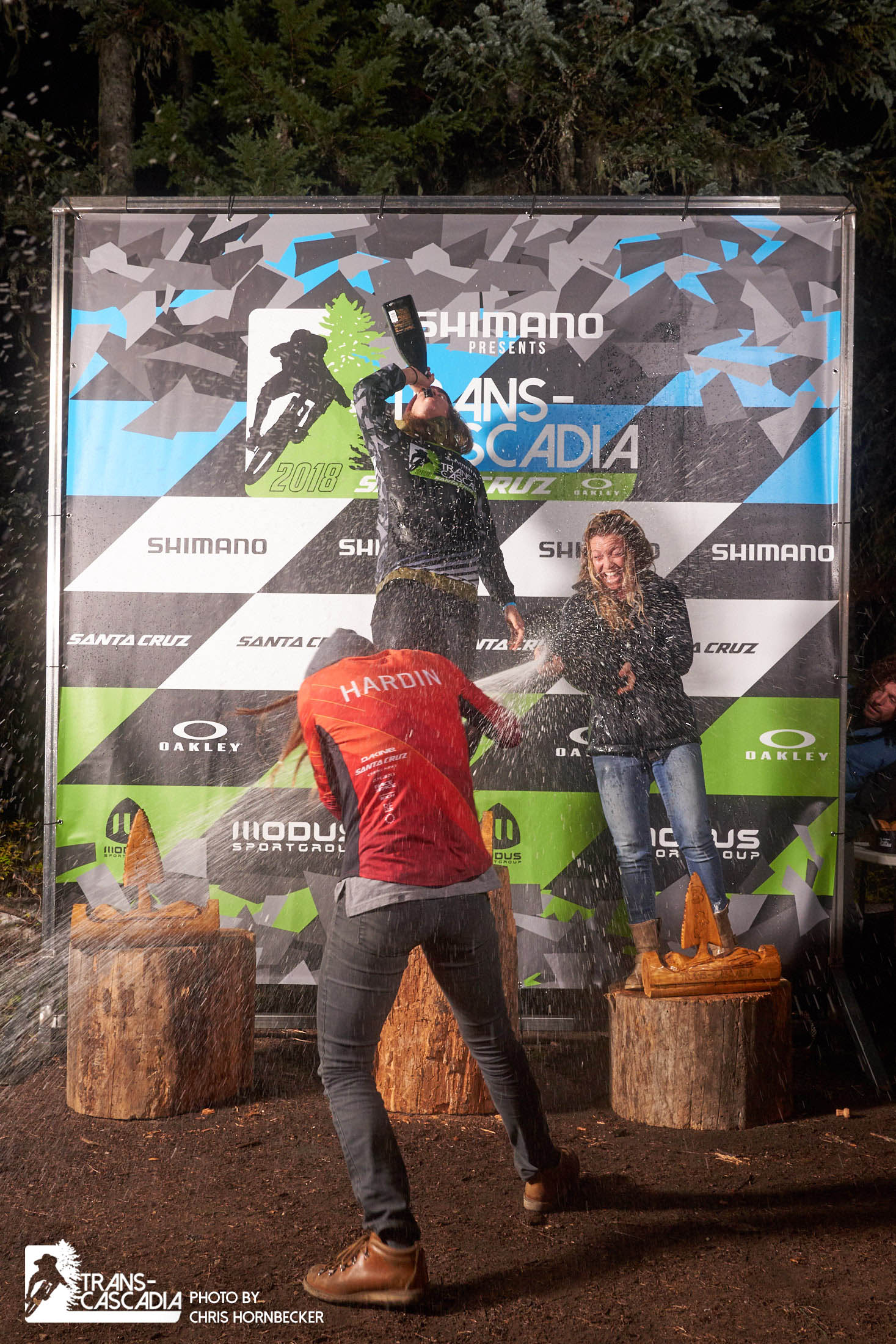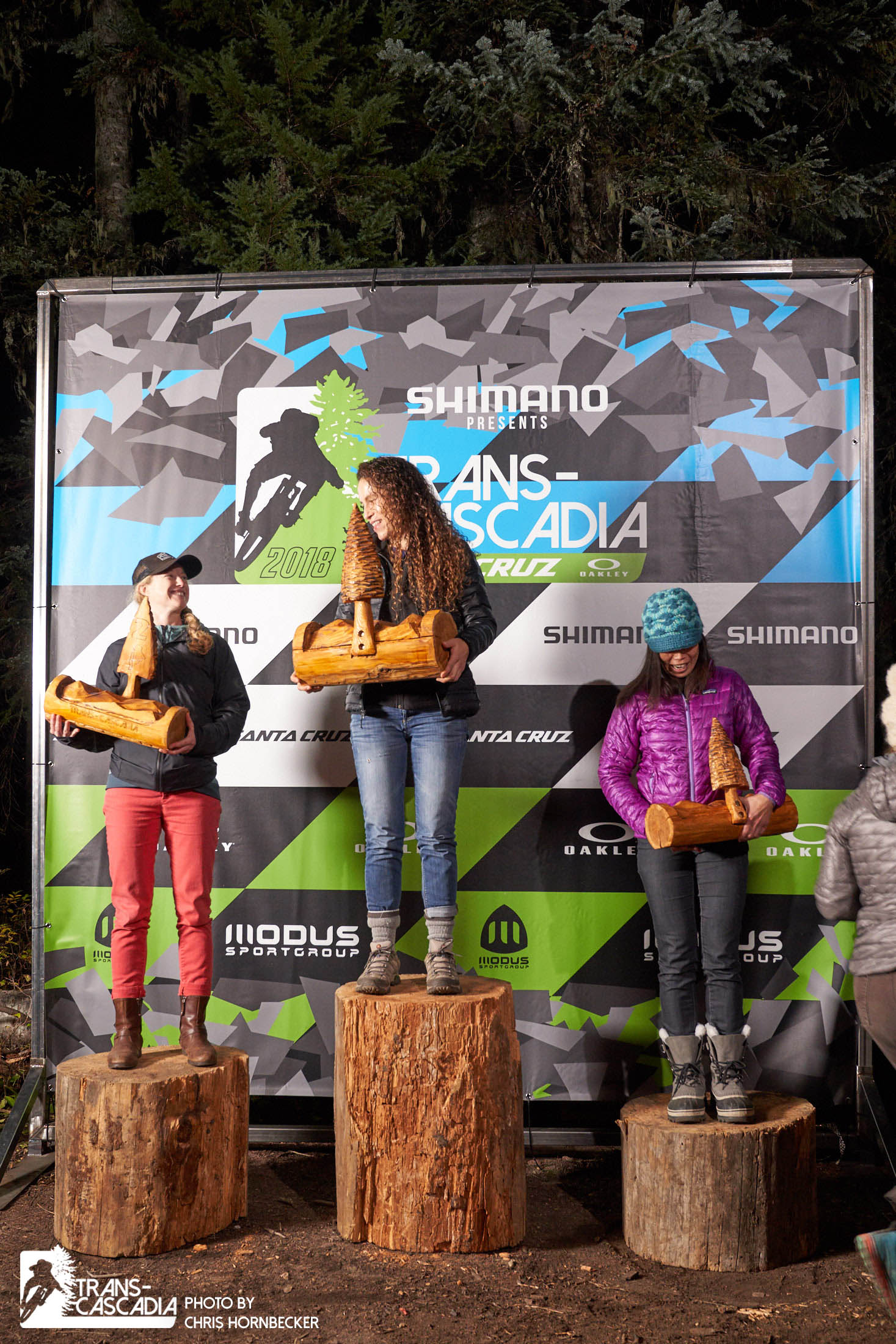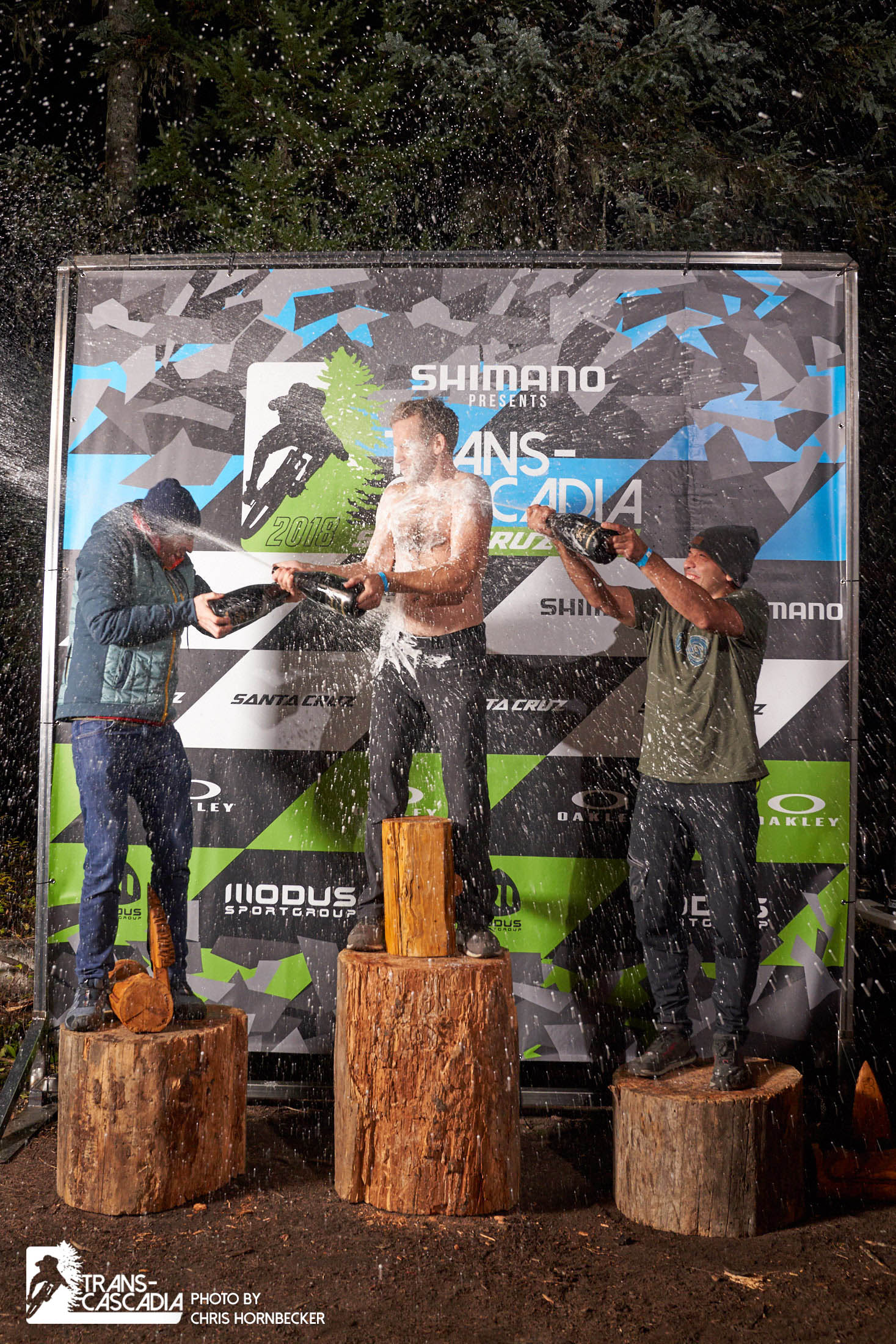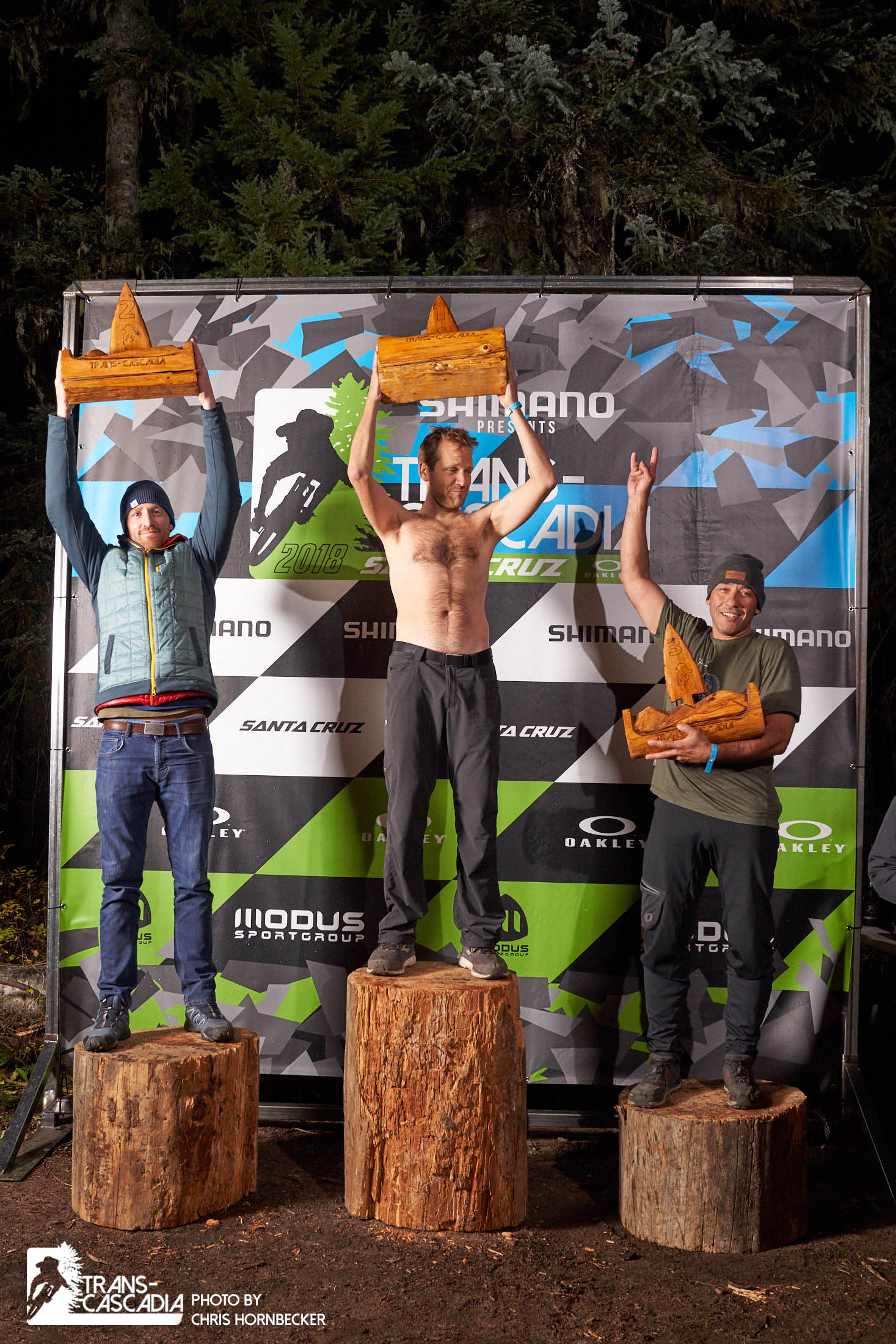
NEWS
Trailblazing Change: The Journey of Trans-Cascadia and Our Ten For Trails Legacy Fundraise
Established in 2015, Trans-Cascadia 501(c)(3) has become a cornerstone of dedication and commitment in the world of mountain biking and trail stewardship. Born from the vision of seasoned bike industry professionals, our non-profit organization has aimed to protect and restore backcountry mountain bike trails in the Pacific Northwest while making trail advocacy accessible to all riders. As we continue to evolve, we are excited to reignite our annual Ten For Trails fundraiser, a crucial initiative to support the long-term sustainability of our trail stewardship efforts.
Established in 2015, Trans-Cascadia 501(c)(3) has become a cornerstone of dedication and commitment in the world of mountain biking and trail stewardship. Born from the vision of seasoned bike industry professionals, our non-profit organization has aimed to protect and restore backcountry mountain bike trails in the Pacific Northwest while making trail advocacy accessible to all riders. As we continue to evolve, we are excited to reignite our annual Ten For Trails fundraiser, a crucial initiative to support the long-term sustainability of our trail stewardship efforts.
Let’s take a quick ride through our history—jumping into how our vision came to life, how we’ve grown, and the essential role our volunteers play in reshaping the world of trail maintenance and mountain biking.
The start
Trans-Cascadia emerged from a shared passion for mountain biking and a commitment to preserving the natural beauty and rugged trails of the Pacific Northwest. From the beginning, our focus has been on two main goals: safeguarding and restoring backcountry trails and making trail advocacy inclusive and accessible. This dual mission is fueled by our team’s expertise and dedication to maintaining a balance between outdoor recreation and environmental stewardship.
Photo by Mike Thomas - 2021
Trail Work: A Labor of Love
Since our inception, we’ve made significant strides in maintaining and enhancing the trails in the Cascade Mountain Range. Our mission to reclaim, build, maintain, and protect backcountry mountain bike trail resources has led to some impressive achievements:
Over 30,000 Volunteer Hours: Our dedicated volunteers have contributed countless hours to trail maintenance, playing a crucial role in preserving and enhancing the multiple-use backcountry trail networks across Cascadia.
750+ Miles of Single Track Maintained: Through comprehensive maintenance efforts, we’ve rehabilitated over 100 miles of trails, ensuring they remain enjoyable and accessible for all riders.
Annual Maintenance of 100 Miles: Each year, we actively maintain 100 miles of trail, demonstrating our ongoing commitment to keeping the Cascade Mountain Range’s trails in top condition.
$1.2 Million Investment: We’ve invested over $1.2 million in our trail advocacy efforts, including the purchase of essential tools and equipment to support our work.
Volunteers: The Heart of Our Efforts
One of our greatest strengths is our ability to mobilize and bring together volunteers who share the same love for these trails as we do. Remy, a trail work professional and a key figure in our organization since 2018, highlights the significance of this collective effort. He says,
“What we’ve been able to do that is special is provide the expertise, tools, and techniques of professional-level trail maintenance to a large force of strong, motivated, discerning volunteers. The capacity and quality of trail work that this formula can produce over the span of a few days is truly impressive.”
Our volunteers are not just participants; they are vital contributors to our mission. By providing hands-on experience and engaging in rigorous trail maintenance, they help ensure the preservation and improvement of backcountry trails. Their dedication transforms our vision of a well-maintained trail network accessible to all into a reality.
The Unique Blend: Racing and Stewardship
Pictures from races of years past by Joshua Lawton, Mike Thomas, Dylan VanWeelden, and Chris Hornbecker.
Our innovative approach to trail advocacy includes a distinctive element: our race. What started as a blind-format backcountry race has evolved into a six-day event offering a curated big-mountain backcountry experience. This race combines primitive single-track, gourmet food, and social activities, blending competition with community.
The race not only brings the community together to experience epic backcountry trails but also celebrates both the trails themselves and the vibrant community that supports them. The fees from the race, along with government-funded project work, play a crucial role in our ability to maintain and enhance these trails. We are deeply grateful for these contributions, as they enable us to continue our stewardship efforts and ensure the trails remain in top condition for everyone to enjoy. This unique relationship between racing and trail stewardship sets us apart, showcasing our ability to integrate a passion for biking with a commitment to environmental and community-focused initiatives.
Building Lasting Relationships
Our efforts extend beyond maintaining trails. We build lasting relationships with land managers, hikers, horseback riders, and conservation communities. By working collaboratively with these groups, we ensure that our trail restoration efforts have a lasting impact on the region’s outdoor recreation landscape.
As Xuân Mai Võ, a dedicated community member and sawyer, aptly puts it,
“TC isn’t just about the mission of trail work and mountain biking advocacy. It is an organization that brings people together and reminds us what community and shared vision are all about: hard work, dedication, results, and, most of all, the deep connections that are formed under the canopy of trees and within the shadows of majestic mountains.”
Ten For Trails: Renewed
To ensure the long-term sustainability of our trail stewardship efforts, we are excited to relaunch our Ten For Trails fundraiser as an annual campaign. Donations will be accepted year-round, but raffle prizes will only be awarded during the yearly campaign push. This initiative is vital for preserving the stunning landscapes and accessibility of backcountry mountain bike trails throughout the Cascadia region.
Why Ten For Trails?
Our goal is to preserve these trails on a five-year rotation, ensuring they remain open and enjoyable for outdoor enthusiasts for generations to come. The Ten For Trails campaign is essential for supporting these extensive restoration efforts, allowing us to keep the backcountry trails in prime condition.
How You Can Support:
The success of Ten For Trails relies on the generous support of our sponsors, volunteers, and community members. Whether it’s $10 or more, every contribution directly supports our mission and enables us to keep delivering unforgettable trail experiences. By participating in Ten For Trails, you are not only supporting trail maintenance but also contributing to the vibrant community of riders and outdoor enthusiasts who cherish these backcountry paths.
Looking Ahead
Our journey from 2015 to today reflects our unwavering commitment to both trail maintenance and community building. Through the tireless efforts of volunteers, the support of the biking community, and the integration of unique fundraising events like Ten For Trails and our race, we hope to continue to make a profound impact on the trails of the Pacific Northwest.
As we reignite Ten For Trails with this annual push, we look forward to further strengthening our trail stewardship legacy and ensuring that the backcountry trails we cherish remain vibrant and accessible for future generations. Join us in this vital endeavor and be a part of the movement to preserve the epic landscapes of Cascadia!
Trans-Cascadia announces no race for 2022 but opens registration for four Work Parties in the Pacific Northwest.
Trans-Cascadia (TC) announces that they will not hold a race this year but will host four Work Parties throughout the Pacific Northwest to continue their efforts in restoring and recovering backcountry trail networks. These events are supported by longtime sponsors Shimano and Santa Cruz, and registration is on their website.
Keeping their focus, the crew at TC is taking this year to explore new areas in the Cascade Mountain Range, research trail networks, and reanalyze their format for a future edition of the Trans-Cascadia backcountry enduro race.
"This is not the end of Trans-Cascadia,” says Director Nick Gibson “Rather, it's the next chapter that will allow us to continue our advocacy and restoration efforts and scheme up the next adventure that racers can be sure will be authentic and core to our principles.”
Trans-Cascadia brought blind enduro stage racing to North America in 2015, when they hosted their first event in Oakridge, Oregon. Since then, the event has migrated north through the Cascade Mountain Range to stay true to the ethics of blind racing and also in pursuit of finding new trail experiences.
"As we take this small step back, we can focus 100% on the best trails, routes, food, drink, and entertainment options," says Tommy Magrath, Race Operations. “So not if, but when we bring the race back, we have the best of the best. We always strive for that, and that is what we are capable of. This year we hope people will join us on the deep scouting missions to uncover the lost loam that lays beneath the blowdowns and buried trails. It's going to be a great year!"
TC's efforts have restored 590 miles (give or take) of trails to date. Revived trail networks and fresh riding opportunities have been made possible through well-planned Work Parties and massive efforts from the trail community.
"We look forward to creating new riding experiences, but most importantly, the shared experience of hard work and friendship restoring trails on the mountainside," says Director Nick Gibson. "All this trail work we've accomplished up to this point would not be possible without our community of volunteers and racers, and we need their help this summer."
The R&R campaign stands for research, reclamation and restoration of trails, riding, and reconsidering the future of the sport - and maybe a little rest and relaxation. The Work Parties include breakfast, lunch and dinner each day from a camp chef, brewski's, non-alcoholic bevies, delicious snacks, and the occasional cocktail. Nightlife is as expected at any TC event, full of celebrating each day's accomplishments.
The rough itinerary for these four-day events is:
Thursday - Travel day with a little afternoon/evening ride
Friday - Saturday - trail work (by bike, moto, and foot)
Sunday - ride day with a complimentary shuttle of the maintained trails
"Cascadia's sweet trails, those known and unknown, have piqued imaginations, taught us lessons, and made us stronger,” says Alex. “After racing and learning along our path south to north, we begin 2022 in the south, back to the cradle of Oakridge Oregon, yet we still have business to attend to in the Gifford Pinchot and Okanogan National Forests. Bring your tent, bike, and favorite trail tool if you have one, and we will provide everything else you need to work and play and get some R&R.”
Trans-Cascadia's crew will help teach new skills and efficiencies for trail work, including chainsaw operation and safety, drainage improvement, brushing and clearing trail corridors, tool maintenance, and how to create a good work plan. These events are limited to 75 participants and offer a big mountain experience typical of TC riding culture. The cost to attend is nothing; all they ask is that participants come and lend a hand in the collective effort to keep backcountry trails open.
Work Party Dates:
June 16th-19th - Fire Restoration on Heckletooth Mountain in Oakridge, Oregon
July 14-17 - Restoring Pyramid Mountain and surrounding trails in the Entiat Ranger District near Chelan, Washington
September 15th-18th - Restoring the Basalt Peak Trail network near Wenatchee, WA
October 13th - 16th - Restoring trail on Strawberry Mountain in the Gifford Pinchot National Forest or Oakridge Oregon depending on Snow levels.
_________
You're invited to join one or all of the Trans-Cascadia Work Parties this summer, where you'll have some fun helping keep the PNW backcountry trail networks open to ride. Register at Trans-Cascadia.com.
Can't make it to a work party and love backcountry trails? Consider making a donation to support their efforts.
2021 Trail Work Video
In 2021 Trans Cascadia maintained and opened 108 miles of backcountry trails and cleared 46 miles of access roads. With their continued work with the United States Forest Service, clearing remote trails remains the organization’s primary mission and one they are excited to continue.
In 2021 Trans Cascadia maintained and opened 108 miles of backcountry trails and cleared 46 miles of access roads. With their continued work with the United States Forest Service, clearing remote trails remains the organization’s primary mission and one they are excited to continue. Trans Cascadia will expand next year with the hopes of hiring two more full-time trail building staff and embarking on a program that will maintain 750 miles of the most cherished singletrack in the Pacific Northwest, including all of the trails used for the Trans Cascadia race course.
Ten for Trails proceeds directly fund trail work and also pay for tools used by maintenance crews. This year, title sponsor Pearl Izumi has created Trans Cascadia replica jerseys, and is donating $10 for each jersey sold. Both Men’s and Women’s versions are available. In total Trans Cascadia has invested over $490,854 labor dollars invested with over 18,600 total volunteer hours of trailwork. Both the race and fundraising like Ten for Trails allows such work to continue.
“Huge thanks to the trail builders, race directors and sponsors that bring such a grand event to life – the details, coordination, logistics and planning required to pull something like this off are next level and it truly takes a village. Trans-Cascadia is far more than a bike race, it's an experience of a lifetime” -Morgan Kurz.
Support Our Trail Building Work!
$10 from the sale of every jersey goes to Ten for Trails.
2021 Race Recap Video
In an all-new venue in the Okanogan–Wenatchee National Forest for 2021, Trans Cascadia did not disappoint. Despite a last-minute change to some stages due to ongoing fires, the race was one to remember with four incredible days of racing, camping and new friends…
In an all-new venue in the Okanogan–Wenatchee National Forest for 2021, Trans Cascadia did not disappoint. Despite a last-minute change to some stages due to ongoing fires, the race was one to remember with four incredible days of racing, camping and new friends. Based out of Foggy Dew Campground, some Washington classics were on tap for days one and two. To accommodate the last-minute change of venue, staff cut in new trails in real time for the last two days of racing. A special thanks to US Forest Service Recreation Program Manager Paul Willard for his help in facilitating the race and venue changes.
The men’s racing was tight across the four days, with two-time winner Geoff Kabush in the lead through the first two days before being usurped by Myles Morgan and Myles Trainer at the end of day three. On the final day a few mistakes by Morgan handed the victory to Trainer by mere seconds, with Aaron Bradford rounding off the podium. The women’s race was dominated by Jill Kintner, who won all four days and finished the race nearly ten minutes clear of Corinne Prevot, with Alicia Leggett coming home third.
As always, the race supports Trans Cascadia’s larger mission of reopening legacy trails in the backcountry. The Trans Cascadia staff and volunteers have clocked nearly 20,000 hours in the forest to date, with over 500 miles of public land trails maintained, and 100+ miles reclaimed. You can read more about Trans Cascadia’s trail advocacy efforts here.
Donate to help us maintain the trails.
See More from the 2021 Race
2021 Race Report // Day 4
"It's my first ever Trans-style race, I knew it would be hard, but I didn't expect back-to-back 5,000 foot days. We were all pretty tired but we were in it together,” said Jill Kintner.
Day four was the final day of racing for Trans Cascadia 2021 and anticipation was high. Like days prior, camp was bustling long before the sun began peeking through the trees with another big day on the horizon and a long, steep hike-a-bike section gaining nearly 4,000 feet waiting to test the field.
Day four was the final day of racing for Trans Cascadia 2021 and anticipation was high. Like days prior, camp was bustling long before the sun began peeking through the trees with another big day on the horizon and a long, steep hike-a-bike section gaining nearly 4,000 feet waiting to test the field.
"It's my first ever Trans-style race, I knew it would be hard, but I didn't expect back-to-back 5,000 foot days. We were all pretty tired but we were in it together,” said Jill Kintner.
The vibes were strong and cohesive as the group slowly began pushing up the mountain. The steep ascents were matched with ripping fast descents on a very special section of trail, a delight for racers and staff alike. As the day progressed, camp emptied and nearly everyone climbed back up, heckling every rider who rolled to the end of a glorious final stage.
"I would say the camaraderie, the collective effort of everyone pushing really hard for miles and miles in the mountains, having a really good time, are some of my favorite things in the world. That's what we did for four days! It was perfect," said Michelle Parker.
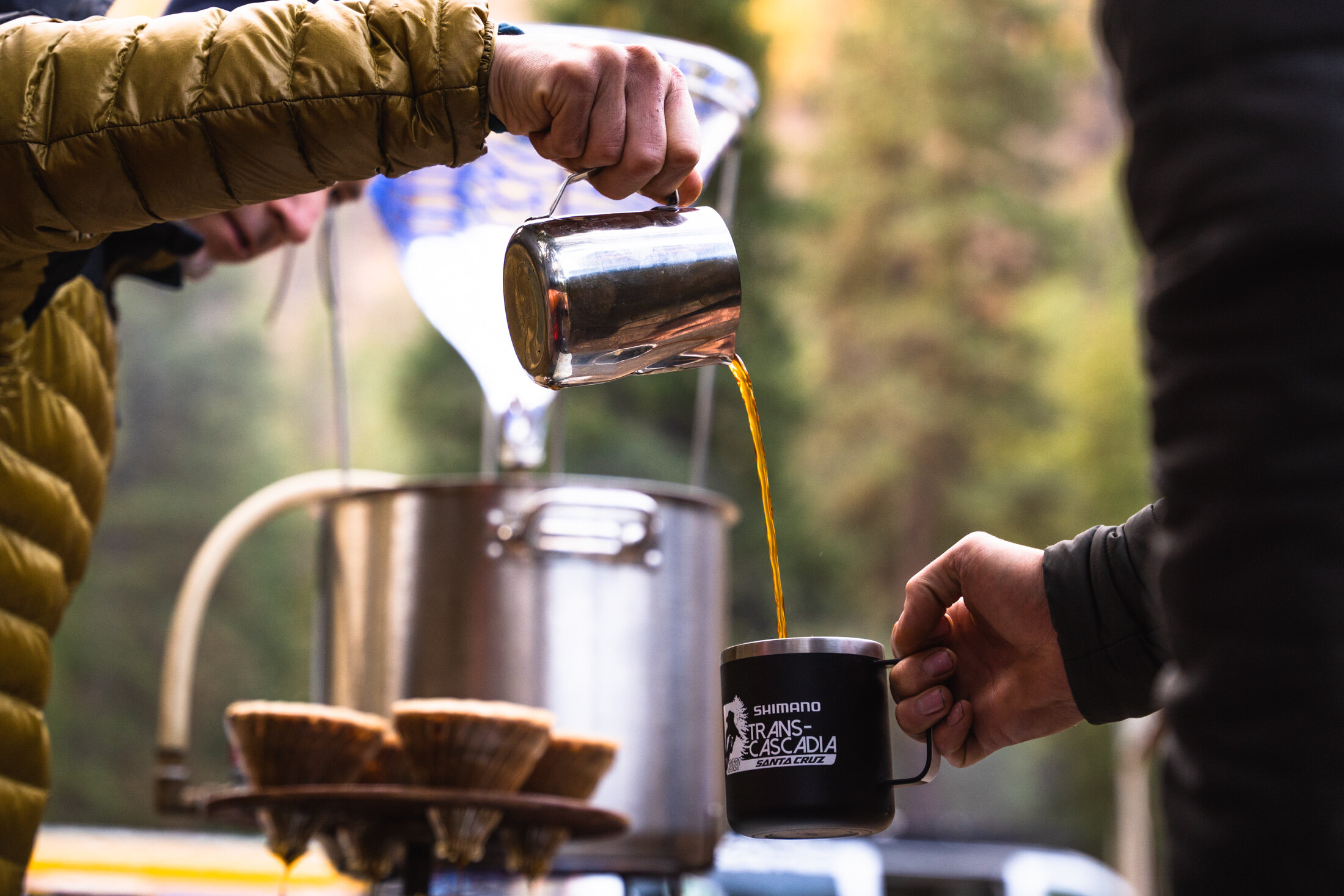
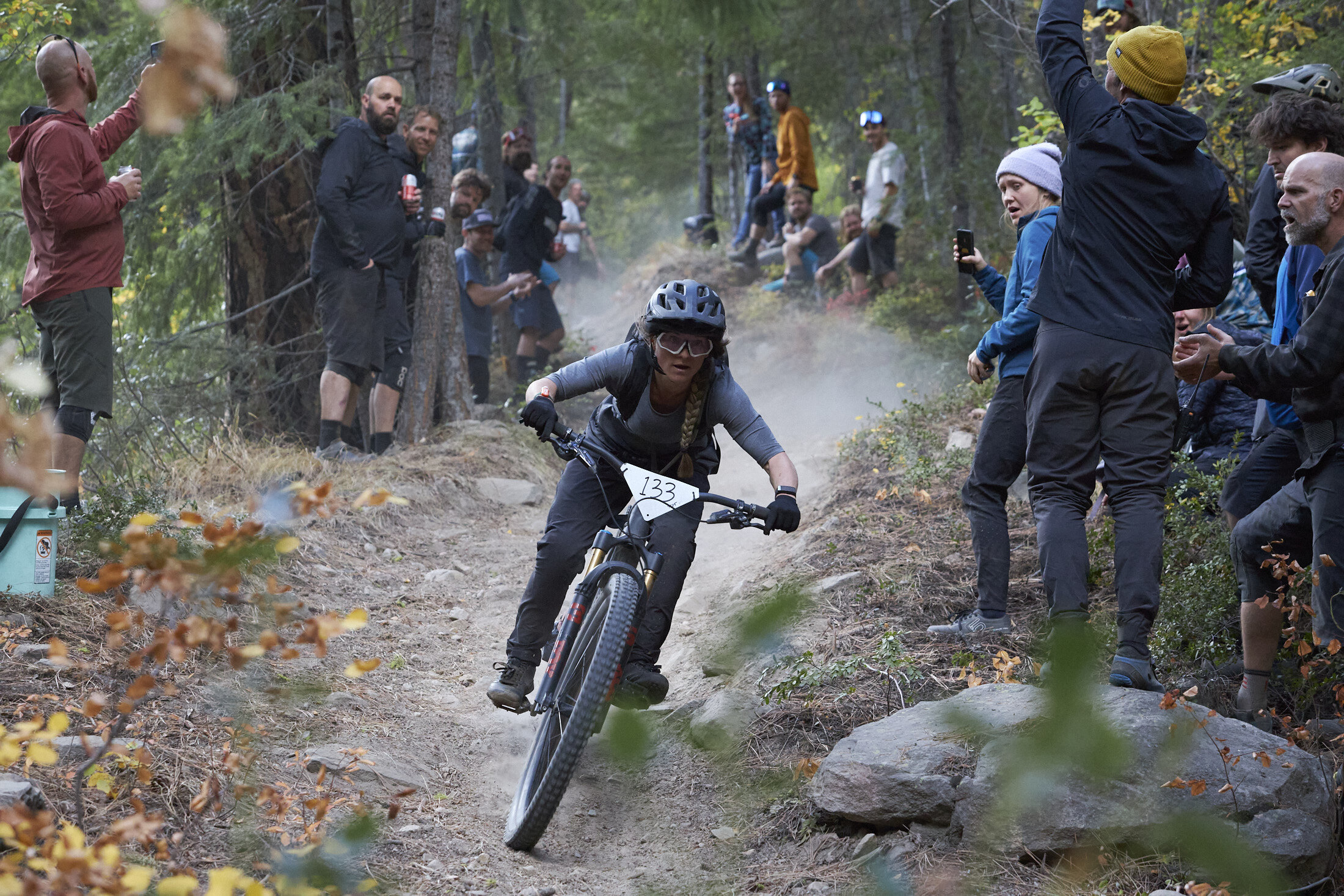
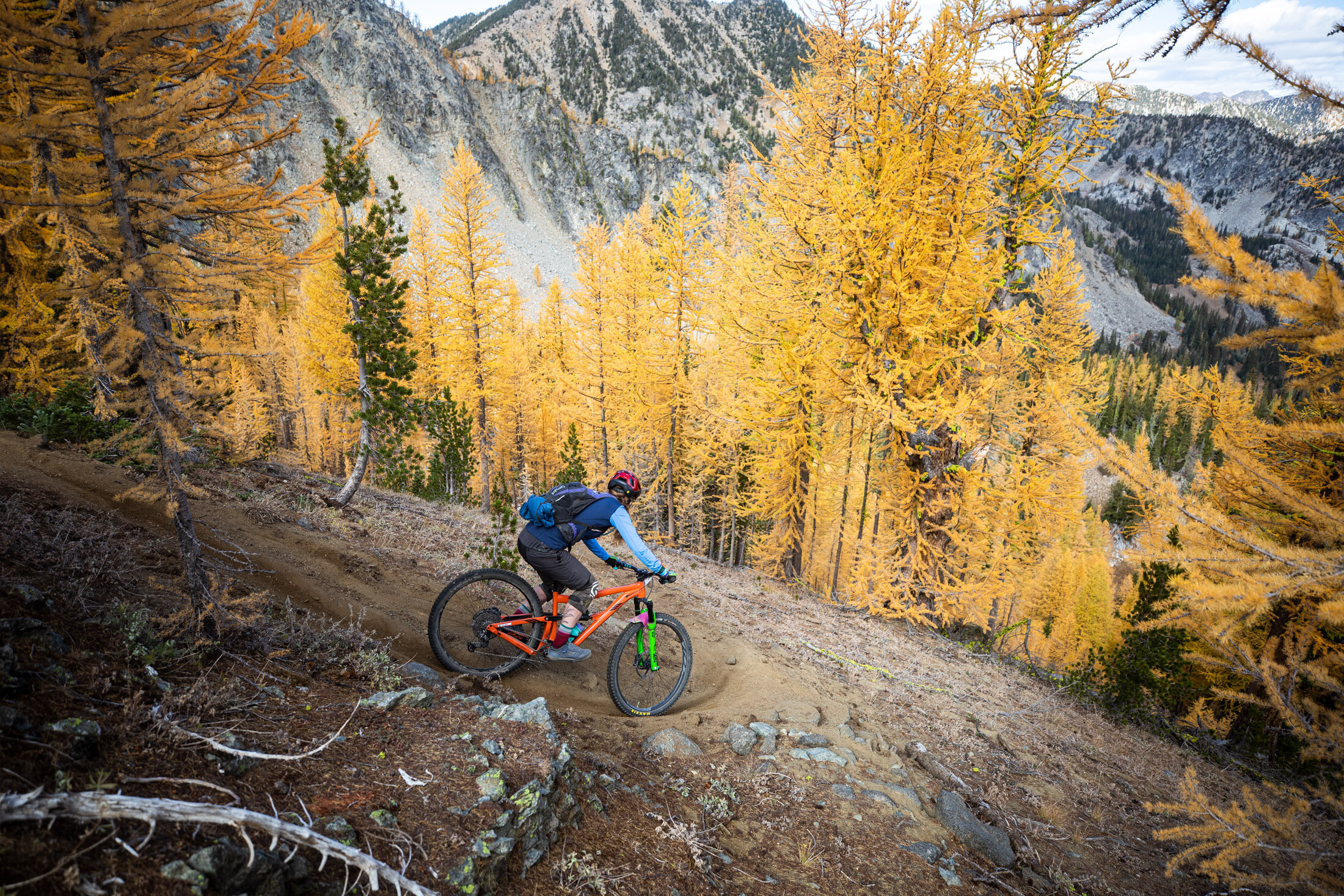
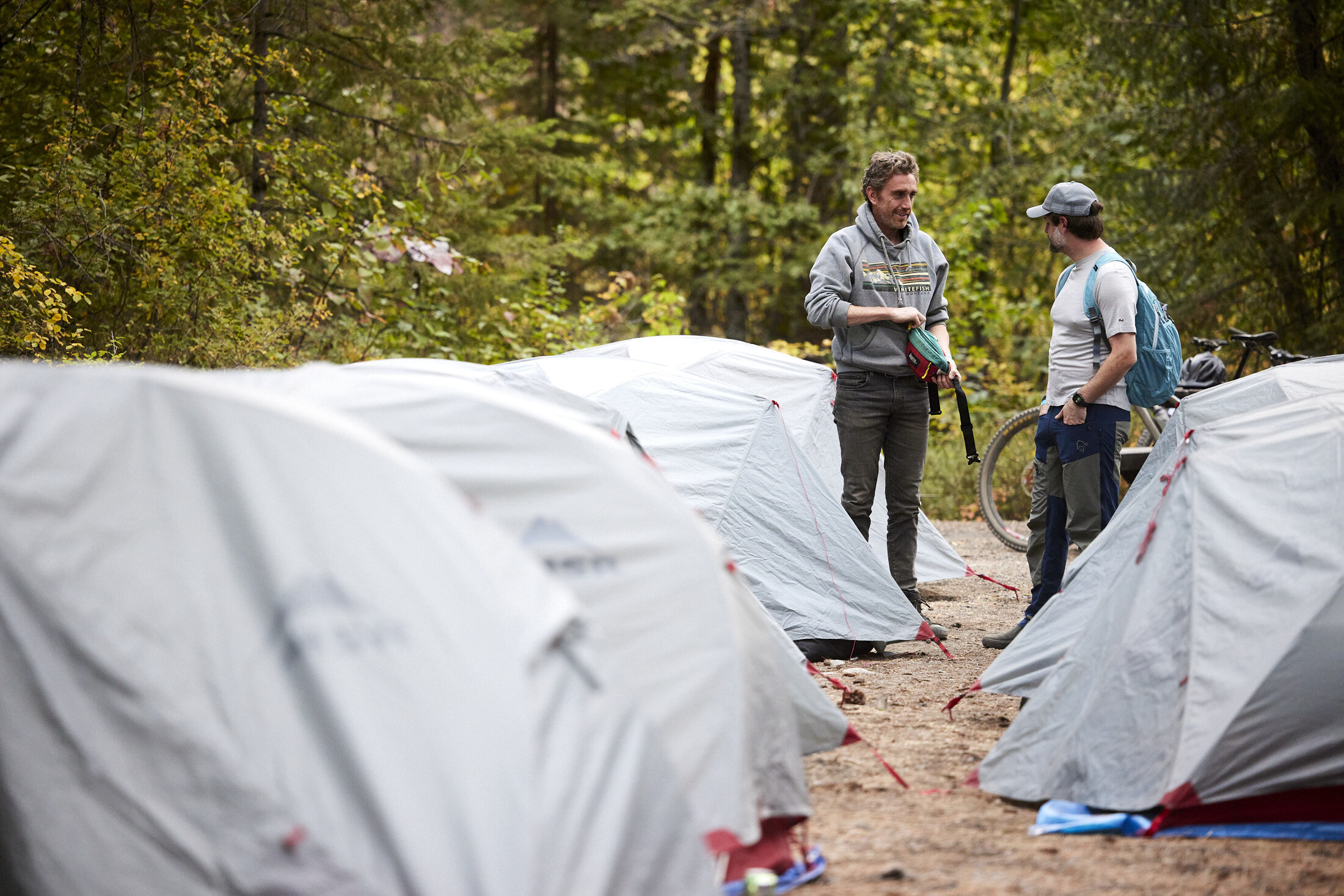
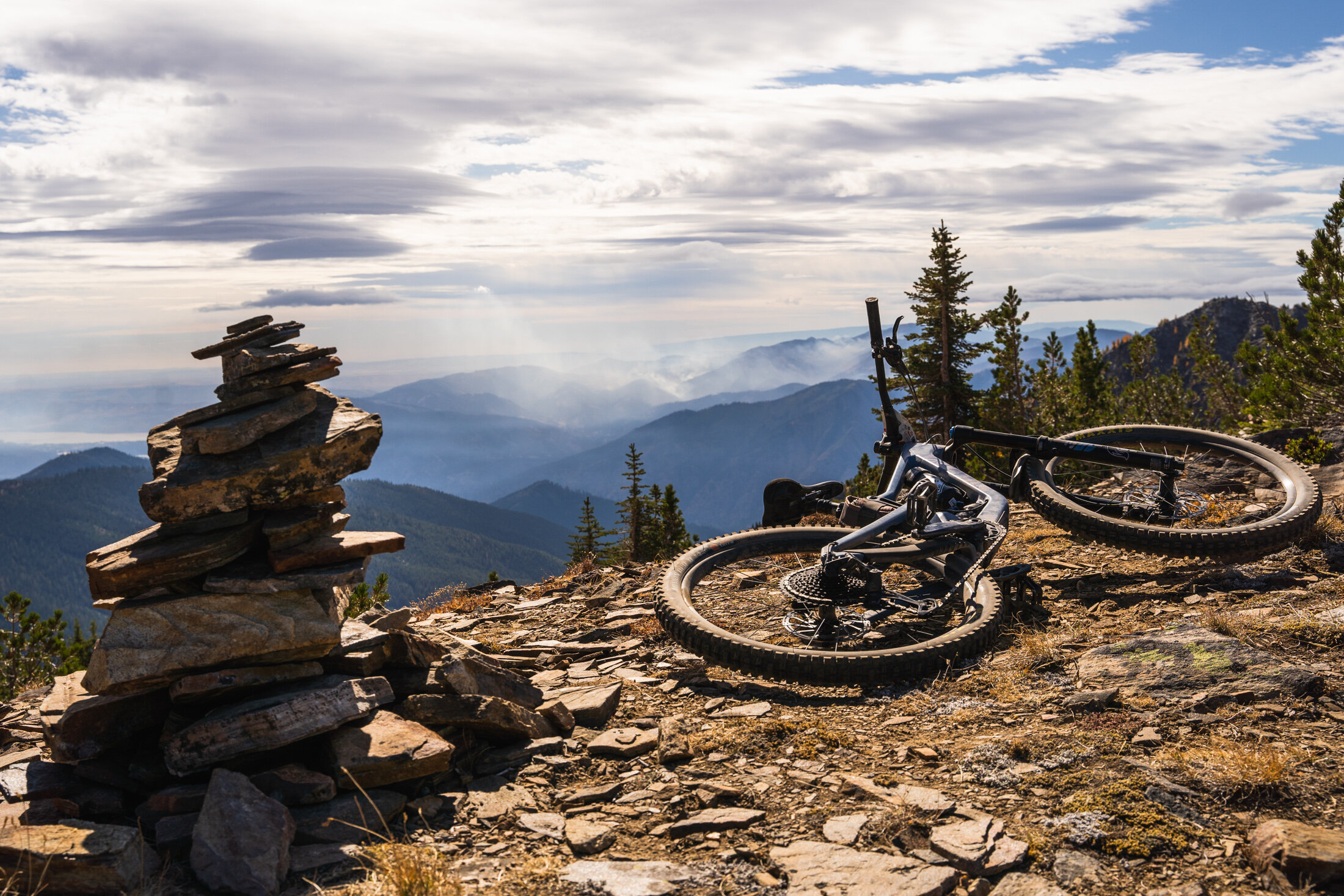
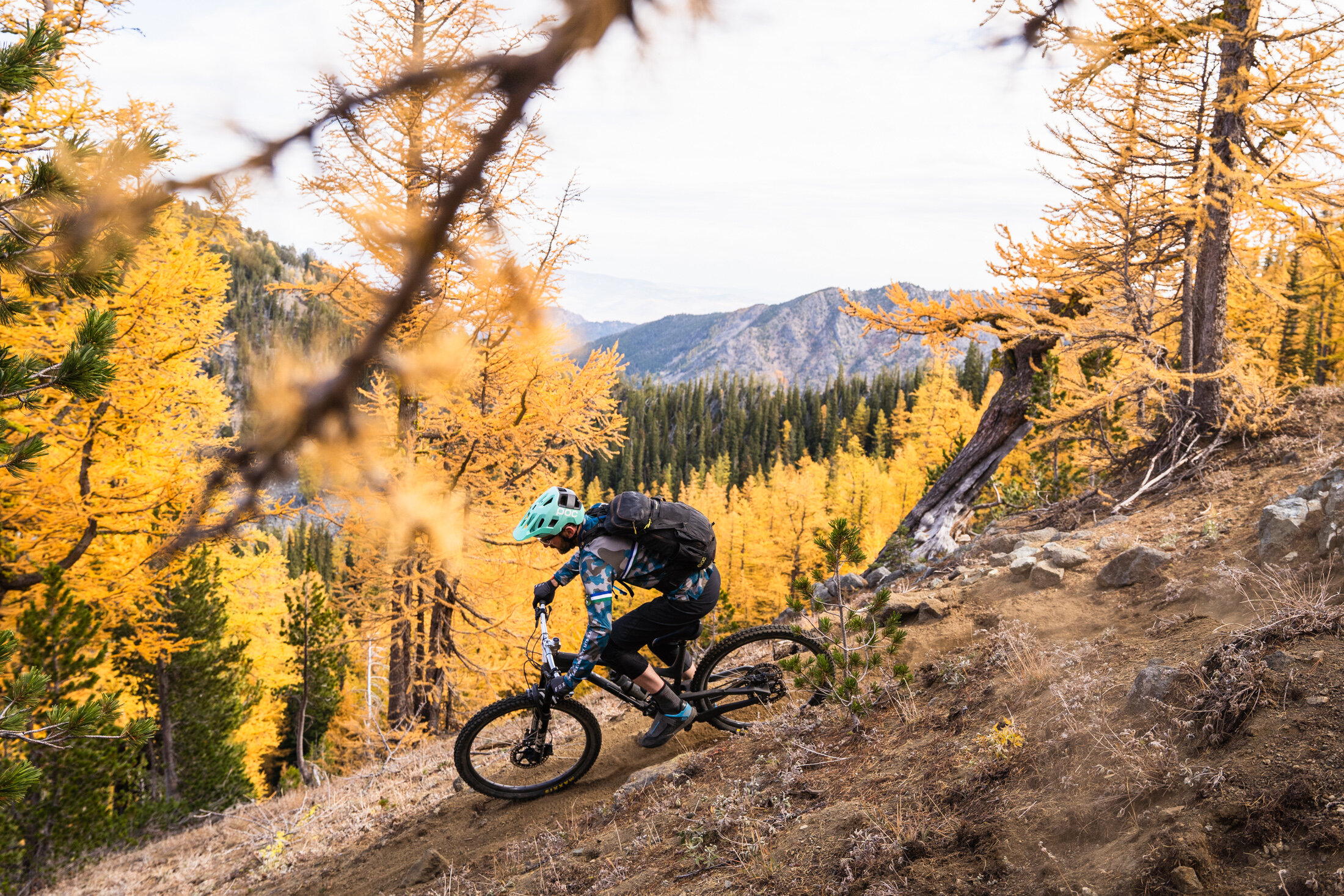
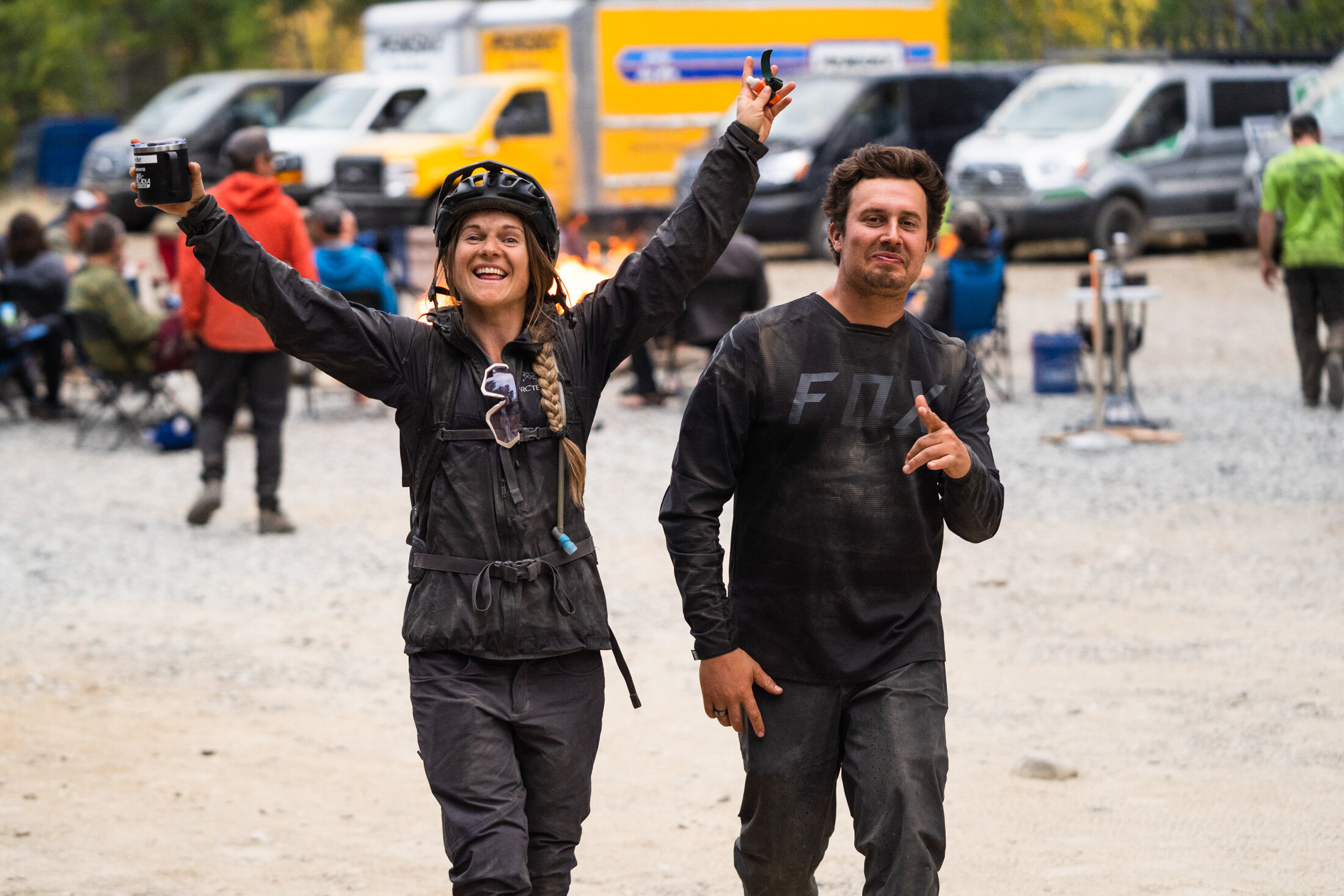
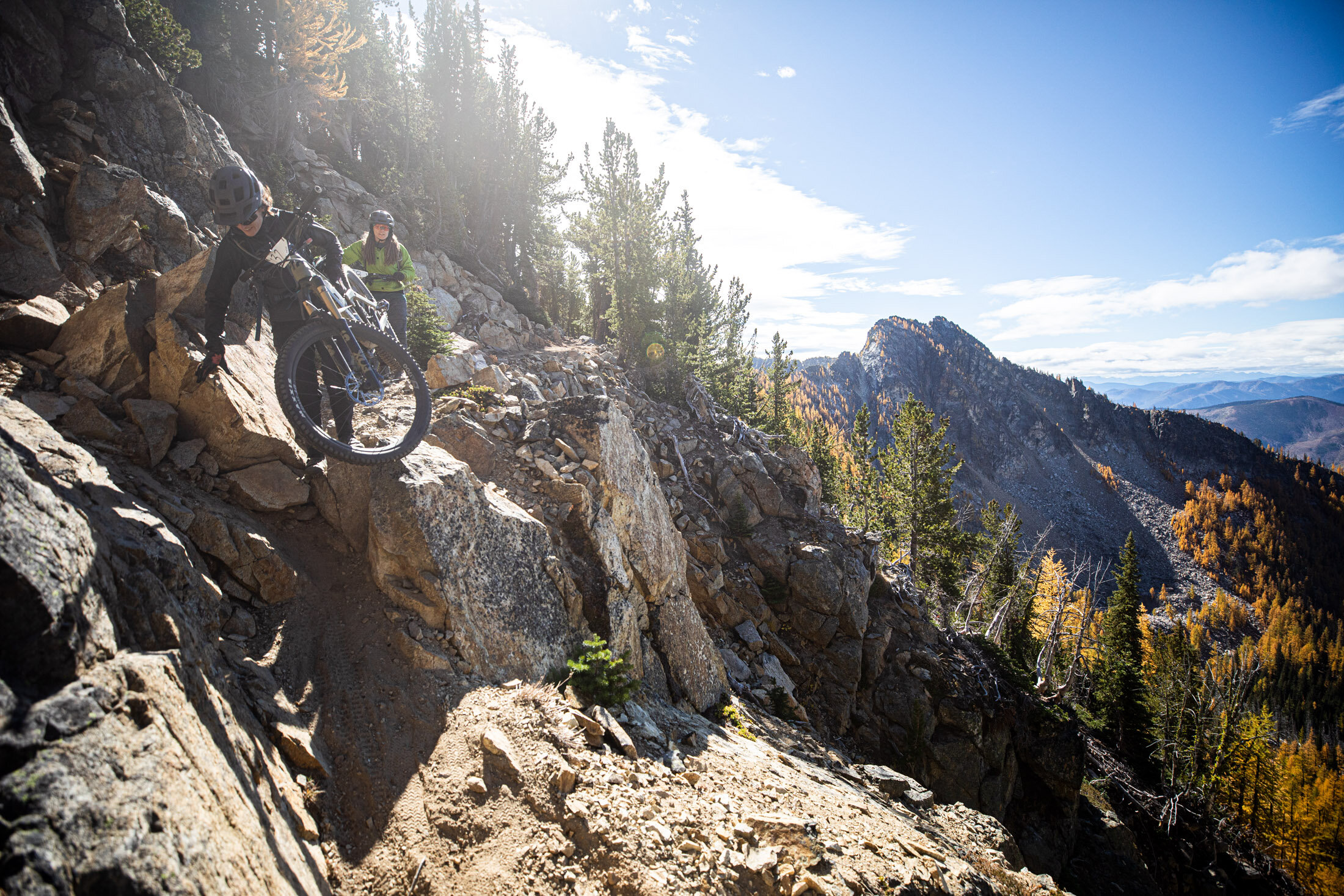
Photos: Robb Perry (Instagram), Mike Thomas (Instagram), Chris Hornbecker (Instagram), Nate Johnson (Instagram), Riley Seebeck (Instagram)
It would be hours before the podium presentations and results were posted, though the massage tent was fully booked and the fire was already roaring. After another fantastic meal from The Bayou Catfish, the party got started. Special thanks was given to the staff by Forest Service District Ranger, Paul Willard, commending their efforts for maintaining deep backcountry trails year round.
It was a long, hard four days whose toll was felt even by the most experienced racers in the field. “I don’t remember anything,” remarked Aaron Bradford.
"It was nice to see people enthusiastic about coming out despite all that's going on in the world. Despite the fires, despite losing more than half our course just a few weeks ago, I think we were able to put together what's been the best year yet," beamed Race Director Nick Gibson.
After a notable speech from the staff lead and Race Producer Alex Gardner, the awards were underway. Aaron Bradford was the obvious choice in the Go Hard category, as he climbed his way up to third overall on the last day. Myles Trainer came from behind to take the win in the Pro Men’s field, with Myles Morgan recovering from mistakes at the start of the day to finish second, less than nine seconds behind Trainer. "The last day I had a couple of mishaps on the first stage and fell over once. The last two stages I brought it back and clawed back a bunch of time," said Morgan.
Photos: Chris Hornbecker (Instagram)
Jill Kintner took a dominant win in the Pro Women’s field, beating out Corinne Prevot (2nd) and Alicia Leggett (3rd) by over ten minutes. Osvaldo Olmos, Jason Hawkins, and David Marshall made up the Amateur Men’s Podium with Briana Valorosi taking the win for the Amateur Women.
The Trans Cascadia crew and all the volunteers overcame so many obstacles to pull the event off. Everyone present expressed gratitude, and one final cheer rang out through the Okanogan–Wenatchee National Forest. Camp had become a community over the last five days on and off the trail, that shined through as the party in the woods raged on all night with folks jumping over the fire for dessert.
After the dust settled, all agreed that they had experienced something truly special. Morgan Kurz, who won her entry from the Grow Cycling Foundation giveaway, was thrilled to have taken part. "That was the most epic riding that I've ever done, the hardest thing I've ever done, and the most rewarding thing I've ever done."
Trans Cascadia would like to thank the racers, photographers, volunteers and National Forest Service for making this race happen!
Support Our Trail Building Work!
$10 from the sale of every jersey goes to Ten for Trails.
2021 Race Report // Day 3
"We planned on the racers eating for two, but in fact they're eating for three."
Nestled deep in the Okinawan–Wenatchee National Forest, racers woke up to another day of unbelievable weather and riding. After daily Covid testing and a quick brief, breakfast was served under the Shimano tent with Hannah from The Bayou Catfish and her staff working round the clock to feed over 100 racers and support staff…
Nestled deep in the Okinawan–Wenatchee National Forest, racers woke up to another day of unbelievable weather and riding. After daily Covid testing and a quick brief, breakfast was served under the Shimano tent with Hannah from The Bayou Catfish and her staff working round the clock to feed over 100 racers and support staff.
"We planned on the racers eating for two, but in fact they're eating for three."
Shuttles carried riders in waves up to the day’s start, more climbing through the alpine was on tap, and racers were encouraged to bring extra snacks and lunch for a long day on the trail. The photographers headed out on course after a long night of editing, covering serious ground to document the stoke.
"It's been a pretty unique experience. You've got a pretty small window to shoot the larches and we've nailed it...it's just magical all around,” said Riley Seebeck of Flow Photo Co.
Santa Cruz Bicycles has been supporting Trans Cascadia for years. The brand is heavily committed to trail work, and supporting an event that leaves a legacy of pristine singletrack behind for all to enjoy and experience.
Riley Seebeck (Instagram)
Jordan Nguyen, Sports Marketing Manager for Santa Cruz, weighed in on their continued support. "A big part of it is community. Trans Cascadia in particular does a lot to give back in terms of advocacy, building, and maintaining these trails in the Pacific Northwest. They do a great job of building a really special event and race as well."
Up top, the riding was likened to “Beach Boys” big wave surfing, as racer after racer flowed down the mountain. Transfer stages remained long, with Geoff Kabush continuing to egg Tobin Ortenblad on. There are rumors of a tickle fight after the last stage to settle things once and for all. The highlight of the day was a secret trail opened and cleared for riders, this trail was permitted for a single day only. It may well be the first time tires have touched the remote section of forest, truly a special moment for everyone.
"What's special about today is that no mountain biker had done this ride until we did today. It took us four or five tries to piece this ride together when we were planning the race. This is going to be a treat," said Remy Aucoin, a trail steward who helped immensely in clearing the race stages.
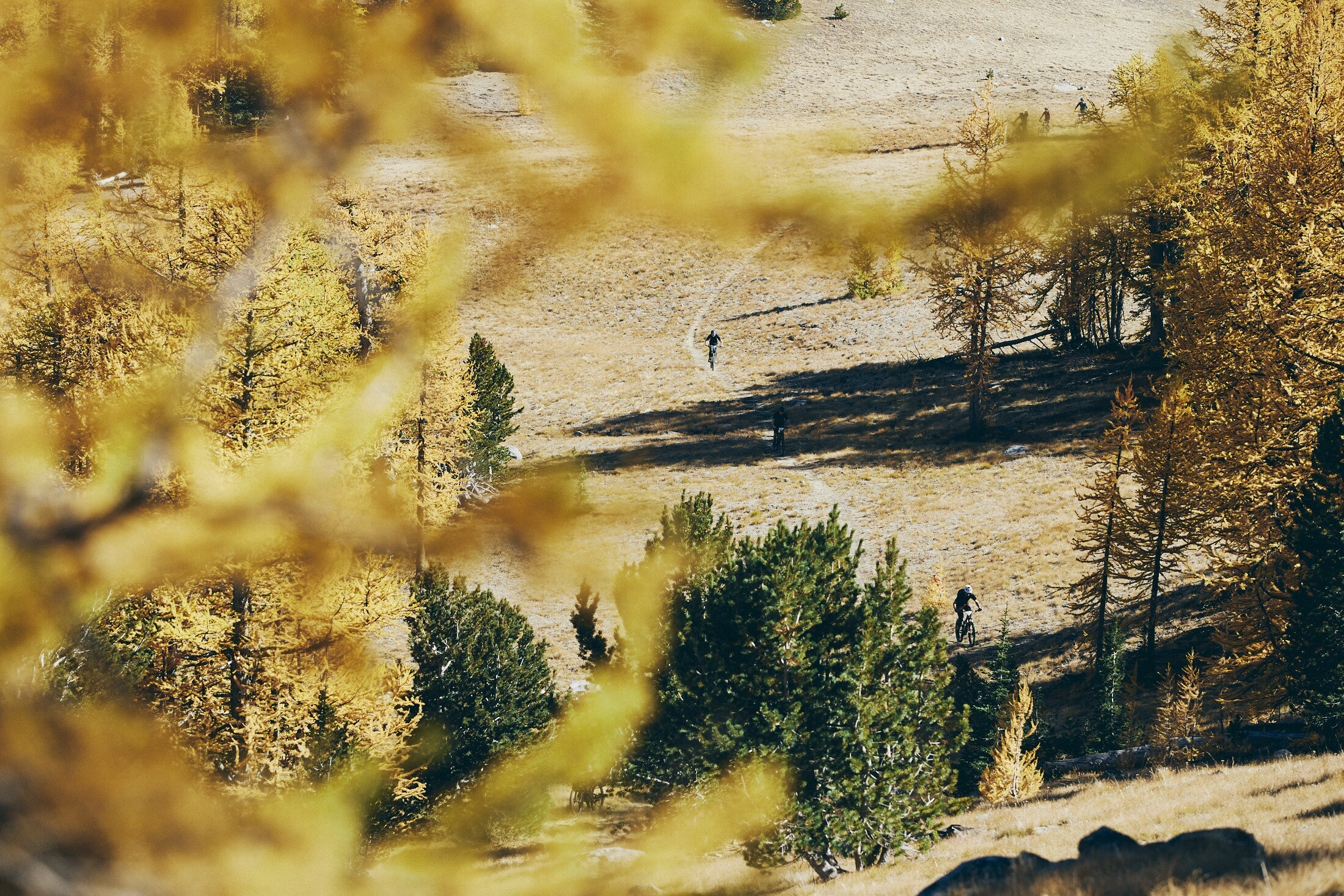
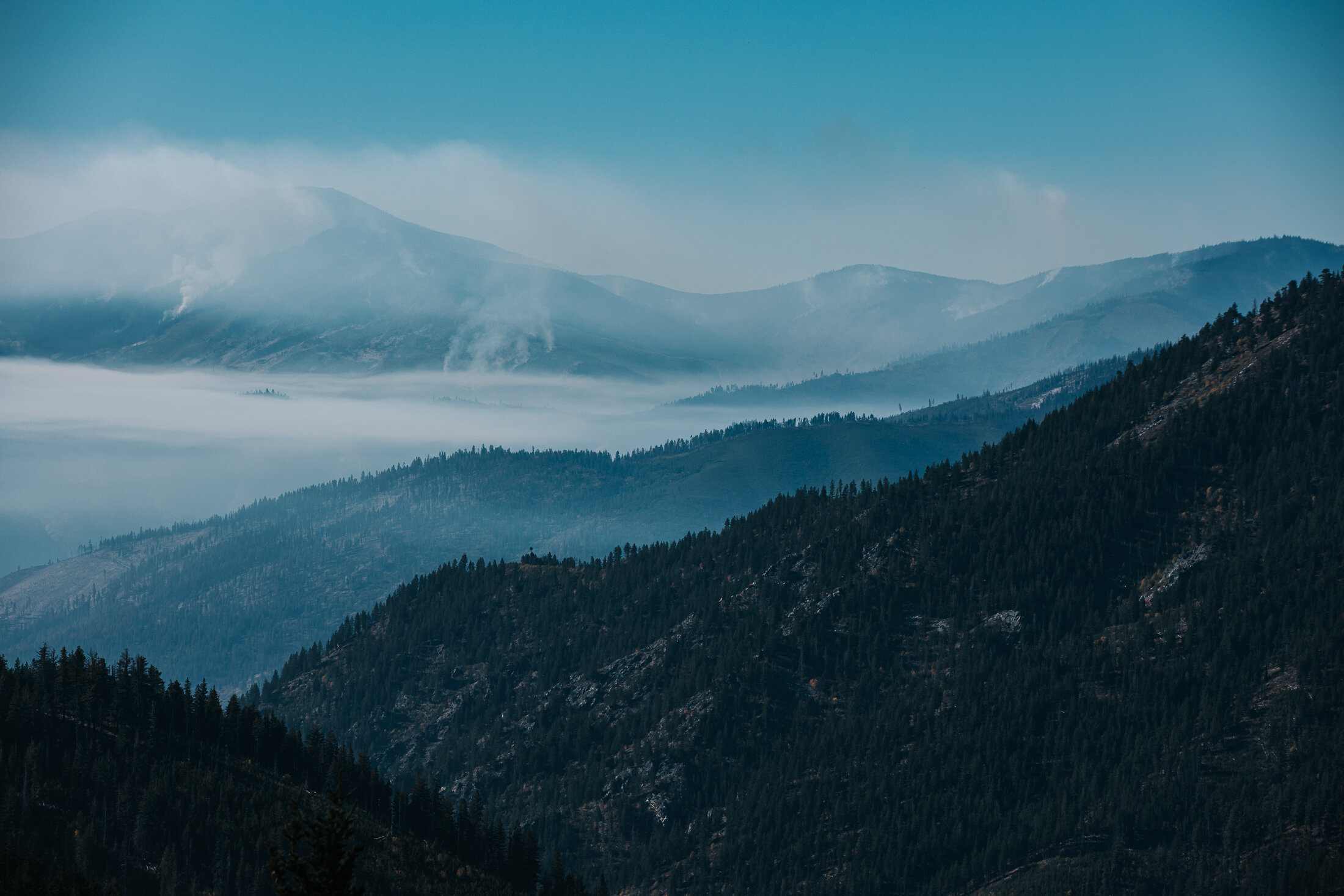
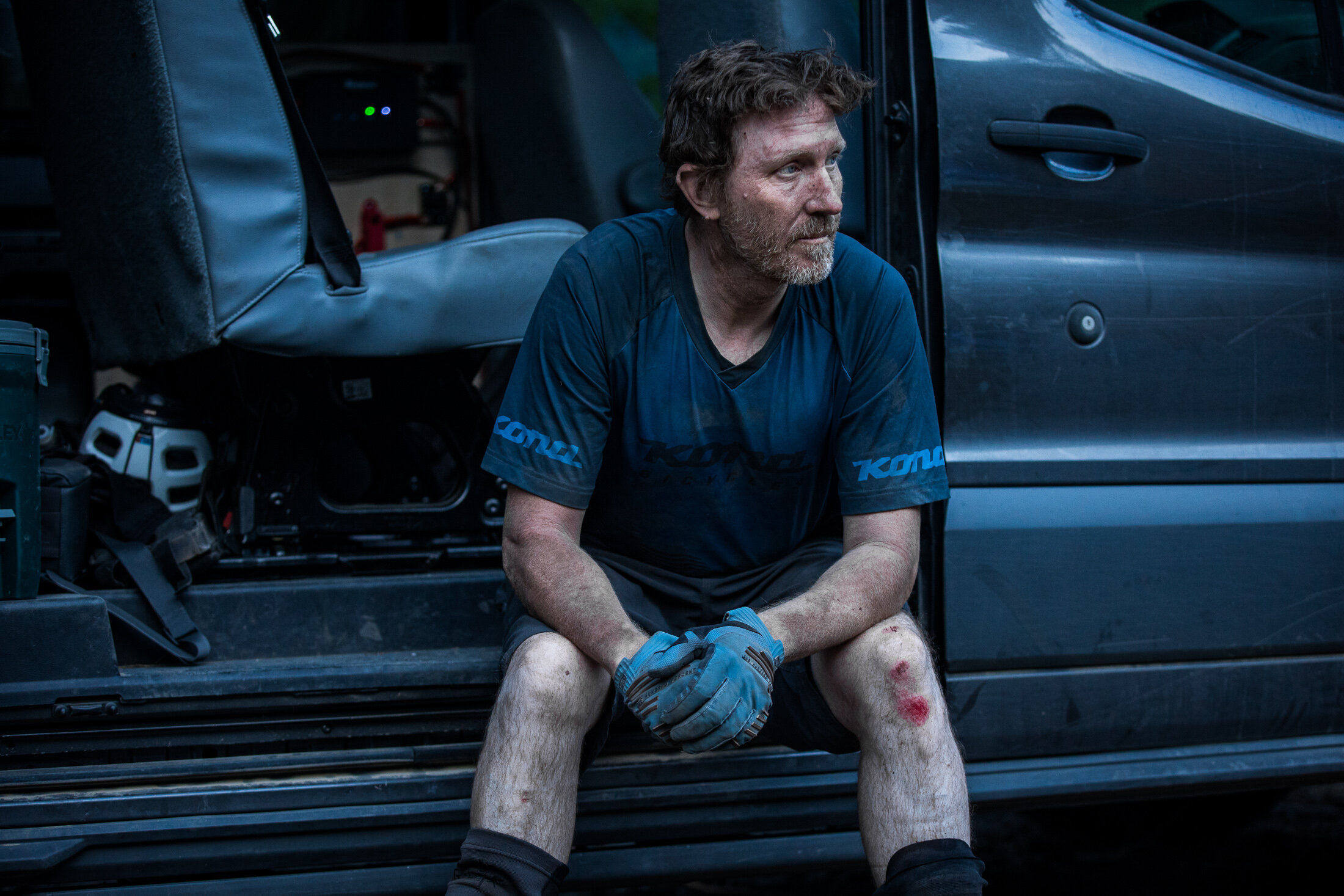

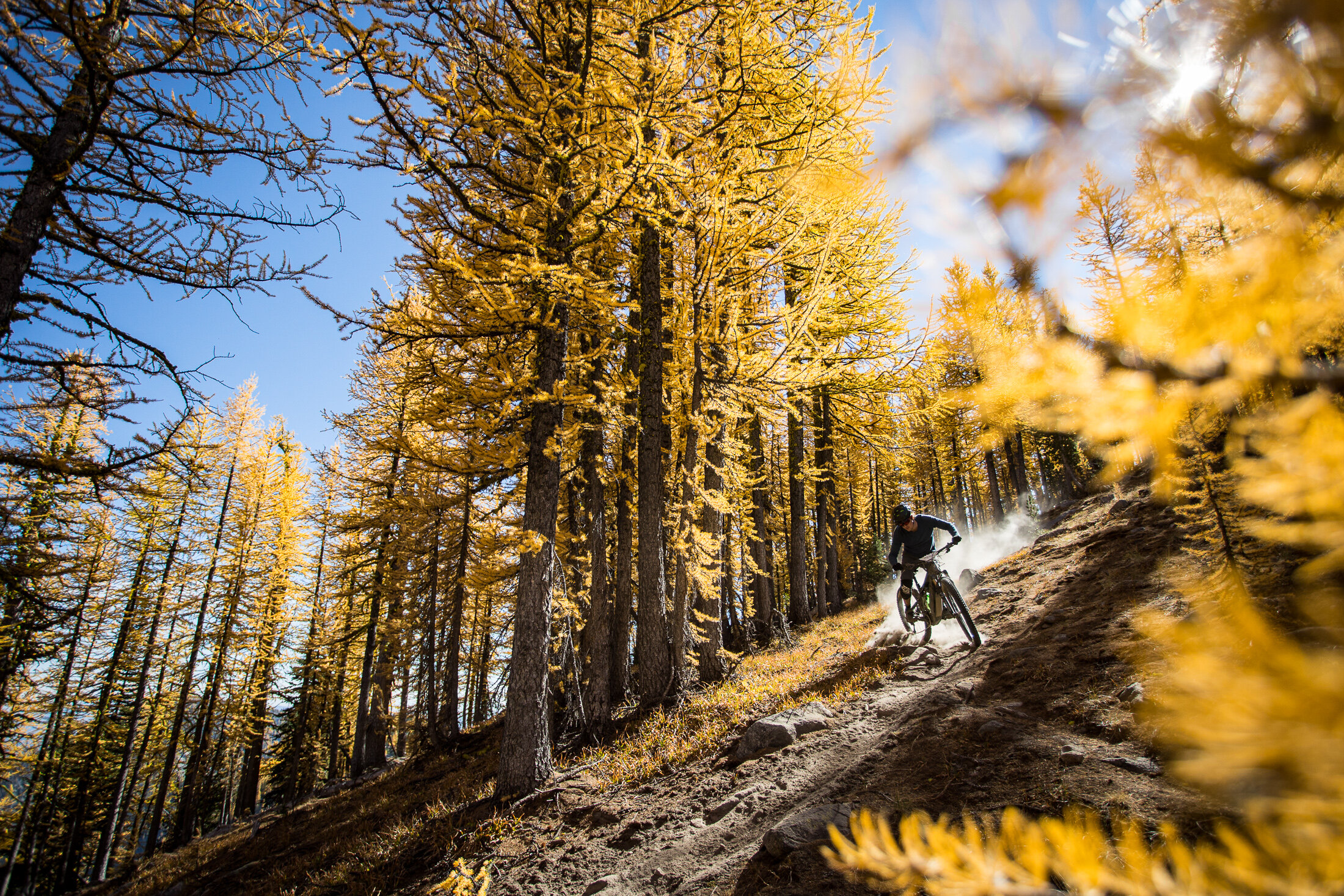
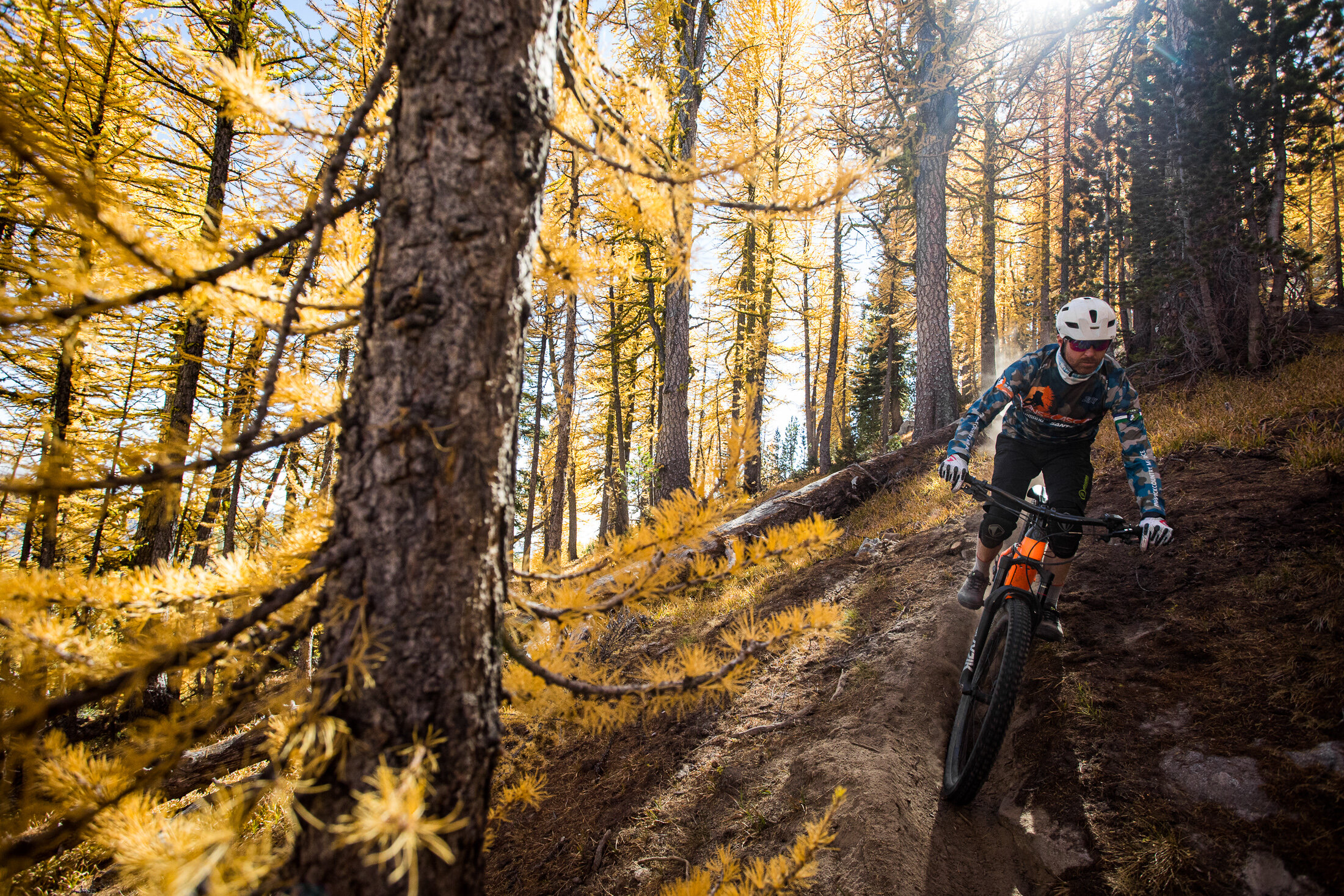
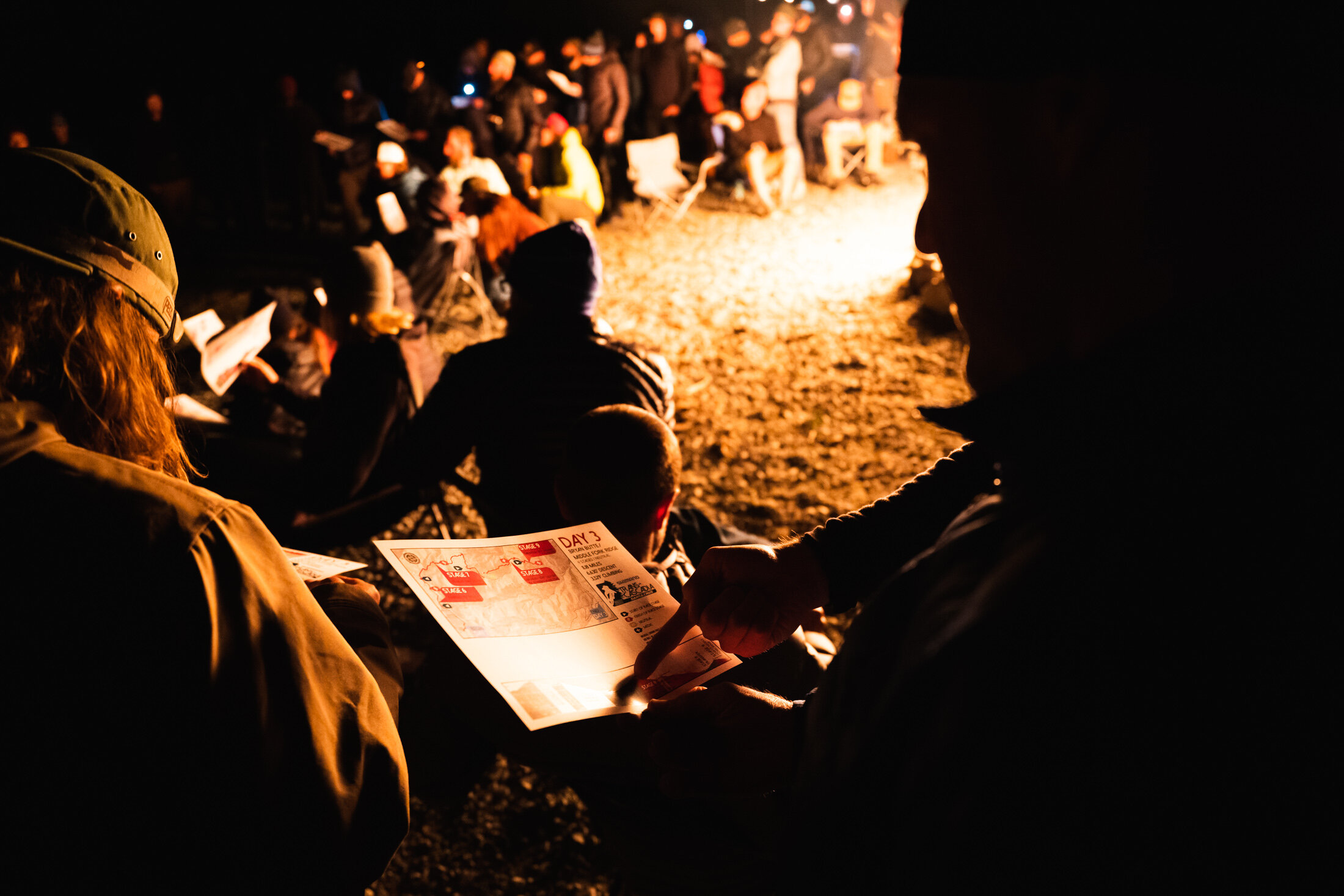
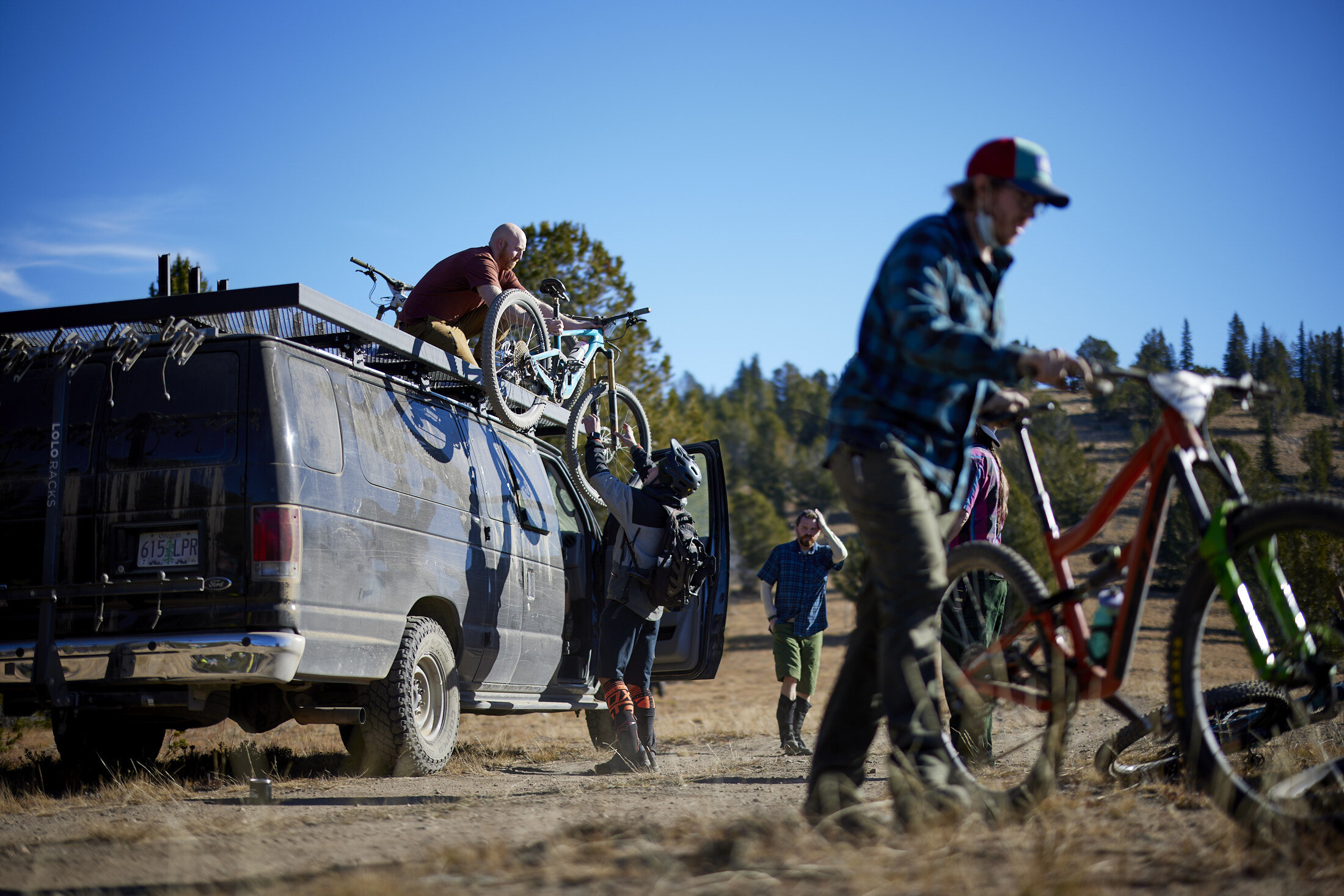
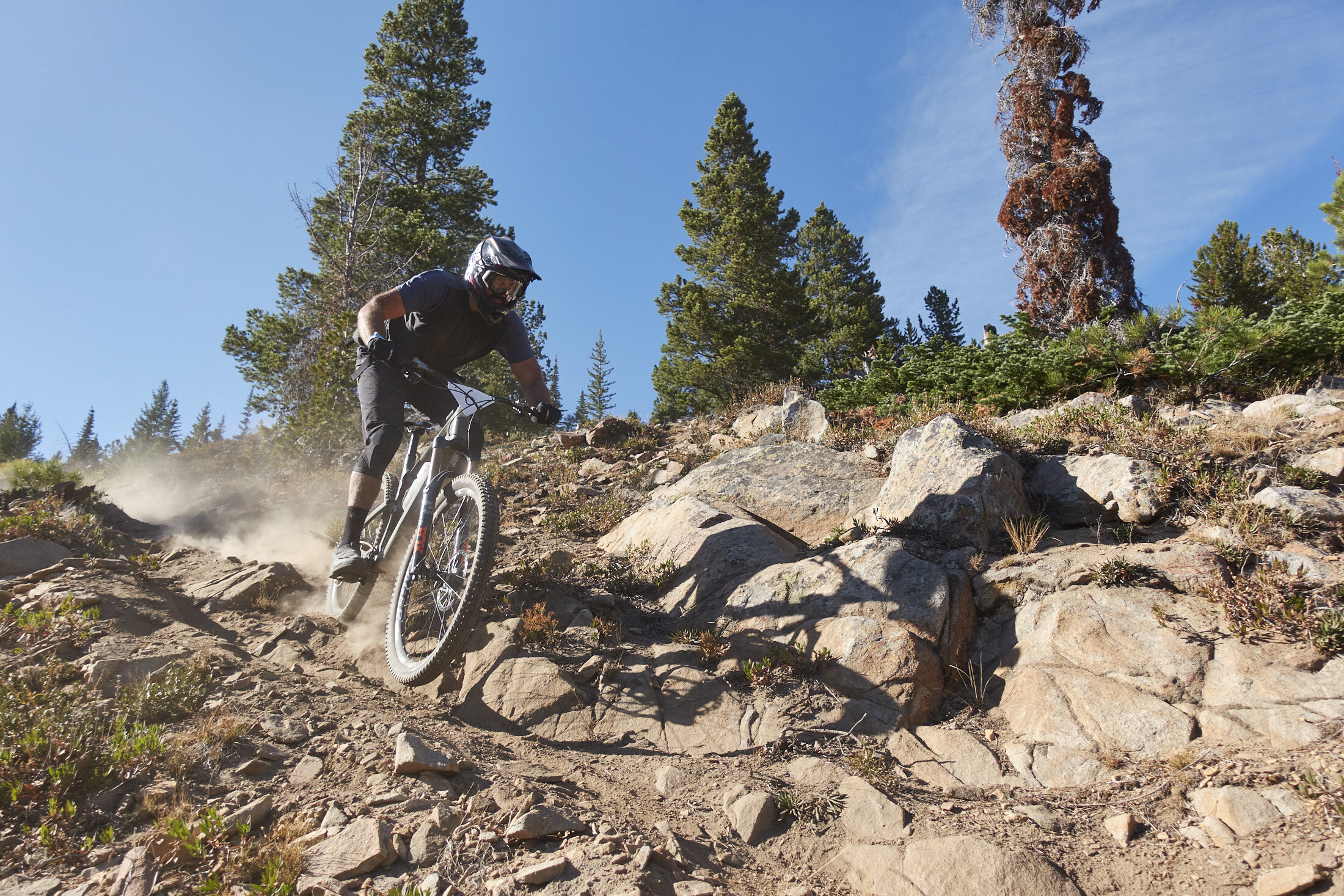
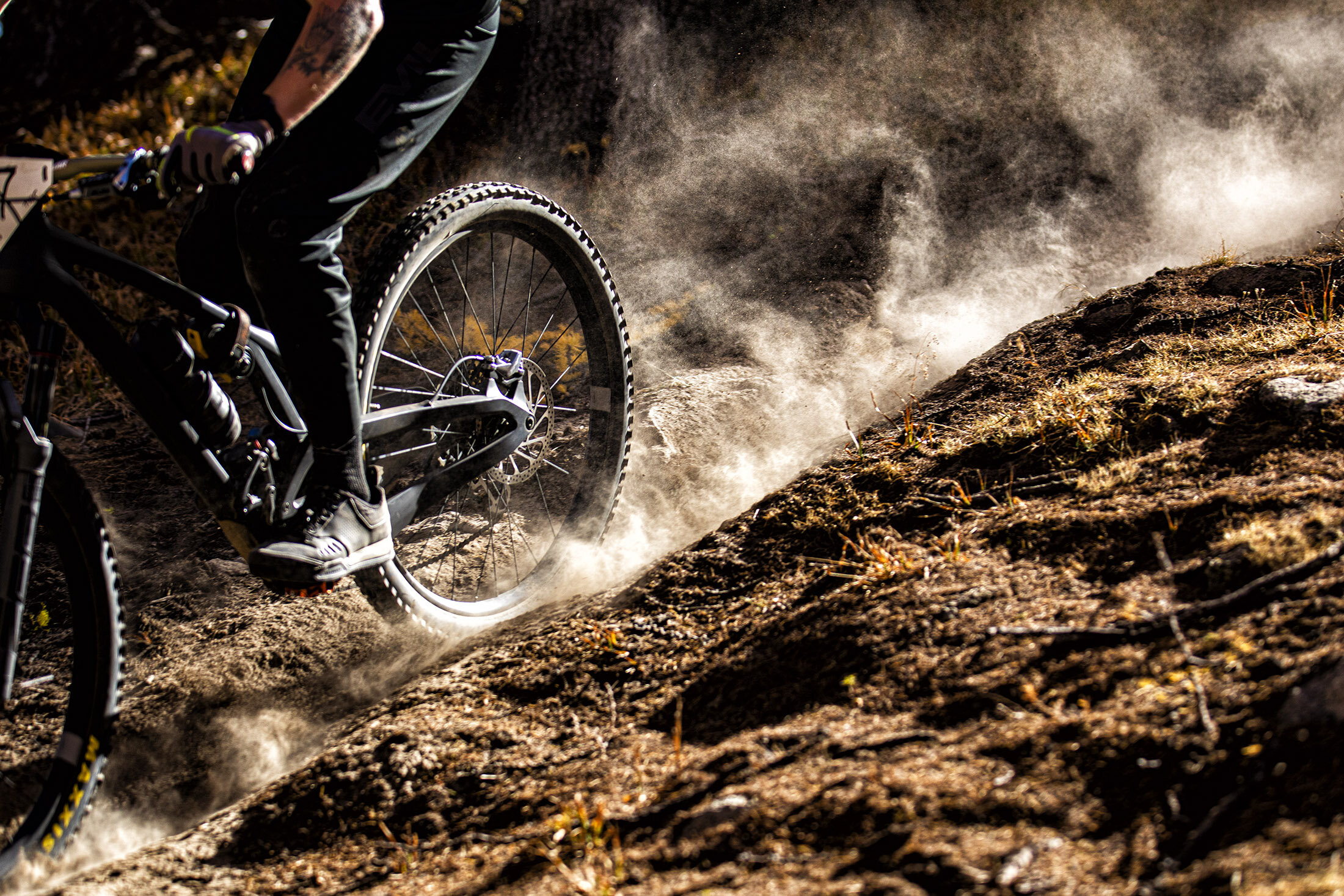
Photos: Robb Perry (Instagram), Mike Thomas (Instagram), Chris Hornbecker (Instagram), Nate Johnson (Instagram), Riley Seebeck (Instagram)
Kabush slipped back to third place overall, but looked ahead to day four and his beef with Ortenblad.
"I feel I have the upper hand physically and mentally. It's been a good three days chipping away at him and he’s ready to crack. I've just been saving my energy for day four,” Geoff over a steaming bowl of chili.
Rising star Myles Morgan took over the lead in the Pro Men’s category, moving into the last day of racing. Alicia Leggett moved up one spot into a podium position in third.
"Today we've got some pretty long stages. I'm stoked for today, there should be some more variety which is always good," said Morgan before beginning the day. He excelled on the long, rutted stages and now has his work cut out for him to keep Kabush and Myles Trainer behind going into the final day.
Jill Kintner has a commanding lead in the Women’s Pro field, thoroughly enjoying each stage. Fellow Red Bull athlete and professional freeskier Michelle Parker is enjoying what is both her first Trans Cascadia and first-ever mountain bike race.
"This is my first mountain bike race ever! We're on day three now. At this point everyone is a tight-knit group of friends and we're all supporting each other. It's just a long party train," says Parker.
Juliana Bicycles’ Alex Pavon loved the long stages of day three. "The third stage of the day was just steep and loose, super rowdy and really ripping." She also weighed in on the impending showdown between Kabush and Ortenblad. "It's gonna be an all-out tickle fight to the death. My money is on Kabush, sorry Tobin!"
The evening fire roared as podium presentations got underway. Drinks were poured as pallet after pallet of Deschutes beer and Ablis CBD tonics disappeared at an alarming rate. Jumps were assembled near the fire, and things got weird under the stars. After a year away, riders and volunteers alike soaked in the community with smiles all around.
Due to the length of day three full results will not be published until Monday. The final day of racing will be exciting, look for a full report tomorrow when the party in the woods concludes.
Photos: Robb Perry (Instagram), Mike Thomas (Instagram), Chris Hornbecker (Instagram), Nate Johnson (Instagram), Riley Seebeck (Instagram)
Day 3 Results:
Pro Women
1) Jill Kintner
2) Corinne Prevot
3) Alicia Leggett
Pro Men
1) Myles Morgan
2) Myles Trainer
3) Geoff Kabush
Support Our Trail Building Work!
$10 from the sale of every jersey goes to Ten for Trails.
2021 Race Report // Day 2
This is definitely a unique event. You're kind of just out there in the middle of nowhere taking in all the sights! — Jill Kintner
Slowly emerging from their tents, racers took their time preparing for another raw, long day in the mountains. A late start allowed extra time at breakfast for a third cup of Trailhead coffee, enjoyed round the daily morning fire. With shuttles loaded and lunch packed, the camp emptied as racers started the course…
This is definitely a unique event. You're kind of just out there in the middle of nowhere taking in all the sights!— Jill Kintner
Slowly emerging from their tents, racers took their time preparing for another raw, long day in the mountains. A late start allowed extra time at breakfast for a third cup of Trailhead coffee, enjoyed round the daily morning fire. With shuttles loaded and lunch packed, the camp emptied as racers started the course.
Fires recently devastated the Wenatchee National Forest, nearly canceling the event. This means that day after day, racers are riding fresh cut trails, with volunteers working overtime, moving massive amounts of earth daily. It is truly something special, riding trails untouched by tread, carving fresh lines deep in the backcountry.
Between Covid tests and general rider safety and welfare, Lead Medic Nic Hall expressed the gravity of the day, “We have the highest level of covid safety and our first priority is rider safety. We will close the race or freeze the stage and utilize everyone to bring a patient off the mountain.” The remote nature of the event means racers may be called on to assist the medical team in the event of a crash. If someone hits the deck, stages will be frozen and all bodies on course will be utilized to assist with extraction.
Racers took to the course en masse, laying fresh tracks on trail as the competition heated up. Transfer stages saw a party train covering the mountain, the fight for the podium was real across all categories, with Kabush and Kintner maintaining the lead as the day progressed.
"This is definitely a unique event. You're kind of just out there in the middle of nowhere taking in all the sights," says Jill Kintner.
Tobin Ortenblad loved the challenge of day 2. "The early stages of each day are very chunky and take a lot of finesse to go fast on. It honestly felt like riding a bike for the first time.”
Riders tackled steep climbs, occasionally hitting hike a bike sections of trail before bombing down into camp with a rowdy crew of volunteers heckling pros and amateurs alike, where cold refreshments and fresh snacks awaited all participants, delivered directly tent to tent by the amazing chefs on site. The massage tent, run by Sarah Olsen of Portland’s Elevated Bodyworks, was fully booked as everyone took time to recover and prepare for day two.
“We’re taking care of everyone, trail builders, volunteers, racers and kitchen staff,” she says. With long days back to back, Olsen and fellow masseuse Sammy Stark are key in ensuring everyone is at their best during the event.
Dinner was lively as war stories from the day were recounted over hot bowls of soup and all time Tiramisu for dessert. Kabush gently rubbed his stage times in Ortenblad’s face, as the California and Canadian beef continues to heat up. The fire was homebase for the daily slideshow of images from the AMAZING crew of shooters out on course, followed by podium presentations. Kabush managed to maintain his lead ahead of Myles Morgan and Myles Trainer, while Kintner retained the top step followed by Corinne Prevot and Alex Pavon.
"It was certainly rowdy, but beautiful and glorious up in the alpine. I'm looking forward to getting up high again, the larch trees are turning and it's absolutely stunning," says Briana Valorosi.
As the fire died down and riders peeled off to their tents, the last stranglers finished watching the nightly star show through the trees. Camp felt like family as racers laughed and spoke about the days ahead. A huge thanks to all the volunteers who dedicated not only this weekend but many others preparing for the onslaught of 100+ riders tearing down the labor of love they helped create.
Day three will see riders tackle just under 12 miles that the trail crew call a special treat. 4000 feet of vertical followed by a blazing 7000-foot descent. Stay tuned for results and highlights as the race continues.
Day 2 Results
Pro Women
1) Jill Kintner
2) Corinne Prevot
3) Alexandra Pavon
4) Alicia Leggett
5) Michelle Parker
Pro Men
1) Geoff Kabush
2) Myles Morgan
3) Myles Trainer
4) Aaron Bradford
5) Dane Petersen
Support Our Trail Building Work!
$10 from the sale of every jersey goes to Ten for Trails.
2021 Race Report // Day 1
Day 1 of Trans Cascadia started with a bang, deep in the Okanogan-Wenatchee National Forest. This land is traditional indigenous territory of the Wenatchi and Syilx people.
After an unfortunate but necessary break in 2020, the race is back with rider safety first and foremost. A blind enduro, racers are given each day's map the night before, with no chance to explore the trail prior. This makes for quite an interesting event, leveling the playing field for all riders….
“I've done Trans BC, Andes Pacifico, the BC Bike Race, and this is my favorite trail that I've ever been on.” —Chris Karwisch
Day 1 of Trans Cascadia started with a bang, deep in the Okanogan-Wenatchee National Forest. This land is traditional indigenous territory of the Wenatchi and Syilx people.
After an unfortunate but necessary break in 2020, the race is back with rider safety first and foremost. A blind enduro, racers are given each day's map the night before, with no chance to explore the trail prior. This makes for quite an interesting event, leveling the playing field for all riders.
Race Director Nick Gibson was excited to get started. "I'm stoked to get people on course after a year's delay. We're excited to show people this area, this is the first ever bike race on these trails."
With a full volunteer staff, spending countless hours in preparation, racers shuttled into Foggy Dew Campsite, their home for the next 5 days. A remote backcountry experience with all the amenities save cell service, racers are treated to a camp that feels more like a living village. After Covid testing and orientation, participants devoured a stunning southern inspired meal prepared by Hannah Carlos of The Bayou Catfish under the stars.
"Riding blind trails is something special...you have to be super comfortable on your bike and just react to the trail," says Geoff Kabush, a two-time winner and one of only three five-time finishers of Trans Cascadia.
Race Producer Alex Gardner gave a preview of what was to come. “We've got a lot in store for you guys. We've been learning a lot over the years and Nick's put together an amazing course."
Santa Cruz Bicycles sent Walker Shaw and Tobin Ortenblad to the event, both feeling fresh and excited to race the trails blind. “This is a different style of racing than we've been doing, but I'm pretty excited for it,” said Shaw. Aside from a minor beef between veteran Kabush and Ortenblad, the entire day was spent deep in the forest with riders enjoying the transfer stages as much as the racing.
Dillon Osleger of Specialized Soil Searching even stopped for a short spell of fly fishing as he inched his way close to the podium. "The granite and all that glaciation just felt like home. It's just like what I grew up riding."
The larches were in full bloom, as riders traversed the early hours of the first day of racing. Stage one began after a multi hour technical climb, leading racers up Angel’s Staircase, a rocky exposed uphill slog, switchback after switchback. Stage two took racers on a fresh and flowy 1.5 mile descent before dropping back to camp. Times were tight, smiles were all time, many riders said stage two was the best trail of their life.
"I've done Trans BC, Andes Pacifico, the BC Bike Race, and this is my favorite trail that I've ever been on,” raved Chris Karwisch after finishing the stage.
Back at camp, the community vibe was flowing and Pearl Izumi, Shimano, and Santa Cruz helped bring the party. Hard. Hot dinner and conversations around the blazing fire eventually lulled the camp to sleep. After only two stages, the times were tight with Kabush in the lead, followed closely by Myles Morgan and Myles Trainer. For the pro women Jill Kintner took the top step. "I've always wanted to do this race...It was a tight turnaround, I was in Italy a day and half ago...They feed you, you have a tent, everything is set up so you just ride your bike!"
Travel restrictions cut the international field drastically, making the event feel a bit more homegrown, reminiscent of year one. With stacked fields in all categories and a sold out race, the weekend is sure to excite. With no leader's jersey to present after a year away, race organizers treated all participants and staff to custom jerseys presented by Pearl Izumi.
The evening was spent around a roaring bonfire, with a full bar, hot showers and all the amenities that make the event special. Energy was at an all time high as many racers had not seen each other in over a year, community and connection were present in spades, and everyone might have stayed up a bit too late.
Trans Cascadia is more than just a race. Hundreds of hours went into clearing the course.These trails remain open to the public for all to ride and enjoy. The Trans Cascadia staff and volunteers have clocked nearly 20,000 hours in the woods to date, with over 500 miles of trail maintained, and 100+ miles reclaimed. The race is merely a catalyst for open access to our public lands. Stay tuned for more daily reportage as the racing heats up.
Day 1 Results
Pro Women
1) Jill Kintner
2) Corinne Prevot
3) Alexandra Pavon
4) Alicia Leggett
5) Michelle Parker
Pro Men
1) Geoff Kabush
2) Myles Morgan
3) Myles Trainer
4) Aaron Bradford
5) Tobin Ortenblad
Support Our Trail Building Work!
$10 from the sale of every jersey goes to Ten for Trails.
2021 Race Registration is Open!
We have opened 30 spots for this year’s race: September 22 - 27, 2021…
We have opened 30 spots for this year’s race: September 22 - 27, 2021
"Some of our international racers are finding it challenging to plan travel with uncertainty around pandemic-related travel restrictions," says Race Director Nick Gibson. "This has allowed us to open up 30 spots for this year's race unexpectedly."
This year, the blind-format race will occur in a brand new location in the Pacific Northwest Cascadia region. In honor of Trans-Cascadia's commitment to true blind racing, they will only hand out race maps and course details during the event.
Trans-Cascadia's primary goal at the 2021 race is to keep everyone healthy and safe. "And have a damn good time," adds Nick. The TC medical staff has helped the team develop a COVID protocol to implement for this year's event. Racers and crew will be required to provide proof of a negative COVID test dated within three days of arrival or proof of vaccination. Mask requirements will be based on CDC guidelines at that time of the year.
Despite cancelling the 2020 event due to the pandemic, the Trans-Cascadia crew has still worked hard in the backcountry. They have continued to reclaim and maintain trails while actively advocating for their preservation and access to open up a whole new area for this year's racers.
Over the last six years, Trans-Cascadia has volunteered over 16,000 hours of labor and invested approximately $20,000 a season in tools and transport. As a result, they have cleared and maintained the 500 miles of backcountry singletrack used for the race since 2015.
The TC Team is looking forward to celebrating these achievements with their racers at another incredible five days spent in the backcountry. Racers can expect the same truly remote racing experience and a diverse network of steep and challenging trails, high alpine ridges, and seemingly bottomless valleys. Trans-Cascadia provides each participant with a solo tent and sleeping pad for them at each basecamp. Gourmet breakfast, lunch, and dinner will be provided daily by a hand-selected team of top chefs from the Pacific Northwest – each showcasing their specialties.
The lack of cell service and wifi access at the remote base camp has become a valued part of Trans-Cascadia's culture. It creates an incredibly social event environment where everyone swaps their stories from their day about the inspiring highs and sometimes comical lows. Participants can expect to drop into their tents fully exhausted each night and filled with anticipation for what the next day will bring.
The event is limited to 100 racers out of respect for the pristine environment in which we operate, don't miss out on your chance to sign up!
Can't make the race but still want to be involved? Check out our work parties and other volunteer opportunities or donate for our Ten for Trail raffle!
Ten for Trails 2021
Win a Santa Cruz Megatower!
Each $10 donation increases your chance of winning a Santa Cruz Megatower, equipped with Shimano XTR. All proceeds from the drawing will benefit our continued trail advocacy efforts at Trans-Cascadia.
Win a Santa Cruz Megatower!
Ten For Trails
Each $10 donation increases your chance of winning a Santa Cruz Megatower, equipped with Shimano XTR.
All proceeds from the drawing will benefit our continued trail advocacy efforts at Trans-Cascadia.
Our primary goal is to share the incredibly unique trail systems of the Pacific Northwest Cascade mountain range with the world – as well as give back to the local community through trail work, project funding, and support of the local economy.
“Ten for Trails is an important part of the fundraising for Trans-Cascadia's advocacy efforts,” explains Race Producer, Alex Gardner. “This campaign allows us to connect with our community by inviting them to donate money to keep us working on opening new backcountry trails and maintaining and improving trails across our Cascadia region. Our race revenue is focused mainly on operations and logistics before and after the race itself and opening trails that we race on. Funds raised from Ten for Trails allows us to expand our reach when working in a given network and open trails that may not be a part of the race but need attention and are important to the local communities.”
In addition to funding our backcountry trail work, Ten for Trails proceeds are also used to purchase tools to outfit more volunteers. “We have a knack for throwing ridiculous amounts of resources at a trail with lots of people, armed with power brushers, trimmers, saws, rakes, and shovels to open what sometimes is an indistinguishable piece of the trail into a bucked and brushed beautiful ribbon of singletrack,” continues Alex. “Sometimes multiple miles a day are opened during a work party and everyone who is working on the trails can take great pride in seeing tangible progress.”
Despite having to cancel the event in 2020, the Trans-Cascadia team was still hard at work in the backcountry reclaiming and maintaining trails and actively advocating for the preservation of and access to these trails.
In their five years, Trans-Cascadia has volunteered over 16,000 hours of labor and investment into the necessary tools - $20,000 each season - and transport to clear 500 miles of backcountry singletrack. Over 100 miles of those trails had been completely reclaimed by nature.
We have sponsored and proudly partnered in the creation of the Oregon Mountain Biking Coalition, an organization that is focused on creating, enhancing, and protecting mountain bike experiences in the State of Oregon. This organization allows for Oregon’s mountain bike advocacy groups to communicate on a regular basis, share ideas, and help each other out. Collectively, we’re stronger as a whole, and this organization is going to be critical in helping us to preserve and protect the backcountry mountain bike experience.
Since 2016 Santa Cruz Bicycles have been onboard as title bike sponsor and have been heavily involved with our trail advocacy efforts – participating in build weekends and helping to raise awareness and funds.
You can support the efforts of our efforts at Trans-Cascadia by making a donation. Each $10 donation increases your chances of winning a new Santa Cruz Megatower.
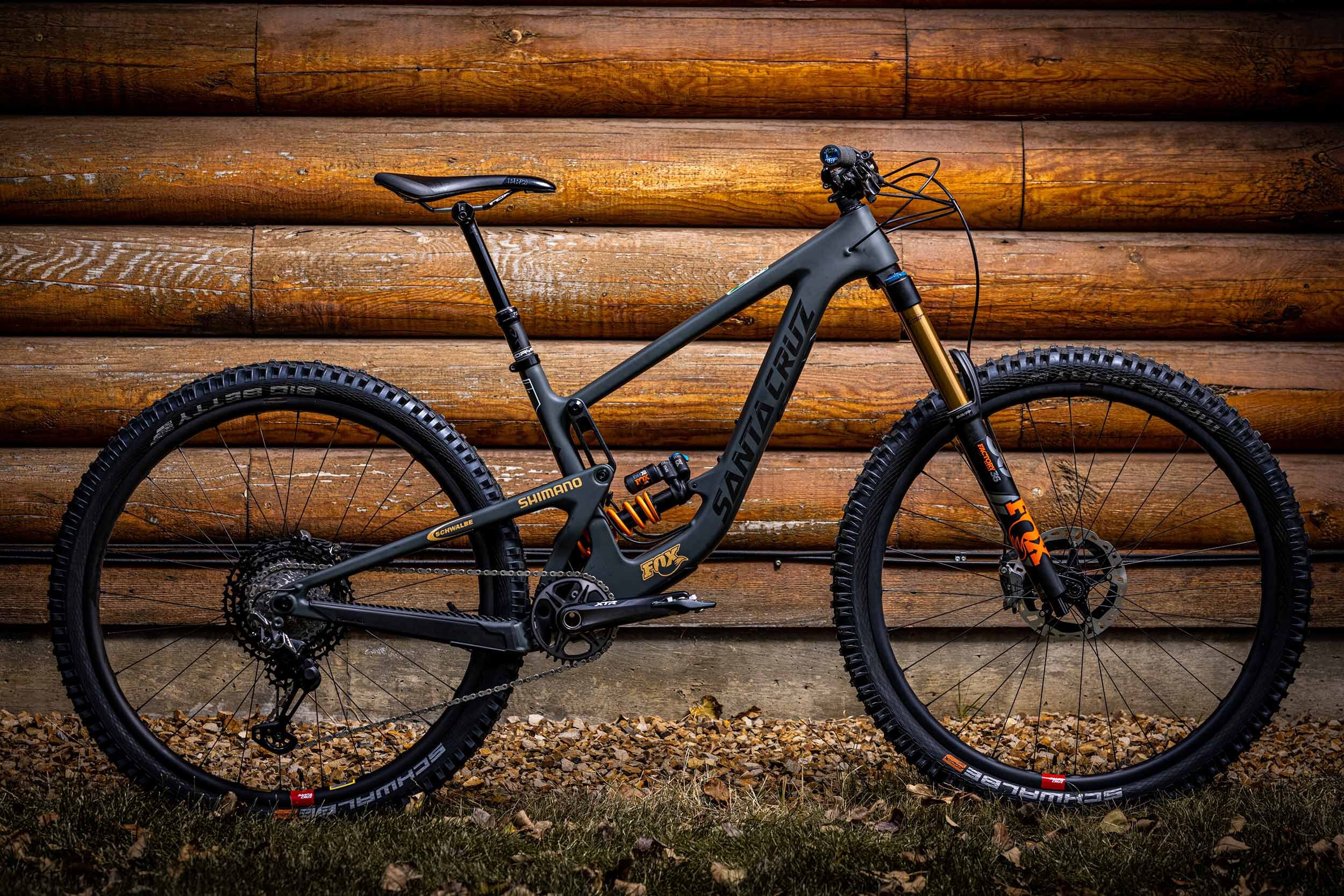

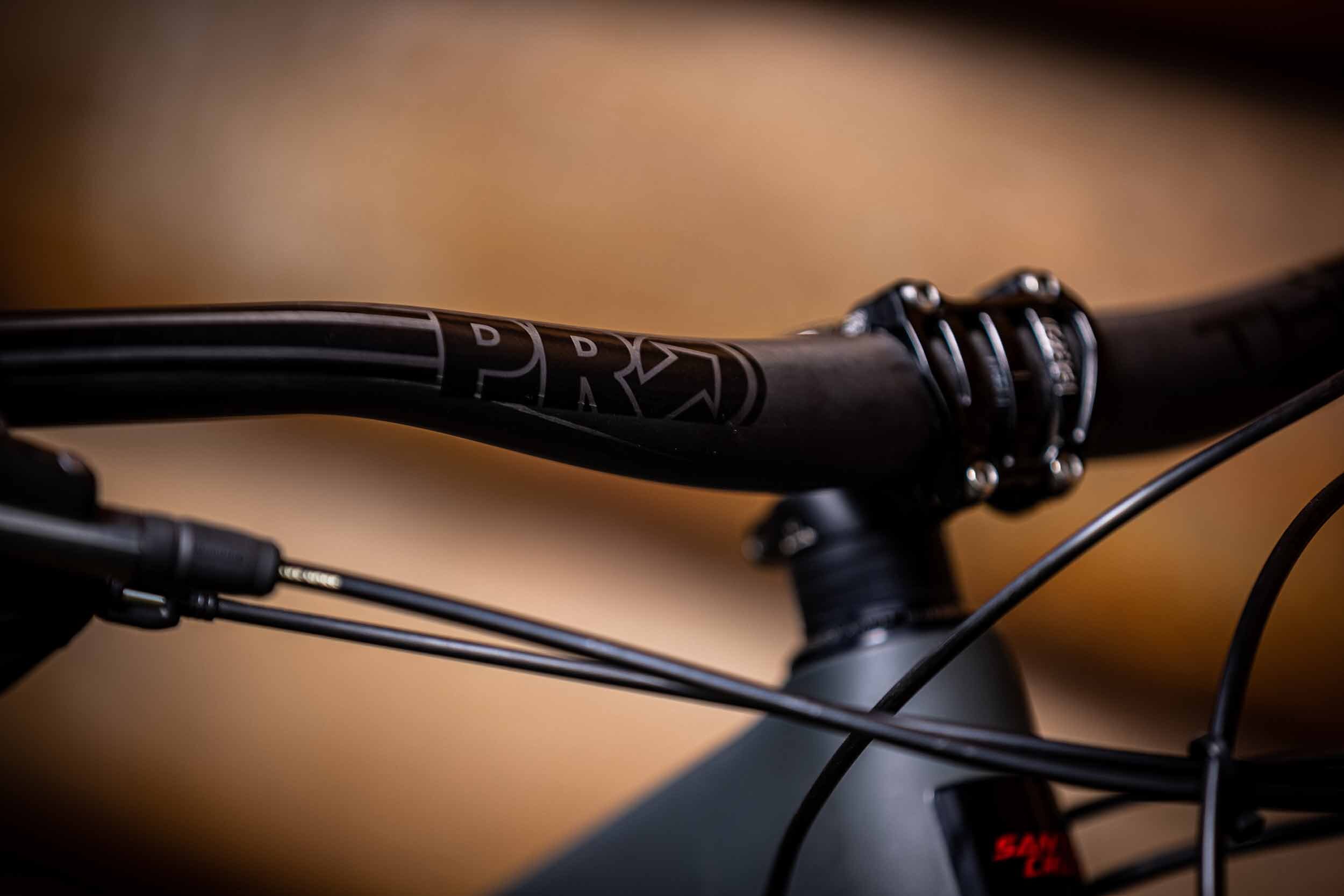
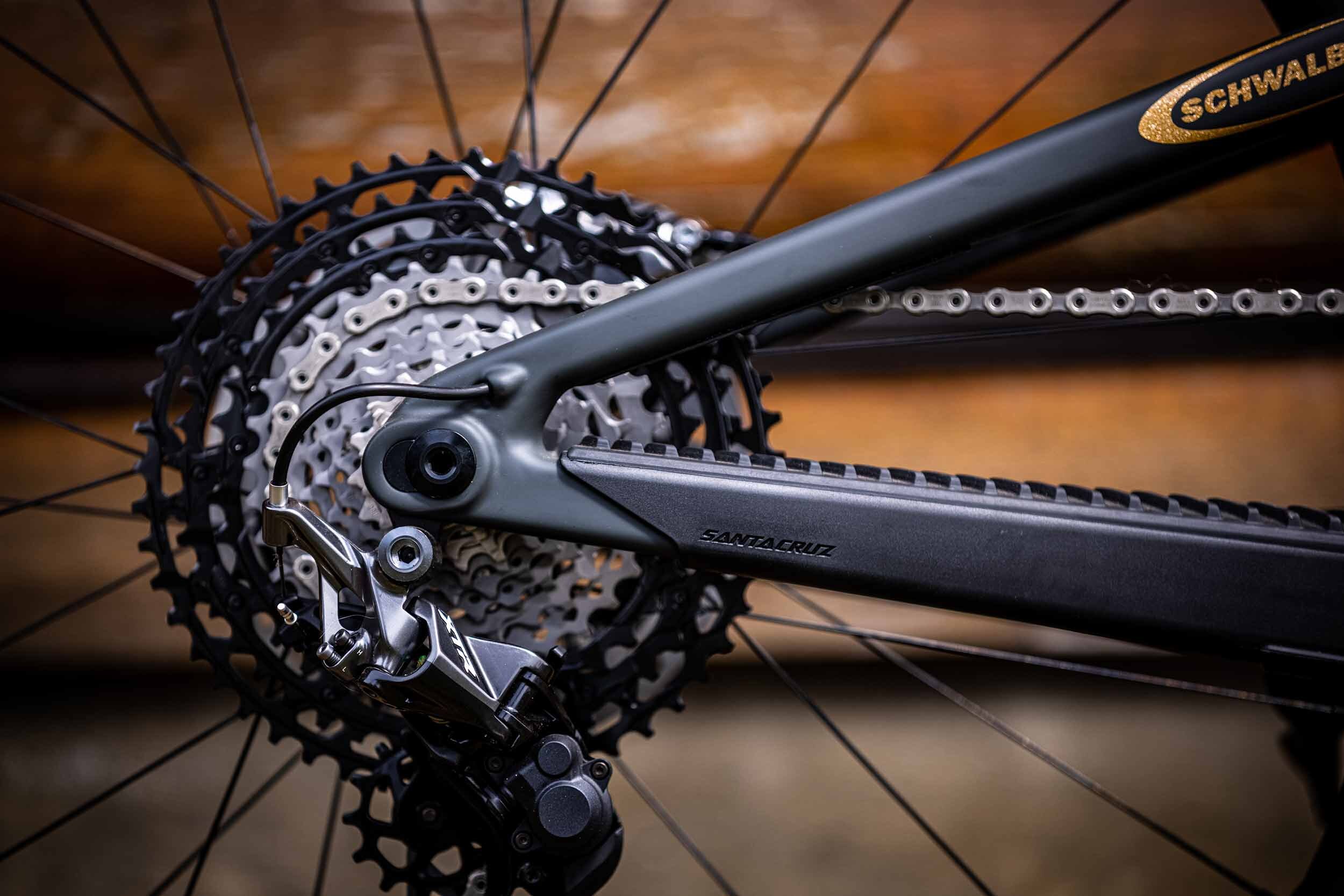
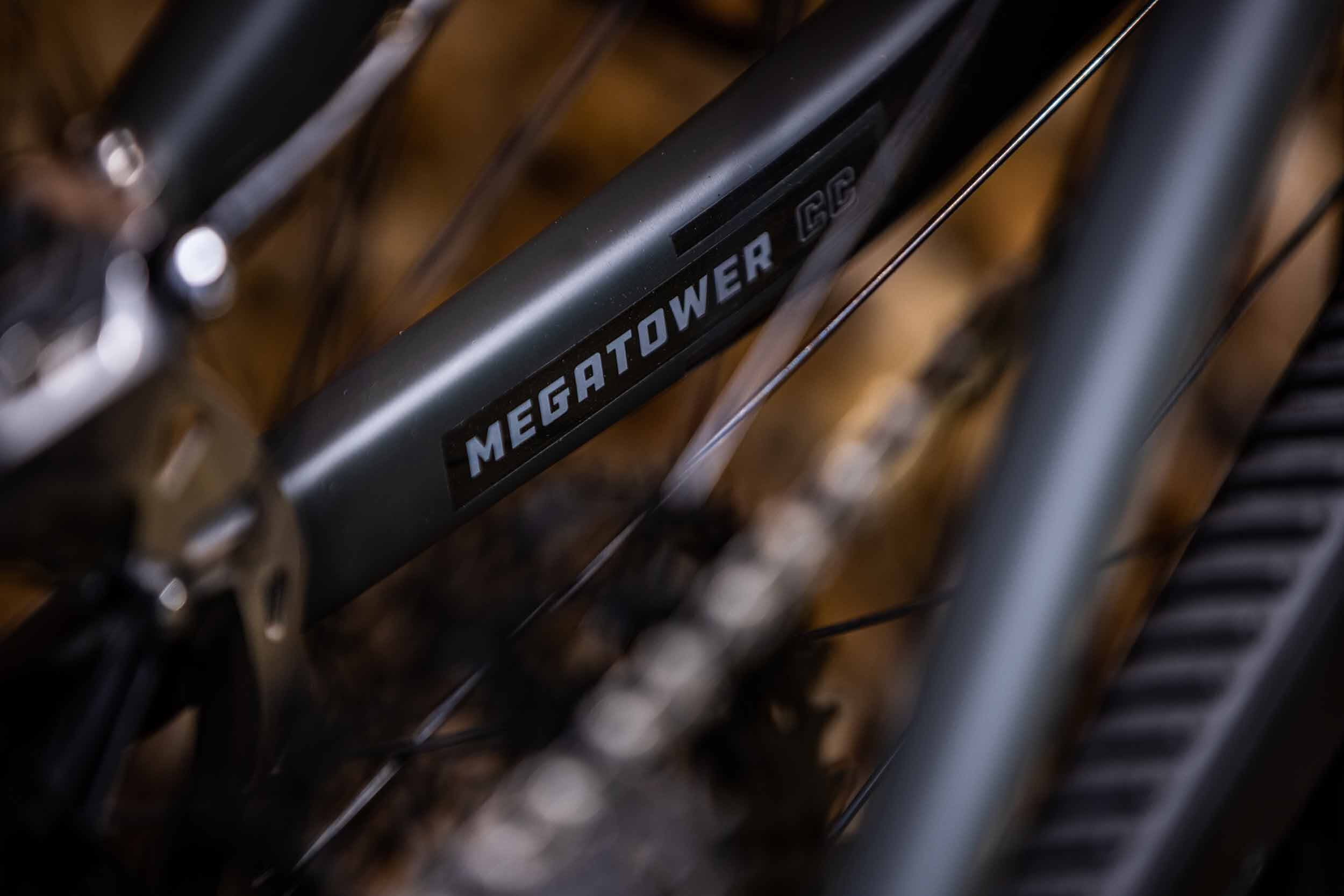
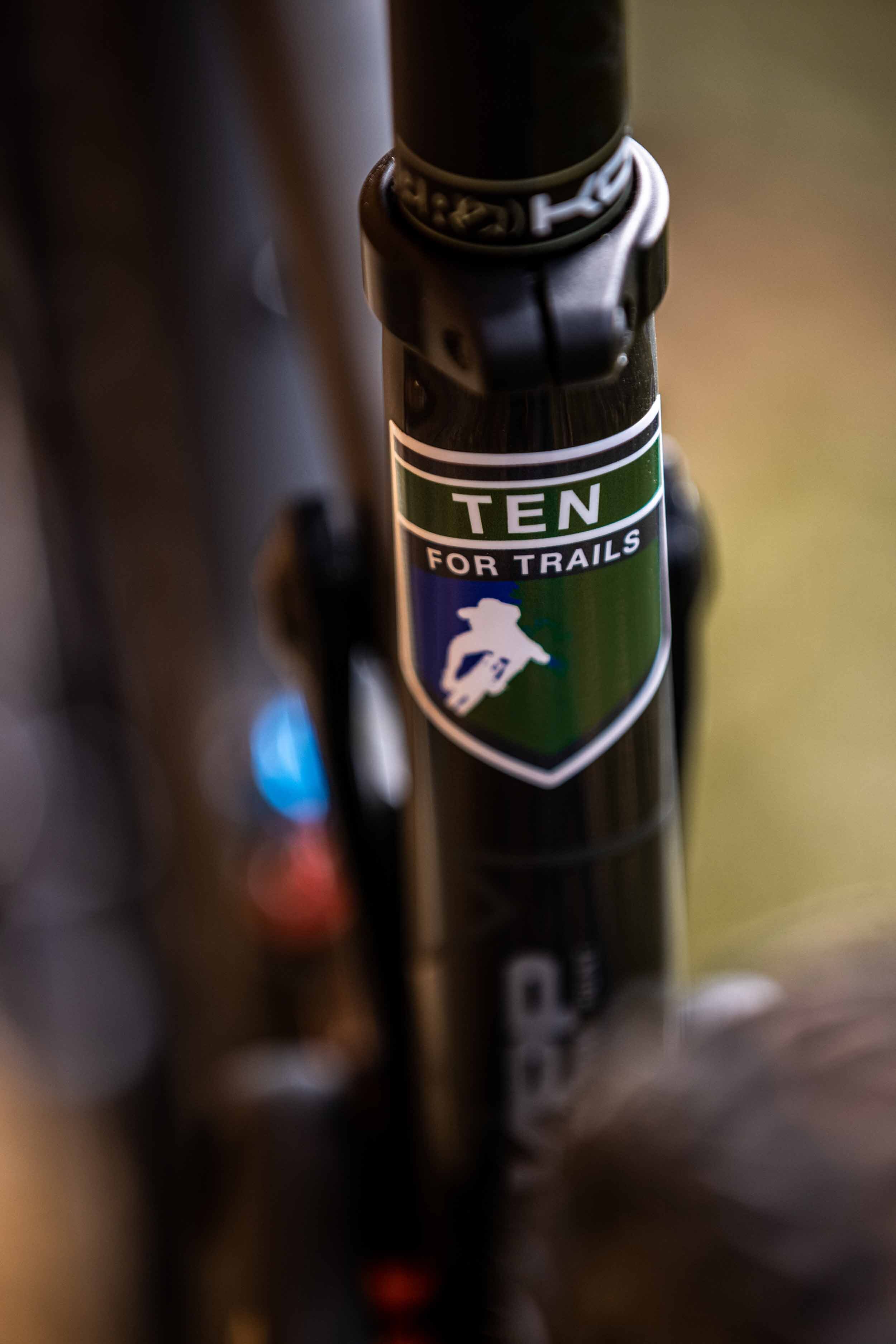
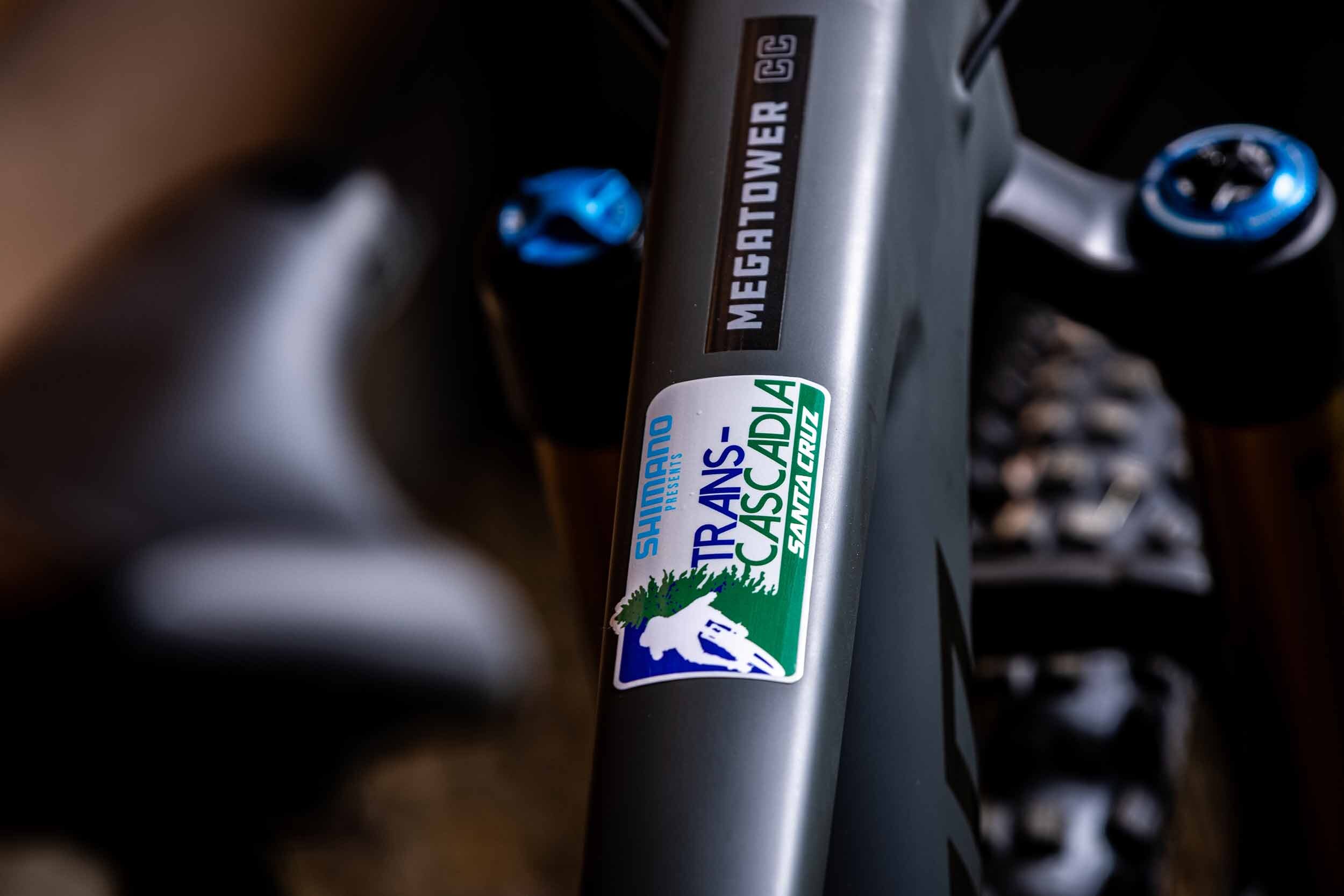
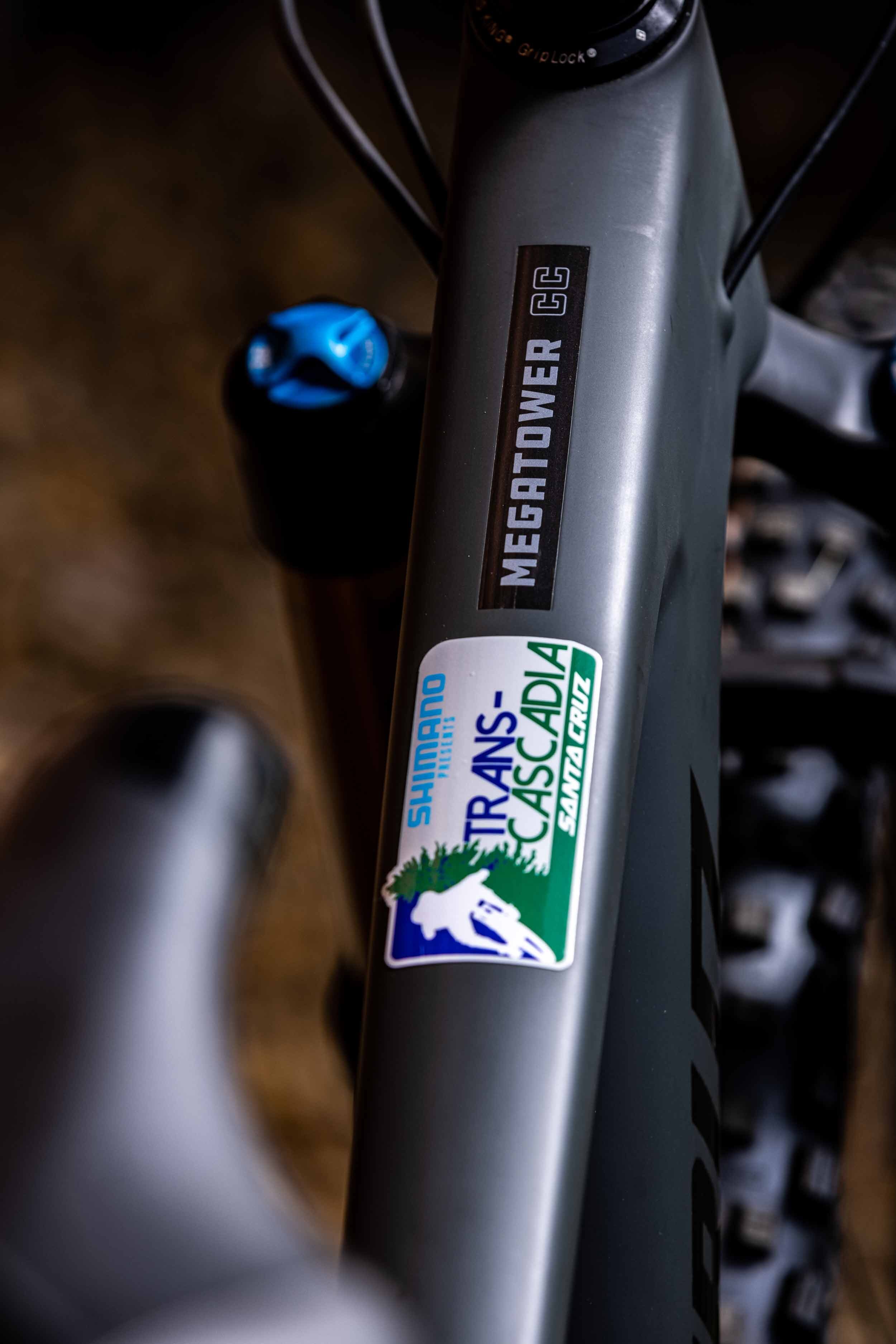
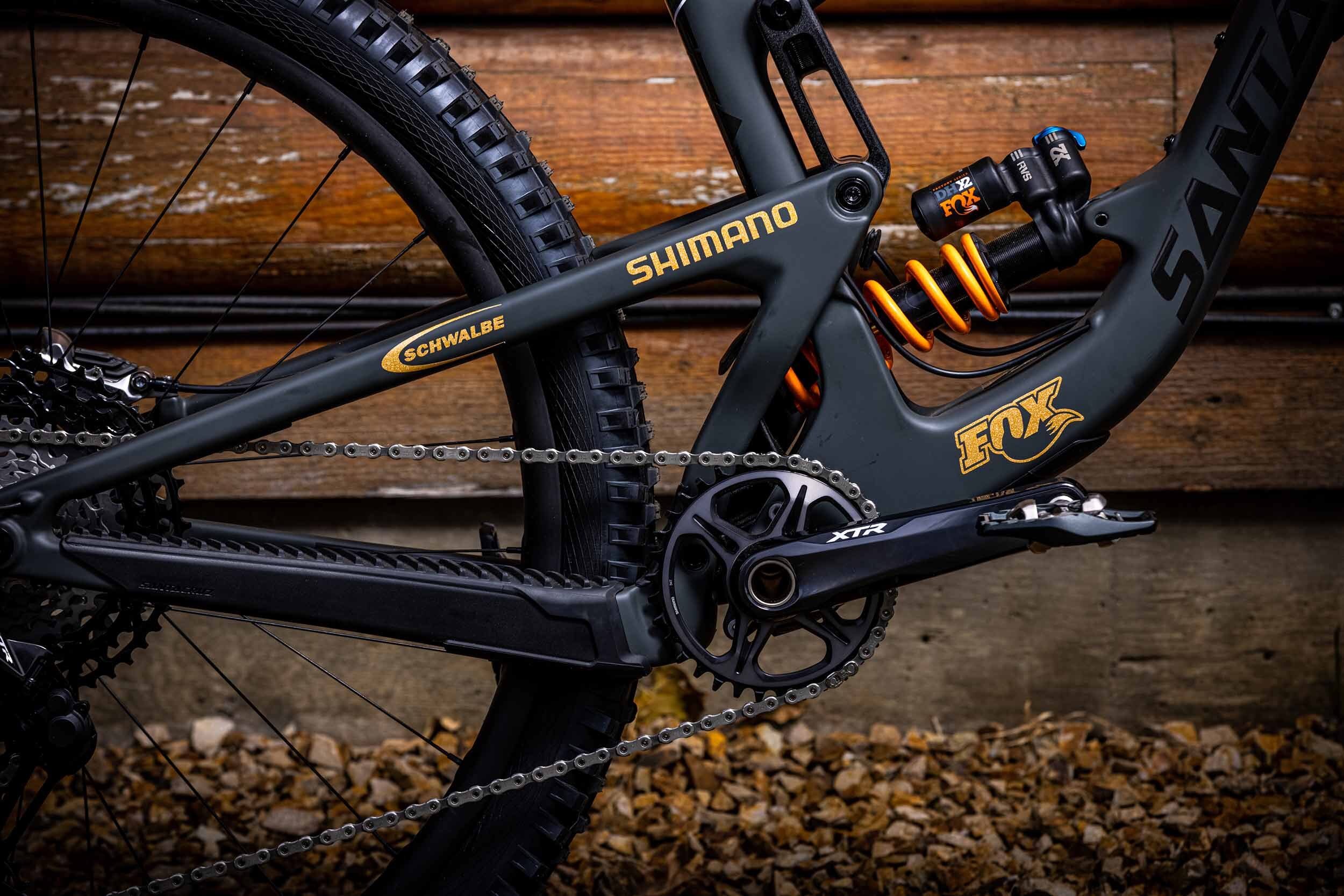
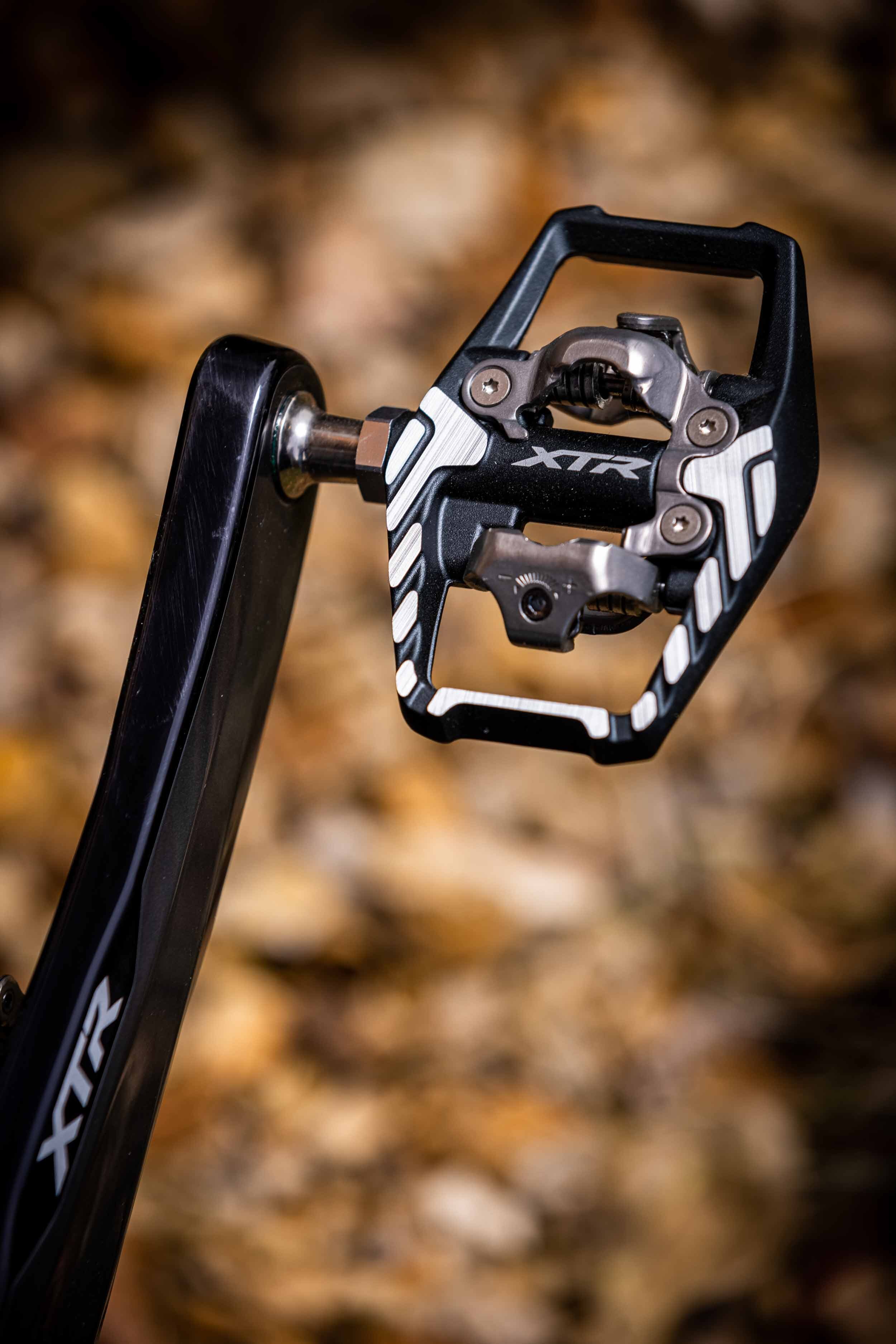
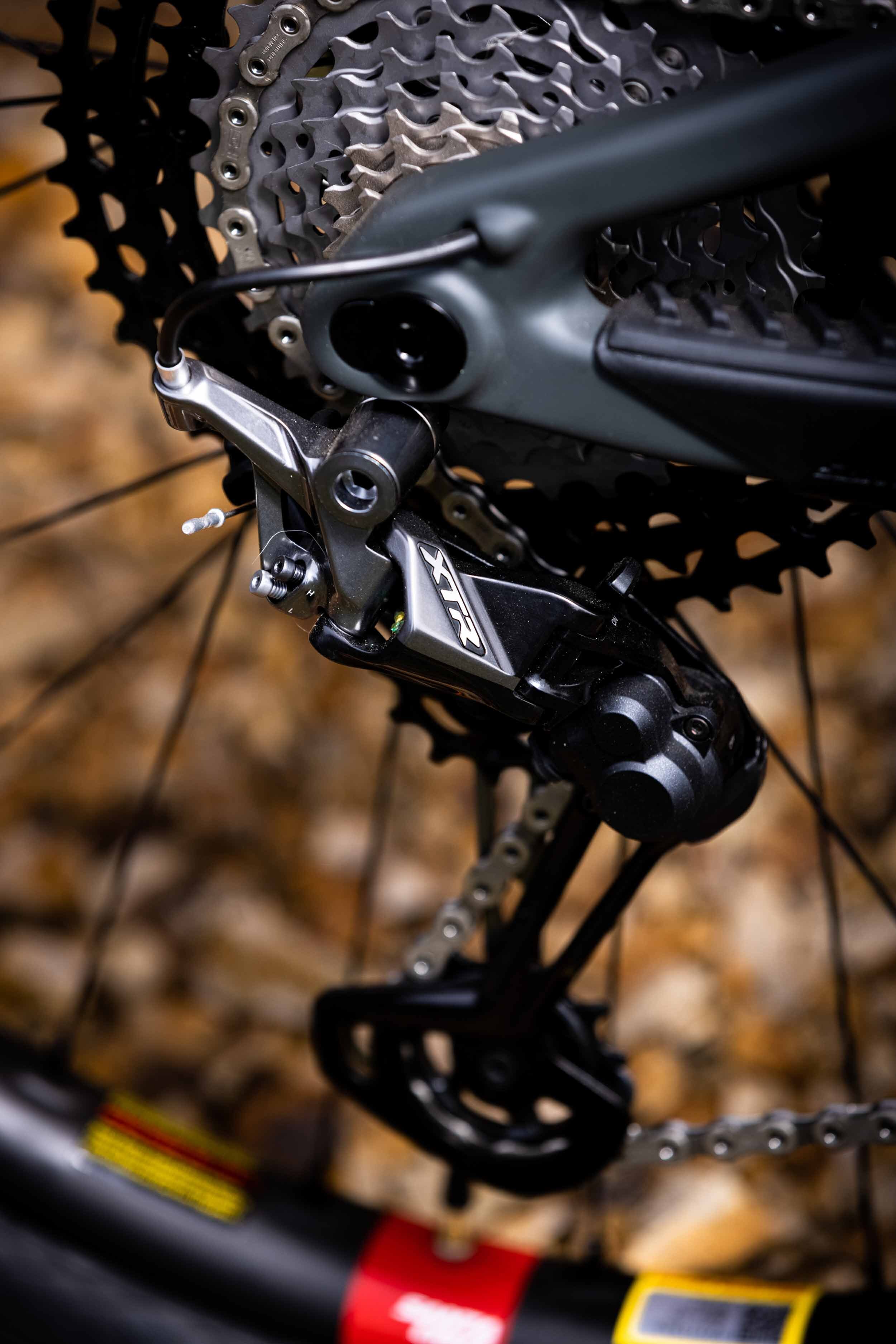
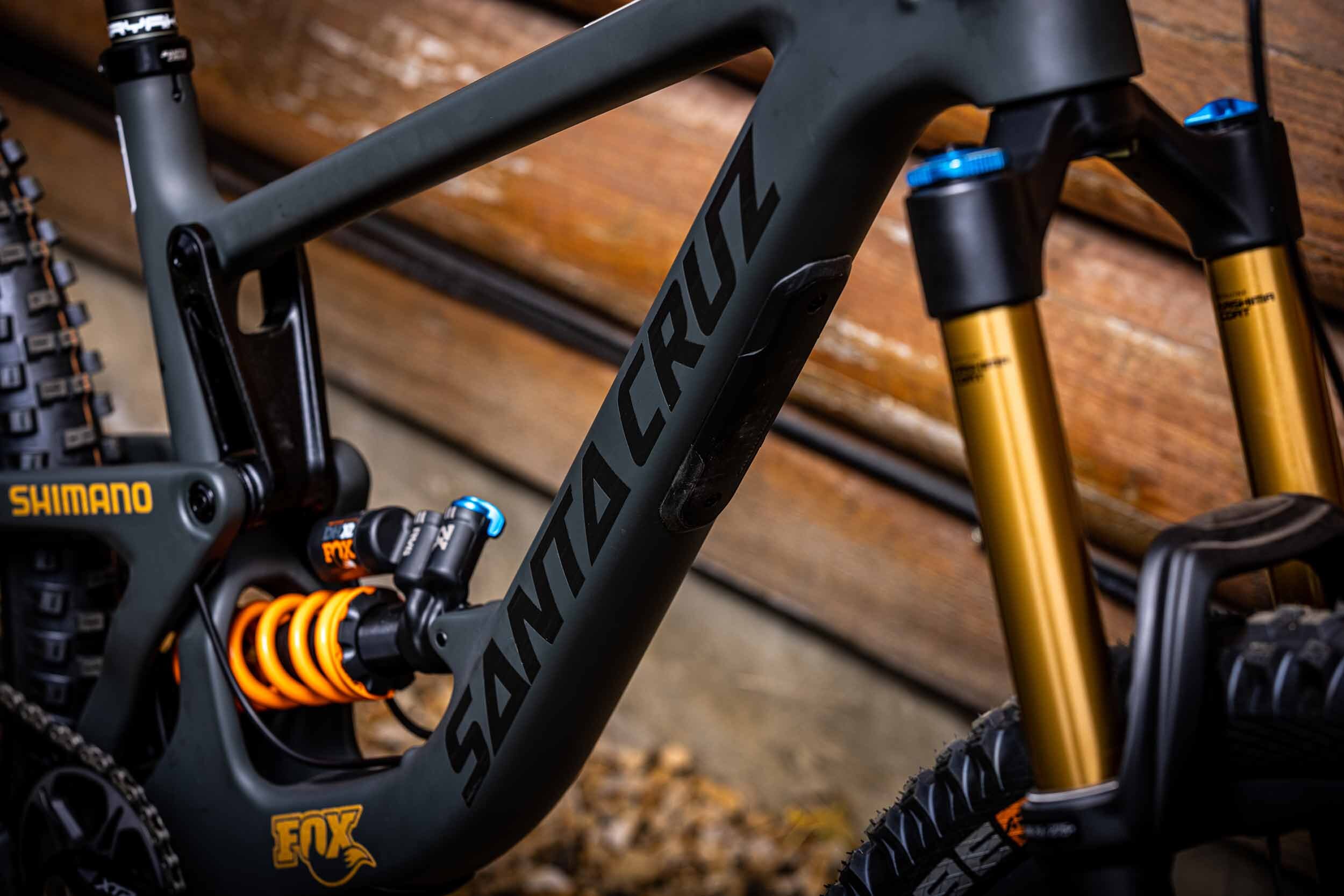
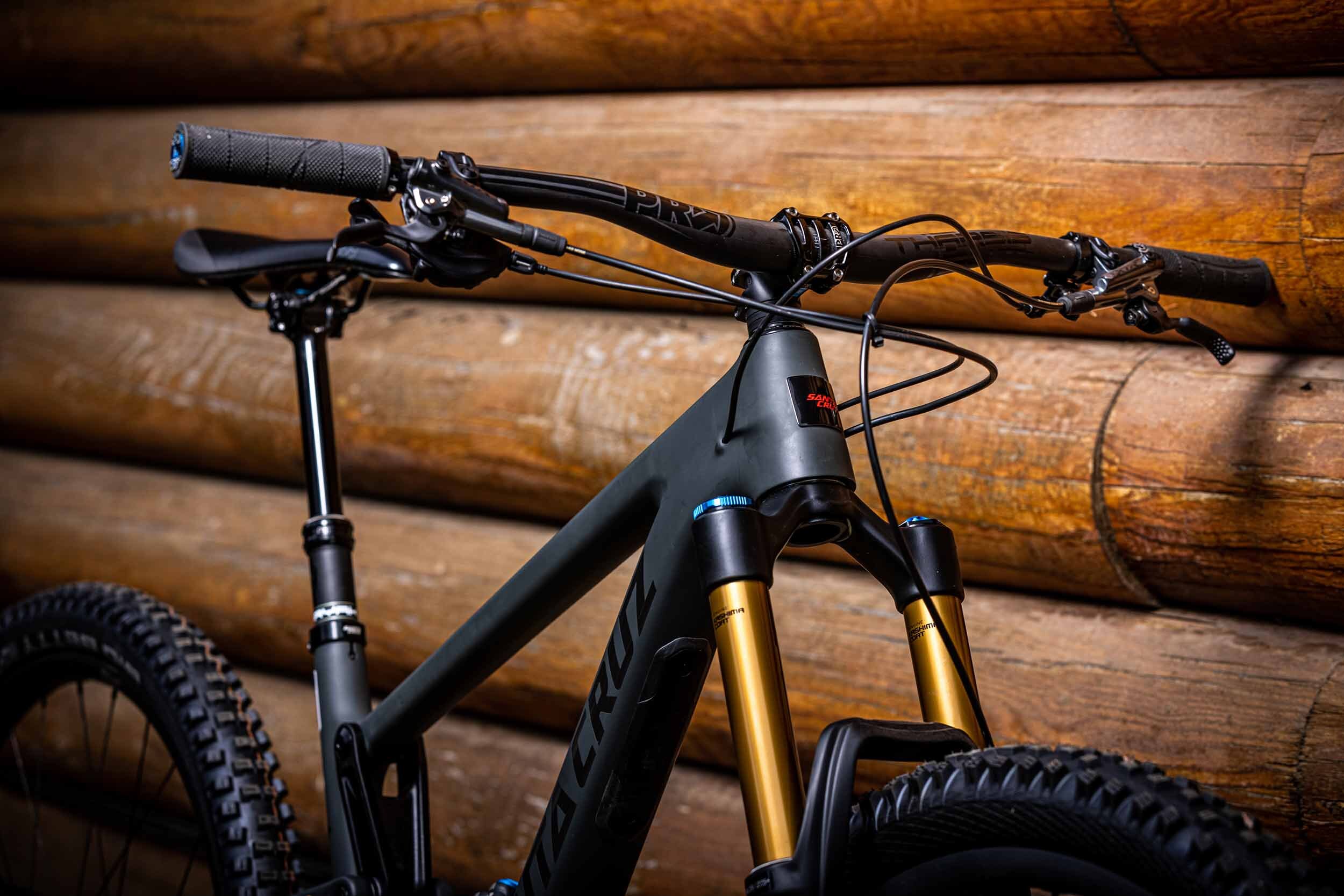
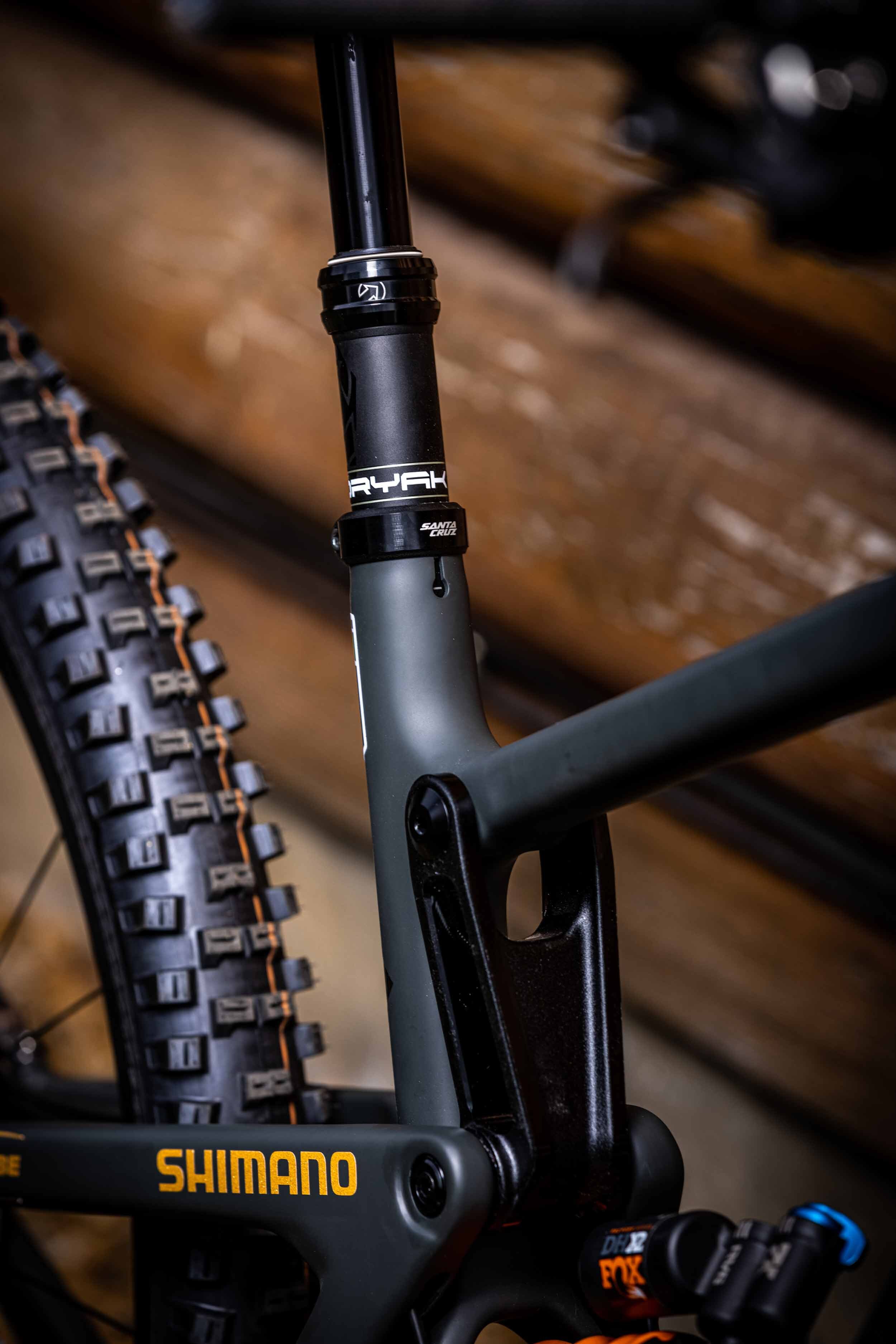
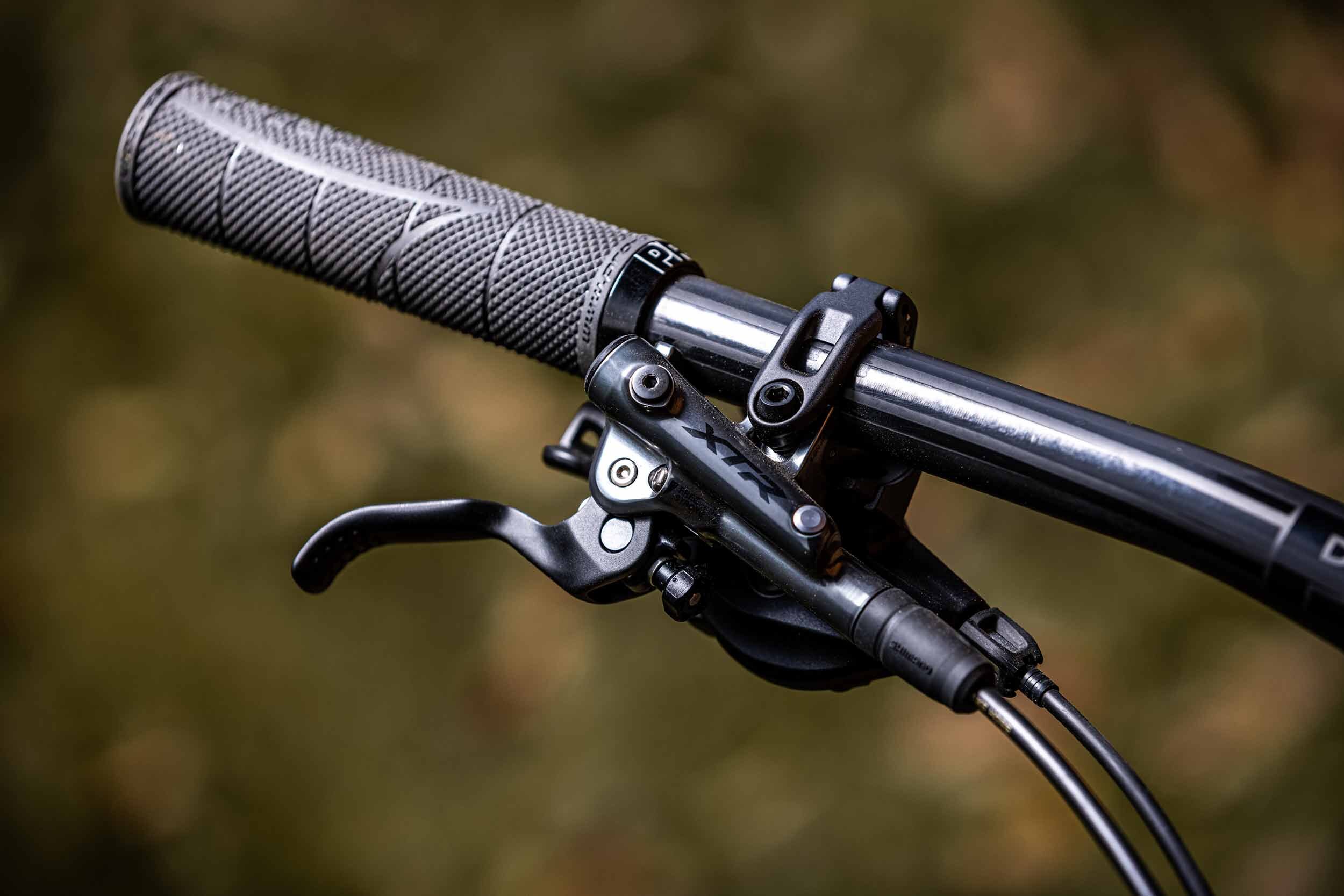
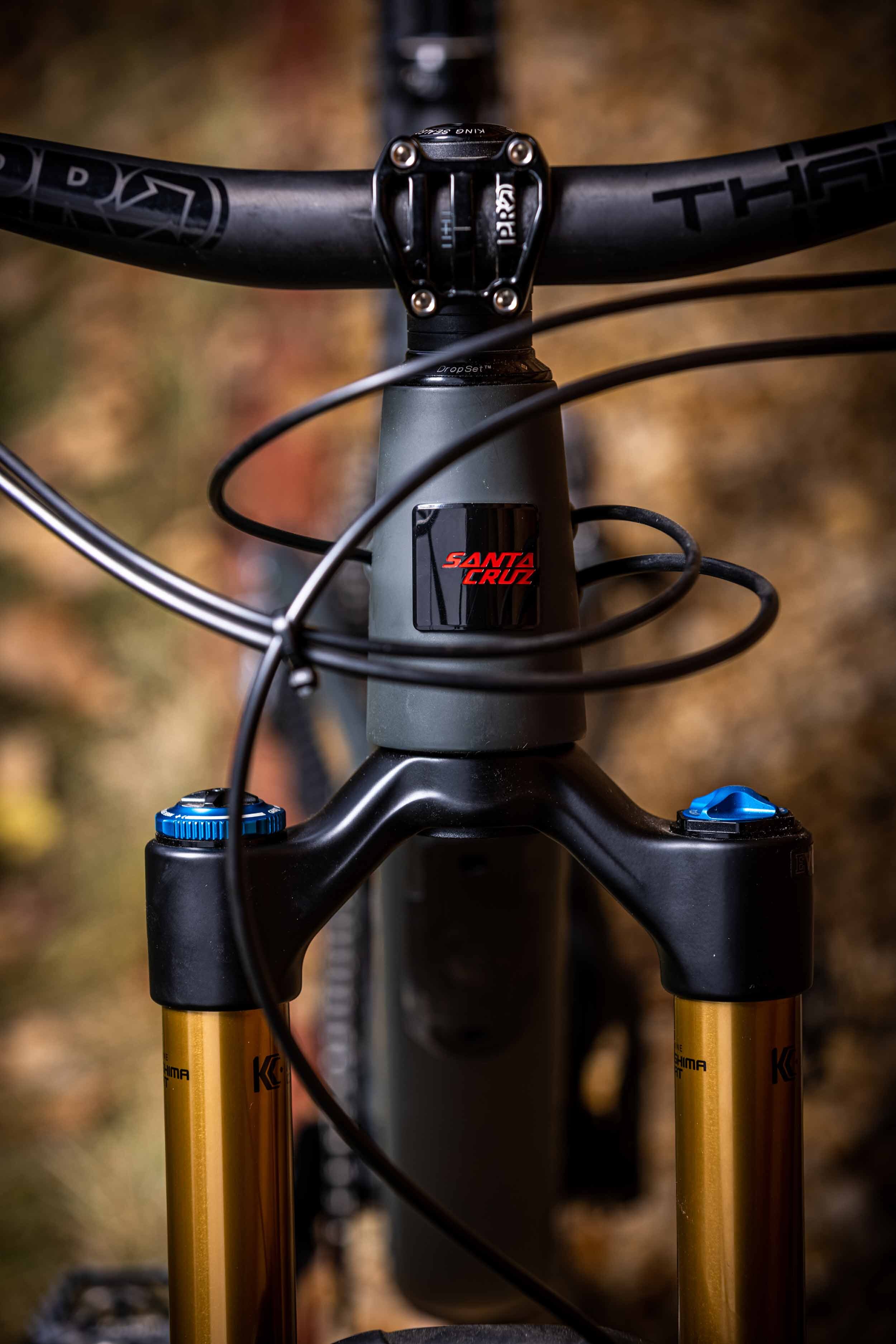
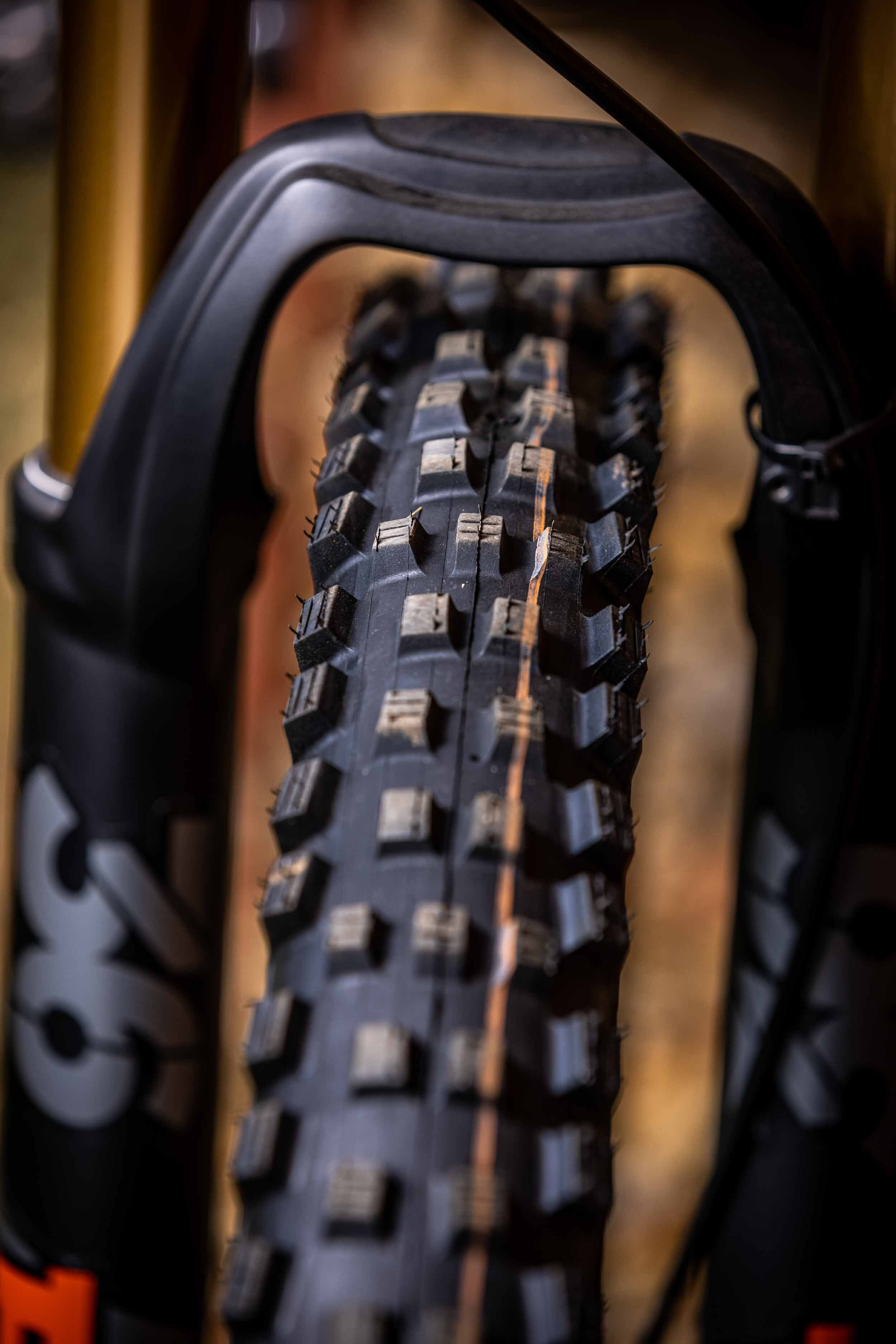
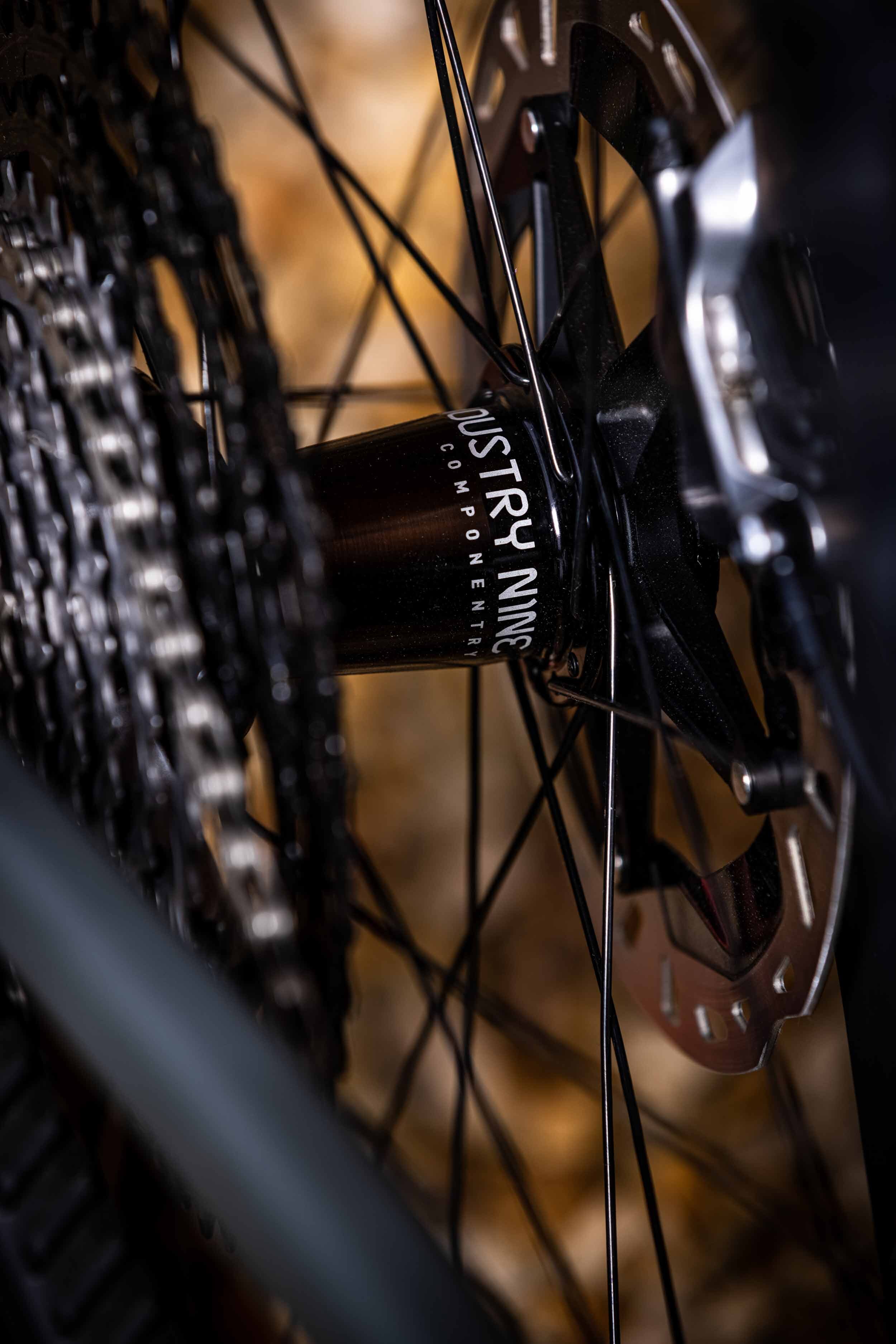
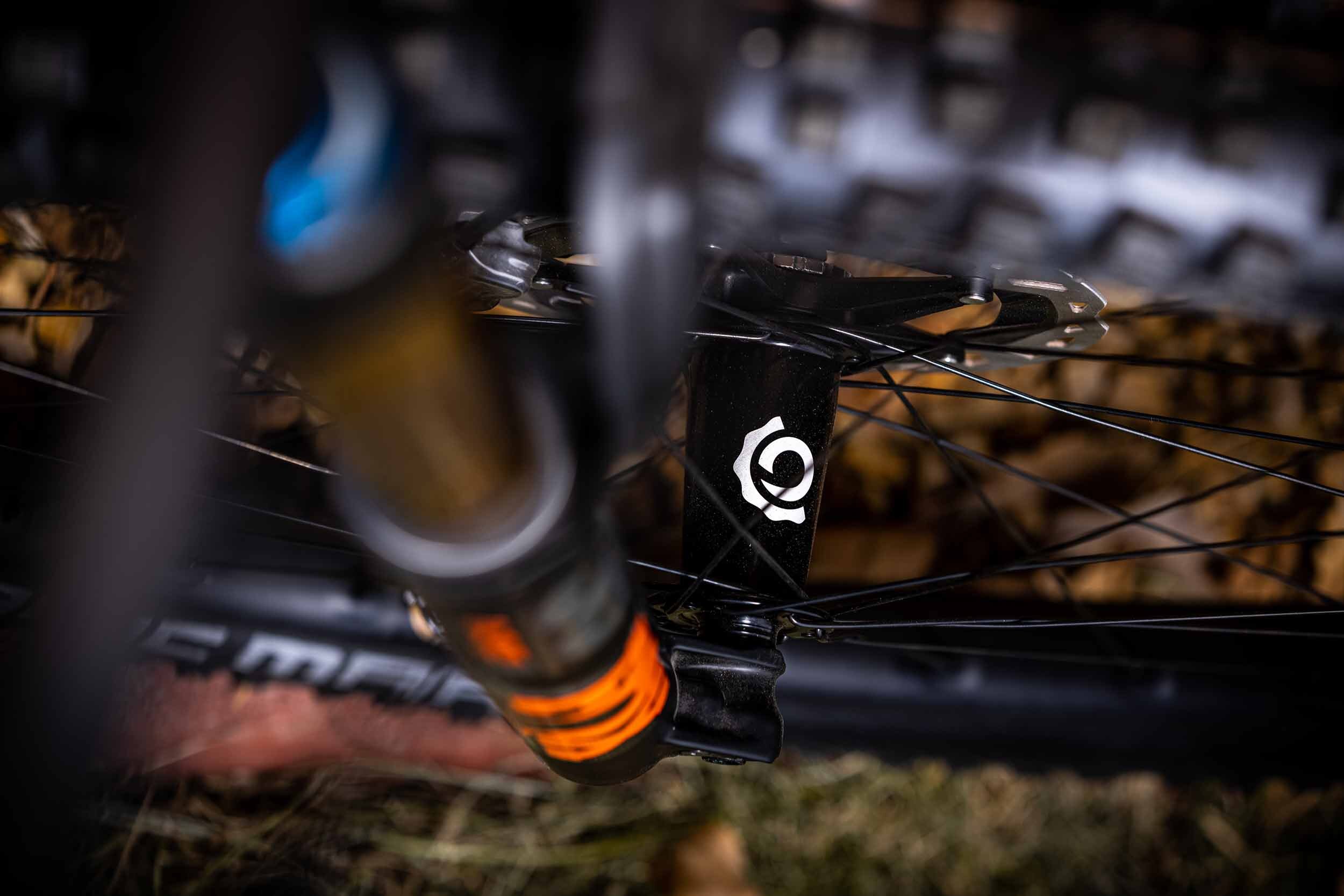
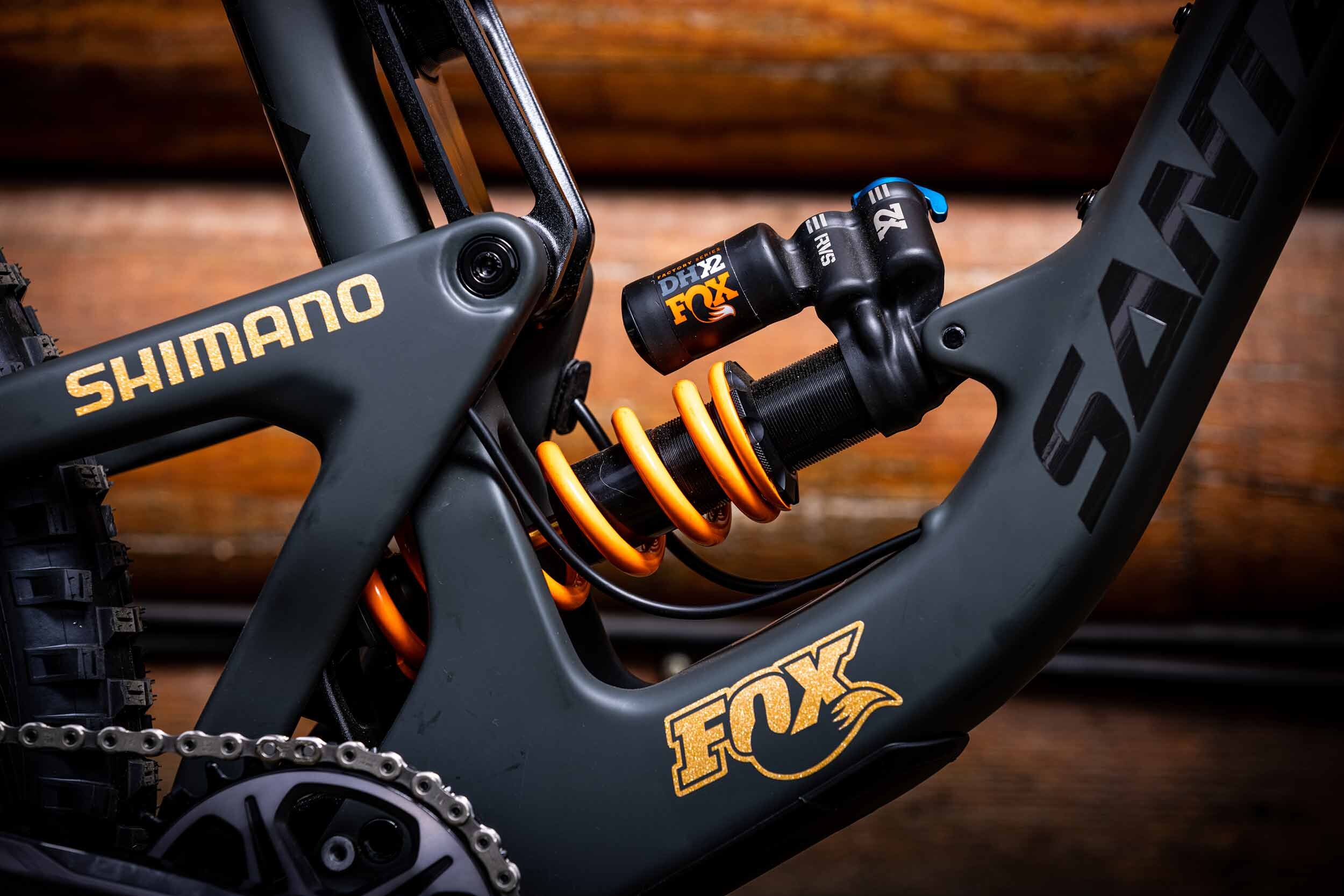
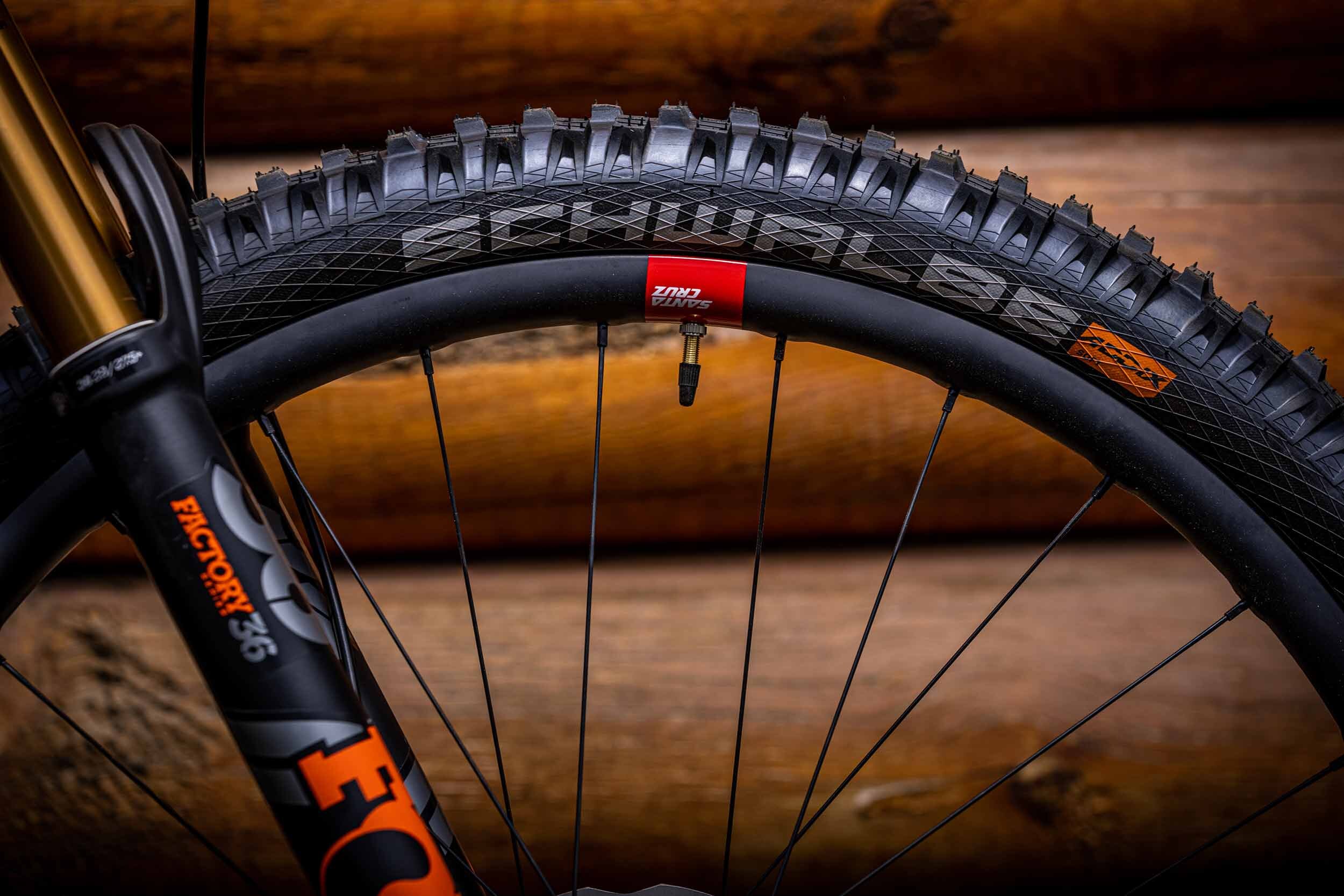
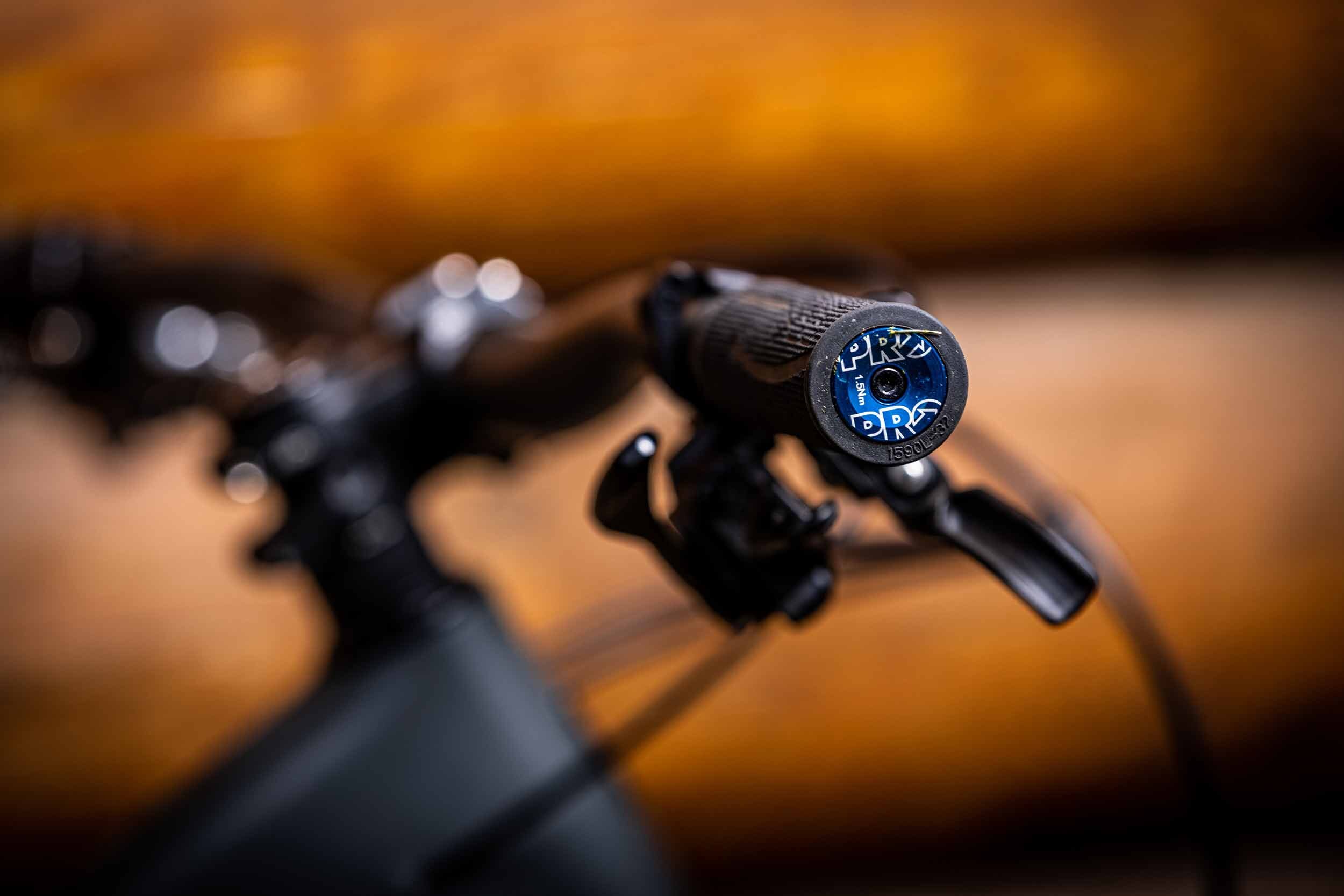
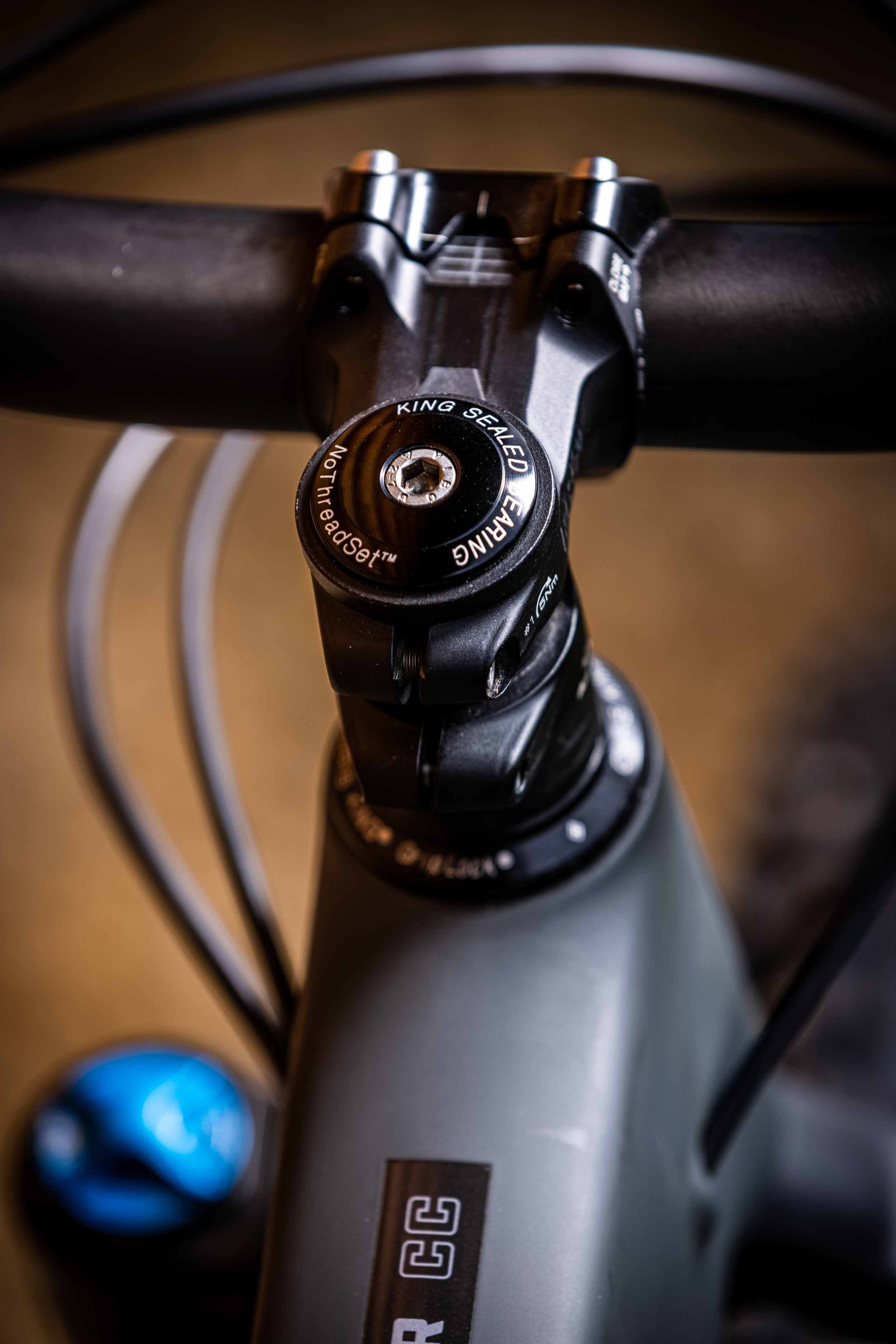
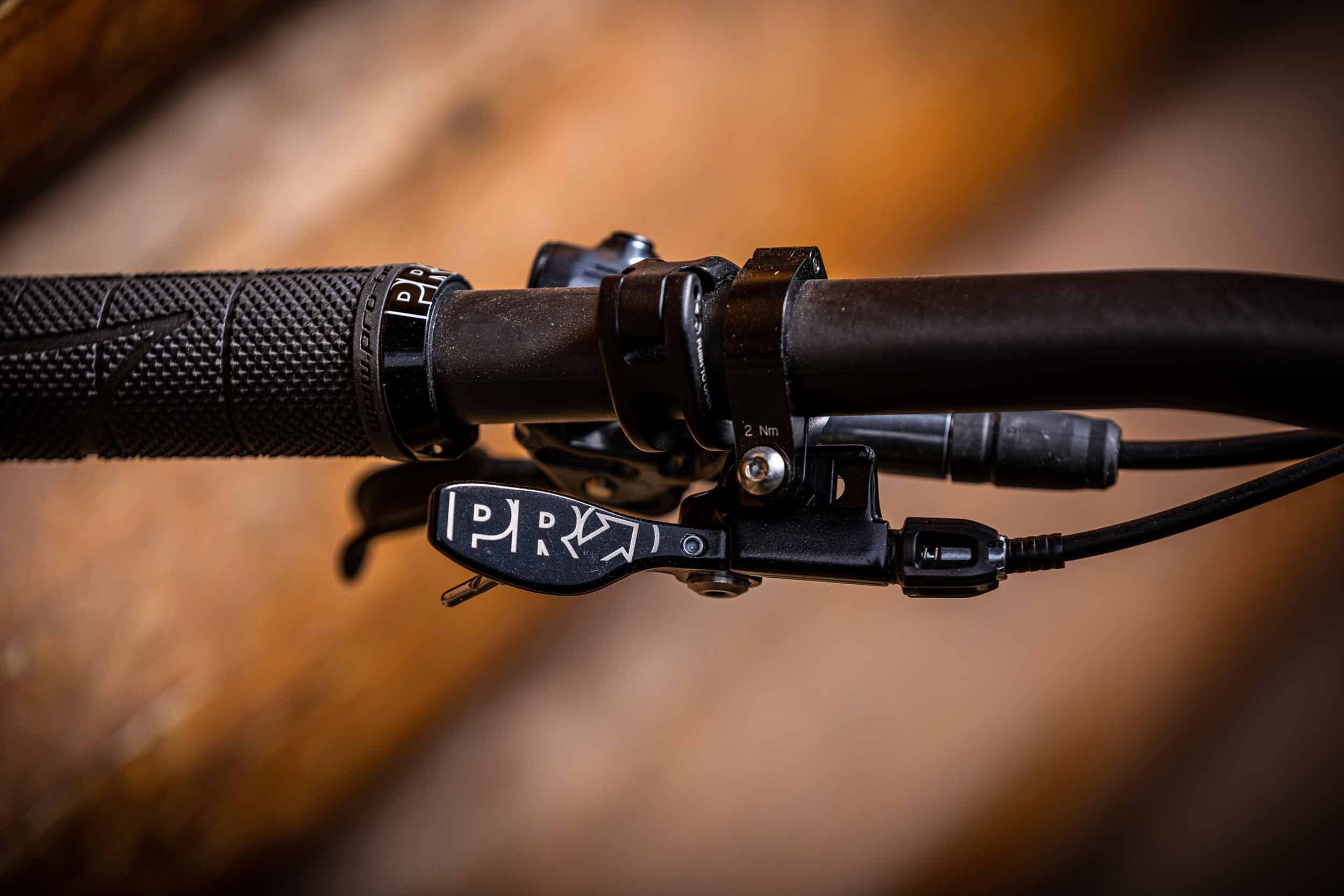
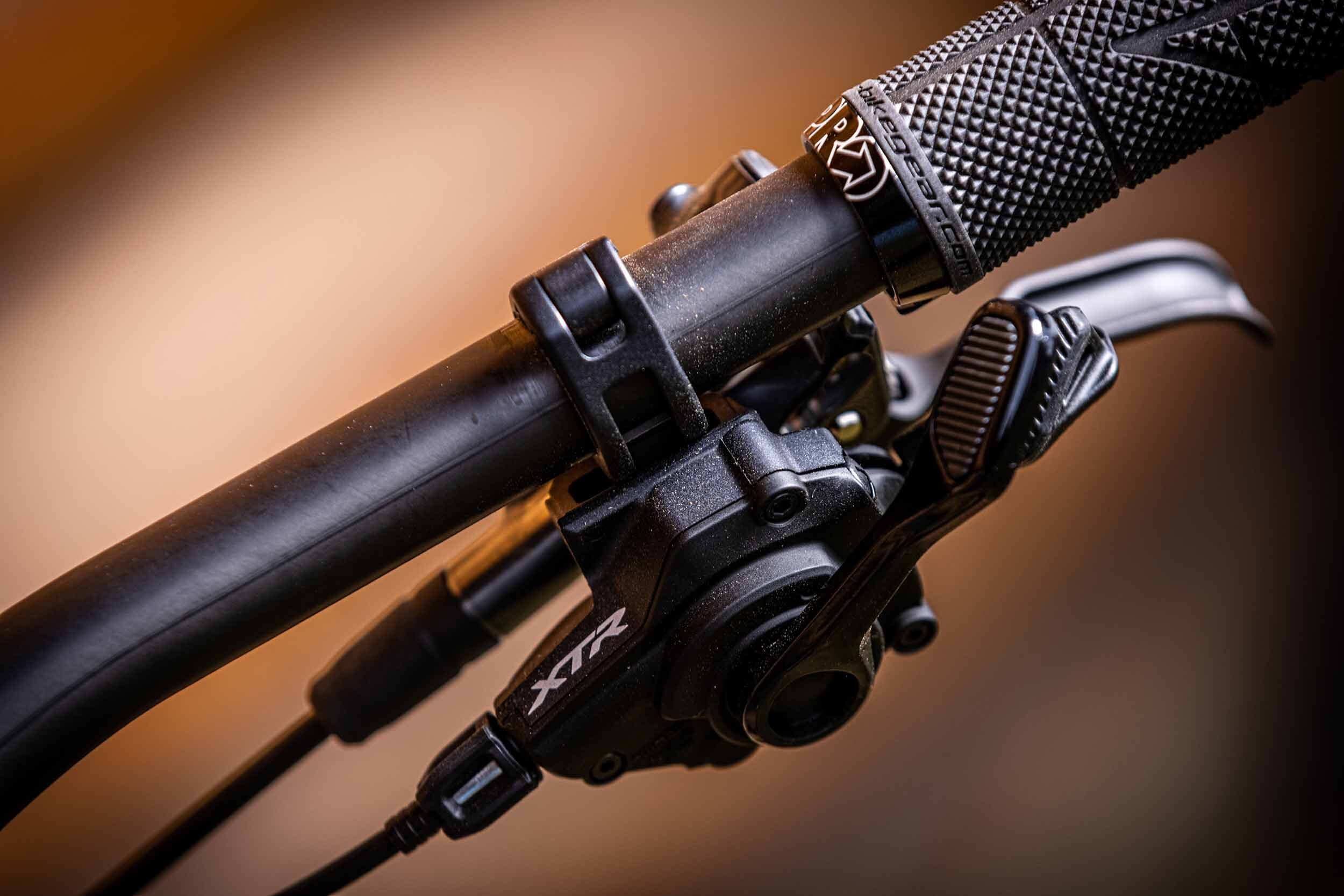
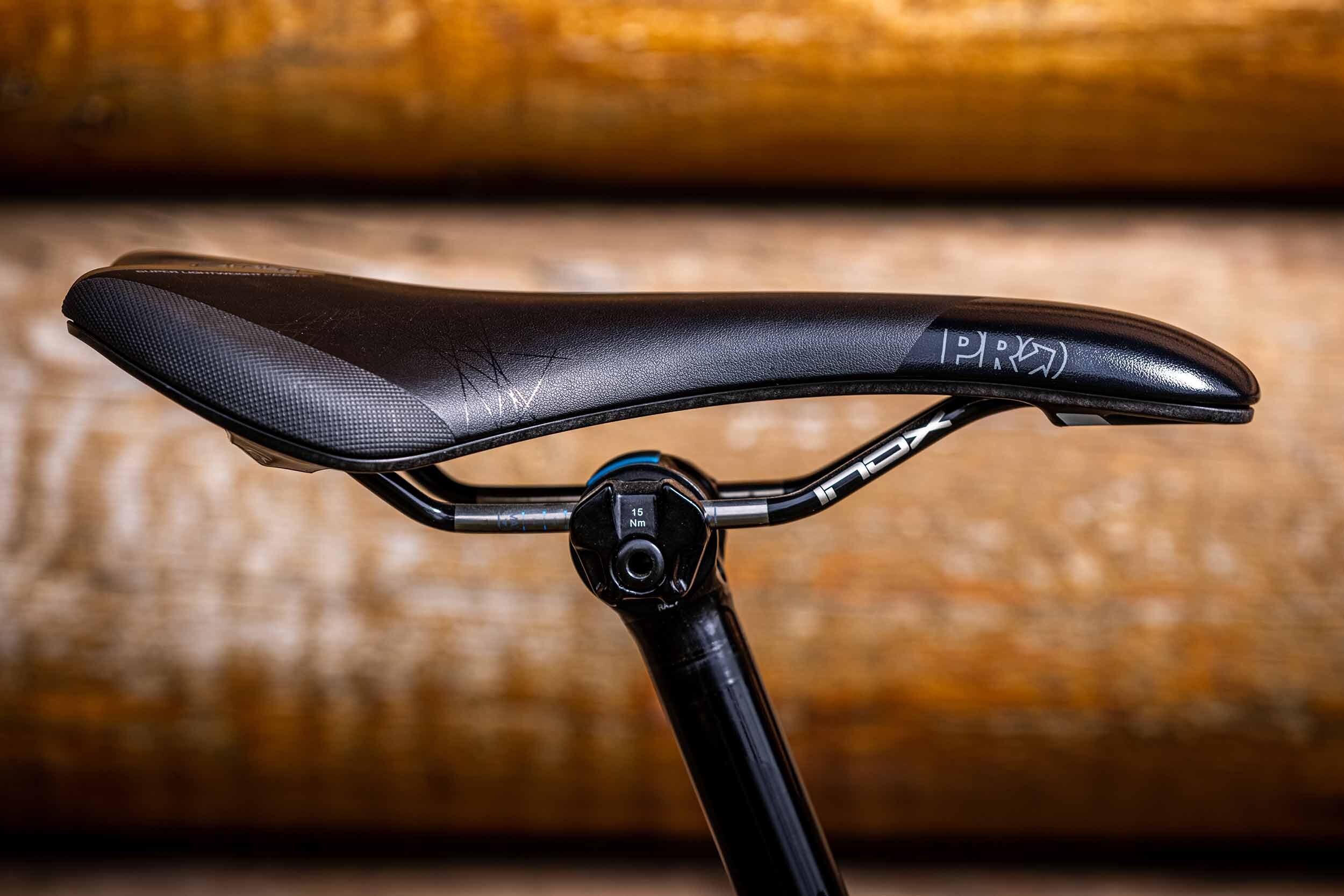
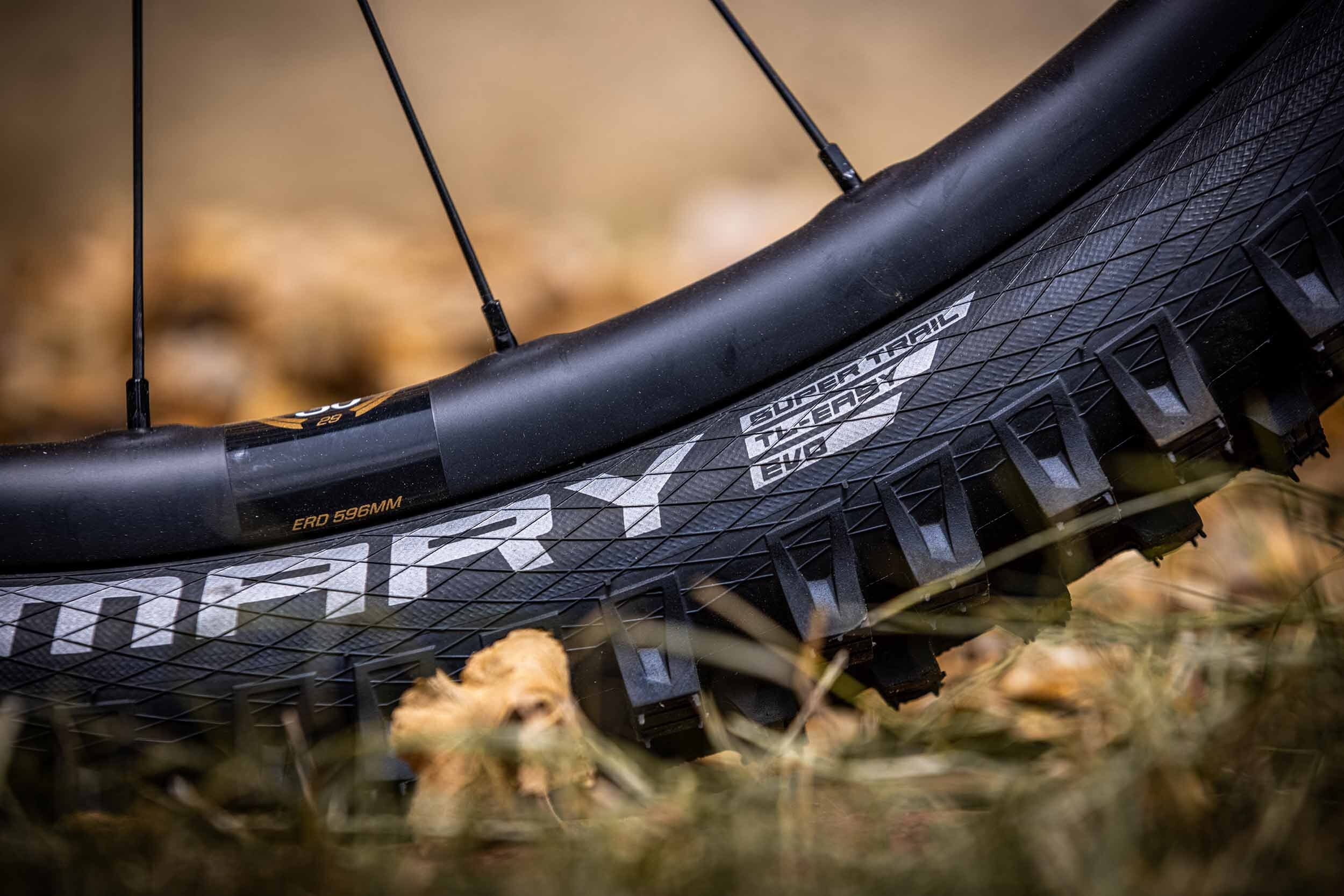
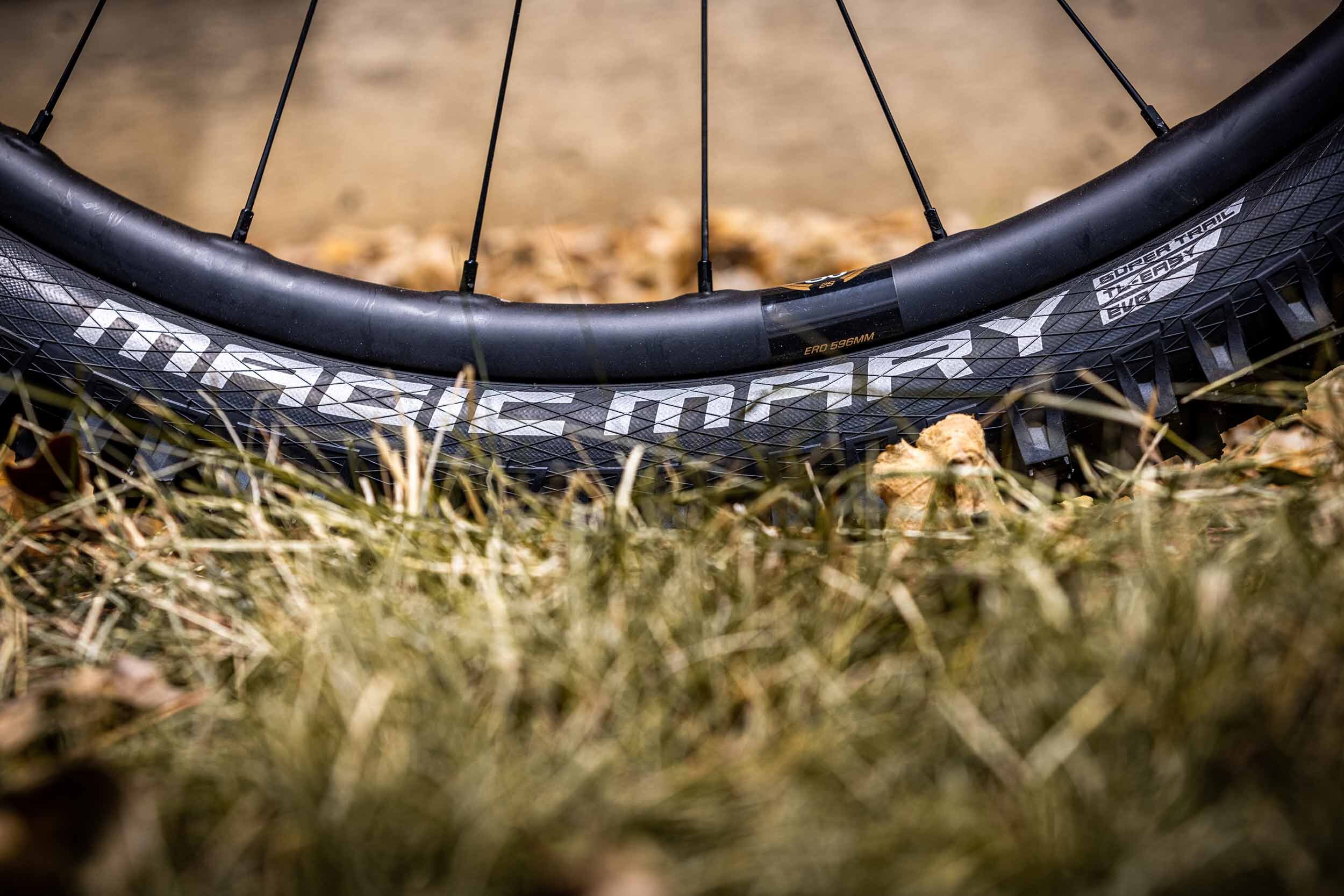
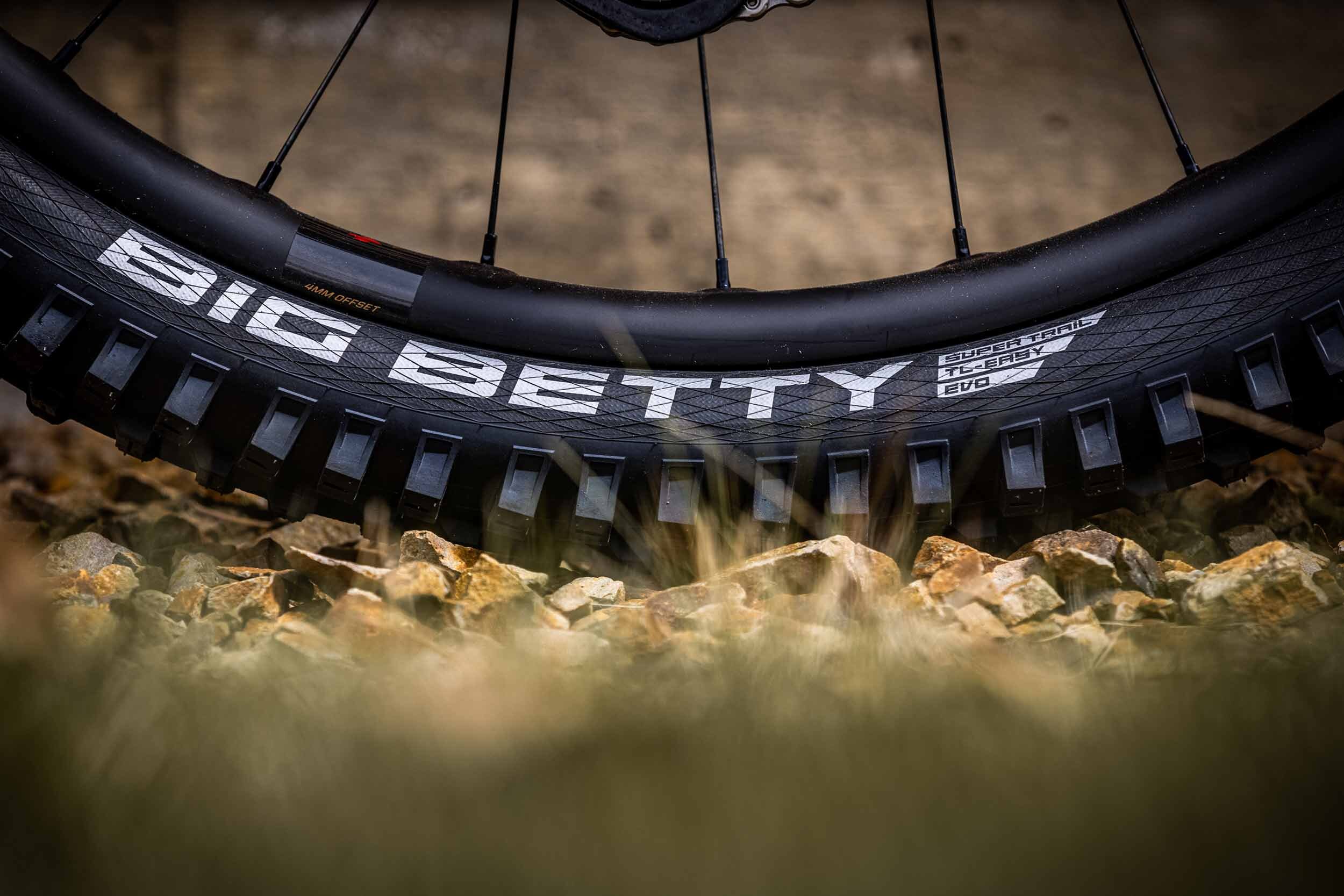
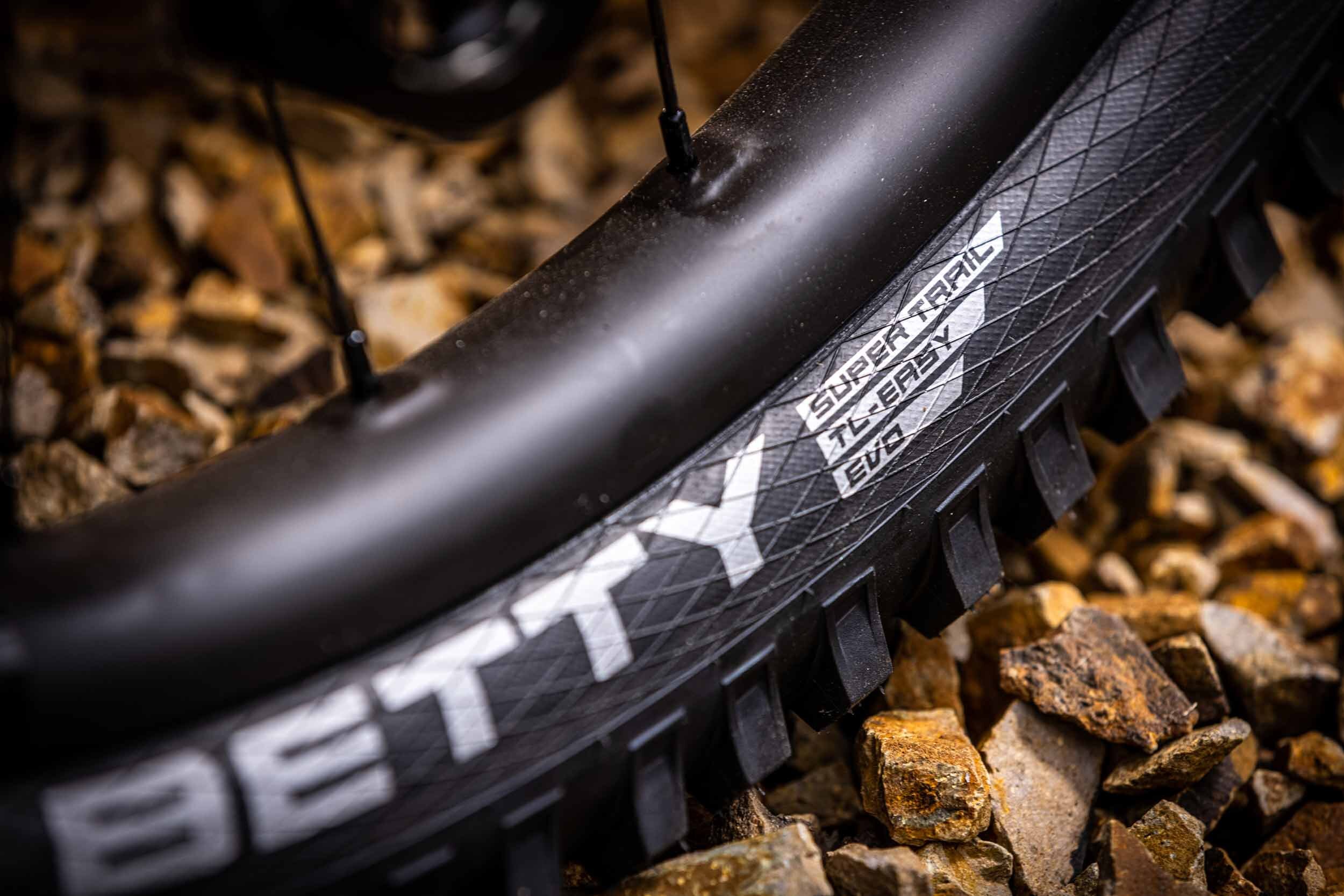
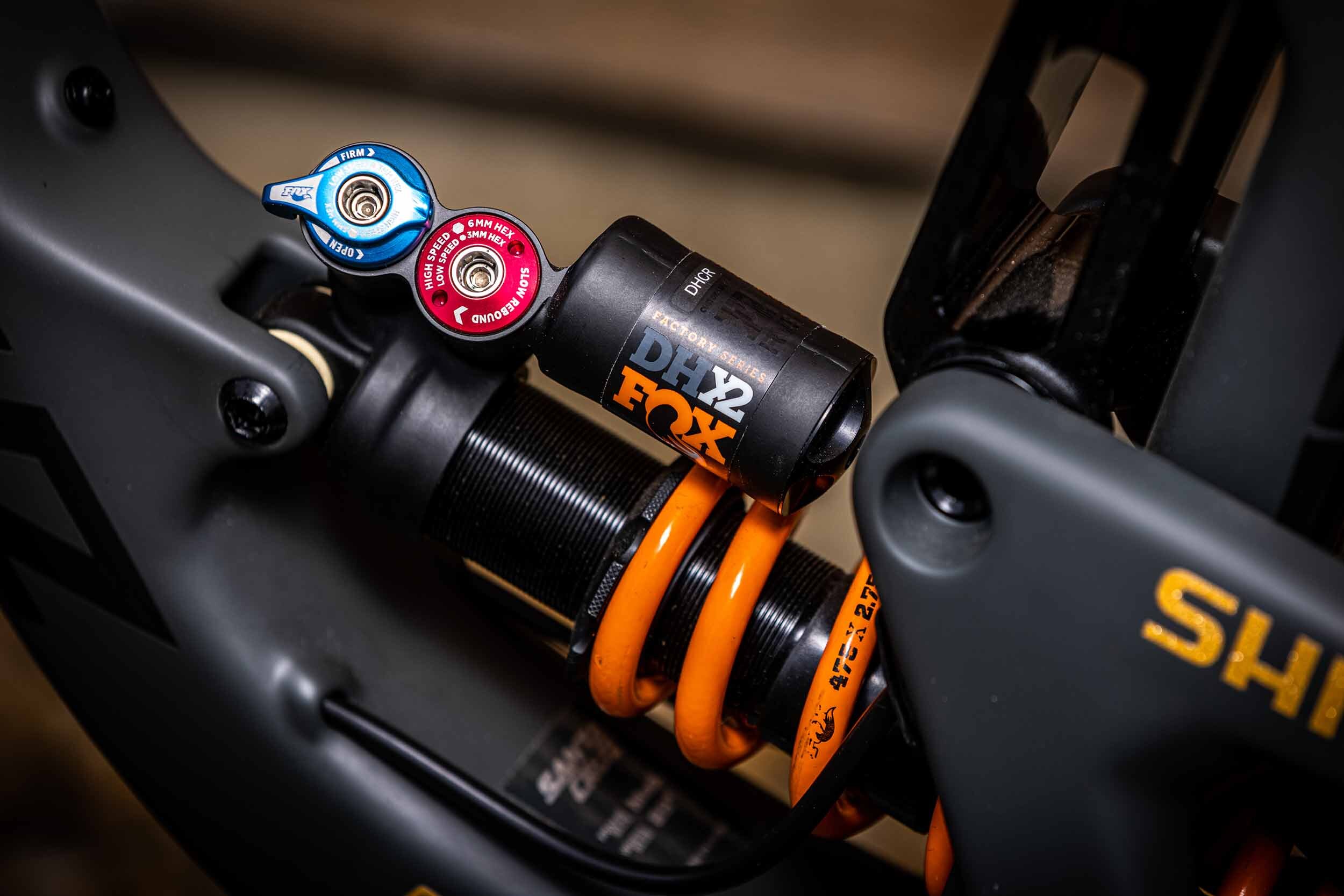
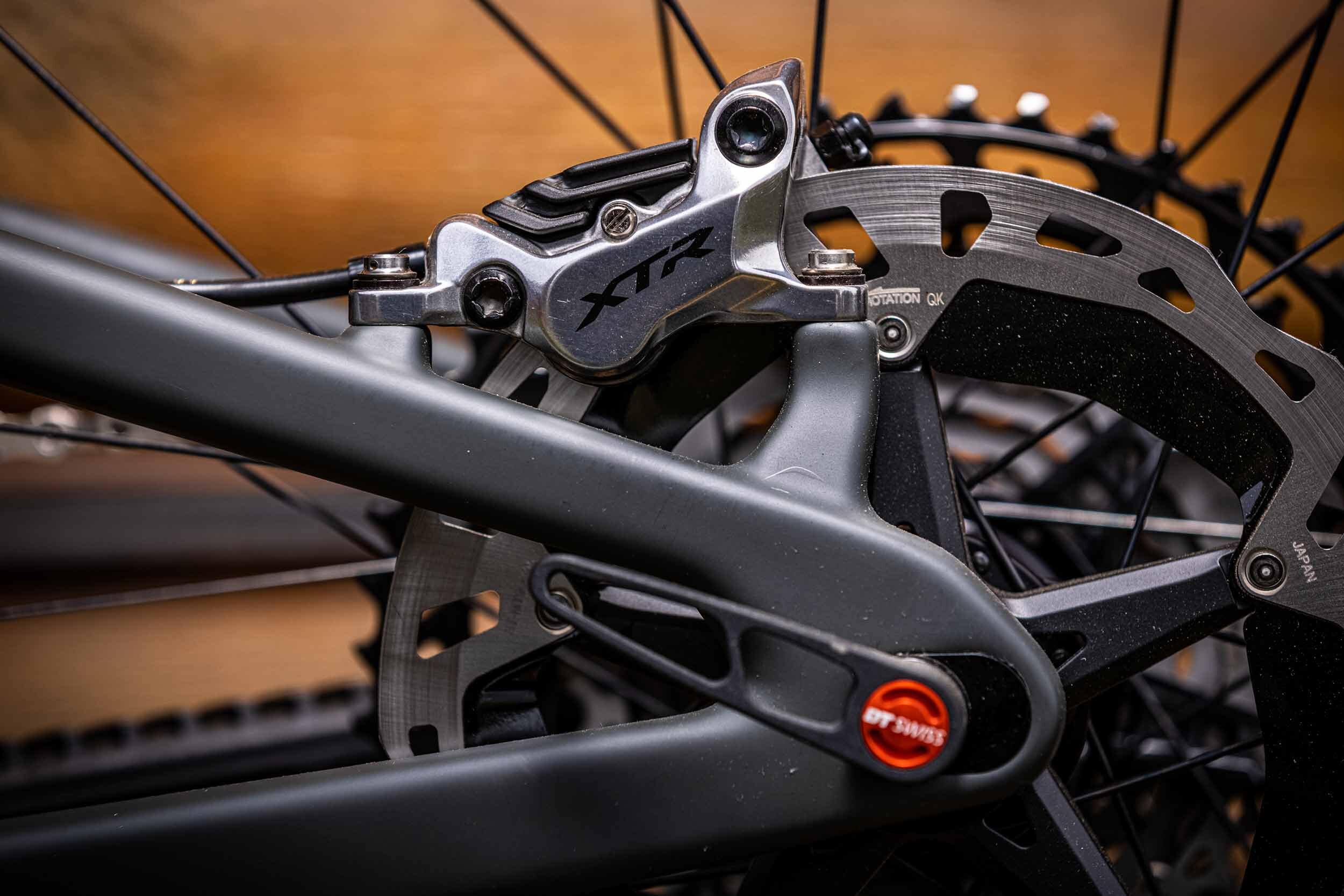
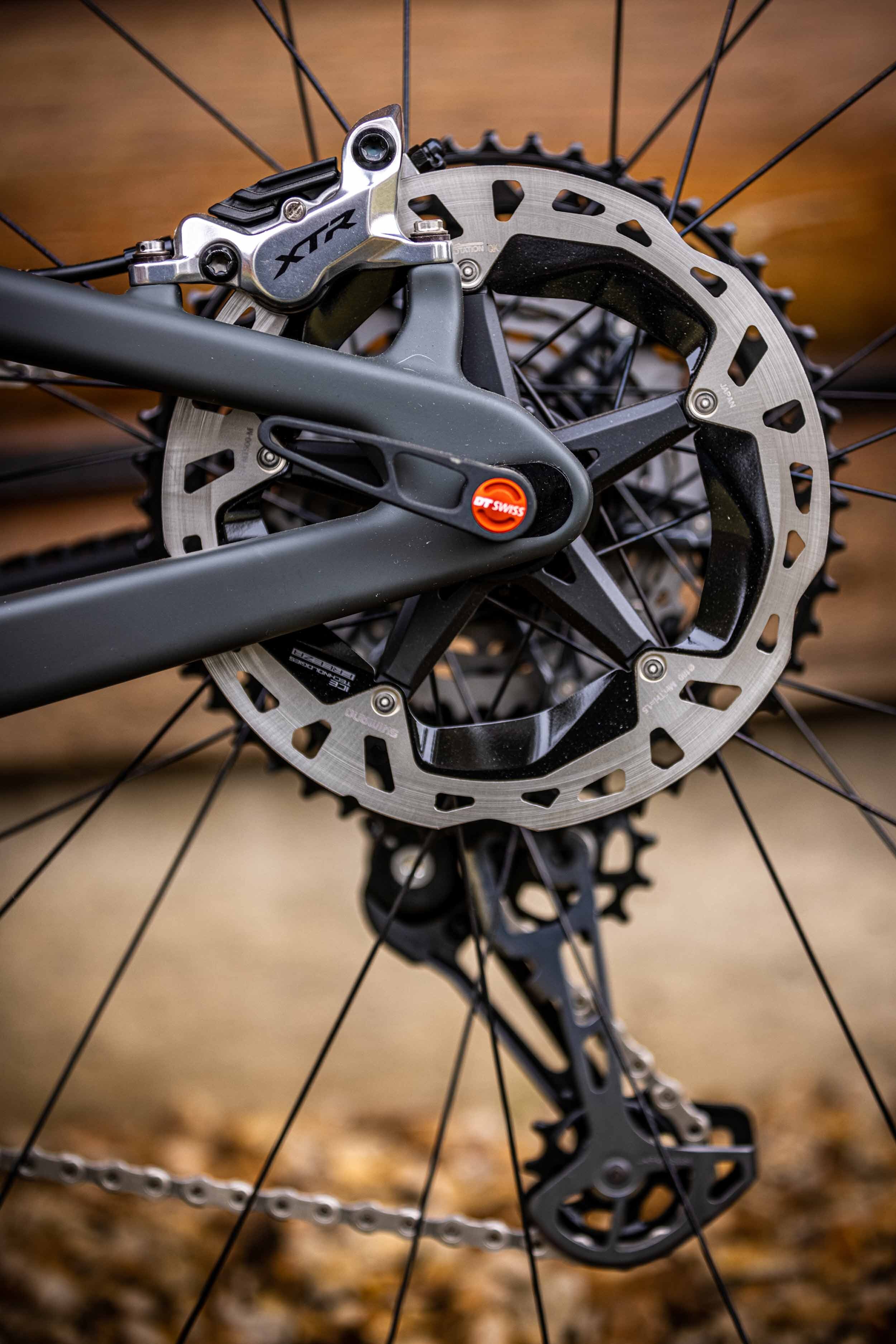
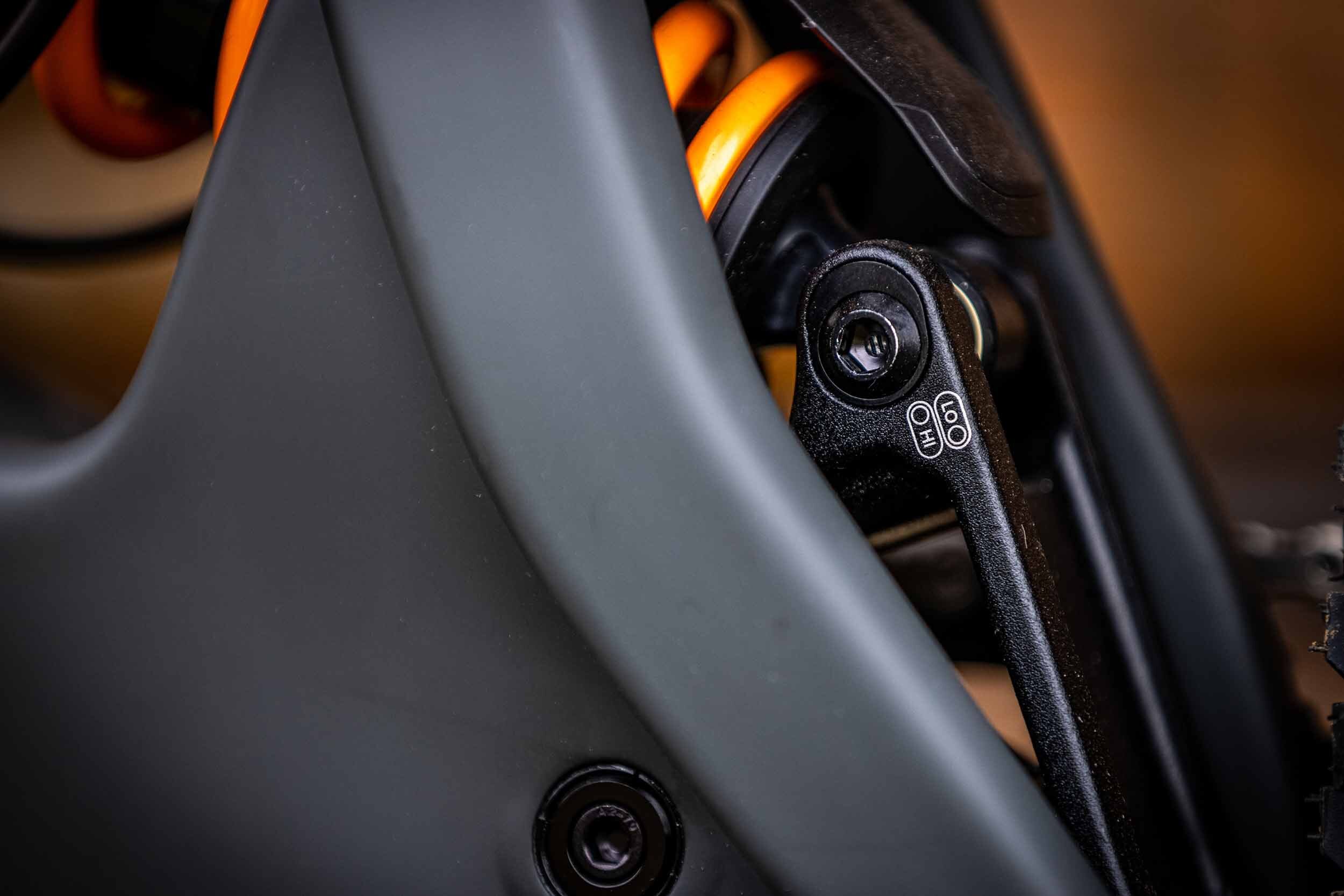
Photos by Trevor Lynden.
Bike details
Santacruz Megatower CC Size Medium
Fox Factory 36 Fork
Fox DHX2 Coil Shock
Santa Cruz “Reserve 30” carbon wheels with Industry 9 hubs
XTR M9120 “Enduro” Group 1 x drivetrain 32t Chainring and 10 - 51 cassette
PRO Korkak 170mm Dropper Post
PRO Stealth MTB Saddle
PRO Tharsis Stem and 800mm Carbon Tharsis bars
PRO Grips
Chris King Headset
Schwalbe’s new Big Betty and Magic Mary tires in Super Trail construction
—
Ten for Trail Details
Donations can be made until 11:59 pm June 20, 2021 and the winner will be announced on June 21, 2021. Donations can be made online for $10 each, each $10 donation increases your chances of winning.
Browse our advocacy pages to learn more about our scope of work building, revitalizing, and protecting mountain bike trails in the Pacific Northwest.
More Than a Race
“[Trans-Cascadia] is a celebration of our riding culture.” - Matt Hunter
In the final installment of Freehub Magazine’s three-part series about the advocacy efforts of Trans-Cascadia, they delve into the race itself. Community, good times, incredible riding, and snow were all big themes at this year’s race and the Common Ground: Trans-Cascadia, More Than a Race episode captures the true spirit of the event with stunning visuals.
“[Trans-Cascadia] is a celebration of our riding culture.”
- Matt Hunter
In the final installment of Freehub Magazine’s three-part series about the advocacy efforts of Trans-Cascadia, they delve into the race itself. Community, good times, incredible riding, and snow were all big themes at this year’s race and the Common Ground: Trans-Cascadia, More Than a Race episode captures the true spirit of the event with stunning visuals.
The film team sat down with freeride legends Matt Hunter and Thomas Vanderham and racer and PNW local, Brooklyn Bell to understand more of what the race is about. But perhaps the most telling story is that of Chuck and Eugene Gregorski – a father and son team who are passionate about the event from two very different perspectives.
The next six minutes will make you want to ride your bike, hang with friends, and put on a warm jacket.
To further their advocacy efforts, Trans-Cascadia has created Ten for Trails.
Each $10 donation increases the chances of winning a Santa Cruz Megatower and all proceeds from the raffle will benefit the continued work of Trans-Cascadia.
2019 Race Report // Day 4
“We’ve been doing this for five years and I don’t think I’ve had a better day out there with better people.” - Alex Gardner, Race Producer
When racers woke up on the morning of Day 4, snow could be seen on the ridgelines just barely above camp. Racer Director, Nick Gibson, and Lead Medic, Nick Hall, headed up the hill and quickly realized that there would be no racing. It was a beautiful snowy landscape, but they weren’t the conditions that would allow the organizers to send timers, start gates, and volunteers out on course all day long. And the overcast skies would prevent a helicopter from aiding with any emergency medical extractions...
“We’ve been doing this for five years and I don’t think I’ve had a better day out there with better people.”
- Alex Gardner, Race Producer
When racers woke up on the morning of Day 4, snow could be seen on the ridgelines just barely above camp. Racer Director, Nick Gibson, and Lead Medic, Nick Hall, headed up the hill and quickly realized that there would be no racing. It was a beautiful snowy landscape, but they weren’t the conditions that would allow the organizers to send timers, start gates, and volunteers out on course all day long. And the overcast skies would prevent a helicopter from aiding with any emergency medical extractions.
“We’ve hired the best medical field we can find,” says Director of Logistic, Tommy Magrath. “We’ve got a diverse experienced crew of mountain rescue, flight nurses, docs, surgeons, everything and we lean to them – that’s why we hired them. So, when we’ve got a consensus that they don’t feel like it’s safe to race but they are comfortable with a casual group ride and taking the racing element out of it, then it’s a no brainer for us.”
After another amazing breakfast at basecamp the organizers rallied the troops and provided shuttles for anyone who wanted to go home. To their surprise, nearly 90% of the racers chose to stay.
“We took off for the ride as a group and everyone was asked to bring a piece of wood,” says Racer Director, Nick Gibson, “and when we got to the top there were over 100 pieces of wood for a bonfire. I think that was a pretty good example of the community. It was a good bonding moment.”
One hundred and four racers carried wood for the fire and beverages to the top of the snow-covered ridgeline to celebrate their new Trans-Cascadia community before dropping in to ride some sweet trail back to camp.
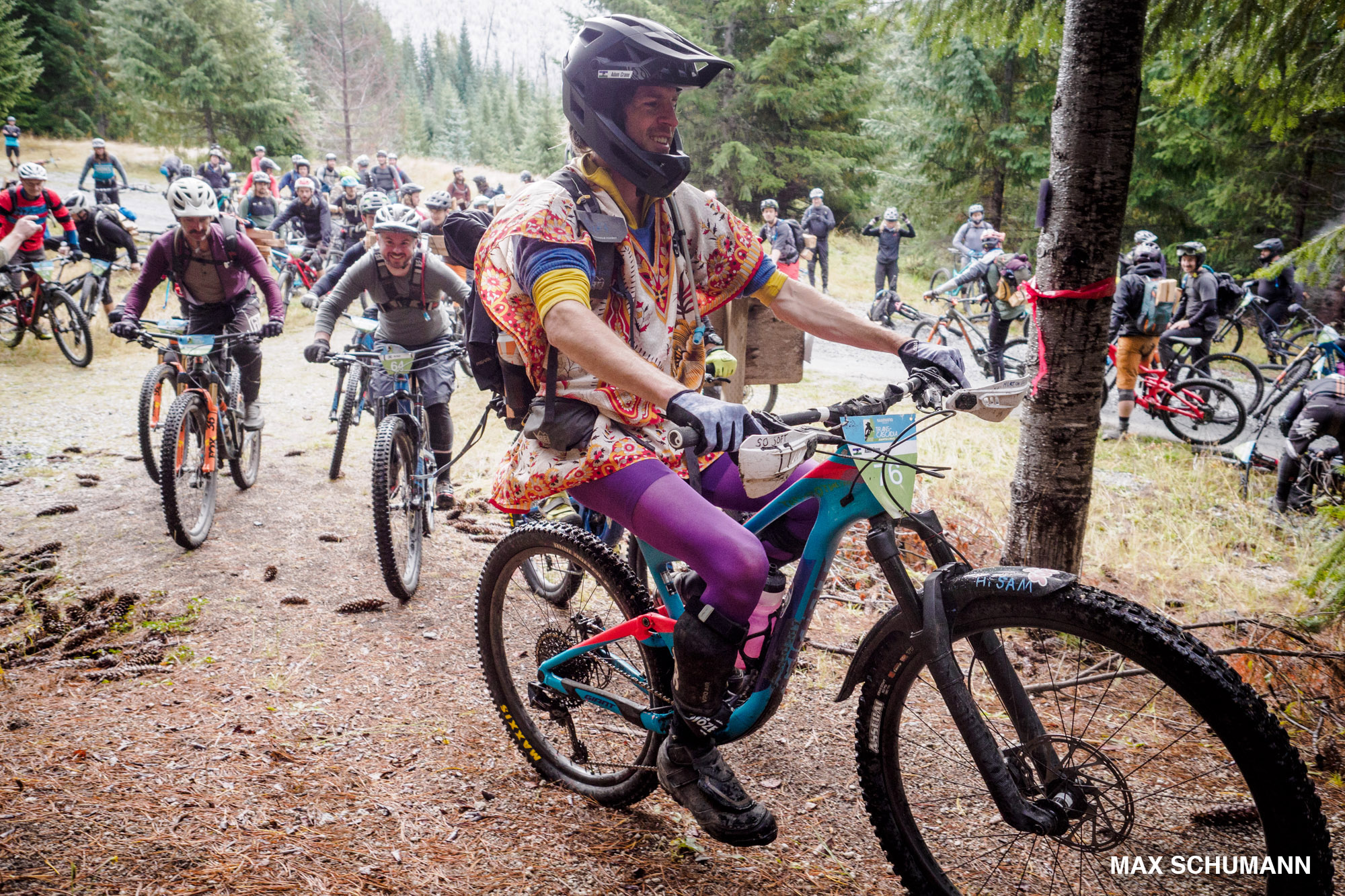
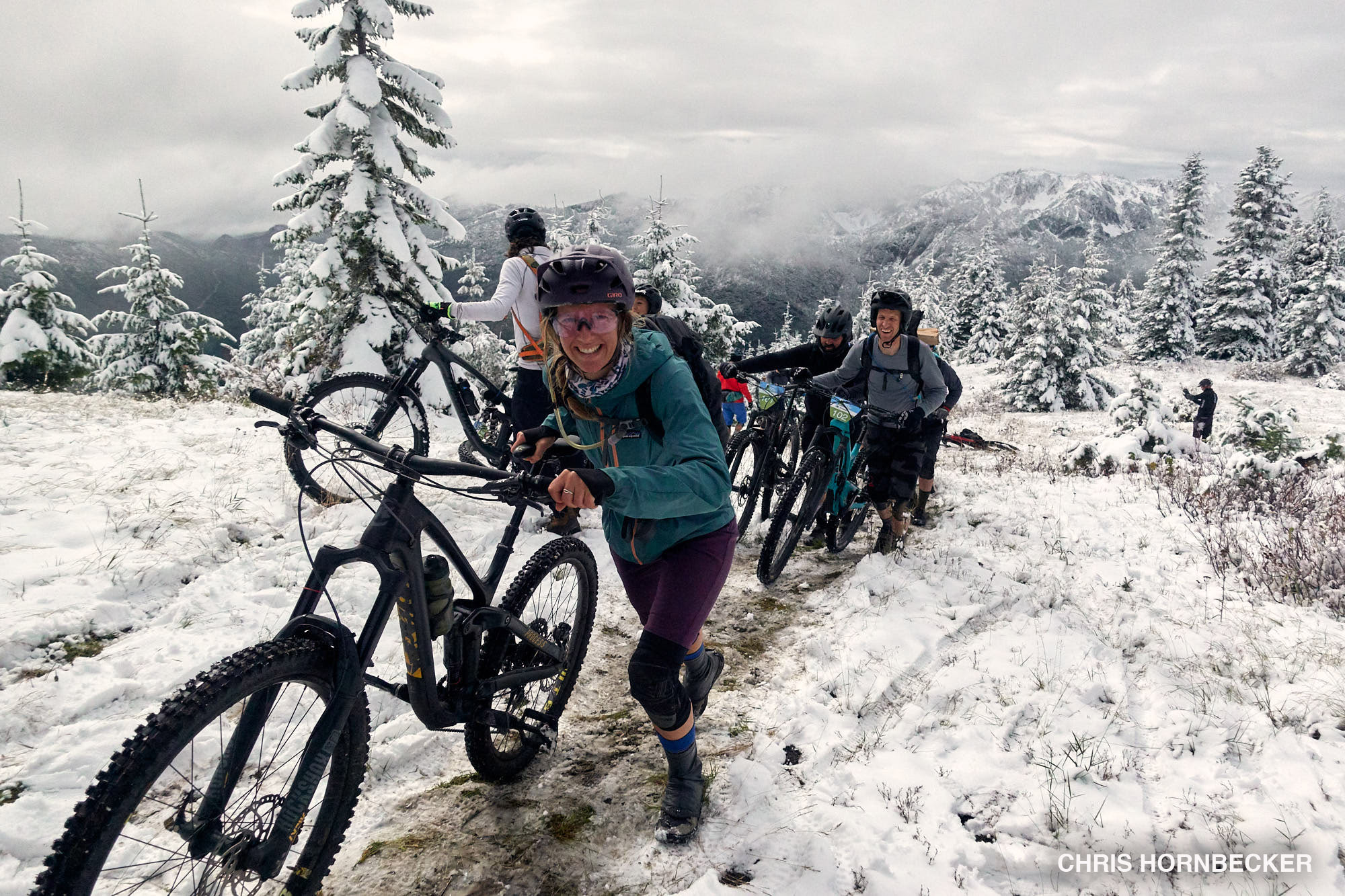
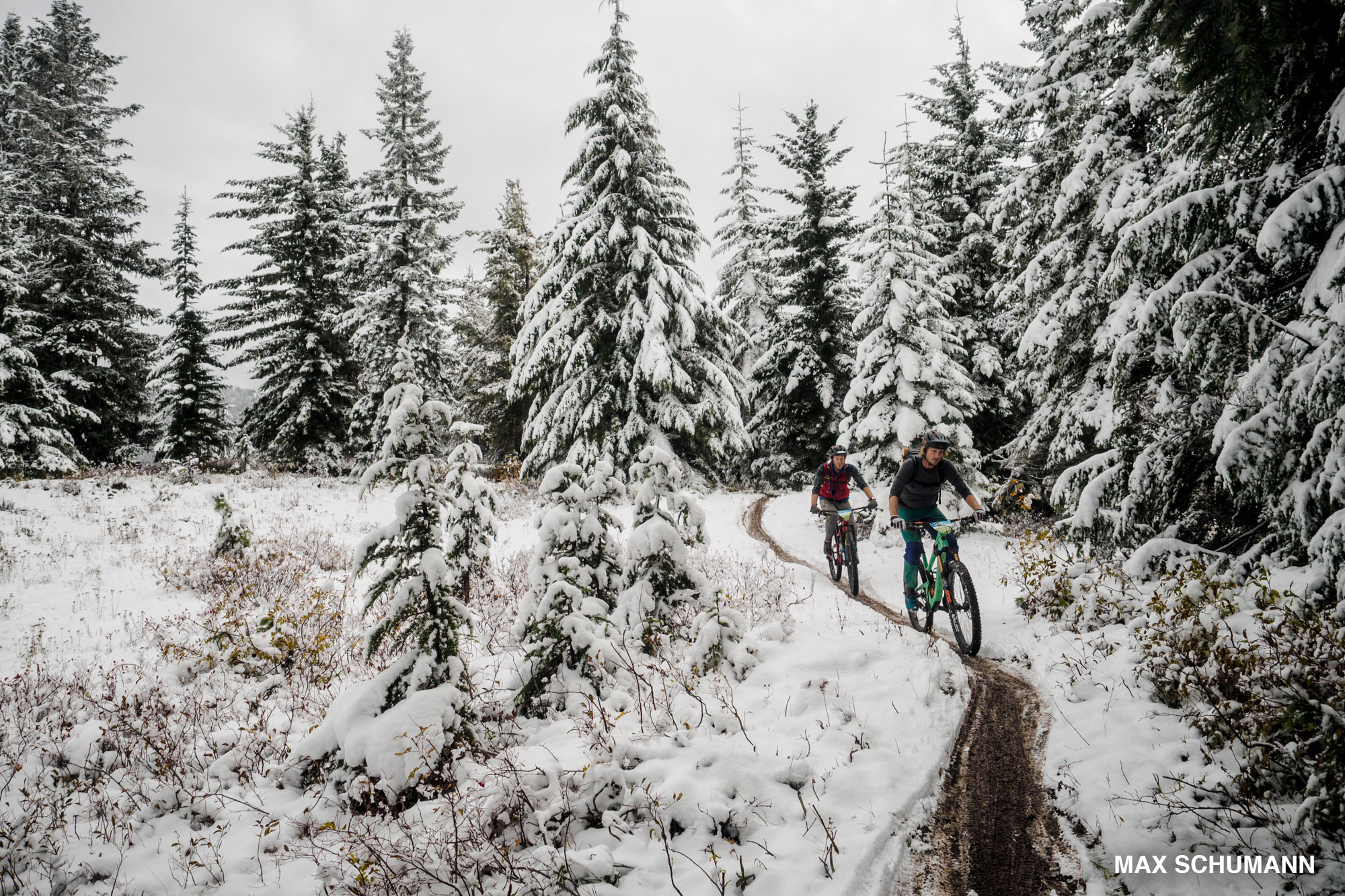
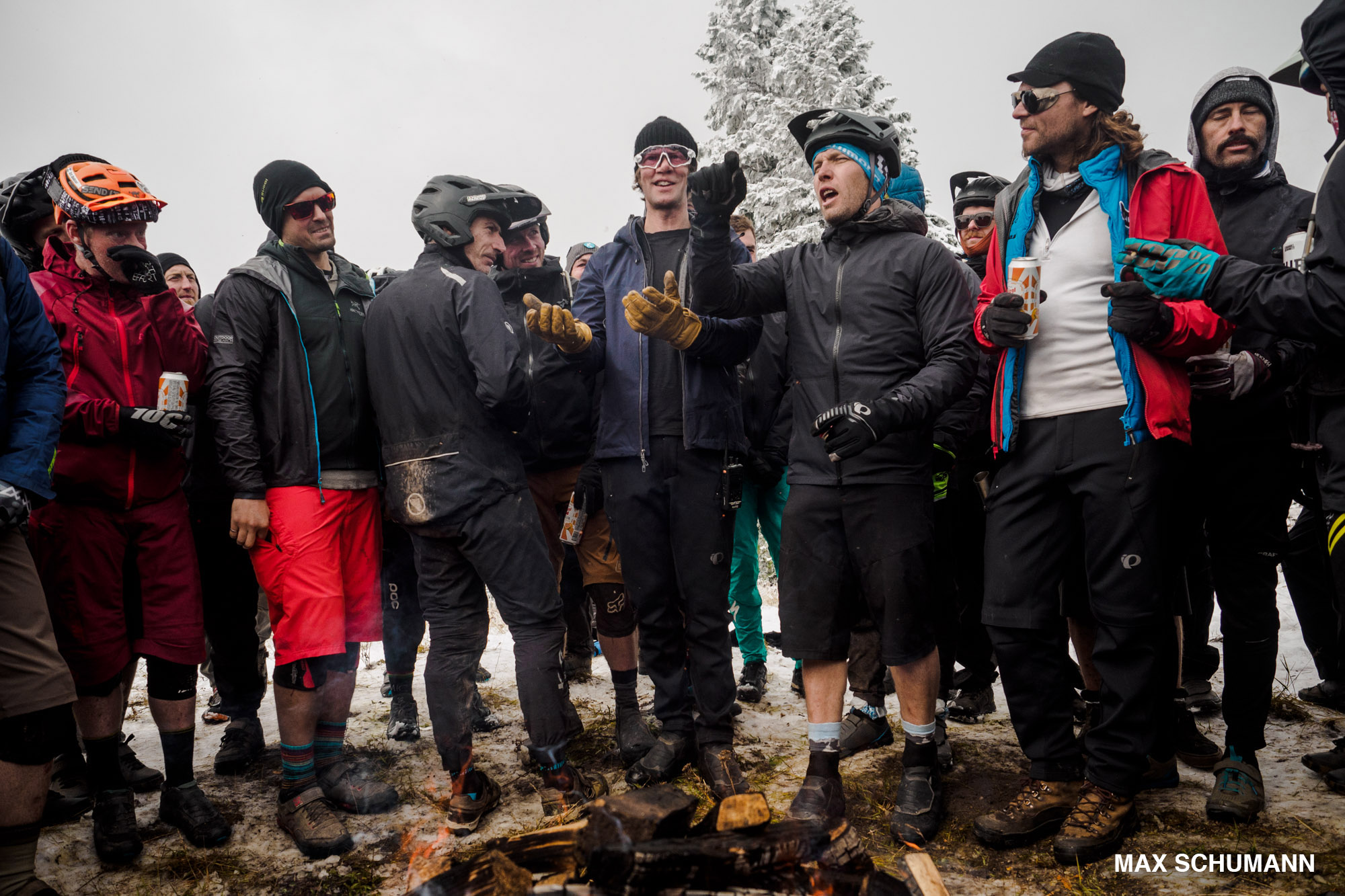
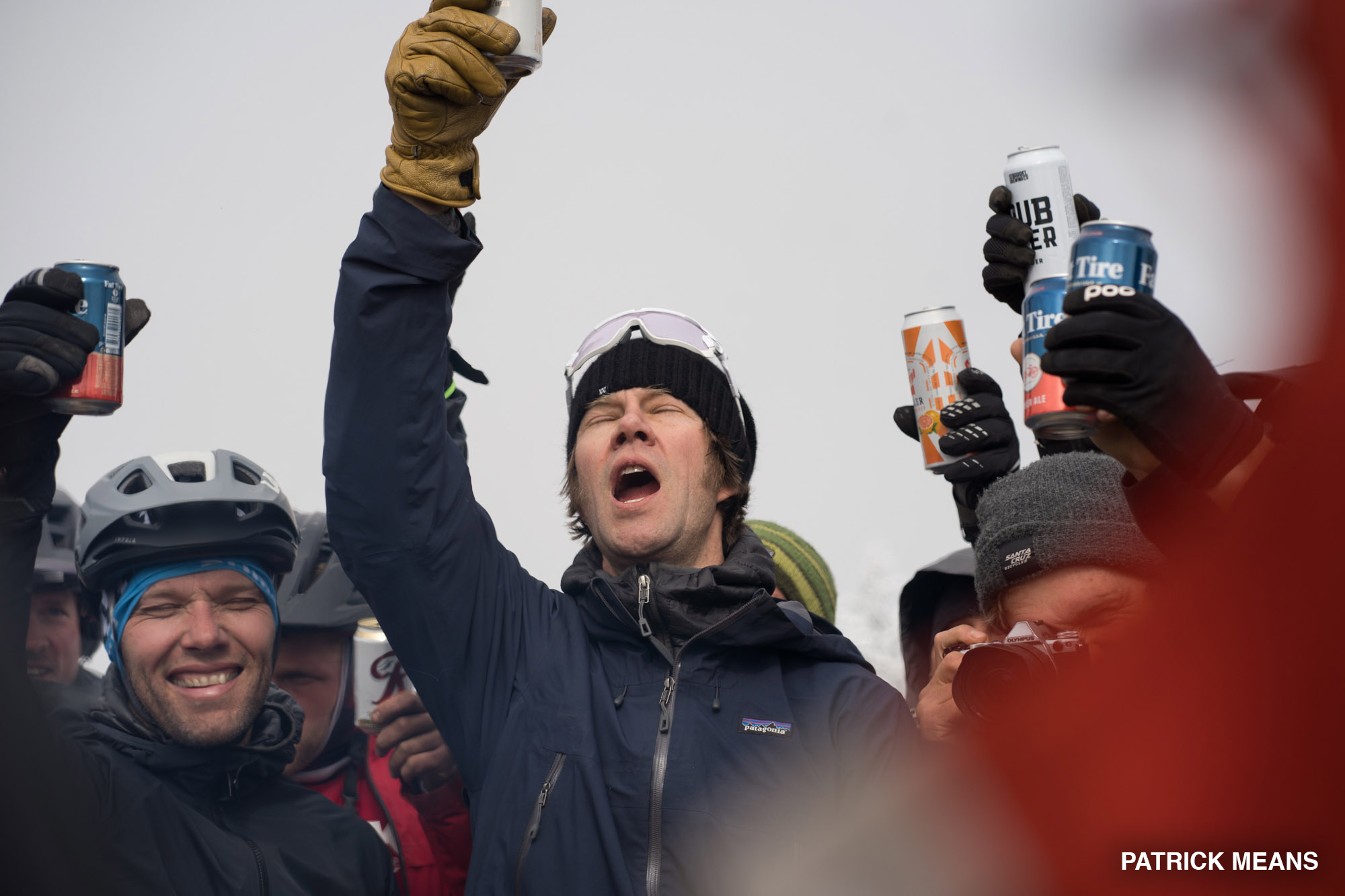
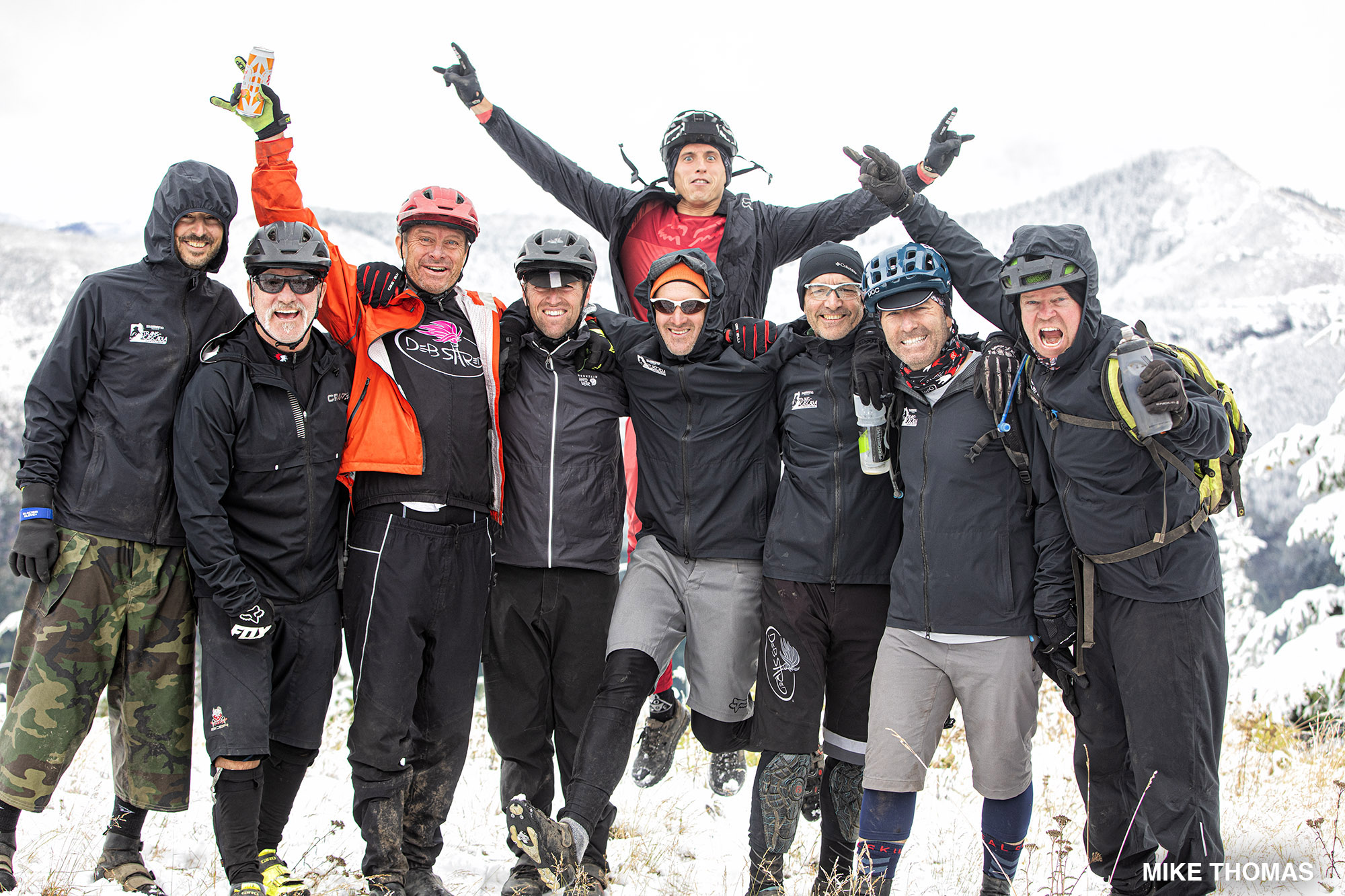
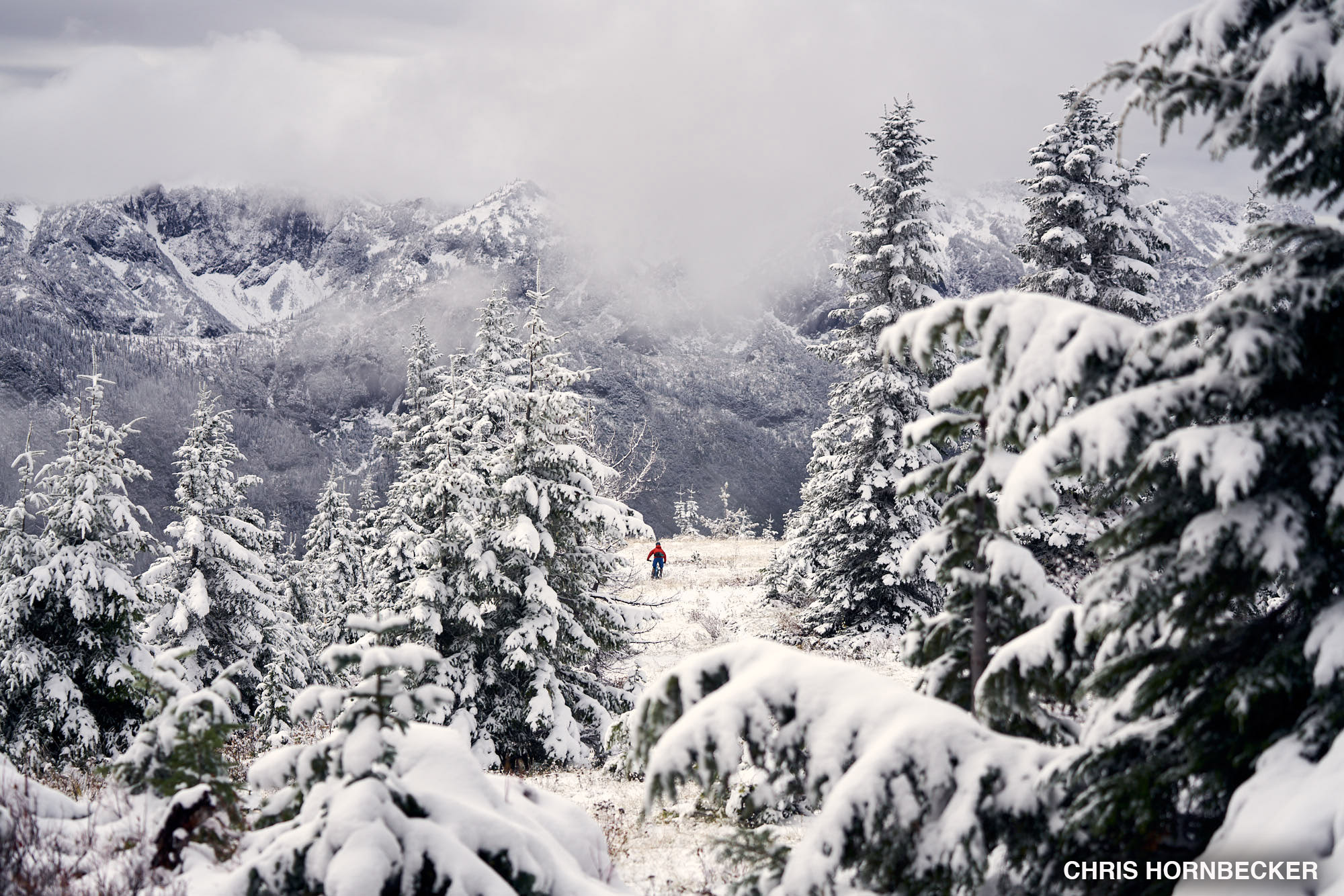
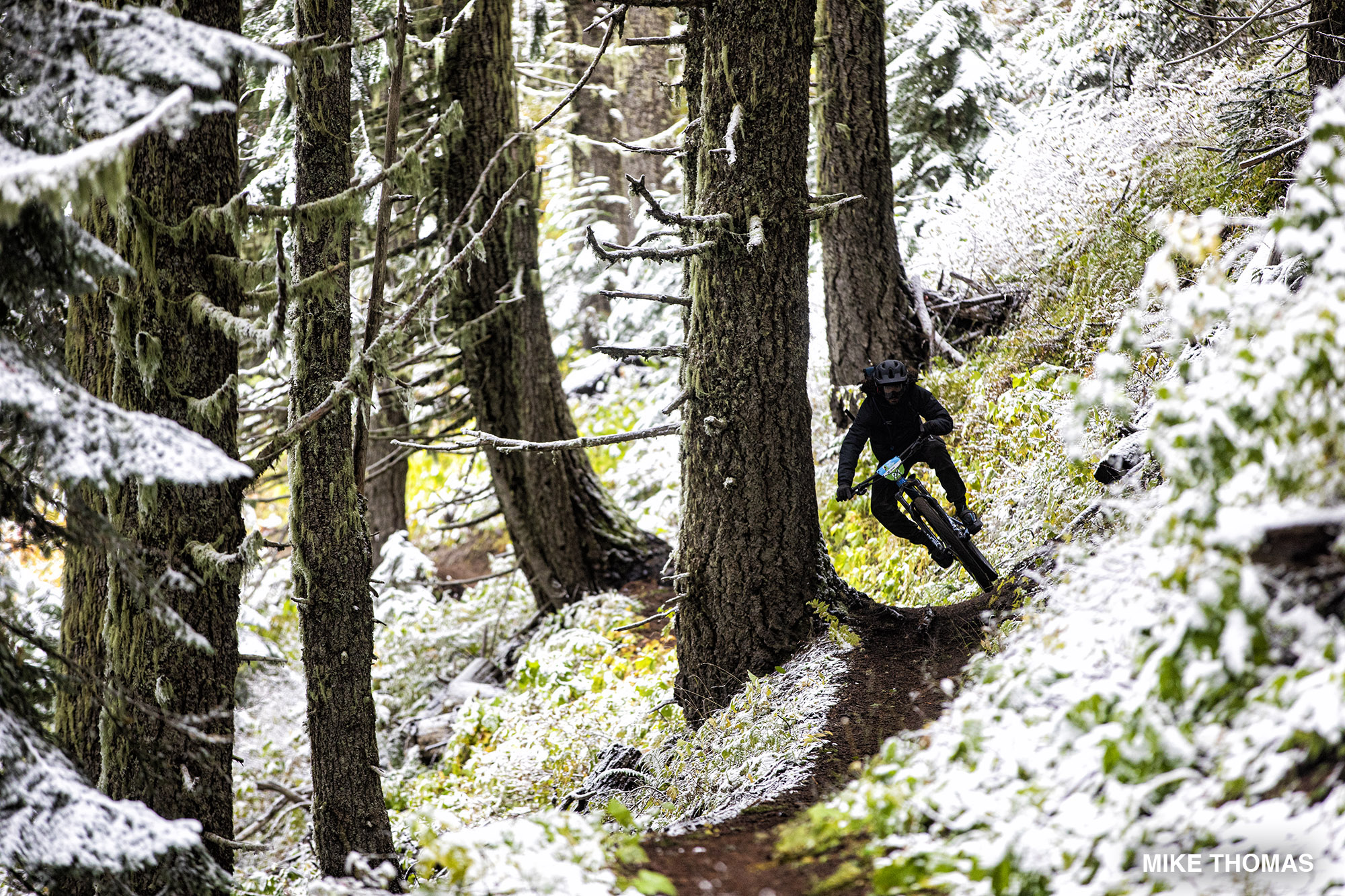
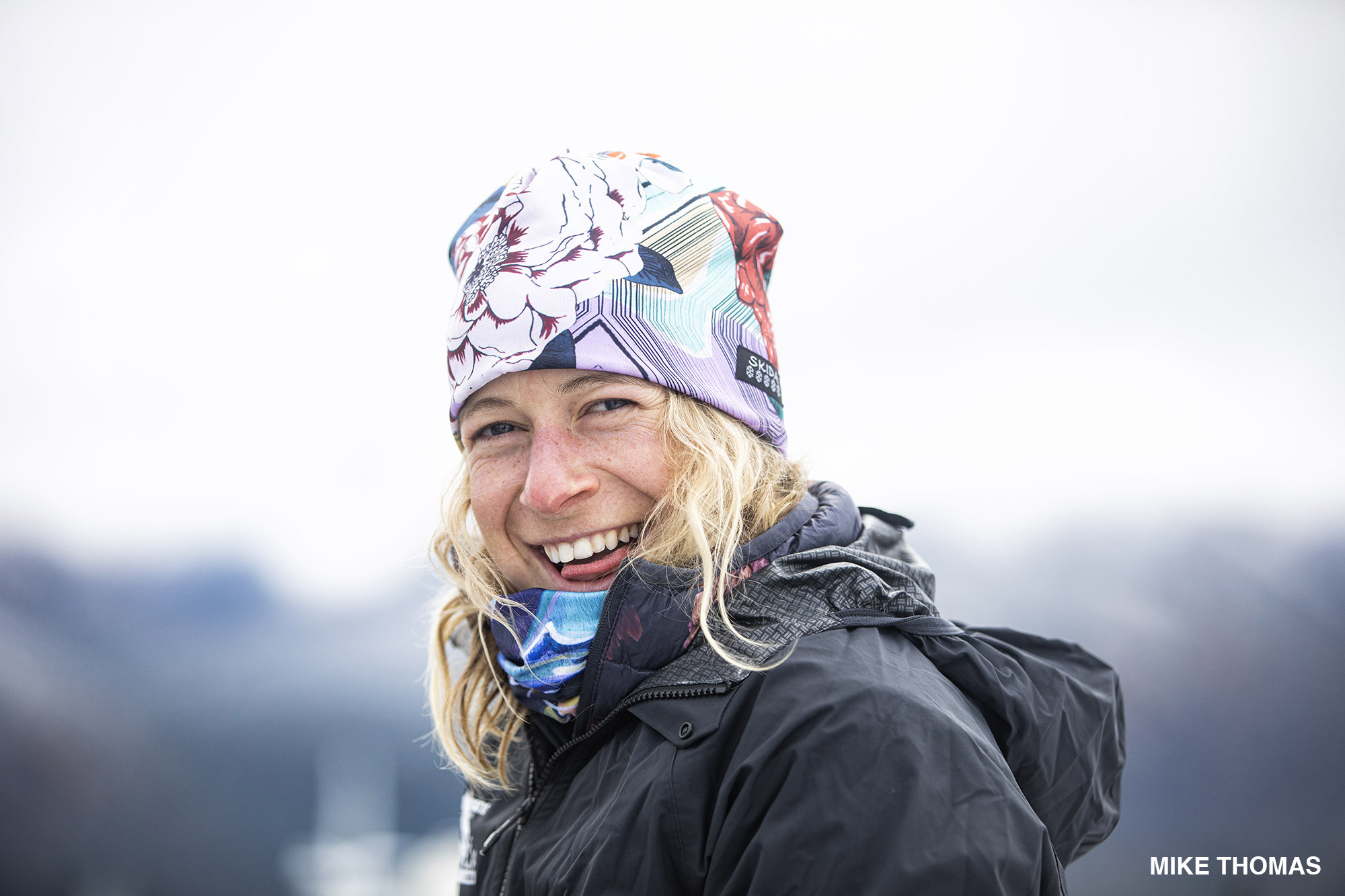
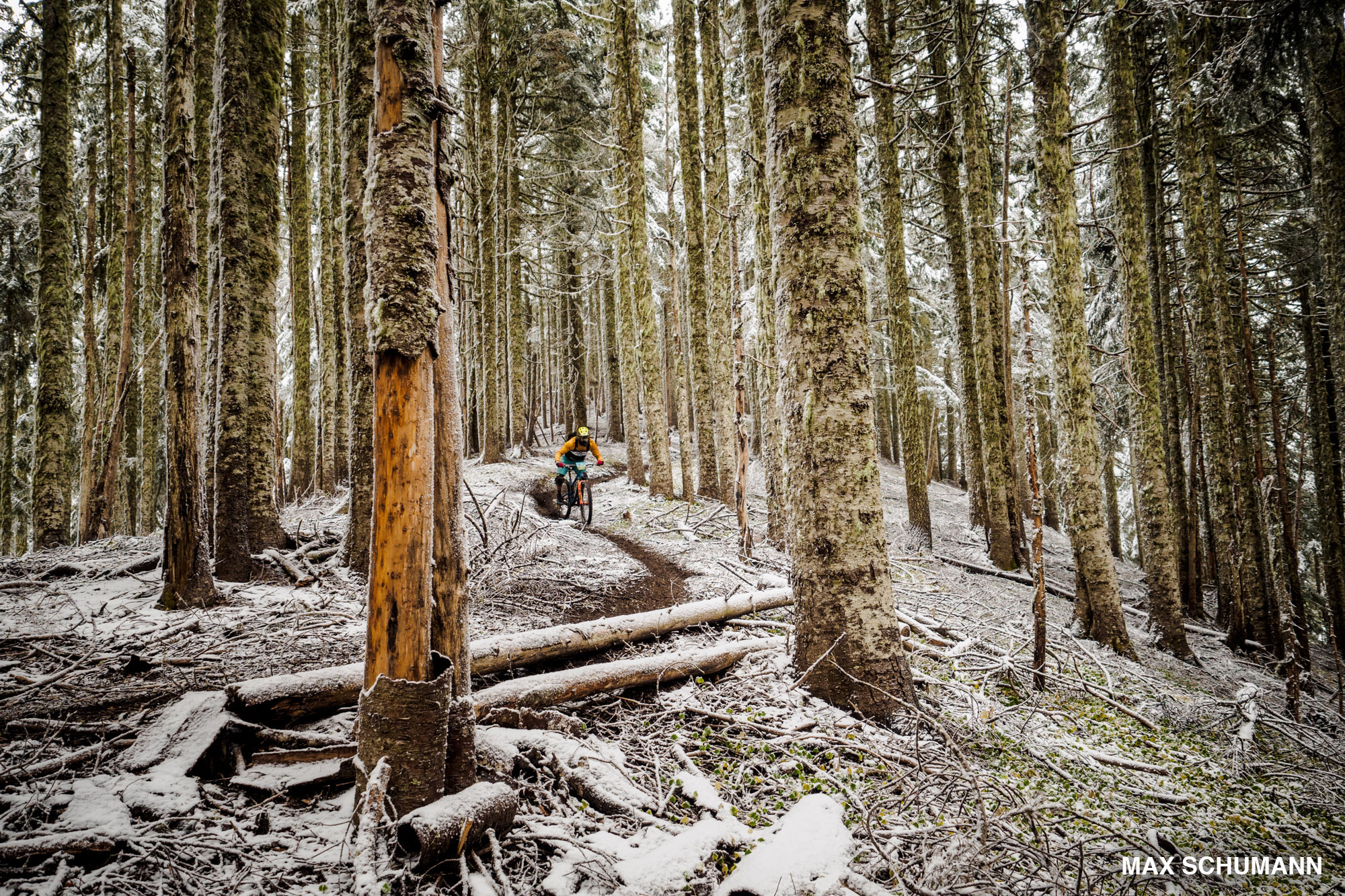
“I actually was not upset [about not racing today] at all,” says John Ramsden. “It was obviously going to be a pretty difficult day for everybody involved whether you were racing or trying to organize the race, but the fact that they then came together and said let’s go for this group ride – I thought it was an outstanding idea. It was very, very difficult getting up to the top of that mountain but when we finally got up there it was absolutely cool to be on the top of a ridgeline in a completely covered snowfield with a fire going and everyone carrying up two or three pieces of wood and we had an absolutely wicked party up there.”
While not racing felt bittersweet for Christina Chappetta, it didn’t stop her from embracing the adventure. “The fire was really awesome, it was crucial; it was really cold up there. You didn’t realize how cold it was until you stepped away from the fire and you were just checking out the area and then you were like ‘oh dang, it’s below freezing, better get back to that fire.’ But it was impressive having the fire and beverages at the top and then watching everyone drop in. It was a pretty special moment.”
If anyone was going to be upset about the lack of racing, it should have been Chris Johnston who ended Day 3 only 2 seconds back from Kabush and 2nd place. “Part of me was pretty disappointed that the race was cancelled and that I couldn’t put up a fight another day. But the bonus was that we went for one of the best trail rides that I’ve been on. It was just perfect conditions, fresh snow, just a real treat. We got spoiled.”
Chris joined a small group of racers and volunteers split from the main group and rode the designated racecourse to remove all the marking tape and signage. “We had a group of 18 and it was just a really, really good time to go shred, have fun, hang out, hoot and holler. I had only taken beer and wood to that point, so I was very underprepared for the rest of the ride. It was 20-something miles, and everyone contributed a little snack for me and away we went.”
“Today is the perfect example of Trans-Cascadia, and the people surrounding it,” says Lars Sternberg. “The vibe was awesome, nobody was bummed, and I think that’s one of the coolest things about this event. It really attracts the type of people who are able to adapt and deal with adversity.”
Back at camp racers were treated to a photo slideshow and videos from the race, champagne showers from the podiums, and truly heartfelt gratitude and recognition that spread from the organizers to the racers and volunteers and back in rounds of cheers and clapping.
The final standings for Pro Women were Alex Pavon (3rd), Christina Chapetta (2nd), and Ingrid Larouche (1st). And the Pro Men’s podium has Chris Johnston (3rd), Geoff Kabush (2nd), and Romain Paulhan (1st).
Morgan Gerhart and Lauren Jacobson won for the most time on course and were awarded sleeping bags and full riding kits from Patagonia.
New this year as the Spirit Award which went to Jameson Florence who not only has raced all five years and attended all three work parties this year but also was a constant source of positivity and smiles on course. “It’s unreal,” says Jameson about winning the award. “I couldn’t be more pumped to be part of this thing out in the woods with these guys, I just come out here and play and it’s super fun.”
Locals, Remy Aucoin and Sarah Schmidt were recognized for their massive contribution of time and knowledge to help make Trans-Cascadia in the Gifford Pinchot National Forest possible. “Alex and I got to this new area and we called up these locals and [Remy and Sarah] met us at the trailhead,” says Nick Gibson. “We spent our first day in the woods cutting out this crazy jammed up system full of logs and clearing out this sweet descent. They’ve provided us with guidance on what trails to use and even on the Wednesday when racers arrived, Remi was up on the ridgeline brushing our trails. They have been amazing, and we couldn’t have done this without them.” As a thank-you, Remy and Sarah were given workwear from Patagonia.
When the speeches and awards came to an end the stoke carried on around the fire. “Trans-Cascadia was 100 times better than what I was expecting,” says Christina Chapetta. “It was amazing – and it’s still going. Anything can happen!”
To further their advocacy efforts, Trans-Cascadia has created Ten for Trails.
Each $10 donation increases the chances of winning a Santa Cruz Megatower and all proceeds from the raffle will benefit the continued work of Trans-Cascadia.
This event is under special use permit of the Gifford Pinchot National Forest.
2019 Race Report // Day 3
“Some of the best riding I’ve done – I don’t even know really how to put it into words.” - Thomas Vanderham
Saturday, Day 3, was move day. The plan was for racers to pedal out of camp from Takhlakh Lake and to pedal into camp at Green River Horse Camp at the end of the day – Mother Nature had other plans. The night before, as Race Director Nick Gibson delivered the details for the following day’s race, it had begun to snow.
“Some of the best riding I’ve done – I don’t even know really how to put it into words.”
- Thomas Vanderham
Saturday, Day 3, was move day. The plan was for racers to pedal out of camp from Takhlakh Lake and to pedal into camp at Green River Horse Camp at the end of the day – Mother Nature had other plans. The night before, as Race Director Nick Gibson delivered the details for the following day’s race, it had begun to snow.
The day started out as planned with a short pedal from camp to the singletrack and a 1000 foot climb featuring some incredible views of Mount Adam on the way to the start of the first stage. Stage 8 was an 1100-foot descent over 1.2 miles of super-fast gravity-fed flow.
“We woke up to snow in our campground and frozen bikes and frozen tents and then it was just clear and cold,” says Thomas Vanderham. “When we were riding there was no problem with temperature, we were nice and warm. The approach to the first trail was incredible. It was really misty with the sun coming through it was so beautiful up on this ridgeline.”
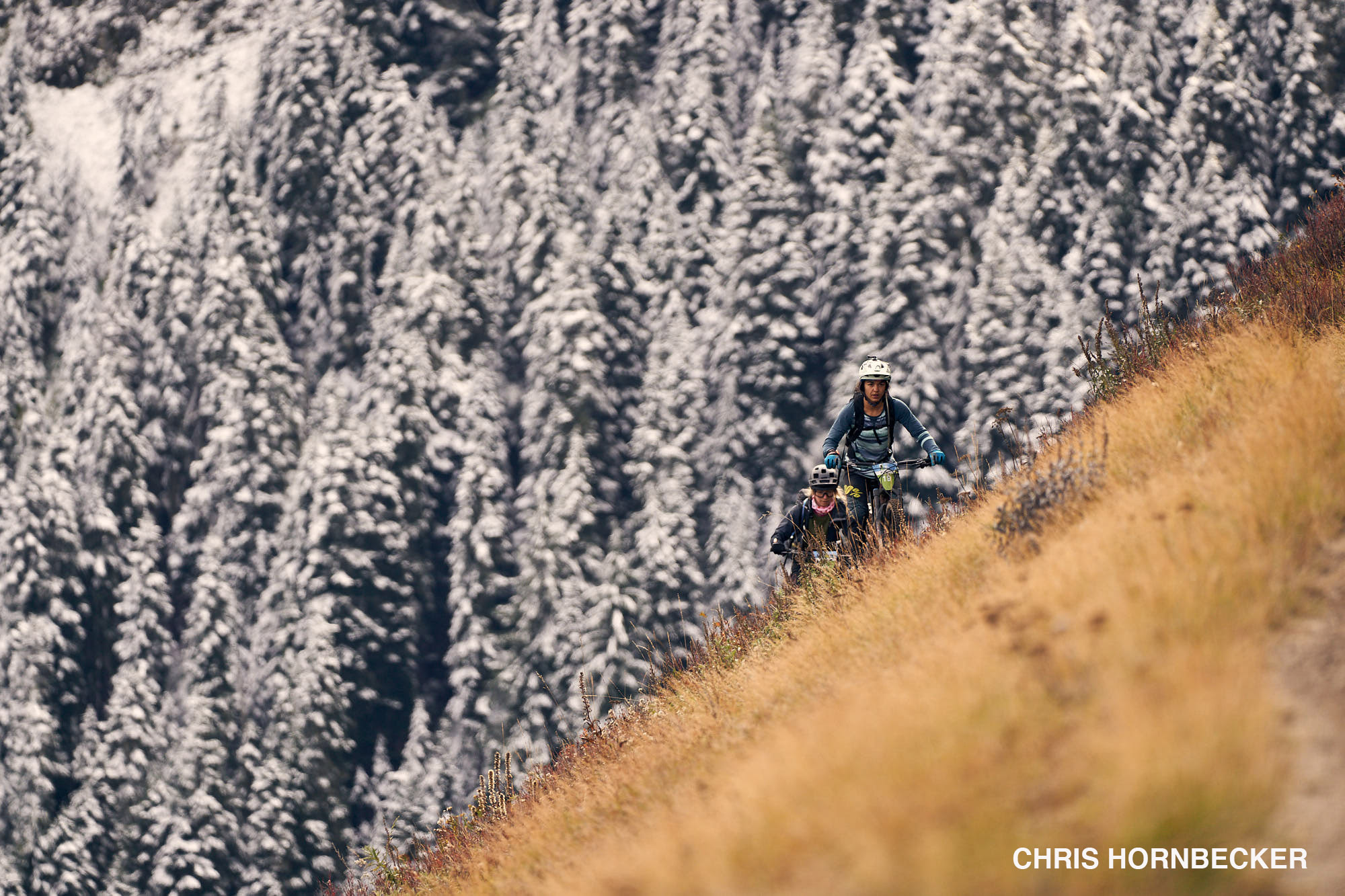
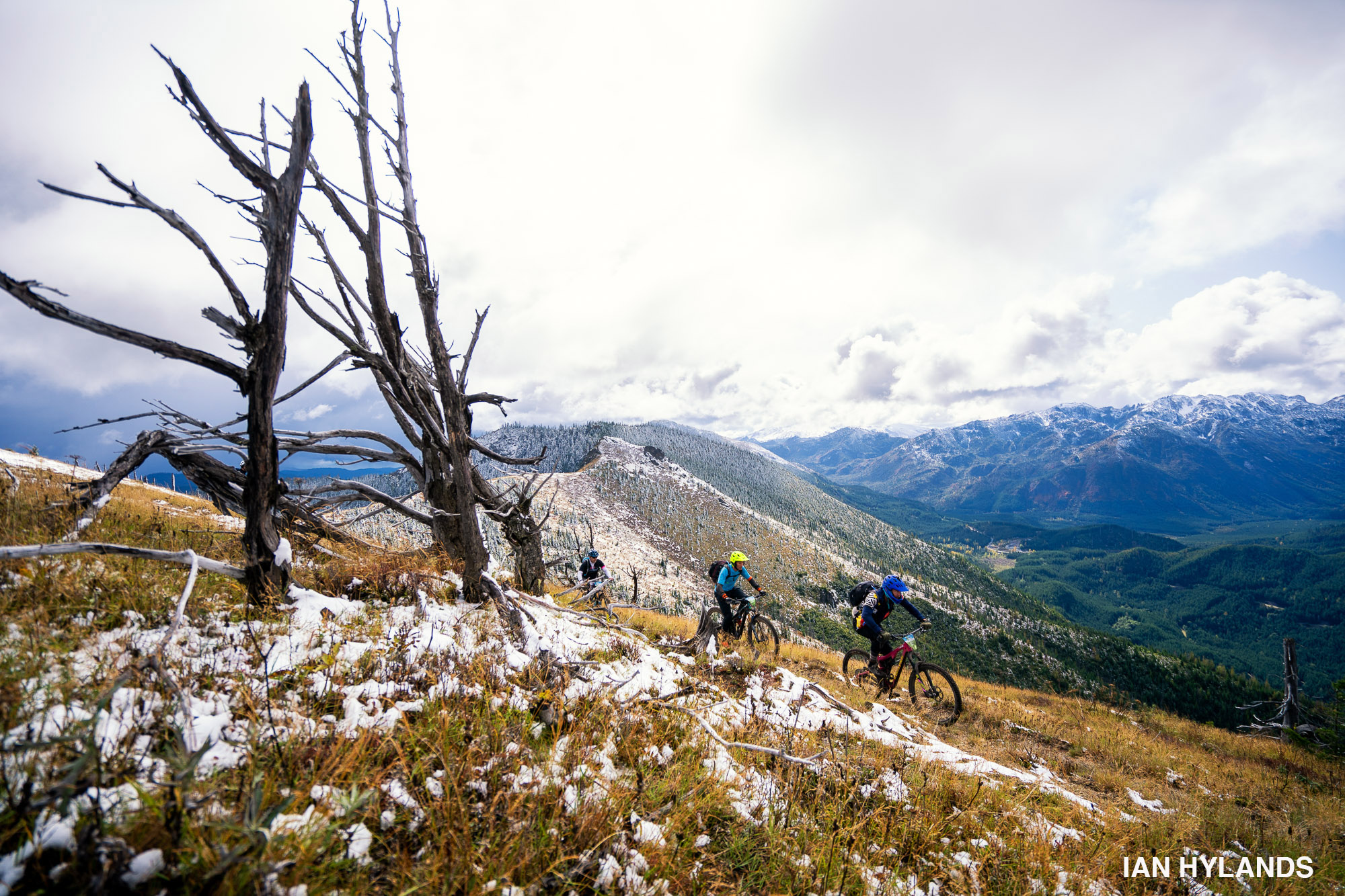
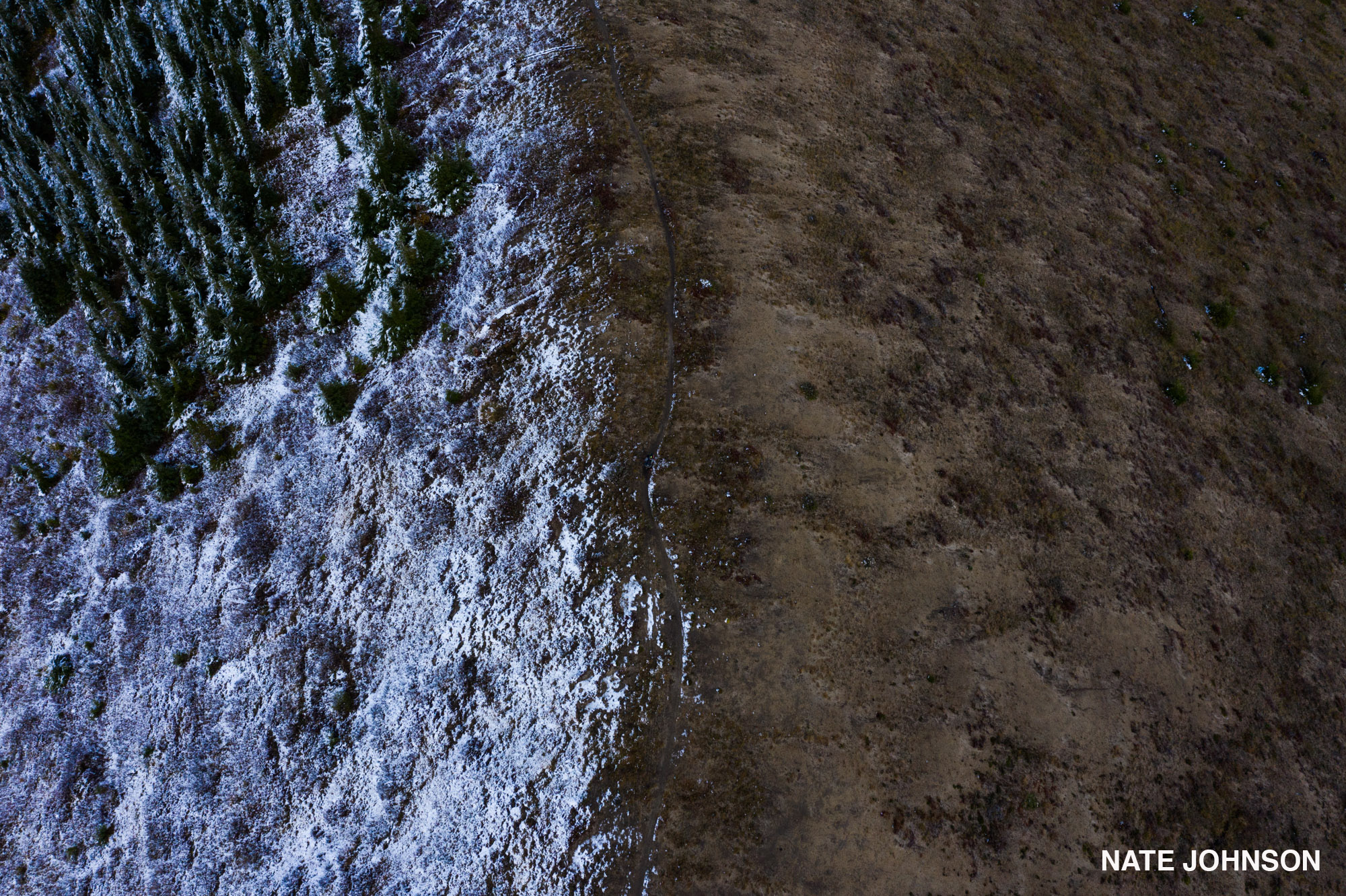
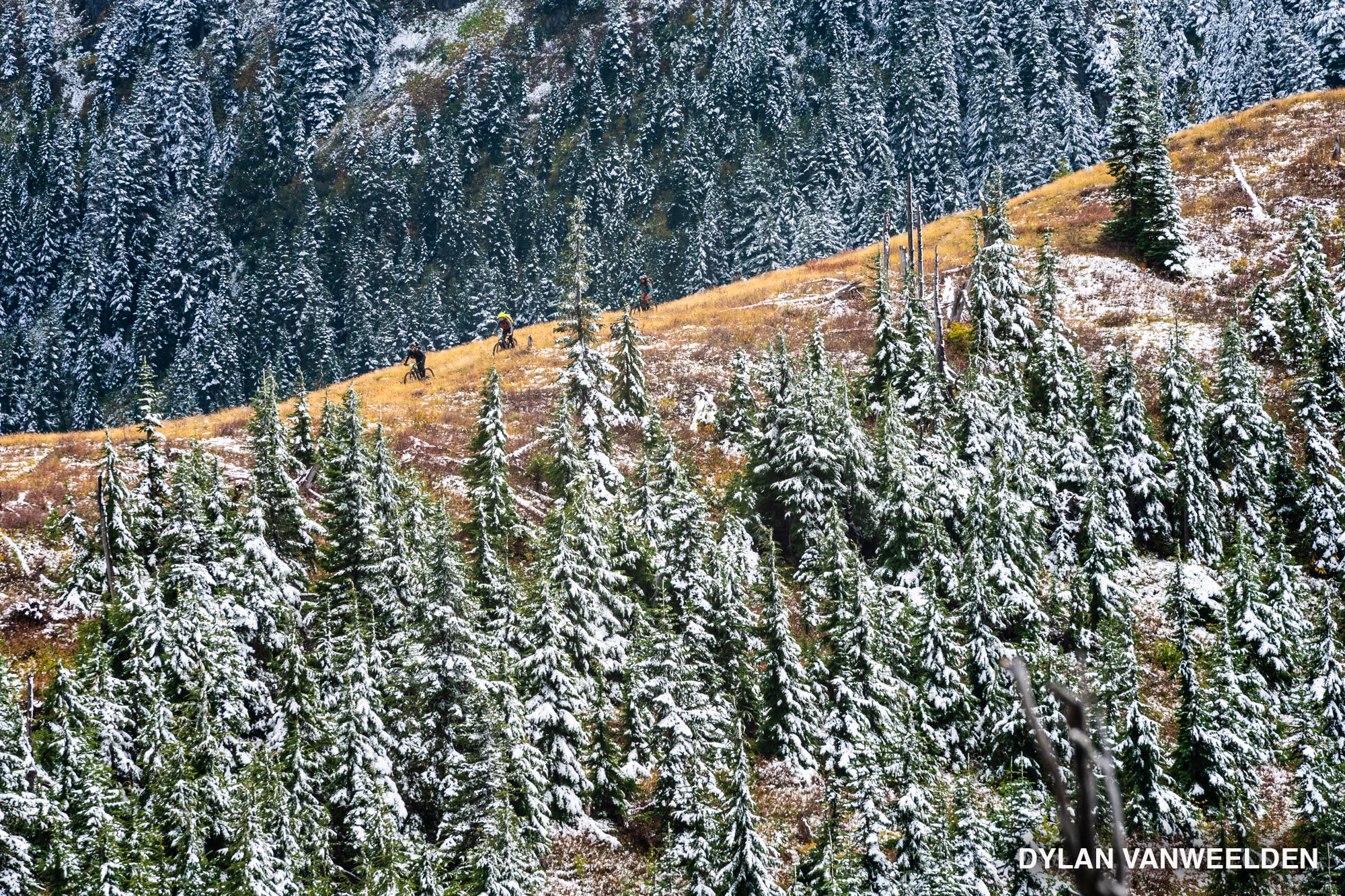
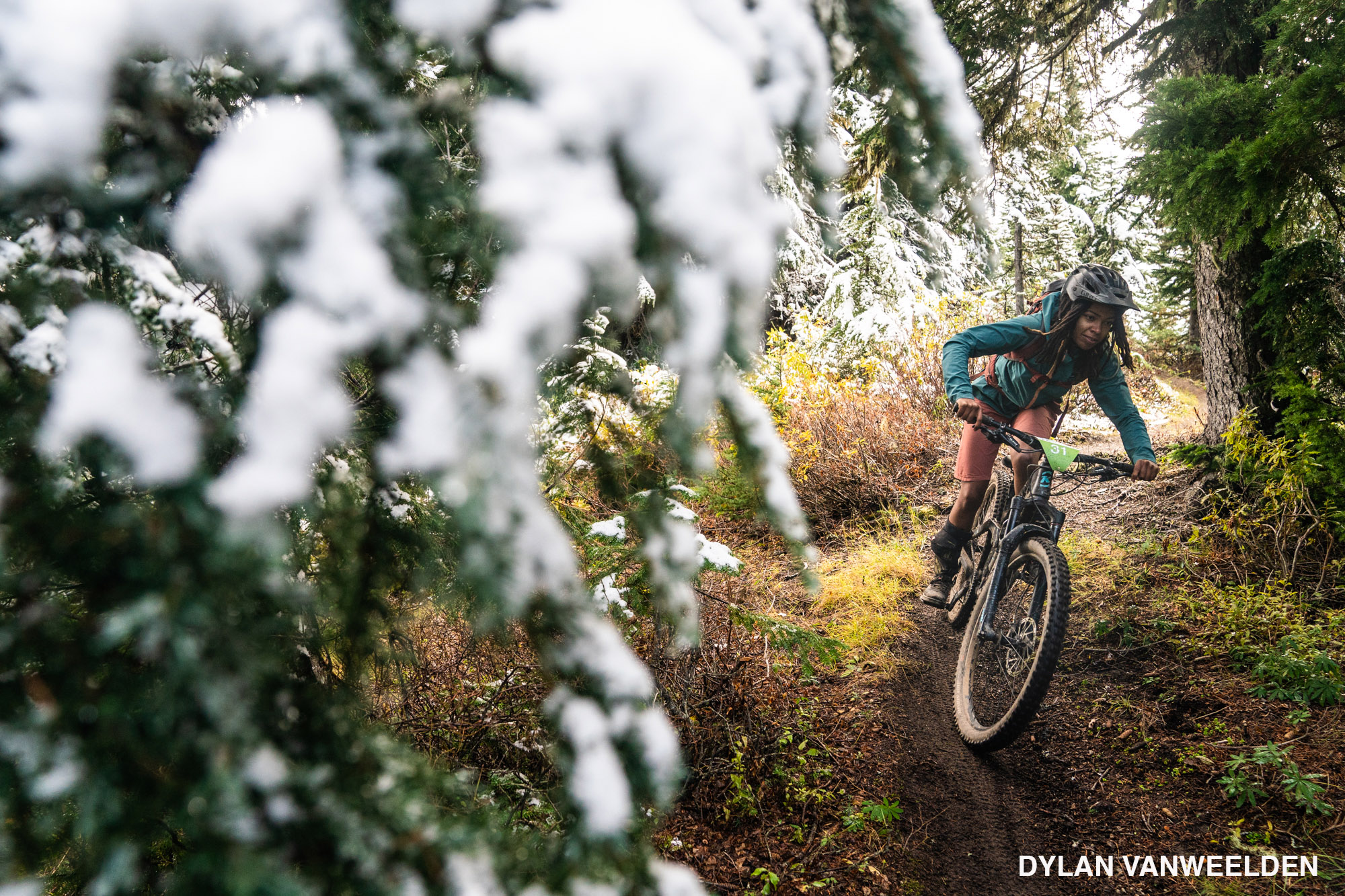
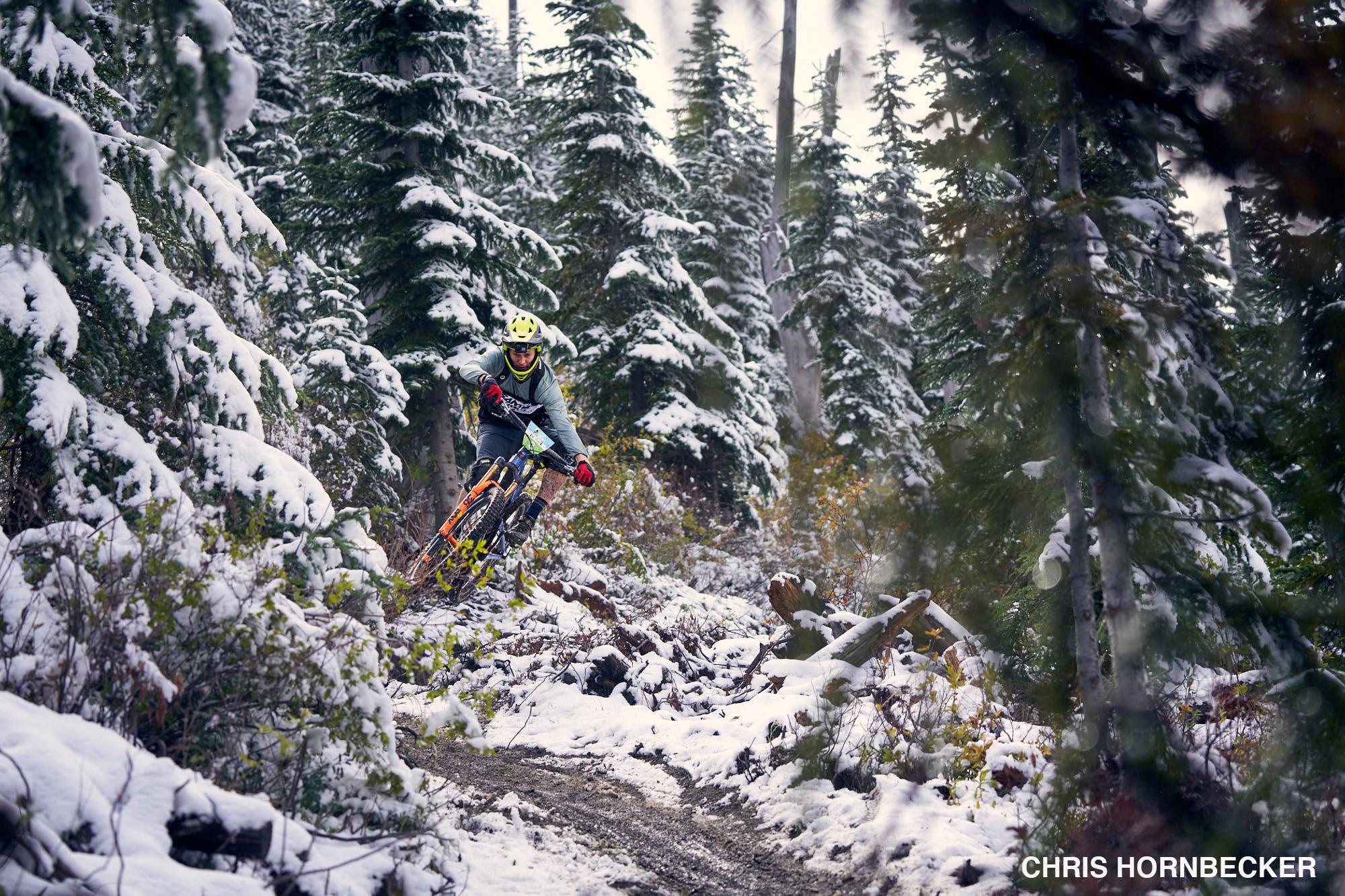
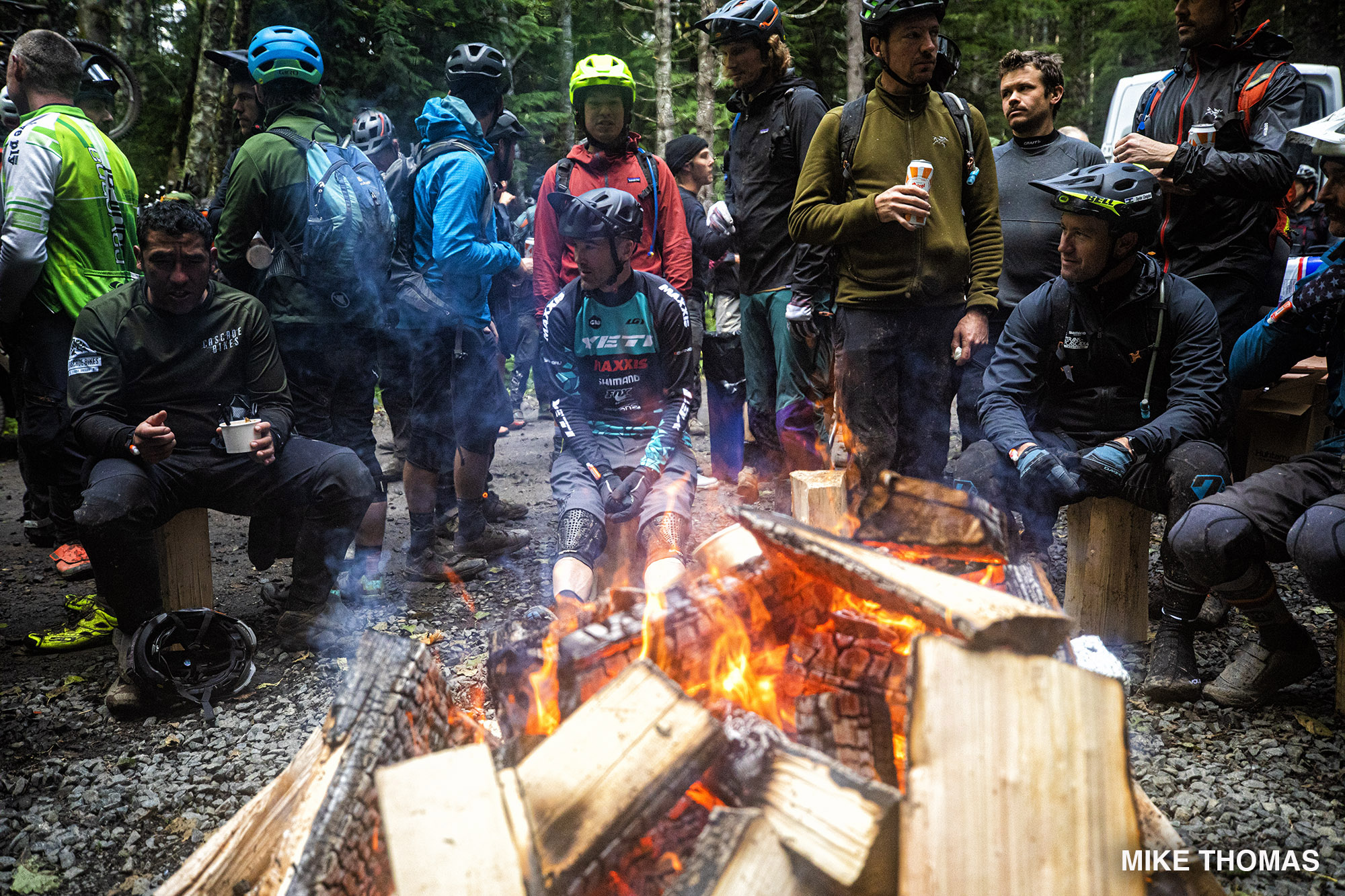
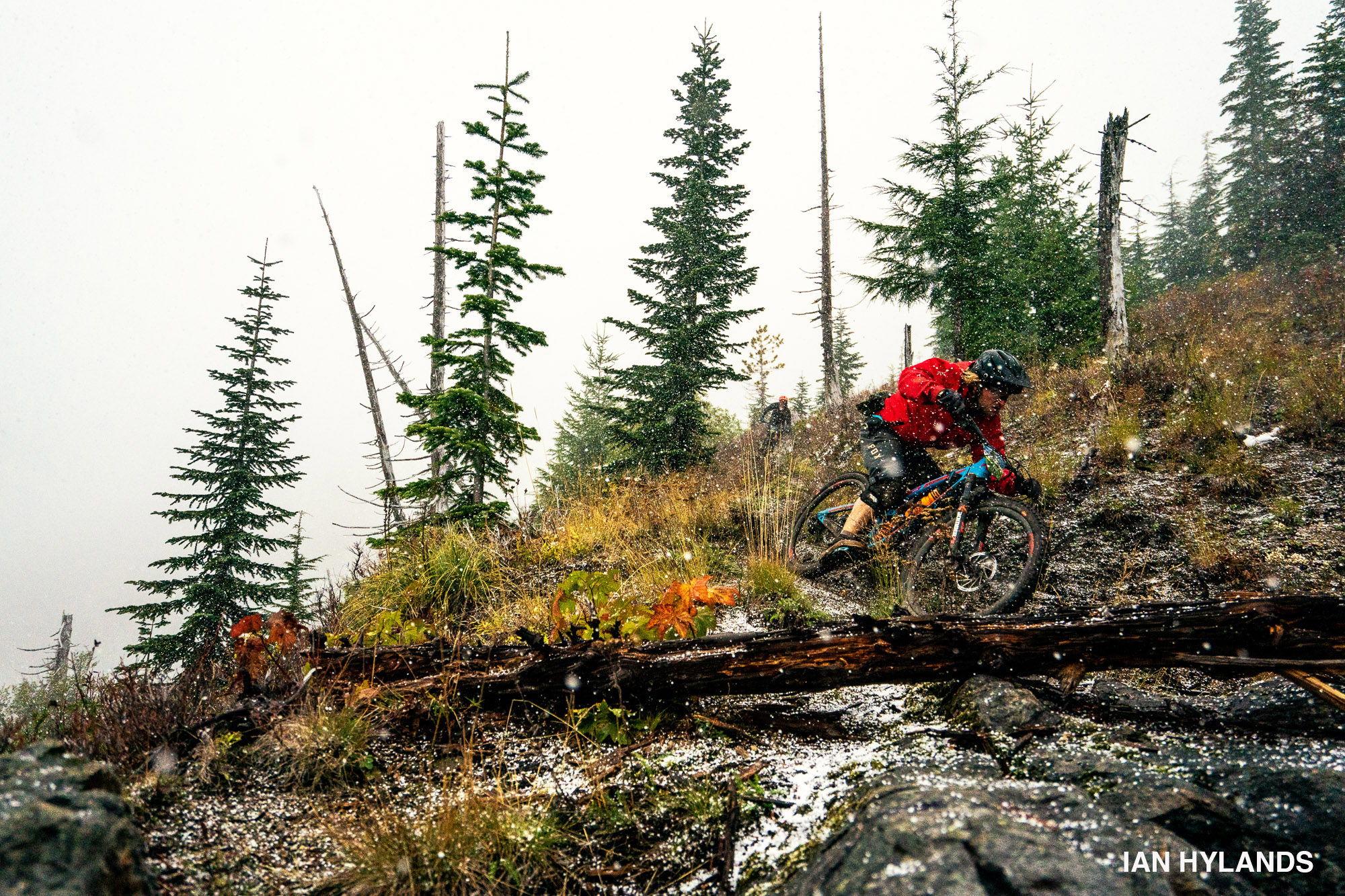
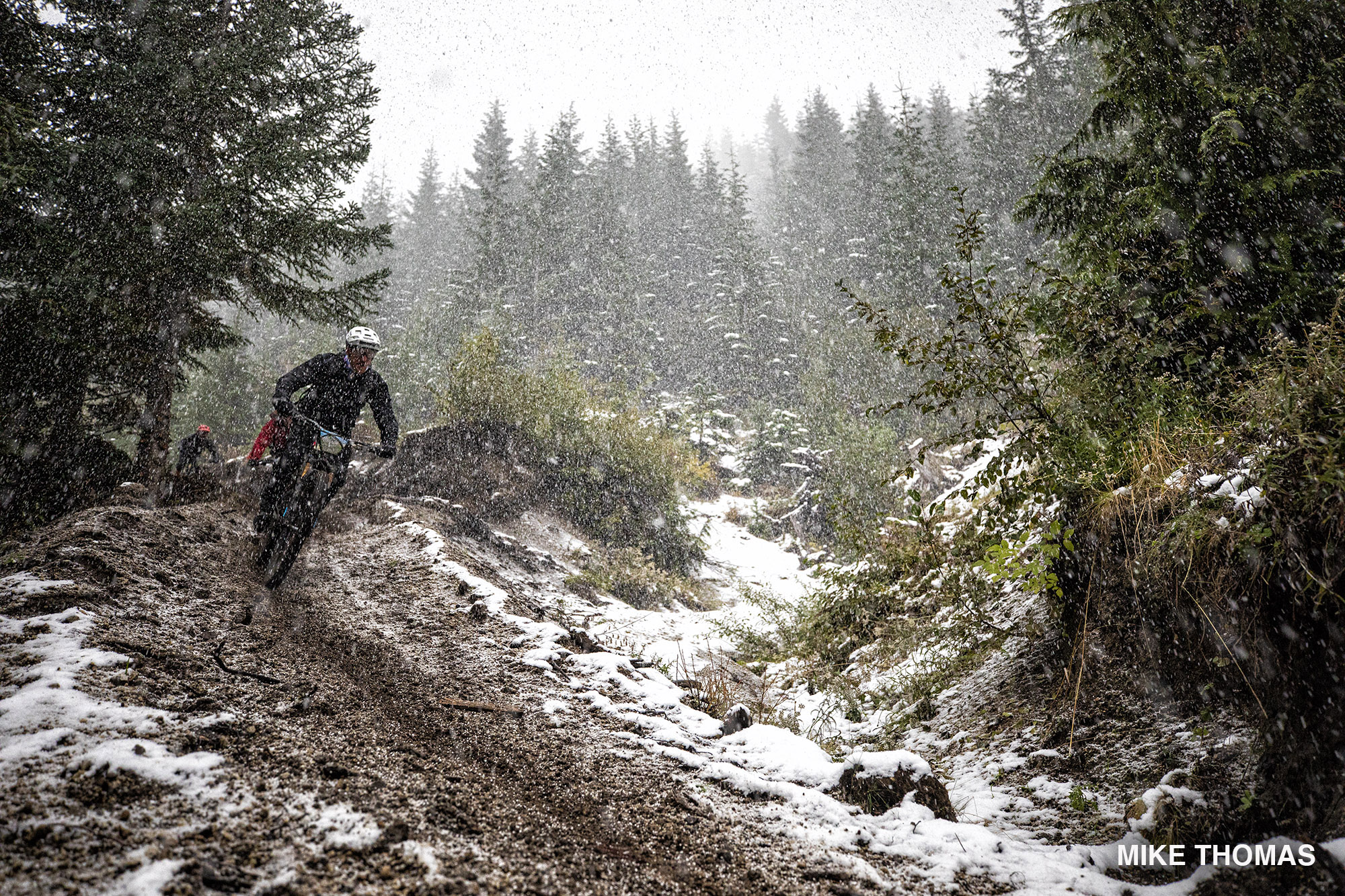
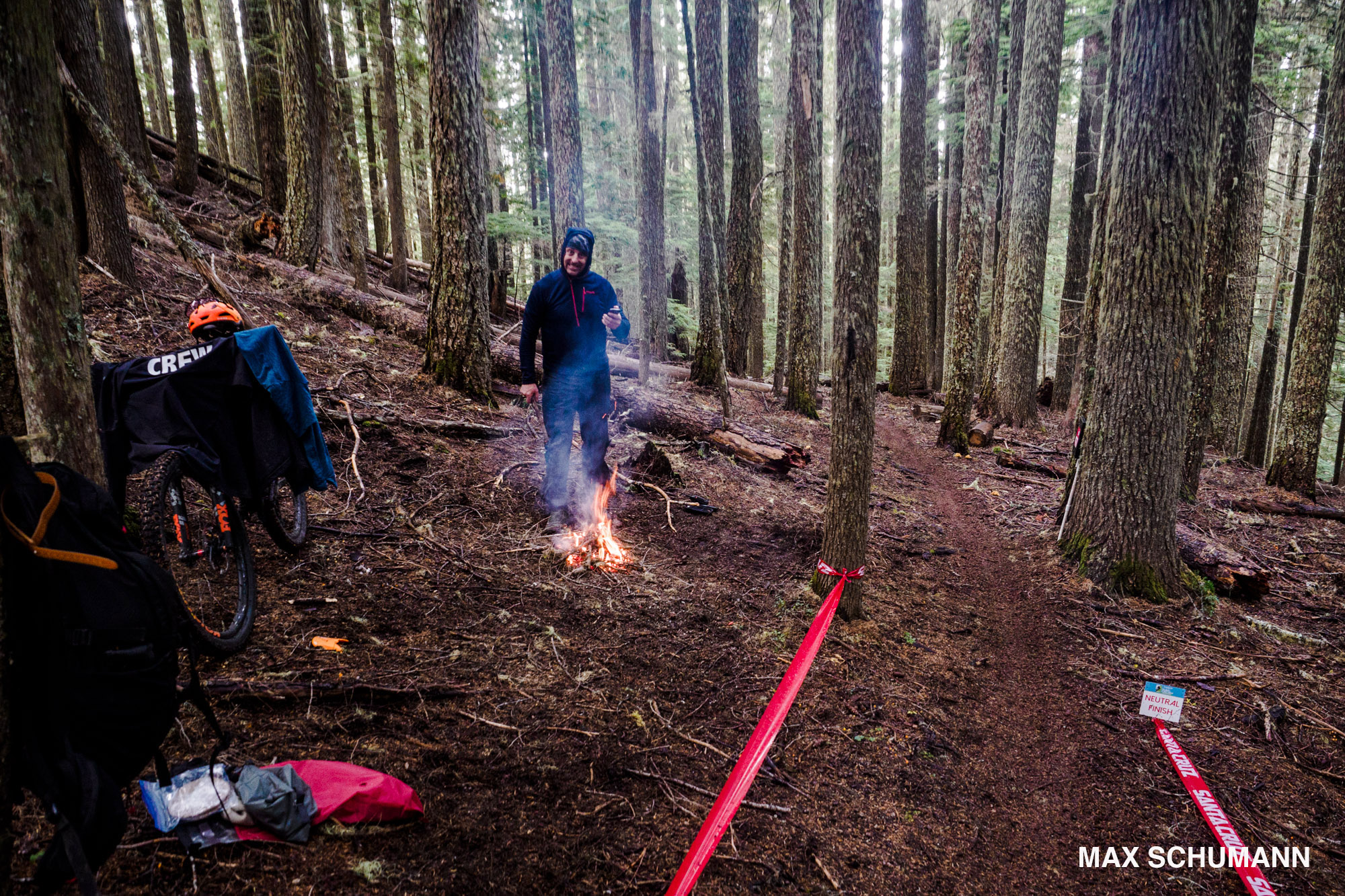
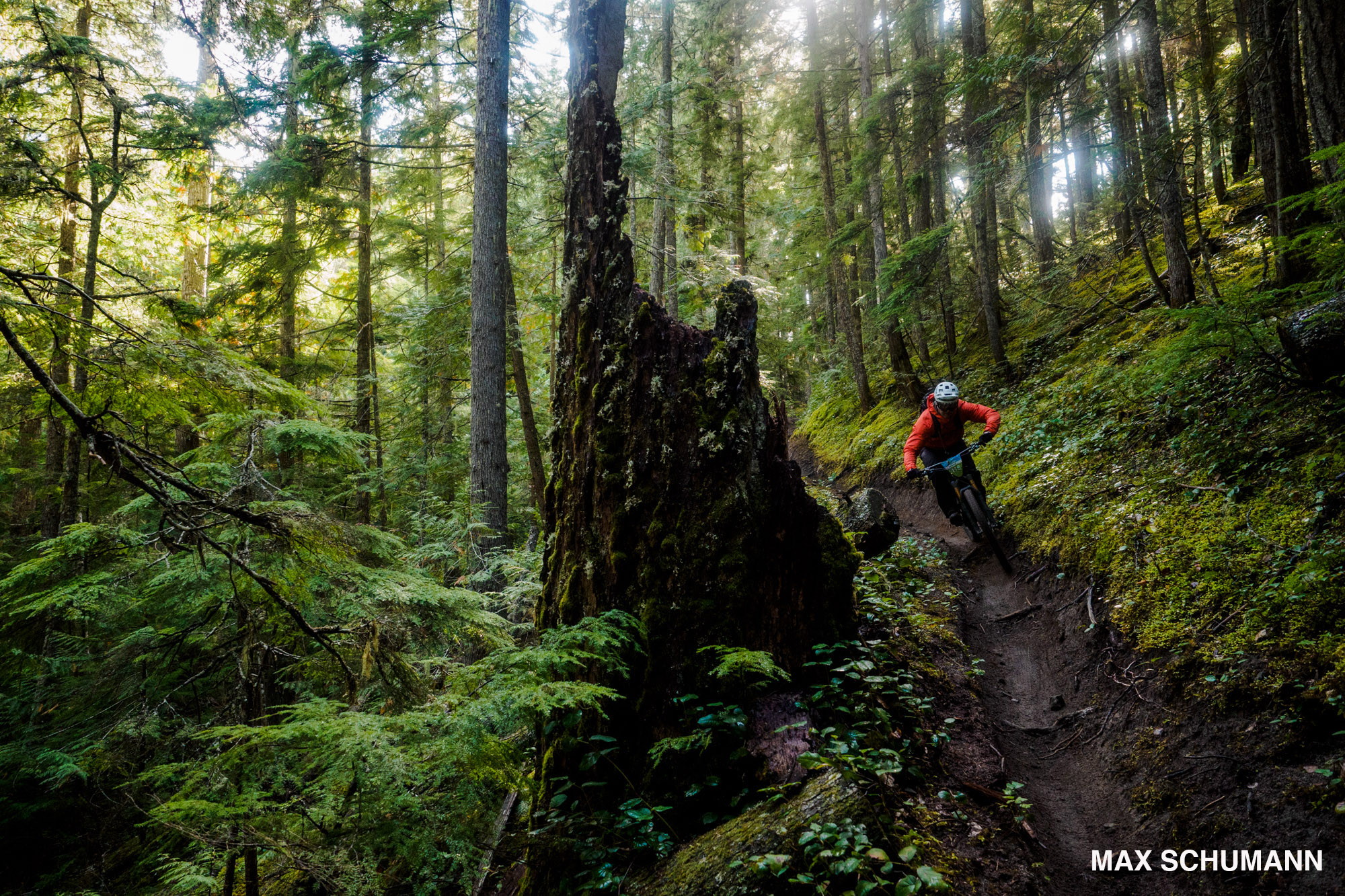
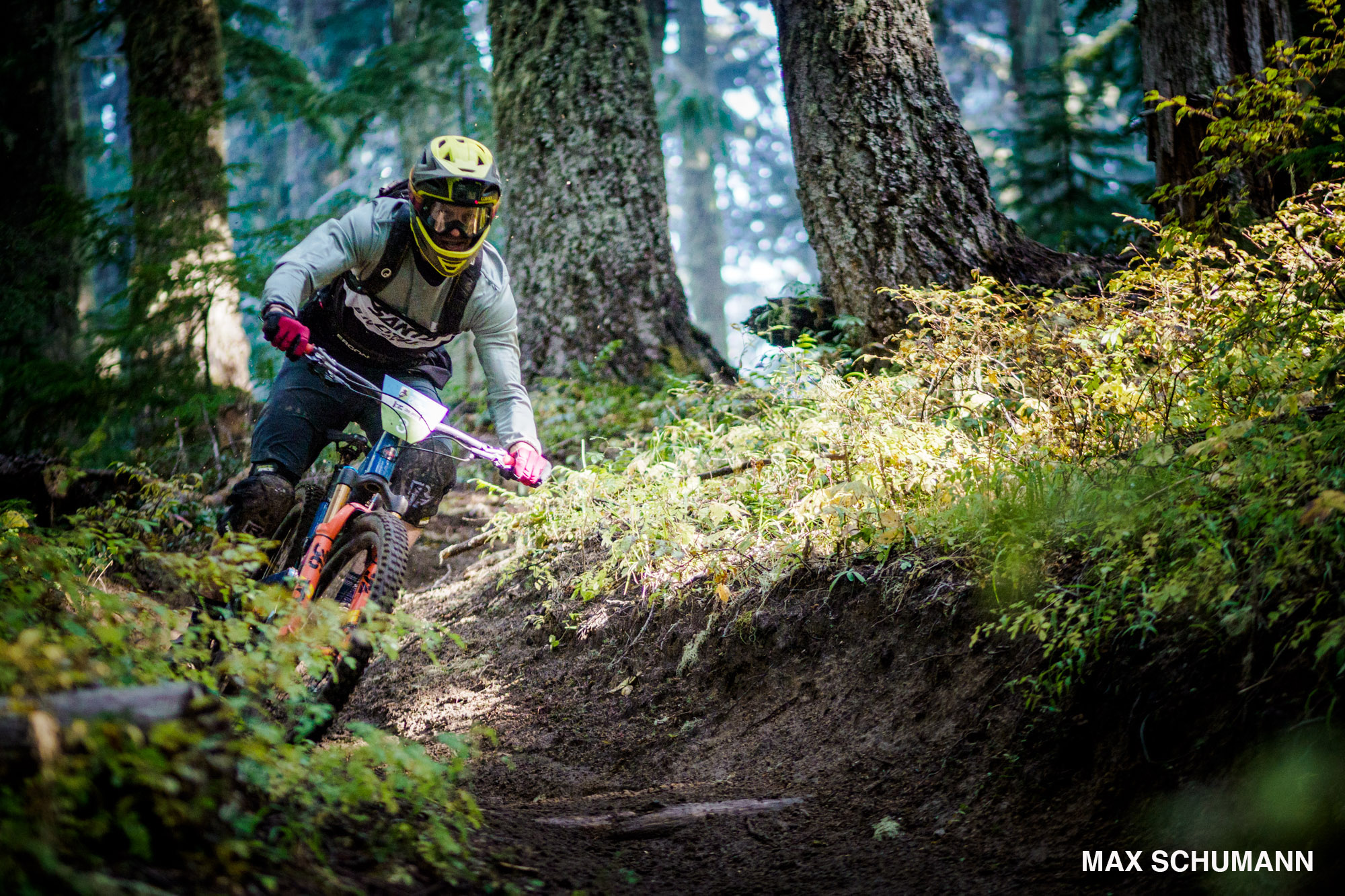
Less than a mile of traversing along a road took them to the top of Stage 9; 1200 feet of descending over 1.5 miles with a little rolling climb – and easy grind – in the middle. At the bottom of Stage 9, a big fire and a hot lunch were waiting for racers.
From there, racers got a big bump up in the shuttles to the ridgeline on the non-motorized side of the Gifford Pinchot. This is the area where Trans-Cascadia has spent the last two years cutting out over 500 logs and brushing over 100 miles of trail. From the drop-off point, racers had a 1-1.5-hour pedal with a couple of playful descents to the top of Stage 10.
Depicted on the map the racers were given, the Stage 10 descent had both a drooling and a mind exploding emoji. No other stage description has featured these. Nick had described it at the meeting the night before as “an insane descent with a neutral in the middle, deep loam, 12/10, best ever.” Expectations were high and it did not disappoint.
Blake Ramsden was even reminded at the top of the stage that it was going to be the best “and it was bonkers,” he says. “Literally loam was flying off my rear tire, I could feel it on my helmet, I was in a party train with three of my pals from North Vancouver and it was just incredible!”
“We started in the snow and it was this ribbon of dark dirt and then the snow melted, and it turned to moss with a ribbon of dark dirt,” Corinne Prevot describes Stage 10. “And then the ribbons just kept getting longer and longer with these really long side cuts that you could see the very bottom of into a hairpin. So, you haul ass and then you see the hairpin getting closer and you’re like ‘shut it down!’ And then you’re riding this really soft rut, and everything just holds, it’s just such hero dirt. It was just really screaming fast!”
“The snow made Strawberry Mountain extra exciting at the top,” says Geoff Kabush. “Riding through a track of snow, just holding on because you didn’t know what was going to be in the corners, and loose but it got better and better as we got down and out of the snow. Everyone was super psyched at the bottom of that one.”
The stage ended on a double track road that took racers back to shuttles. The plan had been to shuttle everyone back up to the same drop off spot and head north to the start of Stage 11 which would drop everyone back into camp. Only about a dozen racers made it through this stage before it had to be canceled due to steadily increasing snowfall.
“It’s as simple as the health of our racers and our volunteers,” explained Racer Producer, Alex Gardner about their decision to cut the last stage. “Our doctors made the decision and we support it.”
“The whole day was incredible right until the end, we got cut off the last stage because a big snowstorm rolled in,” says Thomas Vanderham. “[Before that was] some of the best riding I’ve done – I don’t even know really how to put it into words.”
After Day 3, the top Pro Women were Alex Pavon (3rd), Christina Chapetta (2nd), and Ingrid Larouche (1st). And the top Pro Men’s podium has Myles Trainer (3rd), Chris Johnston (2nd), and Romain Paulhan (1st).
Despite cutting the day a little short, racers were still smiling around the campfire. “It’s much, much more than I expected, and I heard that it was great but it’s so much more,” says Karen Eller. “The riding is the best riding I’ve done in my whole mountain bike life. Today especially, the third stage was so amazing, I wanted to stop and have more time on the trail. And what the team does to keep the riders feeling comfortable, it starts with the food, the lunch, the showers, the drinks, everything, they are working their asses off for us to have a good week and this is so much more than I expected!”
The weather held long enough at camp for people to dry out and warm up with hot showers, Hot Buttered Rum, and hot fires. And before bed, the crew reminded everyone not to get cold in the night, “we have extra sleeping bags, warm places to put you, and lots of options to make you more comfortable. Don’t suffer – you do enough of that on your bike!”
To further their advocacy efforts, Trans-Cascadia has created Ten for Trails.
Each $10 donation increases the chances of winning a Santa Cruz Megatower and all proceeds from the raffle will benefit the continued work of Trans-Cascadia.
This event is under special use permit of the Gifford Pinchot National Forest.
2019 Race Report // Day 2
“I think it was probably my best day ever on mountain bike trails. Stage 6 and 7 were unreal; perfect flow, sweeper corners, and hero dirt. It was amazing. I was smiling all the way down!” - Romain Paulhan
“It’s not going to be warm and it’s going to be wet.” The weather report that Tommy Magrath delivered the night before was still ringing in the ears of the racers as they rolled out of basecamp on Day 2. Headed for stages 5, 6, and 7, they were promised cold temperatures, mixed precipitation, and more incredible trails.
“I think it was probably my best day ever on mountain bike trails. Stage 6 and 7 were unreal; perfect flow, sweeper corners, and hero dirt. It was amazing. I was smiling all the way down!”
- Romain Paulhan
“It’s not going to be warm and it’s going to be wet.” The weather report that Tommy Magrath delivered the night before was still ringing in the ears of the racers as they rolled out of basecamp on Day 2. Headed for stages 5, 6, and 7, they were promised cold temperatures, mixed precipitation, and more incredible trails.
From basecamp to the start of Stage 5, racers had a 5.5-mile transfer to the top of Council Bluff that included 1300 feet of elevation – the majority of their climbing for the day – and a sweet little untimed descent into Council Lake. Stage 5 offered 1000 feet of descending with 45 feet of climbing on a gnarly track similar to Day 1, however not quite as steep.
“Stage 5 had a lot of floating roots, that one was super spicy because you would be coming to this little mini stepdown and then just land in a pile of roots,” says Christina Chapetta. “But still, super fun!”
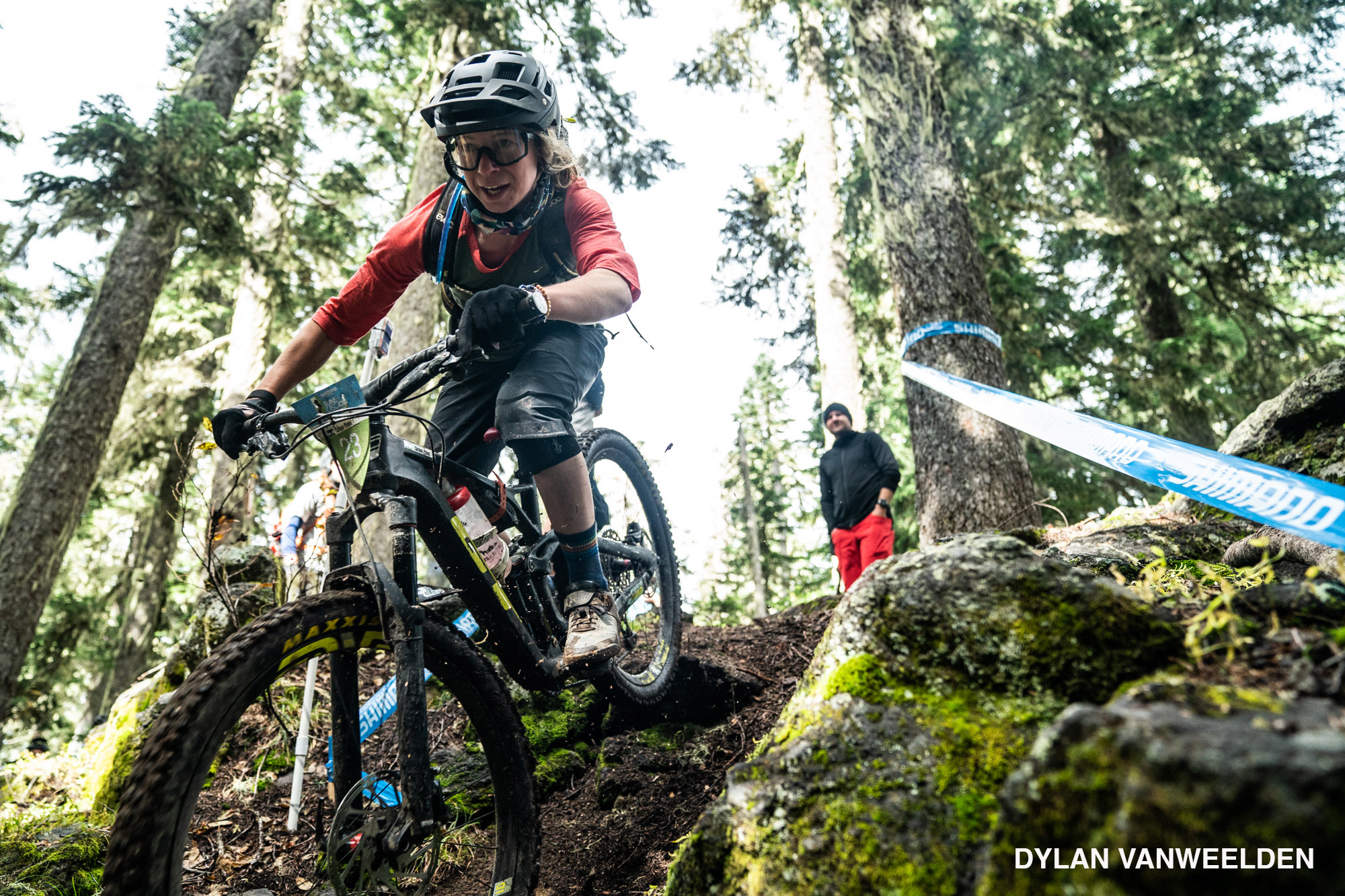
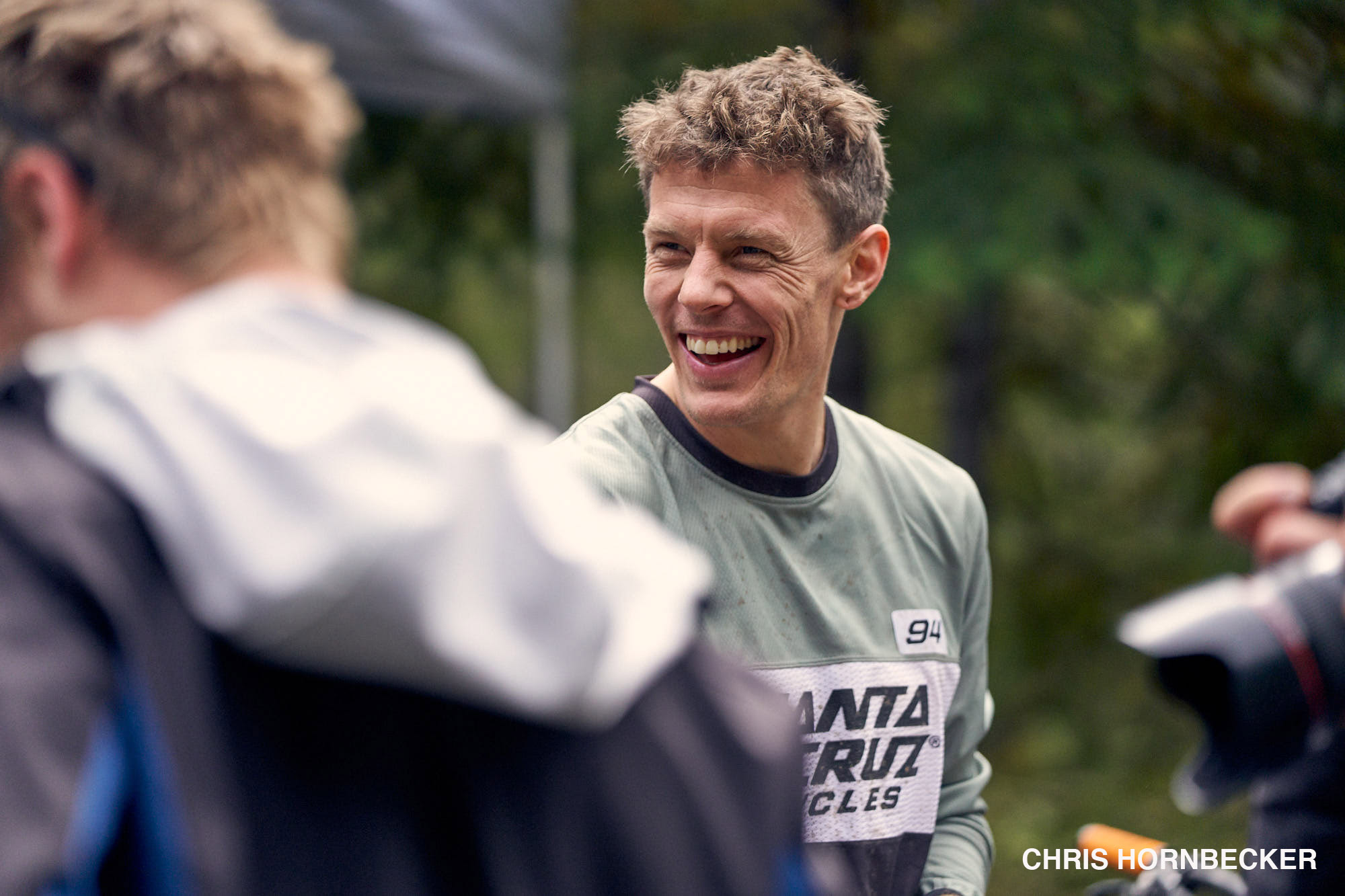
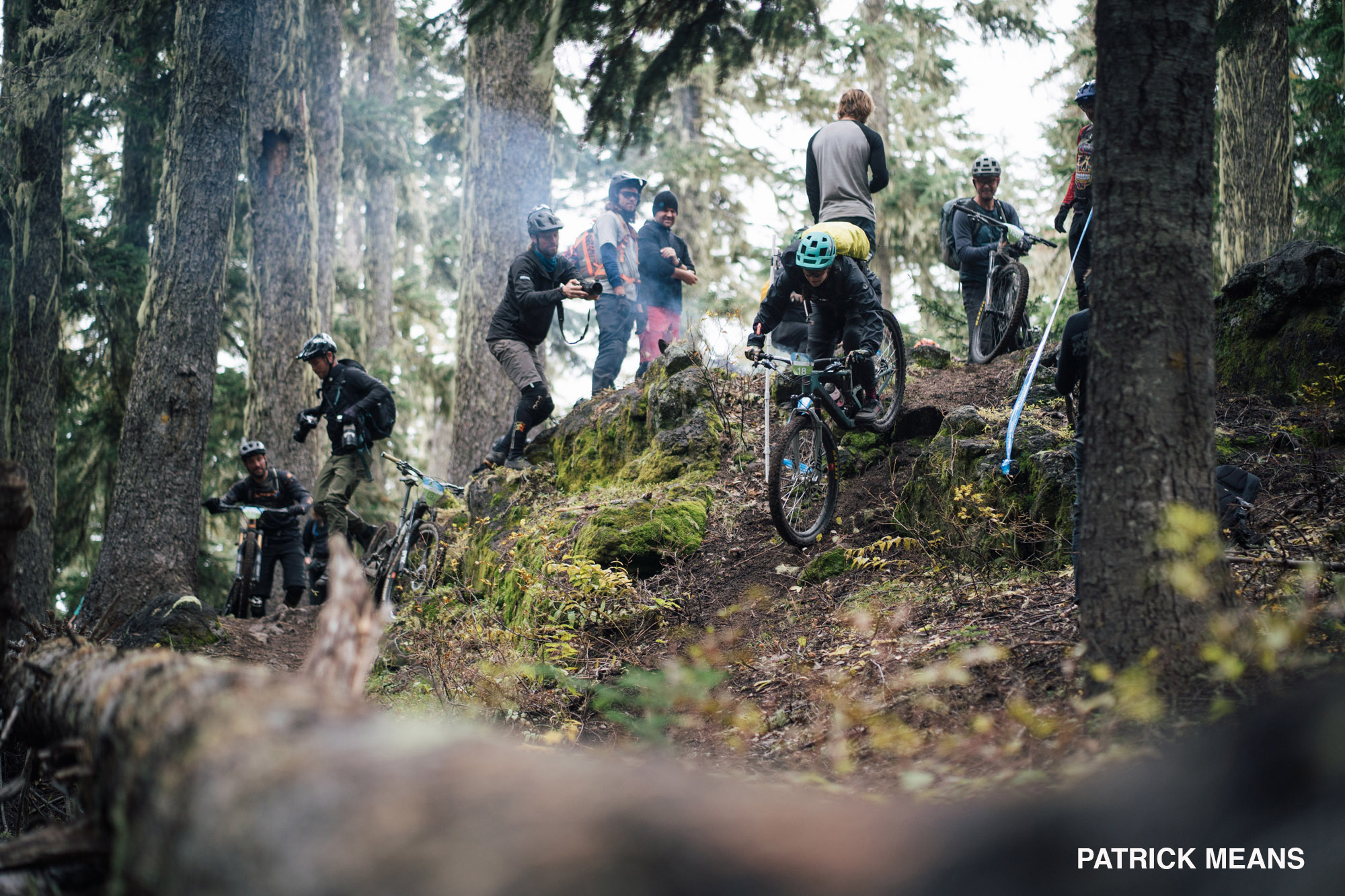
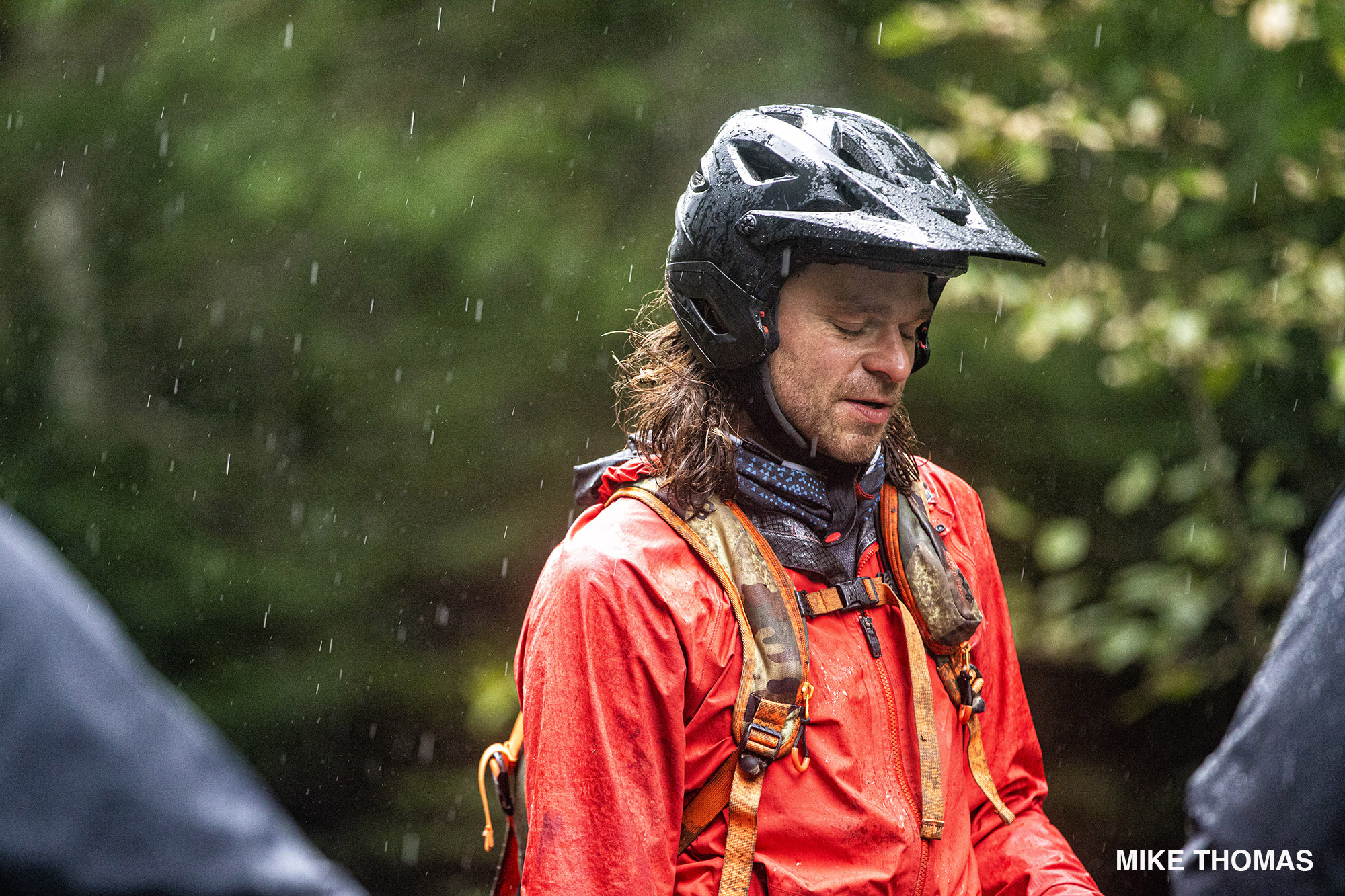
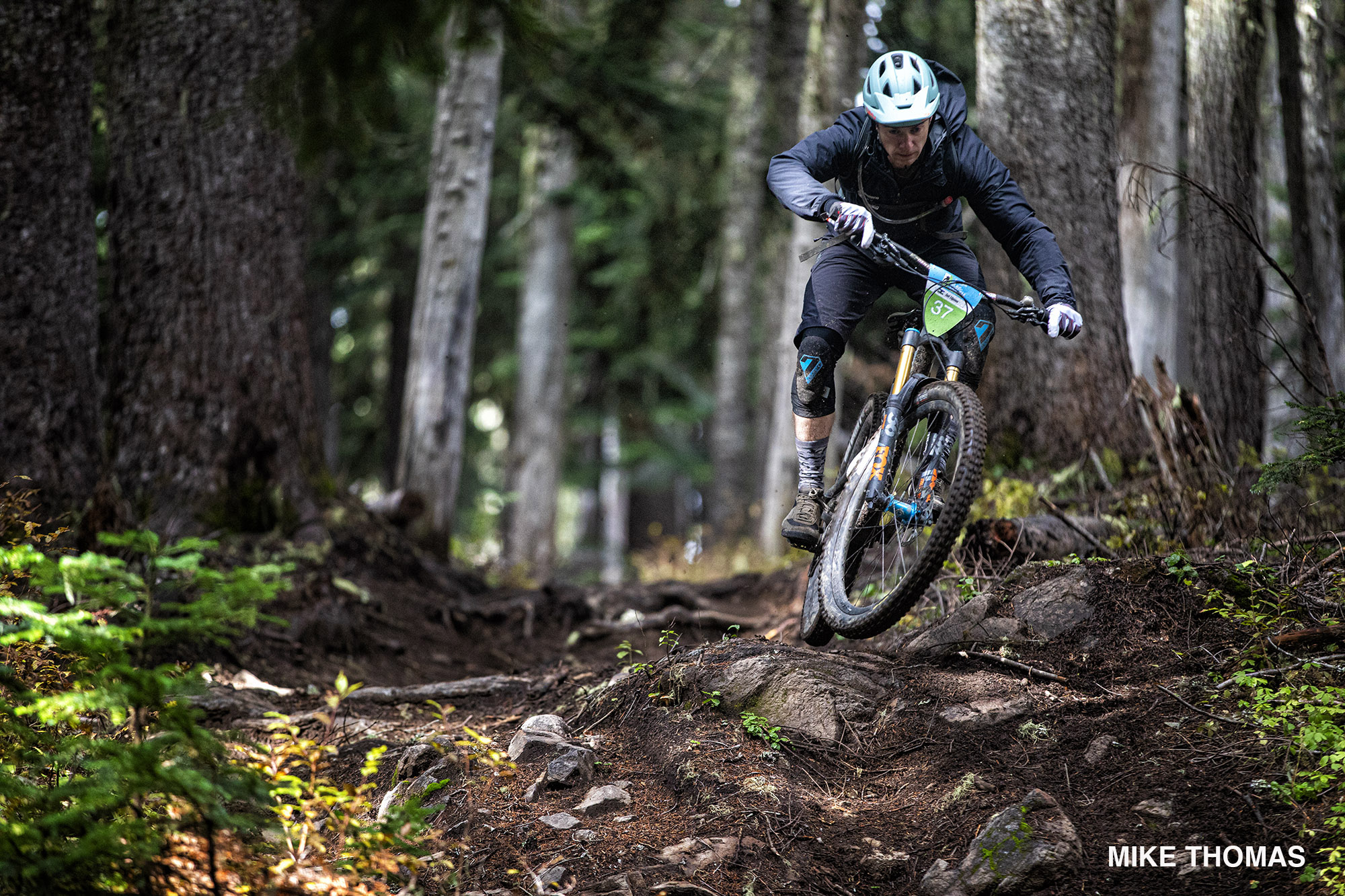
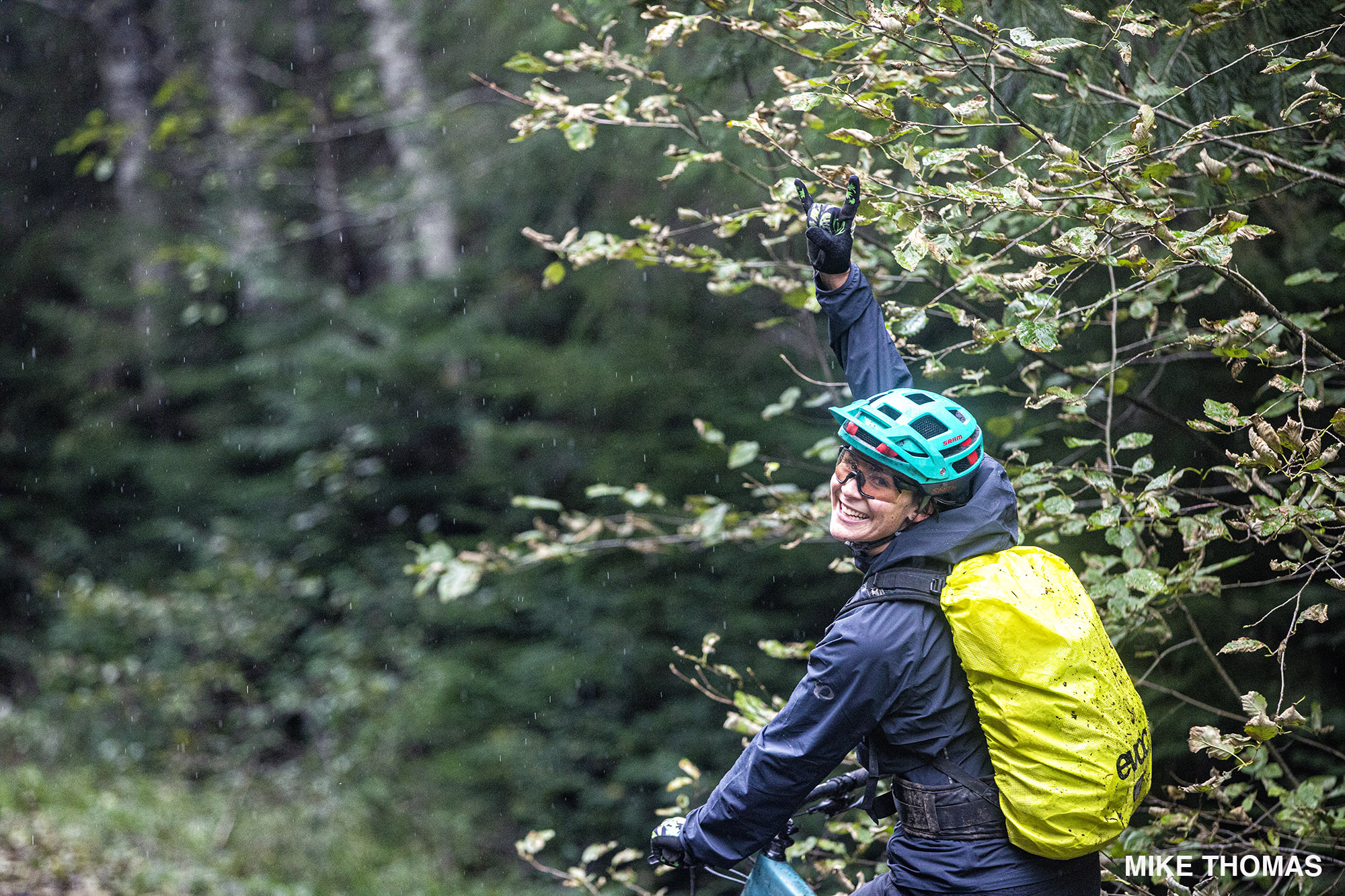
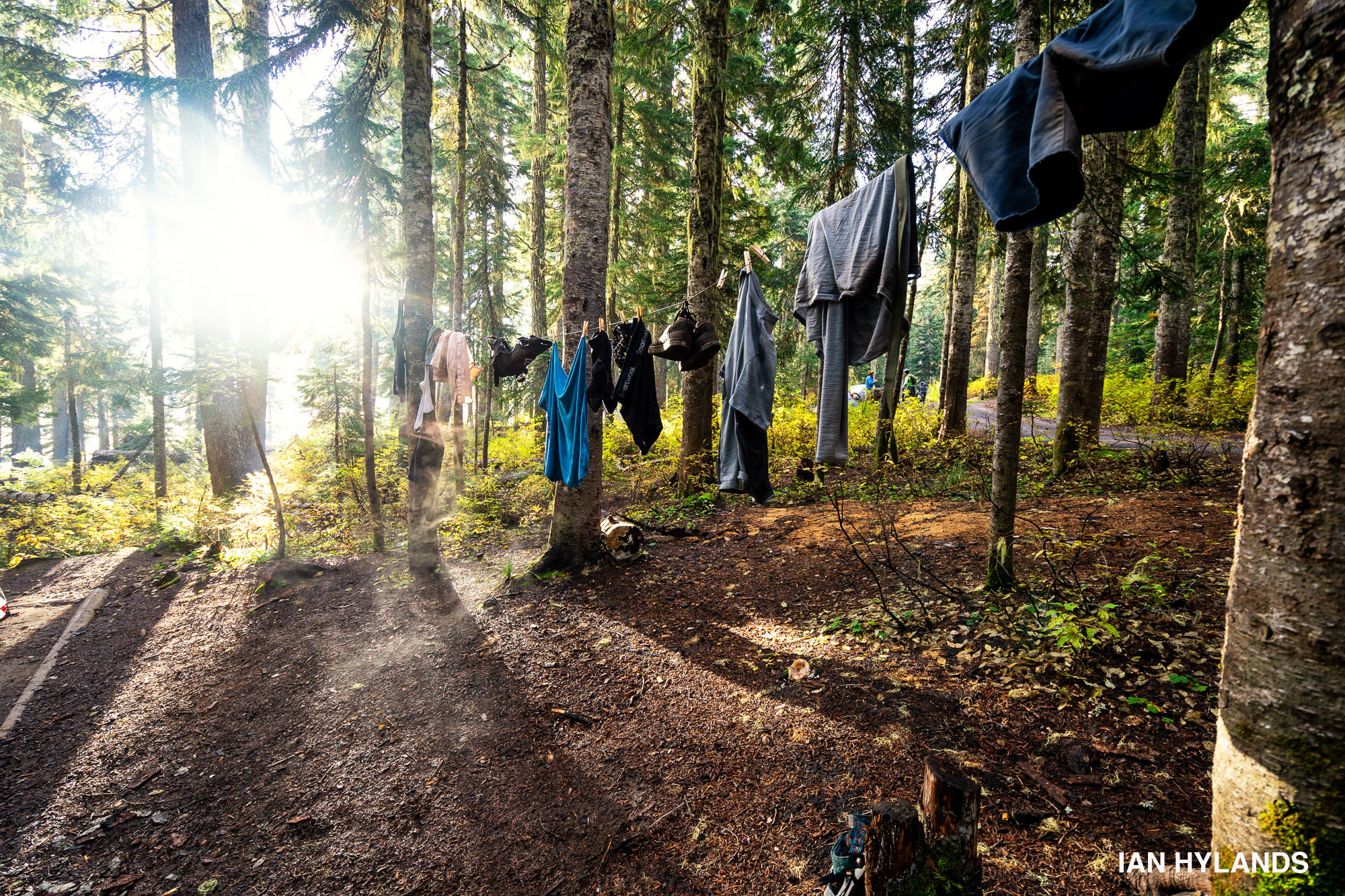
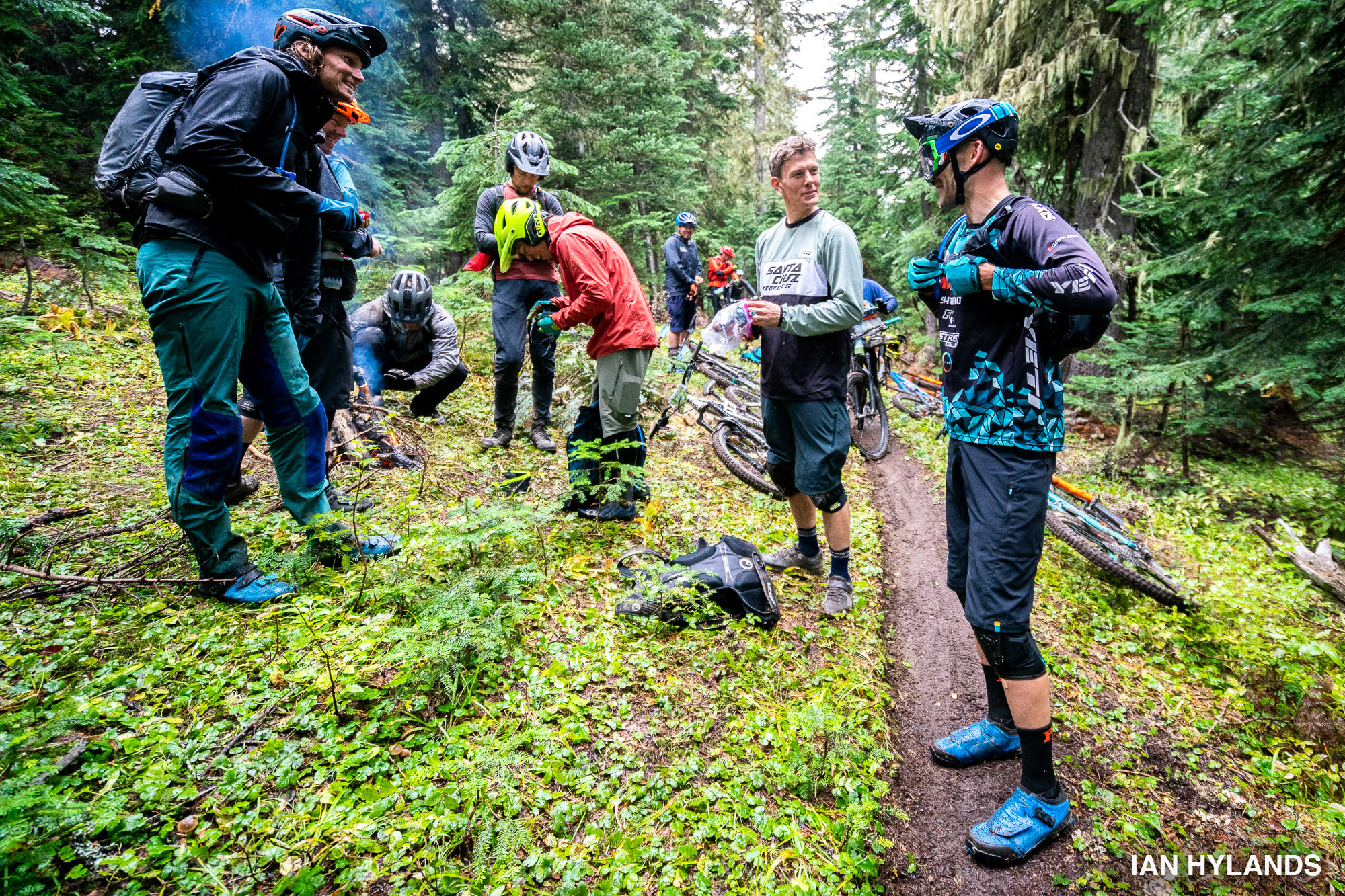
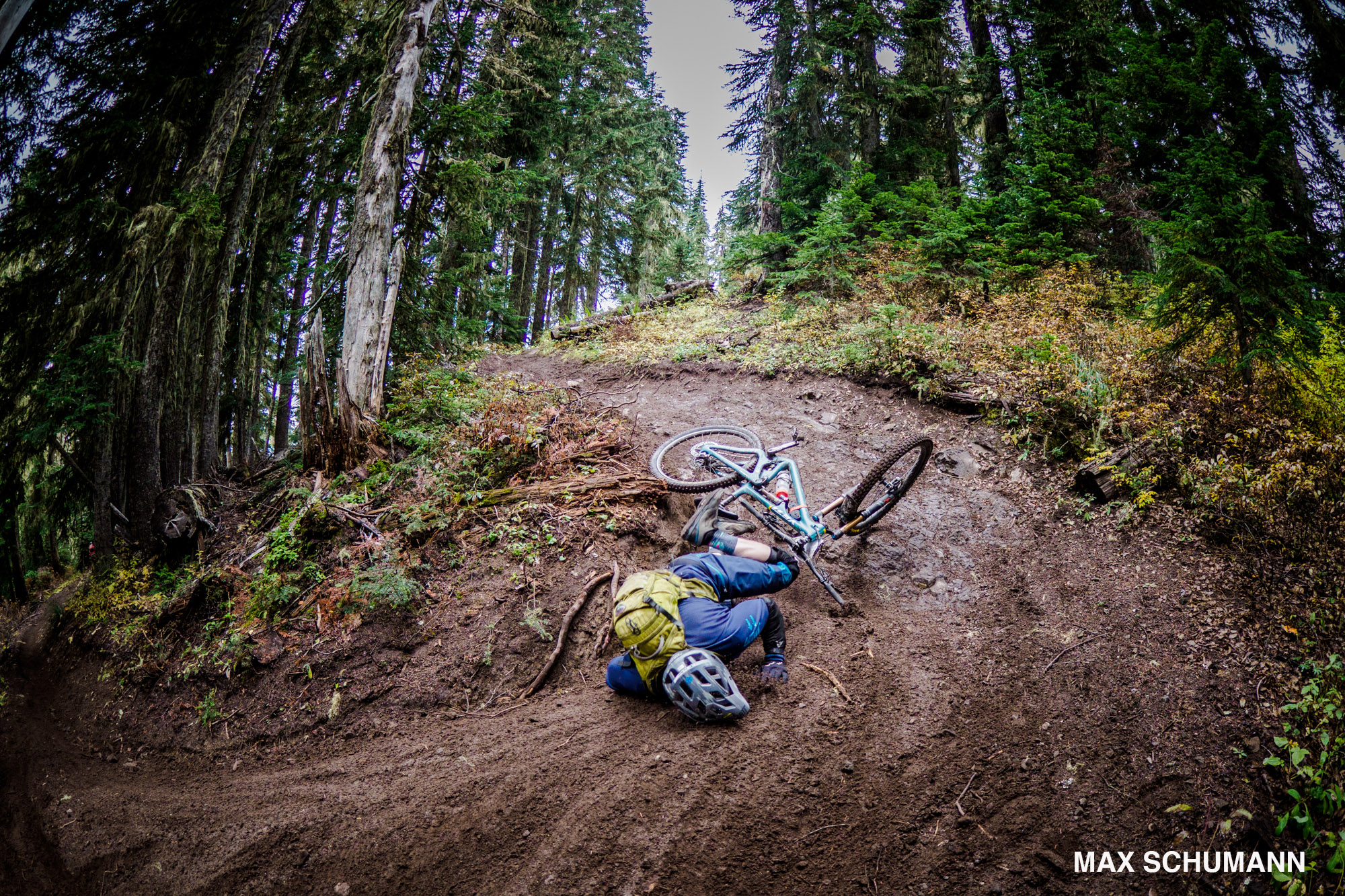
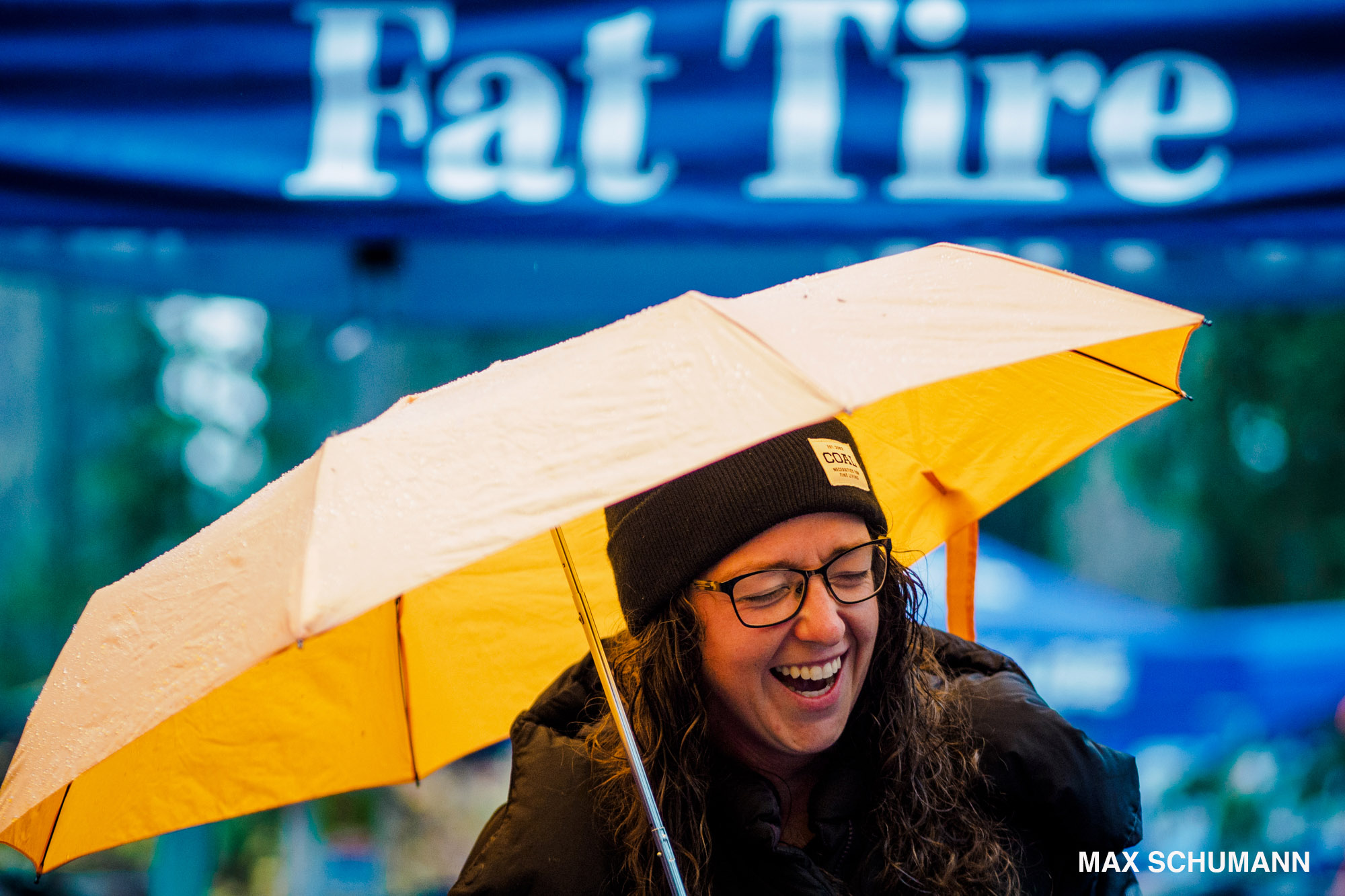
Following Stage 5, racers traversed the ridgeline for 1.5-2 hours to the start of Stage 6. This stage was a solid moto trail with a huge descent, a few punchy climbs, and plenty of line interpretation to be had.
“It was the best party train of the day, there were 6-9 of us, and that one was super good,” says Christina. “Through all the switchbacks you could hear the hooting and hollering up the trail. It started to rain partway down that one and that just added to the fun. It was raining hard enough to clear the mud off my glasses.”
Race Director, Nick Gibson, addressed the subject of party trains the first night at camp. “If you want to ride behind somebody do it. It doesn’t matter if you are in first place or second place, just do whatever you want and have fun. Our rules are peer-reviewed, if your peers are going to tell you it’s not cool, then it’s not cool and you’ll be tarred and feathered. Otherwise, it’s a race but have fun.”
North Vancouver native, Thomas Vanderham, loved Stage 6. “It was everything you look for in a trail; highspeed and lots of line options. Where I live on the North Shore there’s not that much sustain speed. I think that was an 11-minute trail and it just felt like you were going mach speed the whole time. It’s something I don’t get to ride very often, and I was just loving it!”
Chris Johnston, who is in second place overall in the pro men’s category after two days of racing, also loved the stage. “Stage 6 today was phenomenal, perfect dirt, I don’t even think there were any rocks out there, just corner, after corner, after corner,” he says. “We were treated to some quality trails out there today and that was really run.”
Racers were greeted at the bottom of Stage 6 with a hot lunch and beverages. From there, they loaded into shuttles and got a lift part of the way to Stage 7. From the drop off point, they had a 20-minute hike-a-bike followed by roughly an hour of trail riding to the start of the next stage. Stage 7 was a massive descent that felt like a downhill track; wide, rooty, steep and fun.
While many of the racers favored Stage 6 today, Deb Motcsh from France was partial to Stage 7. “I like when it’s a bit technical,” she says. “I’m not used to riding flowy and fast tracks, so when it’s slow and technical, I like it. It was really long, and it had perfect dirt and it was really fun to play on this trail.”
A past winner of Trans-Cascadia and also the first person to ever earn the coveted Go Hard jersey, Aaron Bradford, woke up in the wee hours of the morning in a chair near the fire. “Well the fire was being put out at that point – so I knew it was my time to go to bed.” That didn’t stop him from having an incredible day on course and enjoying Stage 7 in particular. “It was a little cold out there, but we huddle around fires and had a good time. The dirt was incredible. Party trains – it’s just ridiculous how much fun that is – just hooting and hollering with your buddies, just ridiculous! I dropped in with Adam [Craig], Matthew [Slaven], [Matt] Hunter, and [Thomas] Vanderham – we had a good crew and that was a spectacular stage. Even the transfer after that was a highlight. It was nice not racing it, just being seeing the beautiful, awesome, massive trees everywhere. We are out in the thick of it, it’s so good!”
Back at camp, the weather cleared long enough for everyone to gather by a big fire and warm up. The music was playing, Hot Toddy’s were being served, and everyone was sharing stories from their day.
“Today’s stages are definitely the reason why people are coming out here,” says Trans-Cascadia veteran Joe Lawwill. “Yesterday was pretty challenging; it has its own charm and we like it but today was just incredible trails and the transfers were actually so amazing. I had to keep pinching myself. I was distracted by all the fall colours, the dirt, the trees, and the mushrooms. The stages all had awesome flow; they were great to ride with your buddies. You could end the event right now and people would go home happy.”
“We took a super mellow pace and just ripped it,” says Kelend Hawks. “We had a party train every lap and it was great, just having good times out there. The dirt was just unreal, it’s the only way to describe it, it was like riding on a sandy beach all day.”
After a gourmet dinner that included Fire Roast Beef Shoulder, Wok-Fried Green Beans, Aromatic Jasmine Rice, Herb Salad, and Tomatillo Sambal, racers cheered as the top three were announced in each category. “We got some really fun riding, even between the stages, the liaison after the last stage was probably the most fun section to ride with some friends; fun, fast, flowy sections,” says Geoff Kabush who is currently in third place. “I had a good day out there! I think I was a half-second ahead of Romain today, so 90 more days and I’ll catch up. Funny to see that me, Chris, and Romain were within seconds on each stage, I’m sure we are definitely interpreting the trails very differently, but the end result is some close racing, which is fun!”
Just as the Day 3 maps were handed out and details of the course were being shared it began to snow. . .
To further their advocacy efforts, Trans-Cascadia has created Ten for Trails.
Each $10 donation increases the chances of winning a Santa Cruz Megatower and all proceeds from the raffle will benefit the continued work of Trans-Cascadia.
This event is under special use permit of the Gifford Pinchot National Forest.
2019 Race Report // Day 1
“We’ve been out here scaring ourselves since 2013, and I’ve never seen tracks this good. You guys are in for a treat!” - Alex Gardner
Racers arrived at basecamp on Wednesday and for those who have never experienced a Trans-Cascadia event, they were in for a bit of a surprise. “In my riding scene, I’m a bit of a ride organizer so I’ll bring a barbeque or whatever and get people organized a little bit,” says freerider Matt Hunter, “and I showed up here and I was like, ‘woah, who did this?’ It was pretty amazing.” Racer tents were set up along the shore of Lake Takhlakh with Mount Adams in the distance, a fire was already lit, and two stocked bars were ready to serve as racers exited their shuttle vans.
“We’ve been out here scaring ourselves since 2013, and I’ve never seen tracks this good. You guys are in for a treat!”
- Alex Gardner
Racers arrived at basecamp on Wednesday and for those who have never experienced a Trans-Cascadia event, they were in for a bit of a surprise. “In my riding scene, I’m a bit of a ride organizer so I’ll bring a barbeque or whatever and get people organized a little bit,” says freerider Matt Hunter, “and I showed up here and I was like, ‘woah, who did this?’ It was pretty amazing.” Racer tents were set up along the shore of Lake Takhlakh with Mount Adams in the distance, a fire was already lit, and two stocked bars were ready to serve as racers exited their shuttle vans.
During dinner – barbeque pork rib knuckle with chipotle honey butter cornbread and all the fixings – the Trans-Cascadia team welcomed the racers. “We’re here, we’re in it, it’s deep, this is terrain like I’ve never seen,” announced Race Producer Alex Gardner. “We’ve been out here scaring ourselves since 2013, and I’ve never seen tracks this good. You guys are in for a treat!”
Racers lined up at 8:30 the next morning to hop the shuttle to Stage 1 just as the heavy fog turned to proper rain. Ahead of them was a nearly 20-mile day with 4500 feet of climbing and 7700 feet of descending. Most of their day would be spent high up on a cold ridgeline but marshals and timers all had fires lit and to keep them warm as they moved through the four stages.
EWS racer Christina Chapetta is no stranger to enduros but this is her first Trans-Cascadia and her first race back from injury, “I’m just really stoked to ride and to end the season on a good, fun note. For me it’s not all about the racing, it’s just good to be back on the bike – and with a good crew of people.” When asked about any advice she got coming into the race, she said “[I was told] to get the liver ready, get the lungs ready, there’s going to be some biking involved – and bring raingear.”
Chris Johnston, who has raced the last four Trans-Cascadias, welcomed the wet weather, “it brings some excitement and adventure to it. I mean, who rides in these conditions normally?” He’s also happy to be back in the Gifford Pinchot National Forest. “I am super stoked that it’s back in the same area again, last year’s trails were unreal, and they say there’s about 75% new trails again. That’s pretty frickin’ awesome, I’m really excited to see what they’ve got.”
Chris wasn’t the only one who was thrilled to be back. “There’s so much to explore in these areas,” says Geoff Kabush who has competed at every Trans-Cascadia and won the race twice. “We’re back in the same location but I’m excited to hear that we are going to race a bunch of new stages because that’s the most fun part for me; racing blind and reading the trail. It’s my favourite format and that’s why I keep coming back here.”
Racers began today with a 30-minute pedal from their drop-off point that took them to start of stage one – a massive 2500-foot descent broken up by a neutral zone. Trans-Cascadia introduced neutral zones over the last couple of years to accommodate for those really painful climbs in the middle of a descent that no one wants to race. It is an untimed section in the stage but racers must continue moving forward through it – regardless of whether you are pedalling or walking. “What we’ve seen with this is tighter race times over the four days which makes for more exciting racing,” says Nick Gibson, Race Director.
At the bottom of the first stage racers found a welcome fire, hydration, and a hot lunch waiting. When they were ready, shuttles dropped them in the same spot as earlier but this time, they headed in a new direction towards Stage 2. The transfer was an elevation gain of roughly 1900 feet over 3 miles.
“The first stage was super wet and mucky, so after Stage 1 there was a lot of managing bike, clothing, and equipment so it made for a long day and a lot of clean up,” says Geoff “Luckily, as we crested the ridge heading towards stage 2, the sun broke out and it turned into a pretty nice day.”
Stage 2 was a short and quick ridgeline descent with a couple of punchy climbs. From the end they had a gnarly hike that was almost 1000 feet elevation gain in less a mile and aptly named The Devil’s Staircase – Nick had (jokingly) assured racers at dinner the previous night “but it’s great, you’ll love it!”
At the top of the hike, Stage 3 was a sweet and speedy 1-mile descent and a favourite of the day for Trans-Cascadia newbie Brooklyn Bell. “It was fast, there was nothing I had to think about or worry about, I could just let go. I also really liked all the alpine and the stunning views on the way to Stage 4.” The gentle climb from the bottom of that stage 3 put racers into some truly unique terrain near Jumbo Peak with incredible fall colours and even the potential to see some mountain goats and views of Mount Adams.
Despite being cold and wet, Brooklyn was still all smiles. “It’s so fun, it’s so community based and so different from any race I’ve ever done. And it’s hard and hard in a different way. Today was so cool, we had no idea what kind of trails we would be riding and to go up into the high alpine and do this adventure ride and then descend through really fast flowy and a little bit more of moto style trails was really cool. High alpine, adventure rides, and fast downhill flow don’t always really go together. It’s cool to see the thought that’s been put into the what people would like riding.”
The last stage of Day 1 was a huge descent with a flat-but-downward-trending section in the middle and a couple of creek crossings. The stage ended on the far side of one of the deeper crossing and racers had been advised by Nick to:
“either go fast or walk.”
“Dark Meadow, new for this year and an incredible piece of trail with three different sections” describes racer Lars Sternberg. “Fun flowy, perfect dirt with full moto turns up top and then a creek crossing section and then super rocky and toothy down towards the bottom. Pretty mind blowing.” There was a steady chorus of cheers as racers exited the bottom of the dark forested section. A mellow transfer out with a couple of rolling climbs brought racers back to the vans where a fire was roaring, and beverages were being served.
World Cup XC racer, Kaysee Armstrong, felt a little out of her element in the morning when she realized in the shuttled that the tags were still on her knee pads but that didn’t stop her from having an incredible day. “What got me into mountain biking is not racing, it’s adventures with friends,” she said. “Being dragged into the woods with a bunch of guys telling me ‘you can do this!’ It felt a lot like that today, the hike-a-bikes were tough but worth it. Getting up there and those beautiful views, we basically got to go on a big adventure tour and go to places that an XC race never gets to go to. And everyone is drinking beers and hanging out, talking, you just don’t do that anymore in the races that I go to. It’s nice to come here with a bunch of people, make friends, and enjoy it.”
Back at camp heated drying tents, hot showers, campfires, and a gourmet meal – locally foraged spaghetti with seasonal pork ragu – were waiting. Neither wet, nor cold could dampen the revelry and spirit of this community as they cheered the podiums after dinner.
Here on the advice of Steve Peat, Loris Vergier, and the rest of the Santa Cruz Syndicate team who were at the race last year, Romain Paulhan took the top step on the podium at the end of the first day. “[They said] you’re going to love it, the trails are amazing, and the dirt is so good – and it was definitely so good!”
Ingrid Larouche was in the lead for the pro women after Day 1, “This is very cool, this area because you feel really deep and far and you never really know what to expect with the weather and these elements that add to the whole experience. I feel like everyone who comes here comes in with this idea of having such a great time so if you go anywhere, like over by the fire, everybody is so fun to hang out with!”
To further their advocacy efforts, Trans-Cascadia has created Ten for Trails.
Each $10 donation increases the chances of winning a Santa Cruz Megatower and all proceeds from the raffle will benefit the continued work of Trans-Cascadia.
This event is under special use permit of the Gifford Pinchot National Forest.
The 2019 Trans-Cascadia Kicks-off Thursday!
The fifth edition of Trans-Cascadia kicks off on Thursday!
For the second year, the basecamps will be in the depths of the Gifford Pinchot National Forest in Washington state. Race organizers and volunteers have been hard at work over the last year expanding access to the backcountry network and they are thrilled to introduce another batch of new and returning racers to it…
The fifth edition of Trans-Cascadia kicks off on Thursday! For the second year, the basecamps will be in the depths of the Gifford Pinchot National Forest in Washington state. Race organizers and volunteers have been hard at work over the last year expanding access to the backcountry network and they are thrilled to introduce another batch of new and returning racers to it.
In the second installment of Common Ground - Freehub Magzine’s three-part video series on Trans-Cascadia, they take a look at the organization's partnership with the Backcountry Horsemen of Washington. Despite common challenges between user groups, these two organizations successfully opened, cleared, and repaired trails together this summer.
“There are some enhancements and fine-tuning we've been able to do this year after the initial kind of peel back that we did in 2018 which is awesome,” Says Volunteer Coordinator, Ben McCormack. “We've been able to focus more on tread and sustainability as opposed to just splitting the vegetation open and making sure there's still a trail there. I think some of the stuff that we've been playing around with this year is just going to blow people's minds!”
This truly remote area of Washington offers natural and diverse trails that are steep and challenging. The high alpine riding will give racers descents of 2,000-3,000 feet at a time. Within the blast zone of Mount St. Helens, in addition to the stunning ridgeline views and massive descents, the riding here has another unique property. “[The pumice] layer is like Swiss cheese marbles that float,” says Ben. “Ultimately it's just a really fun thing to ride because you've got traction but you don't have traction. I mean, the whole bike is moving, so it's pretty playful and a little disconcerting at first. But once they get used to it and know how to run it, I think folks will be surprised to see how well they’ll do in those sections.”
We can expect to see an exciting race from an international field of Pro Women with diverse disciplines. Attending will be Canadian EWS Racer, Chistina Chappetta; American World Cup XC racer, Kaysee Armstrong; French enduro racer, Deborah Motsch; American downhill racer Caroline Washam; and German 3-time Transalp Challenge and Transrockies winner, Karen Eller.
In the Pro Men’s category, newcomer Marco Osbourne will be up against some familiar Trans-Cascadia faces including 2-time Trans-Cascadia winner, Geoff Kabush; Trans Cascadia winner, Aaron Bradford; and 2nd place Trans-Cascadia finisher, Chris Johnston. Other new faces in the Pro Men’s category this year are legendary freeriders Matt Hunter and Thomas Vanderham.
Once again racers will be accessing this mostly primitive singletrack using both shuttles and pedalling and will return, exhausted to their tents at basecamp to find welcoming campfires and gourmet meals. The bar will be open – serving beer and cocktails nightly – and for those who get to sleep, they will drift off dreaming about the big mountain ridgelines and ribbons of dirt under the old-growth canopies that the next day will bring.
The isolated location of our basecamps and lack of access to cell service and wifi is a big part of the culture of Trans-Cascadia. Instead of focusing on social media, racers and crew alike spend time sharing stories and dreaming up ridiculously entertaining antics around the fire. That said, our media team will be working hard to get our daily reports and updates out to you. Keep an eye here and on our website for daily photos, videos, and race reports starting on Friday!
To further their advocacy efforts, Trans-Cascadia has created Ten For Trails. Each $10 donation increases the chances of winning a Santa Cruz Megatower and all proceeds from the raffle will benefit the continued work of Trans-Cascadia.
This event is under special use permit of the Gifford Pinchot National Forest.
Common Ground: Filling the Void with Trans-Cascadia
Over the last five years, Trans-Cascadia has evolved to be more than a 4-day backcountry enduro.
The non-profit’s mission to promote and build sustainable trails throughout the Pacific Northwest has created a passionate community and united once-divided user groups. Working year-round with the forest service and land managers, the Trans-Cascadia team continues to establish and maintain backcountry routes that were previously impassable.
Over the last five years, Trans-Cascadia has evolved to be more than a 4-day backcountry enduro. The non-profit’s mission to promote and build sustainable trails throughout the Pacific Northwest has created a passionate community and united once-divided user groups. Working year-round with the forest service and land managers, the Trans-Cascadia team continues to establish and maintain backcountry routes that were previously impassable.
“We've actually got to be well beyond 3000 hours for 2019 at this point,” says Volunteer Coordinator Ben McCormack, “just given the number of folks that we've got out here and we're pulling 10-hour days pretty regularly. We did a lot of work last year, but we've been able to multiply that by a little bit this year which is cool to see.”
As the team finishes up the last of the details for this year’s Trans-Cascadia race – beginning September 26 – in partnership with Freehub Magazine they are kicking off a three-part series that takes a look behind the scenes. From advocacy to hands-on work and from racing to good times, these edits give a full view of what Trans-Cascadia has become and inspires ideas of what may be possible for the future of mountain bike access.
“We've been really lucky with our volunteers and especially the community that surrounded the race from day one,” says Alex Gardner, Trans-Cascadia Producer. “We all work hard towards our goals, but we also make sure everybody gets a taste of what their efforts give – and that brings it all together.”
With three heavily attended work parties completed in Washington State this year, the team is beyond excited to welcome a new and returning batch of racers to enjoy their efforts in just two weeks.
To further our advocacy efforts, we have created Ten For Trails. Each $10 donation increases your chance of winning a Santa Cruz Megatower and all proceeds from the raffle will benefit the continued work of Trans-Cascadia. Donate now.
Uniting User Groups to Keep Trails Open
“There's a place for everybody. I do believe that.” - Jason Ridlon, Backcountry Horsemen of Washington
This third and final work party of the 2019 Trans-Cascadia season (pre-race) was the first collaborative event with The Backcountry Horsemen of Washington (BCHW) – a group representing stock trail users.
“There's a place for everybody. I do believe that.”
- Jason Ridlon, Backcountry Horsemen of Washington
—
This third and final work party of the 2019 Trans-Cascadia season (pre-race) was the first collaborative event with The Backcountry Horsemen of Washington (BCHW) – a group representing stock trail users.
“We got a call from them last year just kind of out of the blue,” says Trans-Cascadia Race Director Nick Gibson. “They were pumped and thankful for the work we had done clearing out the trails.” When the Trans-Cascadia team had first arrived in the area to the Gifford Pinchot National Forest to prep for their 2018 race, nothing was rideable. Due to road closures, it had been four years since the Backcountry Horsemen had been able to access the area. “They invited us to this legacy meeting that has been going on for 30 or 35 years. There were hikers, equestrians, the Washington Trails Association, the Backcountry Horsemen – and we were the first mountain bikers to ever attend.”
After that, the two organizations began speaking regularly and despite what seems like commonplace conflicts between user groups when it comes to managing trail networks on public land, the collaboration between them was a natural win-win situation. “The places that we're cutting out, even in previous years at Old Cascades Crest and Grasshopper, is stock backcountry area,” explains Nick. “We both need log out to make it happen, so we have a lot in common. And what you find with horse folk, hikers, and bikers is that we all have different skill sets that we're really good at, if you take that collective group and their skill sets and put them together, you get a bunch of good work done that compliments each other.”
“[Working together] is our future,” confirms Jason Ridlon, Backcountry Horsemen Vice President. “I think it's absolutely necessary. Our national trail system is in peril and I believe that the future of stock depends on other groups. And I think that the future for the other groups depends on stock.”
The collaborative project – one of many going on during the work party – that Jason worked on was clearing and putting a puncheon through a boggy trail area. A large tree had fallen on the existing structure and the remaining debris had backed up the creek. Utilizing the experience of some of the professional riggers and loggers from the Backcountry Horsemen and the enthusiasm and numbers of the Trans-Cascadia crew, they were able to replace the damaged crossing with two 24-foot stringers – about 12,000 pounds apiece – cut in place from a fallen Douglas fir roughly 44 inches in diameter.
This time spent one-on-one and working as a team seemed to have the most lasting impact when the weekend ended. “We all live the same basic trials and tribulations and to actually work with the people and get to know them as people, not as a horseman, not as a biker, not as a hiker - it allows you to put aside the things that may bother you or that you may still not agree with,” says Tyler Forman, the President of the Cowlitz-Naches Chapter of the Evergreen Mountain Bike Alliance. “We'll never agree with somebody 100% but if we can at least relate to where they're coming from, you can go work together and have a good time and agree to disagree and be happy about it instead of bitter about it.”
While mountain bikers are the “new kids at the table,” as Nick puts it, the important part is recognizing the value that each group brings. “We are really strong right now and we're really capable, if we use it in a positive way where it's collaborative, it means there are a lot of good resources being thrown at a multi-use trail network that will ultimately make everybody happy. [Mountain bikers] came in in the eighties and nineties and now we're more prevalent, but we were just maintaining what was built out here. We want to talk about the legacy of hiking, horses – they've built and maintained these trails for centuries prior to us. I think we have to be really respectful of that.”
On the Saturday night of the work party, after three days of working together deep in the backcountry, the two organizations shared a feast. Following the meal – which included a roasted pig and award-winning Dutch oven apple turnovers – leaders from both groups stood atop a picnic table to address the crowd. One after the next, they checked off a long and challenging list of work that had been completed as the volunteers cheered. The celebration proved that while collaborations like the one between Trans-Cascadia and the Backcountry Horsemen may not be all that common – the positive results are undeniable.
Photos by Dylan Van Weelden and Chris Hornbecker.
Labor of Love
There comes a moment after each Trans-Cascadia, usually while everyone is a little bleary-eyed eating breakfast around a smouldering fire on the final morning, when the question is asked: so, are we doing this again next year?
Registration for the 2019 Trans-Cascadia (September 24 – 30, 2019) opens this Friday, February 1st at 9am PST. Note: The password protection will lift at exactly 9am.
“Best trails, best conditions, best times, best feeling I've ever had on a bike - ever.”
— Loris Vergier, 2018 Winner
There comes a moment after each Trans-Cascadia, usually while everyone is a little bleary-eyed eating breakfast around a smouldering fire on the final morning, when the question is asked: so, are we doing this again next year?
With the success of the past four editions of Trans-Cascadia and the party vibe of an incredible week in the backcountry that everyone is still coasting on, the expected easy answer would be a resounding yes! But the reality is that putting on any event, especially an event like this – one that has developed into not just a race, but year-round advocacy work, extensive scouting, and trail building and maintenance – is an exhausting labor of love.
“Our goal is to bring awareness to the great Cascadia region, promote trail advocacy, and leave behind a legacy of backcountry trails for the region.”
— Alex Gardner, Race Producer
Alex Gardner, Nick Gibson, and Tommy Magrath created Trans-Cascadia, a four-day blind format backcountry enduro race, to share the incredible trail networks that exist throughout the Pacific Northwest with riders from around the world. But what has evolved since those first planning conversations has become much more than even they expected. In the last four years, working with Forest Service and local bikes clubs, the Trans-Cascadia team has reclaimed a total of 112 miles of dormant backcountry trails that had not been rideable for a decade or more. Additionally, they have logged out and helped maintain the primary trail networks in excess of 300 miles. Last year, they helped co-found the Oregon Mountain Biking Coalition, an organization that is focused on protecting mountain biking opportunities, preserving backcountry access for everyone, and fostering communications between all user groups.
What had originally been a plan for a 4-day event, developed to also include three formal Work Party weekends; essentially mini versions of the race where 30 - 50 participants camp and are treated to gourmet meals, beer, and good times deep in the woods while they volunteer their labor to clear trails. (Want to join a Work Party weekend? Information on these weekend can be found halfway down the Trans-Cascadia home page.)
Last year, Trans-Cascadia took place in Washington state for the first time (the previous three years had been in Oregon) and 45 miles of trails were reclaimed as the direct result of years of planning and thousands of hours of labor. This model has been repeated each year with the event leaving behind a legacy of rediscovered and rehabilitated trails for all riders to enjoy.
“It's super cool to see that they aren't only focused on opening trails that they are using to race, but that they are interested in reclaiming trails that haven't been maintained in a long time. Rather than only focusing on trails that they will need, they are simply using their time and energy to clear as many trails here as they can.”
— Cody Olsen, Evergreen Mountain Bike Alliance
Despite the sacrifice of time away from their families and careers, Alex, Nick, and Tommy are passionate about what they have created. And although immediately following the event, the question about next year may seem too exhausting to even consider, it is always, eventually, a “hell yes, we are doing this again!” Or as Alex puts it, “we are going to put on the best Trans-Cascadia we’ve ever done - again!”
True to their blind format, the exact location for the 2019 race within the Cascadia Bioregion will only be disclosed to racers closer to the event dates (September 24 – 30, 2019) and the stage details won’t be disclosed until the nightly meetings during the race.
What can be expected is a mix of steep loamy tracks and rocky tech, high mountain ridges and alpine meadows, dense old-growth forests and classic Northwest bench cut. Racers will be treated to gourmet meals miraculously created miles from civilization, nightly social campfires, a well-stocked bar, and personal tents set up under the stars. As Tommy said when he welcomed racers last year, “The only things racers need to pay attention to is when to eat, when to get on a shuttle [on days that have shuttles], and when to eat again.” But the real experience of Trans-Cascadia year after year is the unique bonds and friendships that are formed through the camaraderie of it all. There is no wifi, no cell phones, just four days of biking, nature, and storytelling.
“[The] focus centers around fun and adventure, all while hanging with your pals in a beautiful part of the world. This year I'm looking forward to the star-studded cast of the mountain bike community's finest! The trails, campfires, and no cell service also come to mind. It's a party in the woods!”
~Aaron Bradford, 2015 Trans-Cascadia Winner
Title sponsors Shimano, Santa Cruz, and Oakley will be returning for 2019. “These companies have a choice of where to spend their money,” says Nick, “and they choose to support our advocacy group. They support us financially - and also with boots on the ground. They give back and the work they do matters.”
Out of respect for the pristine locations in which the event is held, there are only 100 entries available. This race has sold out every year since it began four years ago – don’t miss out.
2018 // Day 4 – An Impossible Thing
“We started coming out here 13 years ago riding our dirt bikes in this forest and we fell in love with it,” Alex Gardner, Race Producer told the racers. “Being on those ridgelines and seeing those mountains, from certain aspects you can see all four on a clear day, we started wondering how mountain bikes would work on these tracks. We weren’t quite sure and didn’t have the skills yet to host here, but we spent our time in Oregon and we figured out how to do it. And now we are back, so it’s a pleasure to have you guys out here enjoying these tracks. I think we’ve put together some of the best – for mountain bikes at least.” The rain held off for the last day of racing, allowing riders to experience the incredible mountain views and fall colours that first inspired the Trans-Cascadia crew to come to this area.
“Best trails, best conditions, best times, best feeling I’ve ever had on a bike – ever.” - Loris Vergier
“We started coming out here 13 years ago riding our dirt bikes in this forest and we fell in love with it,” Alex Gardner, Race Producer told the racers. “Being on those ridgelines and seeing those mountains, from certain aspects you can see all four on a clear day, we started wondering how mountain bikes would work on these tracks. We weren’t quite sure and didn’t have the skills yet to host here, but we spent our time in Oregon and we figured out how to do it. And now we are back, so it’s a pleasure to have you guys out here enjoying these tracks. I think we’ve put together some of the best – for mountain bikes at least.” The rain held off for the last day of racing, allowing riders to experience the incredible mountain views and fall colours that first inspired the Trans-Cascadia crew to come to this area.
The night before, punctuated by the sound of firecrackers, Nick Gibson, Event Director, told the racers what to expect for their final day. “So, the last two days were rest days, right? Active recovery? Maybe? Probably not? I say that jokingly because I think these are great days, they definitely hurt stacked up, but they are also really great days on the bike. Tomorrow we’ve got five stages, one neutral, and your elevation profile is about 6,000 feet of climbing and about 9,000 feet of descending. The total ride time for Day 4 will be about 6-8 hours – if you keep moving.” An exhausted voice from the crowd hollered out “I can’t believe he said that with a straight face.”
Racers hopped the shuttle from camp in the morning and accessed the highest point on East Canyon Ridge possible. From there they climbed further up the ridge, with views of Mount Adams behind them, and continued along it to the start of Stage 10. The first stage of the day dumped riders down 1,300 feet over 1.9 miles. This stage ended at a road that took racers across and down to Stage 11; a fun and flowy downhill. After this second stage of the day, racer rode out to the meeting point for lunch. Here they loaded onto the shuttle and were driven 3 miles to the start of their next liaison.
Mostly a nice gradual climb, the mix of road and singletrack wound up the valley for 2.5-hours, ‘at a nice social pace.’ At the top riders were rewarded with Sunrise Peak and a 360-degree view from the rocky ridgeline. Stage 12 was 1,000 feet of descending in a half a mile. The fast and steep track offered gnarly rock sections and rooty drops with multiple line options. “It’s a spicy descent. We’ll just leave it at that,” Nick had offered at the racer meeting the night before. The descent dropped racers into a little trough that they had to work out of with roughly a 30-minute climb to the top of the next two stages.
Stages 13 and 14 totaled about 6,000 feet of descending. Stage 13 offered a spectacular view from the start before riders dropped into the essentially a downhill pumptrack with endless whoops and bumps to pump and jump complete with fast, ripping corners that allowed them to really open it up. At the bottom, riders had a ten-minute climb to the final stage of the event that Nick had described simply as “a beautiful way to finish off the day.” This stage had two distinct sections of riding; the first was a continuation of the whoops and fast corners from the previous stage and after the neutral zone the course got faster with steeps, rocky corners, bench cut, natural gaps, and moto whoops. At the bottom the Transition crew as waiting next to the shuttle with nachos and beers to treat everyone.
“It was a big effort. I’ve never ridden anything like it,” says Greg Minnaar. “We were just having a laugh because going up that climb, we were thinking ‘this sucks’ but right at the bottom, Loris, Elliot and I decided that we have to come back next year and do it again. And that’s how it is when you’re riding such good stuff you really do want to come back. I just couldn’t believe that we’ve gone through five stages today and not one of them was crap. Every stage is really nice and well thought out. You’d expect a crap stage here or there but for four days we haven’t ridden anything that was crap. You could try to say that one trail is better than the other, but it’s still far better than anything I’ve ever ridden.”
On Stage 11, Francois Bailly-Maitre broke his rim and Greg swapped wheels with him. “It was fine, the rim was strong enough and it held all tension, but sometimes the carbon could splinter off and cut the tire and it would be a bit shitty for the leader of the event to go out because of that. It was kind of a mixed thing because you have Loris is second, but you know two Santa Cruz’s were in the lead and they’ve got to have a fair battle.”
“I can’t thank Greg enough,” says Francois. “I felt way more confident with his wheel on my bike than trying to push with a broken wheel – you never know. I had a really good day, the trails were amazing once again, more features and a lot of good things to worry about like rocks and roots. I had a lot of fun and some crazy moments. I’m pretty stoked that Greg finished the race with the wheel intact, I’m glad his race didn’t end because of me.”
Emily Slaco took the overall win in the Pro Women’s category with Kim Hardin in Second. Ingrid LaRouche came from behind on the final day to take the third step overall. “Last year at Trans-Cascadia was my first time ever doing a multi-day race,” explained Ingrid, “it was all a learning experience. I was racing a lot more this year, so I was a little more familiar with this. There were a lot more girls this year than last year, so the competition was pretty stiff. The event is so cool and [women] should come and participate more.”
In the Pro Men’s category, Loris Vergier took the top step with Francois Bailly-Maitre in second and Luca Shaw in third. “I knew that yesterday I had lost some time, but I gave it my all, so I did the same today and had fun,” said Loris. “I tried to stay on the bike – and I did. It paid off. Best trails, best conditions, best times, best feeling I’ve ever had on a bike – ever. It’s just good to be here and fun.”
“It was an awesome day,” according to Luca. “The weather held out, for our five awesome stages and I ended up catching a few people and ended up on the podium. Either way, I would have been super stoked because it’s been really, really fun week and the result was just a bonus. I had fun and enjoyed myself and that’s what I came for. I was just having so much fun all week, these trails are another level, it’s almost like another sport out here.”
Following the final podiums, the Race Producer; Alex Gardner, Race Director; Nick Gibson, and Logistics Director; Tommy Magrath stood in front of the cheering and clapping crowd. “This is an impossible thing that we attempt to do each year and somehow it all comes together,” said Alex. “I think that the thing that makes that happen is the community that we talked about at the start of this event, the minds up here, volunteers, the people who give endlessly to see this thing happen. It’s got a mind of its own, it’s got momentum and it’s a pleasure to be out here with all of you. Thanks for coming out!”
“Without racers, we don’t have a race,” added Tommy, “without trail builders, we don’t have trails, and without volunteers, we don’t have any of this.”
Nick wrapped up the official part of the evening, “On that note, we’ve got beer left, we’ve got liquor left. . . let’s go have a good night!”
